

The Cost of Travel in Switzerland: My 2024 Budget Breakdown
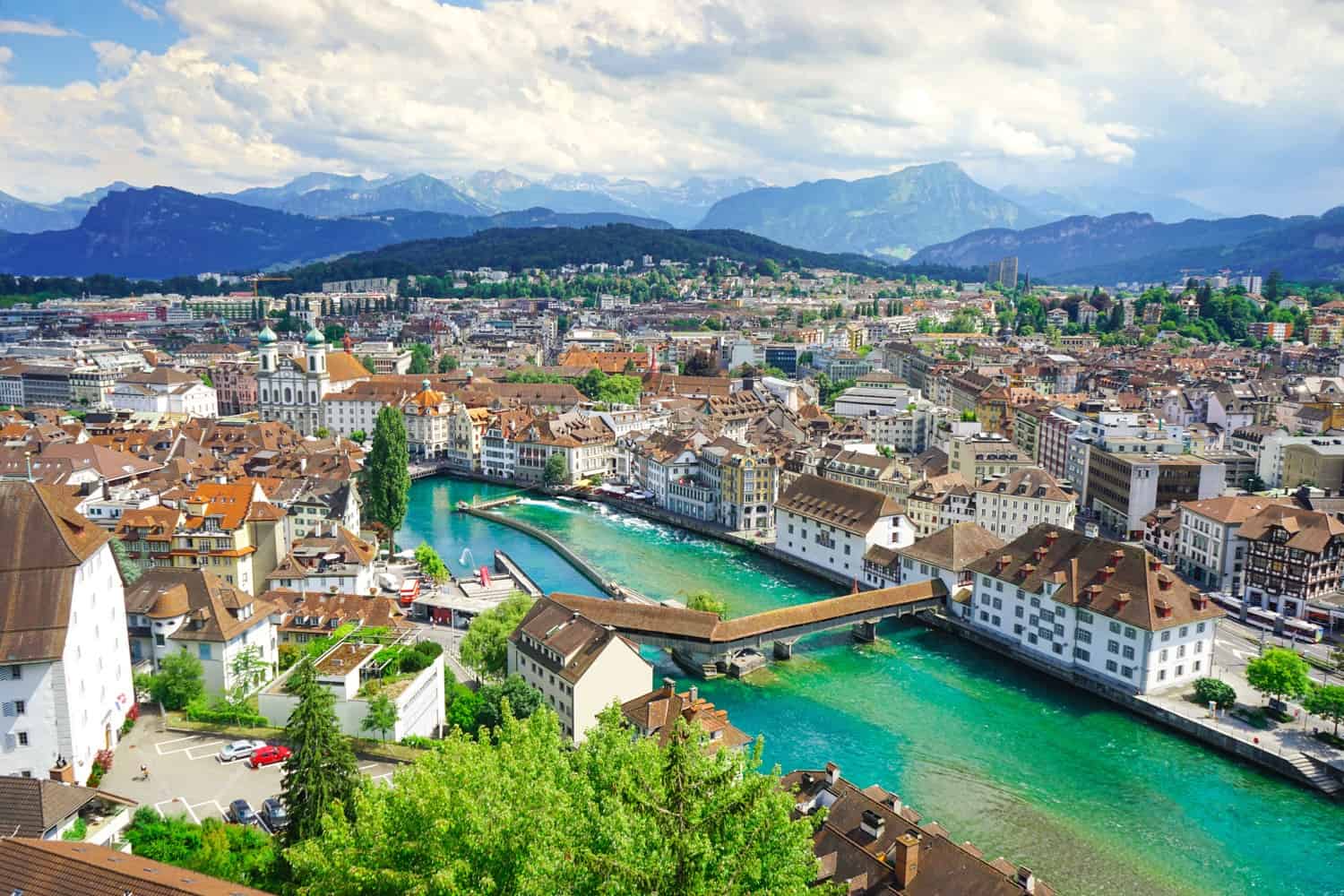
Is Switzerland expensive? This European country has a reputation for being one of the most expensive countries on the planet, but how accurate are the rumours?
Well, I hate to break it to you, but, uh, yeah, they’re pretty accurate.
Personally, I’ve travelled to a hundred countries over the past decade and Switzerland? Even on my most recent visit, taken at a time where everywhere has become more expensive, it still easily mades the top three when it comes to price.
It’s not all bad news, however, as I found tons of way to cut costs and find great value for money. Whether it’s using one of the many discount passes available, seeking out street food instead of eating in restaurants, or opting for comfortable guesthouses over high-end hotels, there are plenty of ways to keep on budget.
I’ve been keeping track of every single dollar I’ve spent over my past 12 years of travel, and I love distilling that information into detailed budget breakdowns. In these articles, I aim to share exactly how much I spent while travelling, covering budgets for all different kind of travellers, and ways in which you can lower your costs.
Today it’s Switzerland’s turn, so let’s get started.
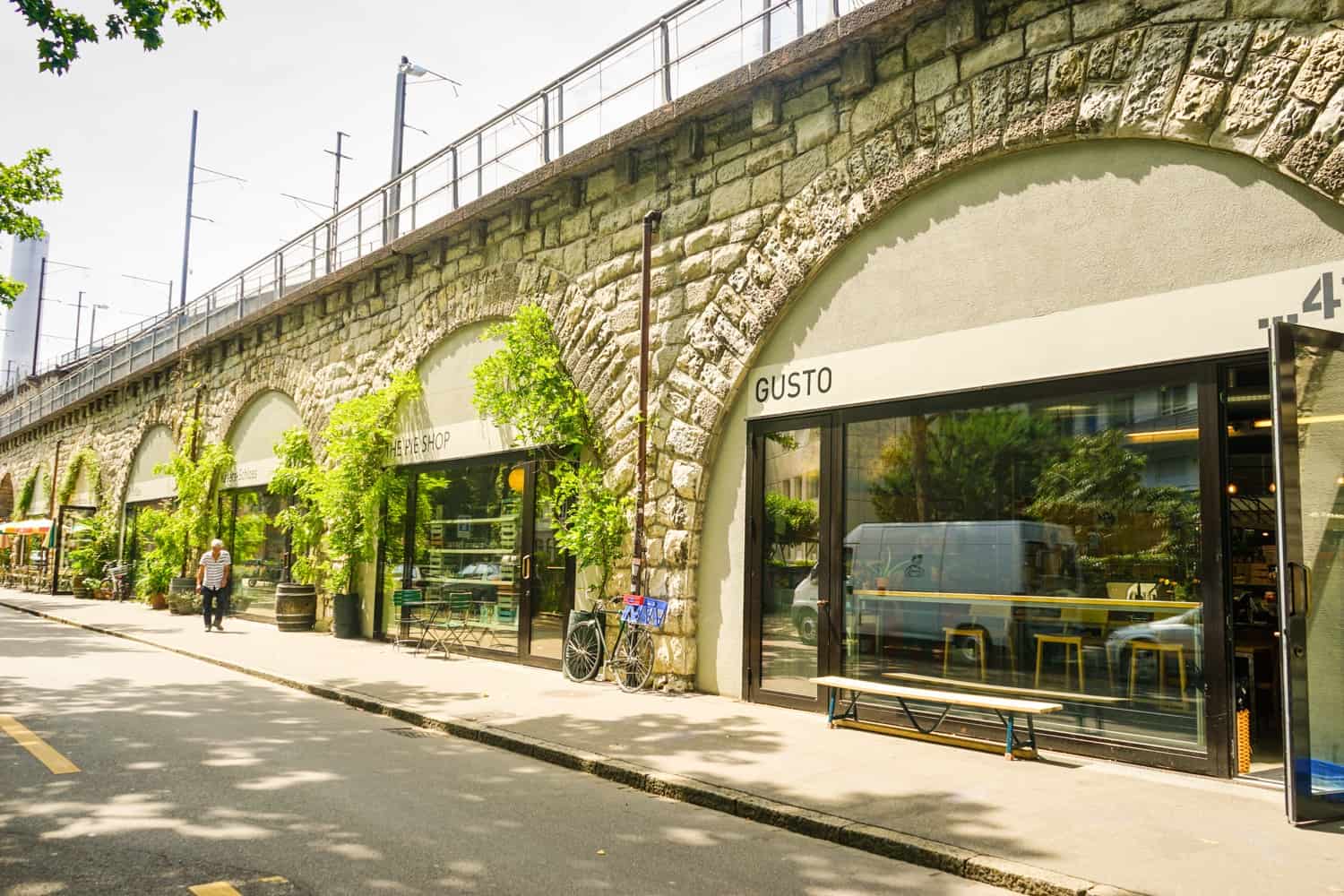
The Cost of Accommodation in Switzerland
You can visit Switzerland on a whole range of budgets, from a CHF 23 (€24) a night dorm bed in the Alps to an absolutely incredible CHF 900 (€950) a night hotel , the latter of which is the best hotel in Zurich and a haven for world-famous celebrities.
In this blog post, I’m going to be focusing on value . Because whether you’re travelling as a solo backpacker on a shoestring, as part of a couple on a mid-range budget, or as a family looking for a little luxury, value is the one thing you’re going to be keeping an eye out for. That doesn’t mean cheap — it means offering more than similarly-priced options.
There’s some seriously expensive accommodation up for grabs in Switzerland, so to start with, I’m going to cover the cheapest ways to find a bed for the night.
If you’re on the tightest of tight budgets, there are several options that’ll land you with free accommodation while you’re in the country. Courchsurfing allows you to connect with locals by sleeping on spare sofas in their homes. It doesn’t cost a penny to do so and is a fantastic way to gain an insight into Swiss daily life away from the tourists. There are close to 250,000 hosts in Switzerland, so there’s sure to be someone who’s right for you.
Housesitting is a more upmarket way to avoid paying for accommodation, as it’s aimed at the mid-range and luxury travellers. You’ll be looking after homes and pets while their owners are on holiday, and the houses can be extremely luxurious. This option works best if you don’t have fixed travel dates, as you’ll be agreeing to dates that the owners set.
Finally, when it comes to free accommodation, you could take a look at WorldPackers in Switzerland , where you’ll be able to volunteer with locals in exchange for food and board. I’ve seen some seriously cool options available on the site, from working at an eco farm in the Alps to helping build a yoga studio in a small, traffic-free village in the mountains. Readers of this site get a $10 discount for WorldPackers with the promo code neverendingfootsteps .
If you’re not looking to travel for free and just want a clean and comfortable room to sleep in, there are plenty of great options, too.
One of the most affordable ways to explore Switzerland is by staying in a hostel. I stayed in several during my first visit to the country and was impressed by their quality: I just wish there were more of them! Let’s look at the best-reviewed hostels in the country.
- The best hostel in Zurich is easily the Zurich Youth Hostel , where a space in a six-bed dorm is priced at just CHF 57 (€60) per person , and private doubles come in at CHF 136 (€144) per night . We loved our stay here! The included Swiss-style breakfast was delicious (and another great way to save money), and we really liked how close it was to Lake Zurich. Chilling out with a drink beside the lake on a summer evening is one of my favourite memories of the city.
- In Bern , you can’t get better than Bern Backpackers where the dorms are CHF 41 (€44) per night and the private double rooms are CHF 103 (€109) a night . You couldn’t ask for a better location either, just a ten minute walk from the main train station in the centre of town. There are a few other good hostels in Bern as well, but this one is rated just as well while being far cheaper than the alternatives.
- You’ll likely be heading to Lucerne while you’re in Switzerland, and if so, I recommend Young Backpackers Homestay , which has dorms for CHF 116 (€122) a night and double rooms for CHF 174 (€184) a night . It’s certainly pricey for a hostel, but it’s also the best-rated hostel in the entire country! It’s not hard to see why: it feels more like staying at a fancy ski lodge than a traditional backpackers, with everything from a sauna and hot tub to a foozball table, commercial-style kitchen, and incredible views from the cozy lounges and patios. Trust me: it’s 100% worth the price.
- Basel is home to Silo Design & Boutique Hostel , where dorms are priced at CHF 63 (€67) a night and doubles at CHF 142 (€150) . No wonder it’s the best-rated budget accommodation in town, with its great location, friendly staff, tasty included breakfast, and immaculate vibes.
- What about Geneva ? MEININGER Hotel Genève Centre Charmilles is the only place I’d consider staying. Not only is it inexpensive (well, for Switzerland) at CHF 42 (€45) a night for a dorm and CHF 141 (€149) for a twin, but the design is sleek, the location perfect, and the continental or buffet breakfast delicious.
Overall, then, you can see that you can expect to spend CHF 40-60 ( € 42-63) a night for dorms in most parts of Switzerland, and CHF 100-140 ( € 106-148) a night for the cheapest double rooms in each destination.
Okay, but what if you’re not a budget traveller and just want to stay in a lovely, well-reviewed hotel or guesthouse that’s good value for money and has all the things you need from a place to lay your head? I’ve got you! For around €150-200 a night , you’ll be able to stay in an excellently-reviewed hotel, in a central location, with friendly staff.
My 2024 Accommodation Recommendations for Switzerland
When I’m travelling, I’m always conscious to book the absolute best accommodation out there. I can easily spend days researching accommodation for every stop along my way, ensuring I’ve chosen the place in the best location with the friendliest staff, and the greatest value for money.
My biggest tip? When you head to Booking to find a hotel, ignore the results that are sorted under “Our Top Picks” — that’s a list of all of the hotels that pay Booking the highest commission, some of which have pretty poor write-ups. Instead, opt to sort the properties by “Top Reviewed”. That way, you’ll be able to see which properties actually have the best reviews.
To give you an idea of what you can expect to spend on a trip, I always like to share where I personally stayed and what I thought of the accommodation. All of the properties below come in at a mid-range budget:
In Zurich , the choice is easy: I’d highly recommend the recently-opened Locke am Platz Zurich , where double rooms cost CHF 194 ( € 205) . Trust me: the price is actually super-reasonable (by the standards of this expensive city!). This hotel is sooooo stylish; I was obsessed with all the little interior design features! Our room came with its own kitchenette, which helped us save money on food. There was an excellent restaurant downstairs, too, which was great for dinners in the evening if you don’t feel like heading outside. The hotel’s in a great location, too, close to parks, gardens, and the lake, with a station for the airport train just down the street.
For Bern , I’d recommend opting for Stay KooooK Bern City . It’s in the best location in the city; a five minute walk from the main train station and close to most of the city’s main attractions. The compact, modern rooms cost CHF 211 (€233) and were home to the most comfortable beds in the country. Well, in my opinion, at least! You’ll get amazing views across the city from the rooftop terrace, and I loved having access to the shared space, dubbed “The Flat”, which includes a large kitchen, lounge, and games room for all guests to use. I was a big fan of this place.
For Lucerne , your best option is Hotel Goldener Stern . This near-new hotel is in a great spot right on the edge of the Old Town, an easy stroll from all the major attractions and the lake. The rooms ( CHF 181/€191 for a double) are immaculately clean, with everything you might need inside: there’s a desk for getting a bit of work done, a coffee machine to help get the day started, and a fridge so you can guarantee a cold drink when you come back from a few hours exploring in the summer heat.
For Basel , I really enjoyed Hotel Spalentor , a delightful hotel that was only a five minute walk from the old town and university, and provides impressive value for money at CHF 170 ( € 180) . The rooms are modern and surprisingly spacious, super-quiet, and with a coffee machine to boot. I especially appreciated the fitness centre and spent many afternoons in their lovely garden with a drink in hand. Bikes are available for free to use during your stay, and there are even DVDs you can borrow from reception if you’re in the mood for a lazy day inside.
Okay, as soon as I discovered that you could stay on Lake Geneva (rather than beside it), I was sold. Floatinn Boat-BnB is a luxury catamaran, moored right beside the downtown area and opposite the famous Jet d’Eau fountain. The cabins (CHF 206 / € 218) are comfortable if a little snug (you’re on a boat, after all!) but all have a private bathroom, and there’s a large sundeck to laze on and admire the incredible view. All of Geneva’s attractions are within an easy walk, but make sure you don’t rush off first thing in the morning: the owner rustles up an incredible breakfast. Such a unique property and one that I can’t stop dreaming about!
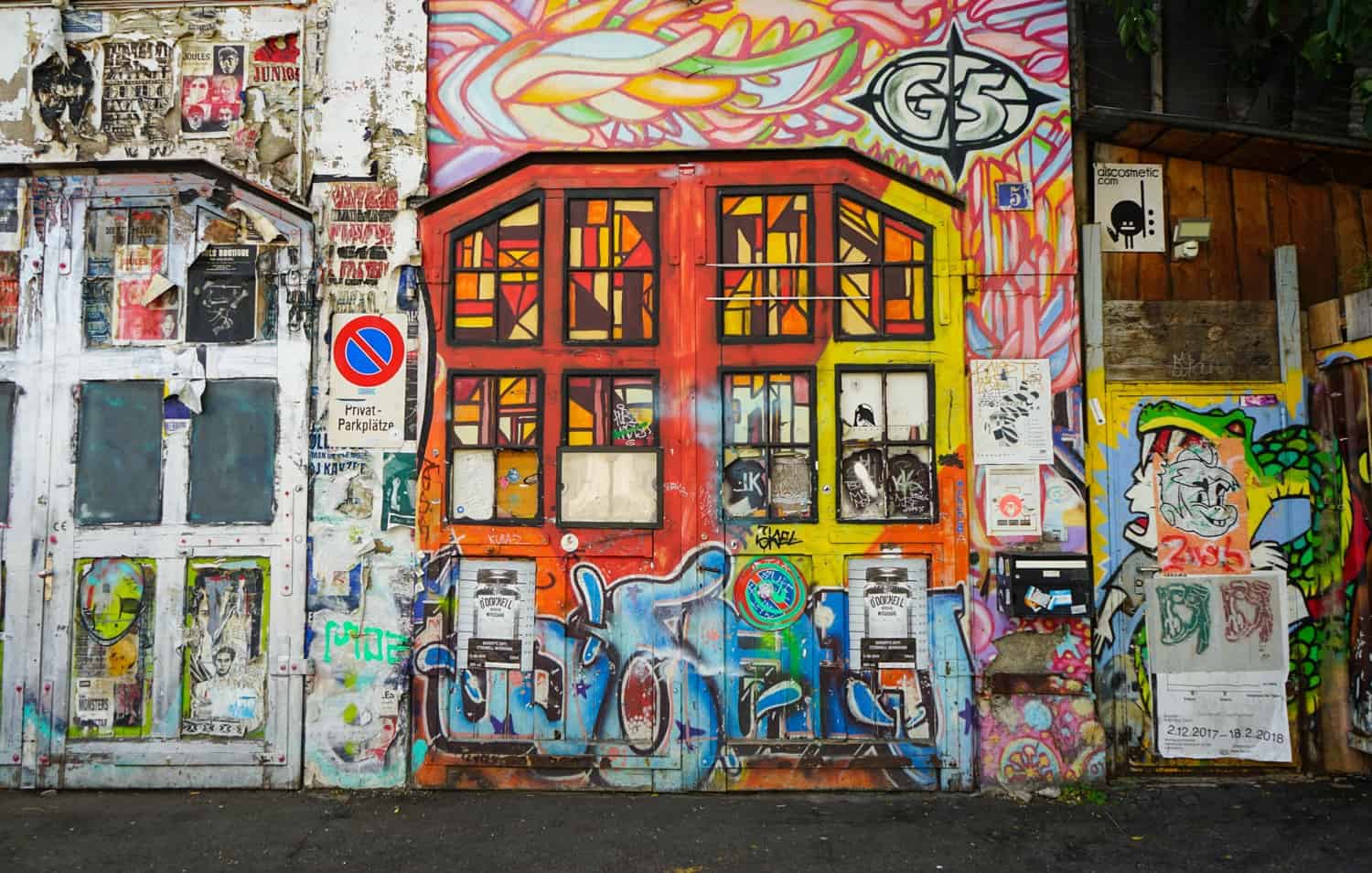
The Cost of Transportation in Switzerland
Transport around Switzerland can get pretty expensive, but there are definitely ways to save money. If you’ll be in the country for a while or just expect to do a lot of moving around while you’re there, the best tip I can offer is to pick up a Swiss Half Fare card .
Only available to overseas visitors and valid for 30 days, it costs CHF 120 / €127 up front. After that, you get 50% off basically every train, bus, and boat trip you take in the country, most mountain railways, and all public transport in 90+ cities and towns. If you’re travelling with kids, you can also get a free Family Pass with your card: using that, one child under 16 travels free for each adult with a card. This can really cut down the cost of family travel!
Whether you’ve got a pass or not, you’ll save money if you’re happy to give up some flexibility. Where they’re available, supersaver tickets with fixed departure times are cheaper than “point-to-point” tickets that let you travel at any time on a given day. Just be sure not to miss the train: you’ll need to buy a replacement ticket if you do!
Many major cities also provide free local transport passes to overseas hotel guests, at least for the first 24 hours. Be sure to grab one if it’s offered! That said, every city in Switzerland is very walkable, so you shouldn’t need to use public transport to get around if you’re staying somewhere central. I walked absolutely everywhere — even in Zurich — and never once found it difficult or tiring to do so.
Note that in some cities (like Zurich), certain ferry routes on the lake are also included in the public transport zone system. Confirm the details for any specific ferry you want to take, but if you’ve got a 24-hour or other all-inclusive public transport pass, it’s a good way of getting out on the water!
While it’s possible to fly between certain cities in Switzerland, it’s really not worth doing. It’s not a big country, and the trains are fast, efficient, and noticeably cheaper than taking a plane. Getting between Zurich and Geneva ( from one end of the country to the other) takes under three hours, starts and finishes right in the central city, and costs around a third of a comparable flight.
Finally, it’s worth mentioning the Swiss All-in-One Travel Pass, which provides unlimited travel for anywhere between 3-15 days on all Swiss trains, buses, and public transport. It also includes free entry to hundreds of museums, one free mountain excursion, and discounts on many others. You can get all the details for it here .
With that out the way, here are a few examples of what you should expect to pay for transport in Switzerland.
- Train or tram from the airport to downtown Zurich: CHF 3.40 (€3.60)
- Zurich tram, bus, or ferry – single ride in one or two zones: CHF 4.60 ( € 5)
- Zurich 24-hour public transport pass (two zones): CHF 9.20 (€10)
- Train from Zurich to Lucerne (one-way): CHF 19 (€20)
- Train from Zurich to Geneva (one-way): CHF 64.40 (€68)
- Train and bus from Zurich to Vaduz, Liechtenstein: CHF 31.80 (€33.80)
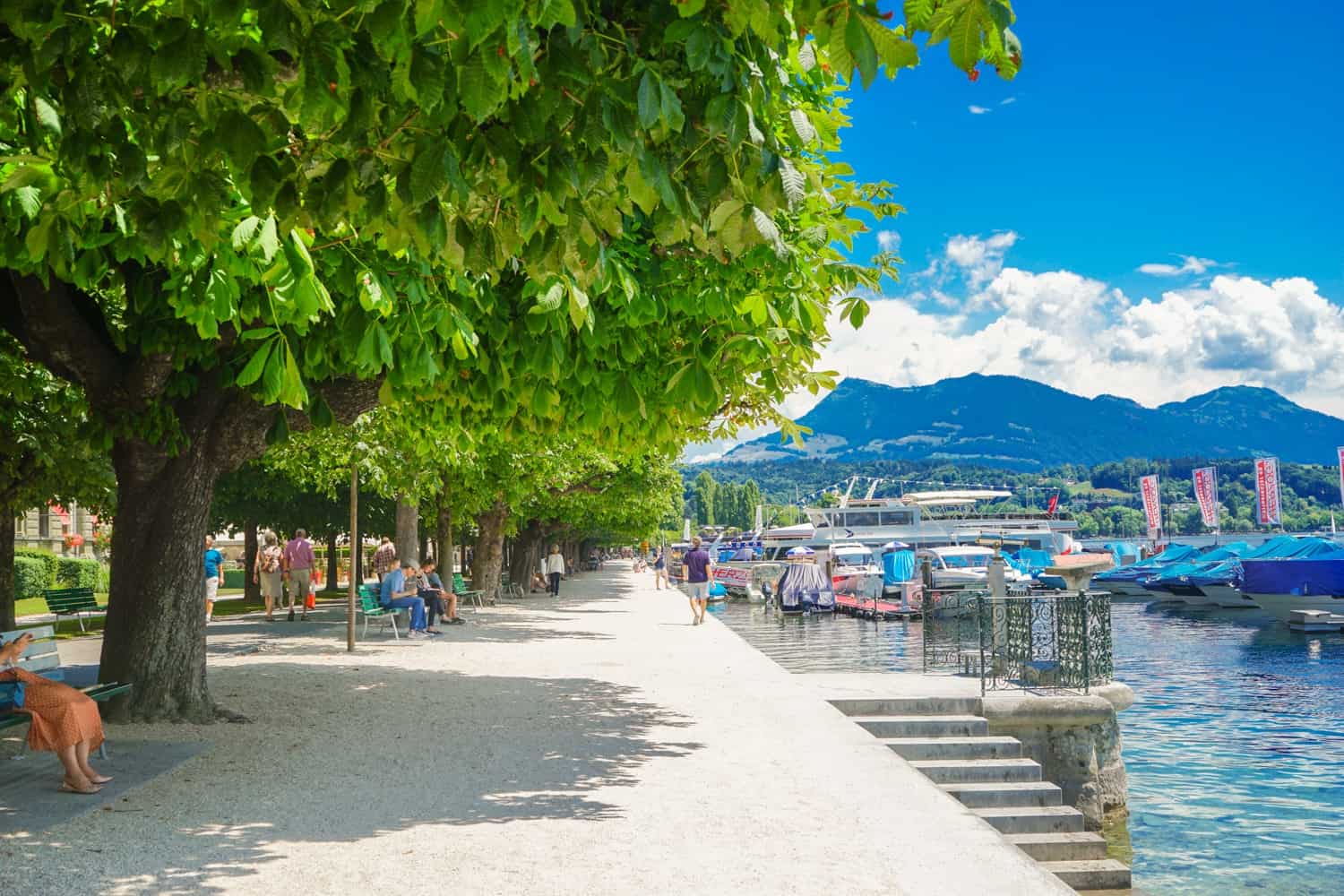
The Cost of Food in Switzerland
If I were to ask you what you know about Swiss food, odds are, you’d come back to me with two iconic dishes: cheese fondue and chocolate. After all, they’re two of Switzerland’s most famous creations, so — unless you don’t eat dairy! — you’re definitely going to want to sample both while you’re in town.
Fondue is life up in those Swiss mountains, and most restaurants offer it on their menus. You can think of it as a gigantic cheese dip that’s often served in a communal pot atop a small stove. To eat it, you dip rustic country bread into the melted cheese with a long metal fork. The cheese itself is typically a blend of 50-50 gruyère and vacherin and has been cooked with white wine and garlic, resulting in one of the tastiest dishes on the planet. You can expect to pay €30-35 per person .
Now, one thing to keep in mind is that the majority of Swiss people treat their lunch as their main meal of the day: this is when you’ll find cheap deals at cafes and restaurants. Either opt to join the locals and have a large meal at midday, or head to a grocery store to pick up supplies for a picnic. Head to Aldi, Lidl, or CoOp to find the cheapest provisions.
Whenever I find myself travelling in an expensive country like Switzerland, I find myself turning to fast food and street eats: specifically, kebabs. Yep, on a day trip from Zurich to Lucerne, I decided to up the classy dial and ordered a kebab for lunch. The cost? CHF 10(€11) . So much cheaper than almost any alternative in the city, and very tasty as well!
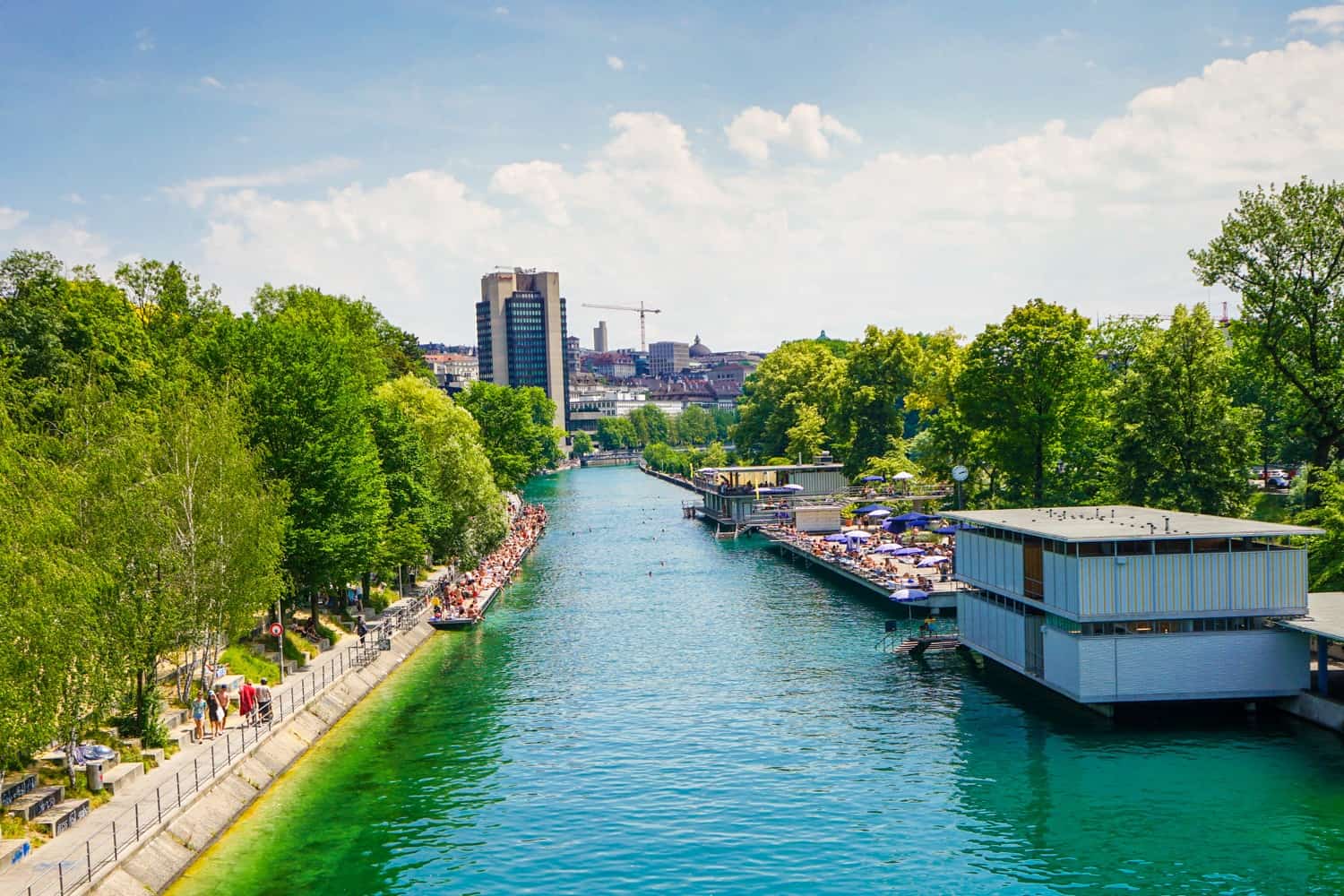
The Cost of Activities and Entrance Fees in Switzerland
Next up: activities! Activities and entrance fees can often make up a large proportion of your travel expenses. Fortunately, in Switzerland, those costs can be relatively low, as there’s so much available to do for free.
Switzerland is a nature enthusiast’s playground, blanketed in mountains and lakes, which are easily to climb and explore. One of my favourite Swiss activities involve simply choosing a hiking trail, packing a picnic, and preparing myself for views that are straight out of a postcard.
An easy way to save money on your vacation is by utilising the country’s city cards to gain discounts and entrance to all of the most popular attractions. The Zurich Card , for example, is priced at CHF 29 (€31) for 24 hours of use, or CHF 56 (€59) for 72 hours. This offers up phenomenal value, because the card gives you access to unlimited use of public transportation in the city, a free boat trip on Lake Zurich, entrance to 40 museums, a 50% discount on the Zurich old town walking tour, and a 20% discount in several stores in the city. The Zurich card is also valid on transport between the airport and the city centre.
There’s also a Geneva City Pass , which is priced at CHF 30 (€32) for 24 hours, CHF 40 (€42) for 48 hours, and CHF 50 (€53) for 72 hours. As with the Zurich Card, you’ll receive free access to all public transport, entrance to tons of museums and attractions, free skiing, free cable car rides, free boat hire on the lake — you get so much with this pass that you’ll be saving money within a couple of hours of arriving.
Aside from the city passes, there are plenty of tours, excursions, day trips, and activities to sample. One museum that is worth the entrance fee is Zurich’s Lindt Home of Chocolate Museum — tickets are priced at CHF 15 (€16) per person and can be bought in advance here . If you love your chocolate, you’re going to adore this museum. Not only does your ticket grant you unlimited tastings of Lindt chocolate, but there’s also a nine-metre-high chocolate fountain to take photos with!
If you’re not planning on spending much time outside of Zurich, make sure to squeeze in a day trip or two, to ensure you see more of this beautiful country. This day trip to Grindelwald and Interlaken costs CHF 97 (€102) for 12 hours of exploring. You’ll see all the prettiest parts of Switzerland, as you gaze up at the triple peaks Eiger, Mönch, and Jungfrau, take the cable car up to Mount First, jump aboard the scenic train between Grindelwald and Interlaken, and funicular up to Interlaken’s Harder Kulm mountain.
Speaking of mountains, there are so many to see! From Lucerne, CHF 145 (€153) gets you up to the incredible Mount Titlis on this day trip experience . Mount Titlis is the only accessible glacier in Central Switzerland, and you’ll spend your day riding the world’s first revolving cable car up the mountain, dancing across Europe’s highest spectacular suspension bridge, and wandering through a real-life glacier cave.
From Geneva, I have to recommend taking a day trip out to Chamonix and famous Mont Blanc . How could I not? For CHF 105 (€111) per person , you’ll get to spend 10 hours exploring two of Europe’s most well-known destinations. After crossing the French border, you’ll hit up Chamonix — yes, the exclusive ski resort and the site of the first ever Winter Olympics. You’ll take the cable car to Aiguille du Midi, and take in Mont Blanc from so many different viewpoints. You can even opt to jump on the Montenvers rack railway to the Mer de Glace glacier.
If you know anything about Interlaken, it’s probably that it’s one of Europe’s top adventure travel destination. And the number one activity in town? Paragliding ! For CHF 180 (€190) per person , you’ll be able to jump on a tandem paragliding experience that’ll give you access to some of the best views in the country, if not the entire world. Seriously — check out the photos from the tour company!
And finally, I’ve saved the best activity for last, because if there’s one thing you simply have to experience while you’re in Switzerland, it’s Jungfraujoch! Simply buy your ticket online ( CHF 233.80/€247 for a return), exchange it for a pass at Interlaken Ost, Jungfraujoch, or Lauterbrunnen train station, then experience the journey to the highest train station in Europe. The views are phenomenal.
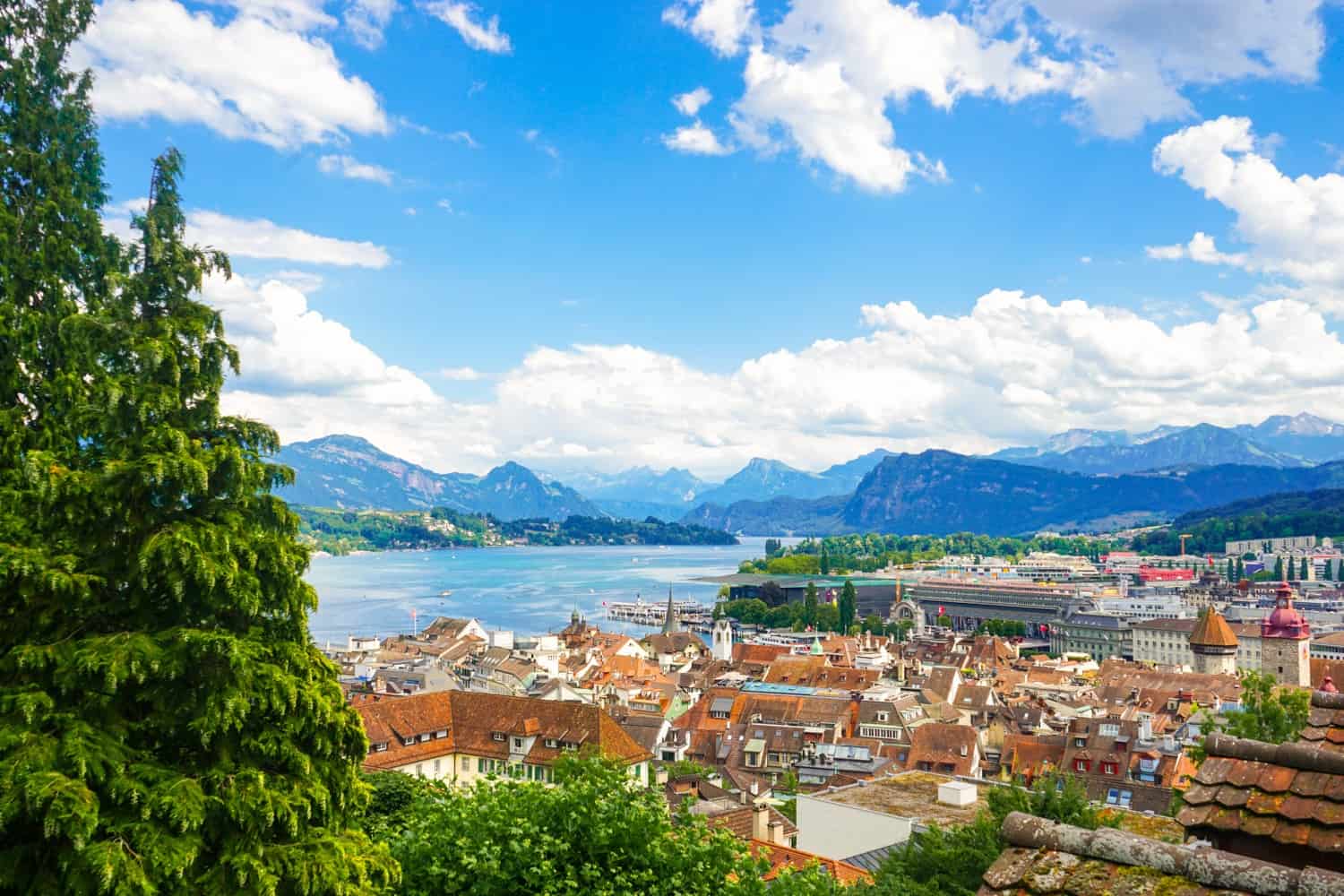
The Cost of Travel Insurance in Switzerland
If you’ve read any other posts on Never Ending Footsteps, you’ll know that I’m a great believer in travelling with travel insurance. I’ve seen far too many Go Fund Me campaigns from destitute backpackers that are unexpectedly stranded in a foreign country after a scooter accident/being attacked/breaking a leg with no way of getting home or paying for their healthcare. These costs can quickly land you with a six-figure bill to pay at the end of it.
In short, if you can’t afford travel insurance, you can’t afford to travel.
Travel insurance will cover you if your flight is cancelled and you need to book a new one, if your luggage gets lost and you need to replace your belongings, if you suddenly get struck down by appendicitis and have to be hospitalised, or discover a family member has died and you need to get home immediately. If you fall seriously ill, your insurance will cover the costs to fly you home to receive medical treatment.
I use SafetyWing as my travel insurance provider, and recommend them for trips to Europe. Firstly, they’re one of the few companies out there who will actually cover you if you contract COVID-19. On top of that, they provide worldwide coverage, don’t require you to have a return ticket, and even allow you to buy coverage after you’ve left home. If you’re on a long-term trip, you can pay monthly instead of up-front, and can cancel at any time. Finally, they’re more affordable than the competition, and have a clear, easy-to-understand pricing structure, which is always appreciated.
With SafetyWing, you’ll pay $1.50 a day for travel insurance.
How Much Does it Cost to Travel in Switzerland?
With all of that being said, it’s time to tally up all of my travel expenses in Switzerland, in order to give you an idea of how much you can expect to spend while travelling in this wonderful country:
Accommodation: CHF 192 per day for two people (CHF 96 each ) Transportation: CHF 19 per day Food: CHF 31 per day Activities: CHF 37 per day Total amount spent per day per person: CHF 183 (€193)
Are you planning a trip to Switzerland? Have any questions? Let me know in the comments below!
Further Reading on Switzerland 🇨🇭 15 Best Things to Do in Geneva, Switzerland 🏔 Top Things to do in Zurich, Switzerland ⚛️ A Private Tour of CERN’s Large Hadron Collider
Lauren Juliff
Lauren Juliff is a published author and travel expert who founded Never Ending Footsteps in 2011. She has spent over 12 years travelling the world, sharing in-depth advice from more than 100 countries across six continents. Lauren's travel advice has been featured in publications like the BBC, Wall Street Journal, USA Today, and Cosmopolitan, and her work is read by 200,000 readers each month. Her travel memoir can be found in bookstores across the planet.
Related Posts
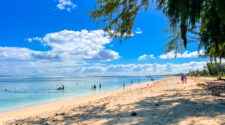
The Cost of Travel in Mauritius: My Detailed Budget Breakdown

The Cost of Travel in Thailand: My Detailed Budget Breakdown

2023: My Travels in Review

The Cost of Travel in South Korea: My 2024 Budget Breakdown
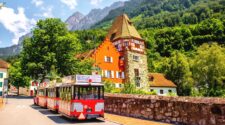
What’s it Like to Travel in Liechtenstein?
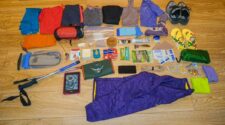
What to Take On the Camino Primitivo: My Detailed Packing List
How would you recommend one – 1 1/2 week budget travel experience in Switzerland? After Switzerland, I plan to go to South of France. Any suggestions there?
Leave a reply Cancel reply
Your email address will not be published. Required fields are marked *
Meet Lauren Juliff

Is Switzerland Expensive? A Trip Cost Guide for 2024
Last Updated on December 11, 2023
by Audrey Webster
Disclaimer: This article contains affiliate links. That means if you click a link and make a purchase, we may make a small commission. As an Amazon Associate we earn from qualifying purchases. For more information, see our privacy policy.

A notoriously expensive country, a trip to Switzerland is something that needs to be budgeted fastidiously ahead of time. But is Switzerland expensive or is it not as bad as it’s made out to be?
On the one hand, Switzerland is considered to be one of the most expensive places to visit in Europe. When taking dining, lodging, transportation, and activities into account, a Switzerland trip cost can quickly become a financial burden.
However, with the proper information and preparation before you visit Switzerland, you might be surprised with just how affordable a visit to this stunning country can be.
Here, we’re taking a close look at just how affordable this country can be with the right tools under your belt. You can enjoy visiting Switzerland on a budget if you’re prepared. Then, you can kick back and experience a country filled with exceptional natural wonders and quaint mountain towns without worrying about breaking the bank.
Table of Contents
Switzerland Trip Cost Guide
Travellers to Switzerland will find that the country is more expensive compared to neighboring nations and can expect to spend about ₣119 – 496 CHF (about $135 – 565 USD) per person per day. There are many ways to save money when figuring out the cost of a trip to Switzerland.
Switzerland uses the Swiss Franc (CHF) as its currency, however, all prices here are listed in USD. It is always a good idea to keep up to date on the current exchange rates before travelling.

Accommodation Prices
Accommodation prices in Switzerland can vary depending on the time of year you visit. During the peak travel months, usually the warmer summer months, you’ll see an influx in prices representative of a general increase in demand.
However, mountain towns that are popular for skiers and snowboarders are busiest in the winter. Keep this in mind for when you decide what time of year to visit the country.
You may also notice a difference in price between cities. Places like Zurich and Geneva are generally going to be more expensive. Cities and towns that are more heavily trafficked by tourists charge higher prices for their accommodations. For instance, when comparing Bern and Zurich , Bern is slightly less expensive than Zurich, but not by a large margin.
Switzerland has several options for lodging during your stay, ranging from hostels to high-end hotels. The average hotel is around $200 USD per night.
If you want a mid-to-nice hotel, you should expect to pay upward of $250 USD per night. If you want to save a bit of money, however, it is possible to find hotel lodging for $150 USD per night if you make reservations far enough in advance on Booking.com or travel in off seasons.
If you’re a backpacker or simply want to save on the high prices of hotels, the average hostel can range from $50 – $75 USD for a dorm bed. You can browse hostel options here.
Should you be looking to splurge on your trip to Switzerland, you will easily be able to do so by booking lovely accommodation.
There are several luxury hotels throughout the country that reach upwards of $500 USD per night. The further in advance you book, the more likely you are to find a good deal on your Switzerland accommodations.

Transportation Prices
Like many European cities, Switzerland is easy to get around by train. Main train lines run between major cities such as Bern, Interlaken, Lucerne, Geneva or Zurich with stops at the small mountain towns and other lovely places in Switzerland in between.
Everything from trams to boats are available to visitors, with the most convenient being local and regional trains.
Depending on how long you’re planning on staying in Switzerland, you should consider downloading SRB Mobile–the app for Swiss Federal Railways. This will easily allow you to find trains and book tickets. You can also book in advance on Omio which is convenient if travelling to multiple countries in Europe.
Before we dive into prices, let’s take a quick look at logistics. There are five main classes of trains in Switzerland. InterCity, or IC, services long distances and connects cities across the country.
InterRegio, or IR, connects adjacent cantons. RegioExpress, or RE, are regional lines that don’t stop at all stations, therefore running faster. S-Bahn, or S, are suburban lines that reach urban areas. Finally, Regio, or R, are local trains.

You’ll use any one of these train systems depending on where and how far you’re travelling in Switzerland.
The SBB Mobile app is a great way to purchase and keep track of these tickets. SBB offers supersaver tickets as well as Half Fare Travelcards that can help make moving throughout Switzerland a little lighter on the wallet.
A Half Fare Travelcard costs 190 CHK (roughly $215 USD) for one month, however, it can be well worth doing the math to see if the savings here would be greater than purchasing a Swiss Travel Pass.
Remember that supersaver tickets are for a specific train at a specific time. They’re available up to 60 days in advance and are marked by a % inside a black triangle when booking your ticket. Purchasing a rail pass is by far the most cost-effective way to get around the country if you plan on visiting numerous locations.
The Swiss Travel Pass is another option. It can be purchased for 3, 4, 8, and 15 days and includes unlimited travel.
It also includes free entry into museums throughout the country. If you’re not planning on using the train much, it might not be worth it. Just do the math for the different transportation options and how you plan to spend your time.
The exact price of Swiss train tickets will be based on the route, not the type of train. Travelling greater distances, like between Bern and Zurich for example, will cost more than hopping a quick inner-canton train. Trains can cost as little as about $20 for an hour-long journey to over $100 for a longer trip.
If you are able to book your train ticket in advance, we recommend trying to reserve a window seat. You’ll quickly be rewarded by stunning scenery as you travel between destinations.
When visiting Swiss cities, you will find that most are easily navigable on foot if you want to save some money. Public transportation in the cities is also robust, affordable and easy to navigate should you need to use this, as well. In general, expect a day pass for city transit to cost around $10-12 USD or a single ticket to cost around $3 USD.

Food Prices
The cost of a meal in Switzerland can vary pretty dramatically. There are several restaurants in Switzerland where you could find yourself spending over $50 USD for a single main.
Fast food and grocery shopping will be more affordable options, but still more expensive than your average North American version.
On average, a meal at an inexpensive restaurant will cost around $40 USD. A mid-range restaurant will land closer to $80 – $100 USD per person. Drinks tend to be roughly what you’d pay in the United States or similar countries.
To save money on food you can eat fast food or visit a local supermarket. Groceries will still be more expensive than at home, but it’s often more affordable than eating out every meal.

Plus, visiting local grocery stores forces visitors away from the touristy areas of town and offers a glimpse into what living in each Swiss city might look like. It gives you the opportunity to try food and brands unique to Switzerland.
To make Switzerland food prices fit nicely within your budget, we recommend eating on the more affordable side for two meals. One meal of the day can be a splurge meal where you carefully select a restaurant to try local and regional cuisine.
You can make adjustments to this food plan depending on your budget for eating out and keep in mind that restaurant meals are expensive in Switzerland. Make sure to allow some of your budget to try all the unique food Switzerland has to offer.

Activities Prices
Thankfully, because of the huge variety of outdoor activities and attractions throughout Switzerland (particularly in cities like Interlaken), there are several affordable ways to explore the country.
If you want to see the main sites of a city without breaking the bank, free walking tours exist in most major cities in Switzerland. These are tip-based tours where you pay the guide what you think the tour was worth (the tour isn’t technically “free).
If you want a more specialised tour, however, private tours of cities like Lucerne or Zurich cost about $75 USD per person for a one-hour tour.
The Swiss Travel Pass includes free entry into hundreds of museums. Museums are also one of the more affordable activities for your Switzerland trip.
For example, the Zurich Finance Museum tickets cost ₣10 CHF (around $11 USD) and you can expect other museums to be similarly priced. Spending a day or two exploring the art culture scene of Basel or the museums of Bern are also great options.
Day trips to explore the region you’re staying in will bump up the daily cost of activities, but less so if you purchase a Swiss train pass.
Some of the most affordable activities include hiking, walking, and biking. Hiking, usually on the cheaper side, can offer some of the most spectacular views you’ll see on your trip.

Entertainment Prices
If you’re someone who enjoys a night out on the town, Switzerland is expensive for nightlife and entertainment, so this is something to be aware of when figuring out your overall budget.
The average evening alcoholic drink can vary. If you want a pint of local beer expect to pay around $6-10 USD depending on what you order. It will likely be roughly the same for a glass of wine. Those looking for a cocktail would expect to pay between $12-15 USD.
If you want a caffeine fix at a local cafe, this isn’t as cheap as in other European countries, either, with the average price of an espresso drink like a latte or a cappuccino landing at around $5-5.50 USD.
If you want to experience the theatre or see a show in a classic Swiss city’s opera house, tickets can vary in price depending on the production and your seats, but don’t expect to pay anything less than about $50 USD.

Is Switzerland Expensive? Average Prices in Switzerland
Bear in mind that how much you spend on your Switzerland adventures can vary widely depending on how you plan to spend your time, eat, and sleep.
The amounts listed below are averages. The cost to travel to Switzerland is a personal number that’s entirely dependent on your budget and where you prioritise spending it.
Accommodation: $50 – 250 USD / night
Transportation: $15 – 50 USD / day
Food: $50 – 150 USD / day
Activities: $15 – 75 USD / day
Entertainment: $5 – 40 USD / day
In total, you can expect to spend around $135 to $565 USD (about ₣119 – 496 CHF) per person per day on a visit to Switzerland.
So, after diving into all the various expenses of Switzerland, is Switzerland expensive to visit? Generally, yes. Switzerland remains one of the most expensive places to visit in Europe.
The general trip to Switzerland cost remains one of the highest on the continent, but this doesn’t mean you should rule out a trip to Switzerland entirely. The sprawling scenery and intricate history lend to making Switzerland well worth the visit.
Are you planning a trip to Switzerland? Have any questions about these prices in this country? Let us know in the comments!

Related Posts:

Zurich vs Lucerne: Which Swiss City to Visit?

One Day in Bern Itinerary: A Day Trip from Zurich

The Perfect Weekend in Geneva: A 2-Day Itinerary

About Audrey Webster
Audrey Webster is a writer for The World Was Here First. She is an Oregon native who has visited countries across the globe and currently spends her weekends exploring the Pacific Northwest and surrounding states. Her approach to traveling combines exploring famous tourist sites and wandering off the beaten path to discover new destinations.
your article is quite comprehensive. Thanks. You answered most of my questions and saved me a ton of time. and some money too.
Thanks for such informative travel guidlines.
Are Interrail passes valid in Switzerland?
Leave a Comment Cancel reply
Cost of a Trip to Switzerland & the Cheapest Time to Visit Switzerland
The average price of a 7-day trip to Switzerland is $1,642 for a solo traveler, $2,423 for a couple, and $3,125 for a family of 4 . Switzerland hotels range from $80 to $374 per night with an average of $144, while most vacation rentals will cost $180 to $510 per night for the entire home. Average worldwide flight costs to Switzerland (from all airports) are between $685 and $1,003 per person for economy flights and $2,151 to $3,149 for first class. Depending on activities, we recommend budgeting $58 to $119 per person per day for transportation and enjoying local restaurants.
See below for average , budget , and luxury trip costs. You can also look up flight costs from your airport for more tailored flight pricing.
The Cheapest Times to Visit Switzerland
On average, these will be the cheapest dates to fly to Switzerland and stay in a Switzerland hotel:
- January 8th to April 1st
- September 3rd to December 9th (except the week of October 15th)
The absolute cheapest time to take a vacation in Switzerland is usually mid November .
Average Switzerland Trip Costs
Average solo traveler.
The average cost for one person to visit Switzerland for a week is $1,368-$2,539 ($195-$363 per day)
Food, Travel, and Sightseeing : $58 to $119 per day for one person’s daily expenses
Flights : $356 to $872 for economy
Lodging : $104 to $139 per night for one 2 or 3-star hotel room
or $101 to $123 per night for a 1-bed vacation rental
Average Couple’s Trip
The average cost for a couple to visit Switzerland for a week is $2,122-$4,244 ($303-$606 per day)
Food, Travel, and Sightseeing : $115 to $238 per day for two people’s daily expenses
Flights : $711 to $1,744 for economy
Average Family Vacation
The average cost for 4 people to visit Switzerland for a week is $3,952-$8,480 ($565-$1,211 per day)
Food, Travel, and Sightseeing : $231 to $475 per day for four people’s daily expenses
Flights : $1,423 to $3,487 for economy
Lodging : $207 to $278 per night for two 2 or 3-star hotel rooms
or $152 to $185 per night for a 2-bed vacation rental
Traveling Cheap to Switzerland
How cheap can you make a vacation to Switzerland? The cheapest trip to Switzerland is about $138 per person per day for travelers willing to take standby flights, deal with inconvenience, and otherwise limit travel expenses. About 1% of rentals are available in the $0 to $100 range for an entire place, and vacation rentals can be booked for as low as $20 per night. These inexpensive rentals must be booked as early as possible and may not be in the most desirable areas. 1-star hotels are more likely to be available, with rooms starting at around $68.
Even cheaper trips are possible depending on where you live and whether you can drive. Check the cheapest times to fly for more saving ideas.
Budget Solo Traveler
The lowest cost for one person to visit Switzerland for a week is $967-$1,944 ($138-$278 per day)
Food, Travel, and Sightseeing : $29 to $58 per day for one person’s daily expenses
Lodging : $68 to $80 per night for one 1-star hotel room
or $81 to $111 per night for a 1-bed vacation rental
Budget Couple’s Trip
The lowest cost for a couple to visit Switzerland for a week is $1,525-$3,229 ($218-$461 per day)
Food, Travel, and Sightseeing : $58 to $117 per day for two people’s daily expenses
Budget Family Vacation
The lowest cost for 4 people to visit Switzerland for a week is $2,968-$6,127 ($424-$875 per day)
Food, Travel, and Sightseeing : $117 to $234 per day for four people’s daily expenses
Lodging : $135 to $160 per night for two 1-star hotel rooms
or $121 to $167 per night for a 2-bed vacation rental
Overall it is very difficult to travel to Switzerland cheaply.
The Cost of a Luxury Switzerland Trip
There is no true ceiling on the cost of a luxury trip, so our estimates are based on what most people do in Switzerland.
Luxury Solo Traveler
The high-end price for one person to visit Switzerland for a week is $2,769-$9,991 ($396-$1,427 per day)
Food, Travel, and Sightseeing : $115 to $238 per day for one person’s daily expenses
Flights : $884 to $2,157 for first class
Lodging : $180 to $374 per night for one 4 or 5-star hotel room
or $513 to $1,028 per night for a preferred vacation rental
Luxury Couple’s Trip
The high-end price for a couple to visit Switzerland for a week is $4,465-$13,815 ($638-$1,974 per day)
Food, Travel, and Sightseeing : $231 to $476 per day for two people’s daily expenses
Flights : $1,768 to $4,315 for first class
Luxury Family Vacation
The high-end price for 4 people to visit Switzerland for a week is $8,924-$24,563 ($1,275-$3,509 per day)
Food, Travel, and Sightseeing : $461 to $951 per day for four people’s daily expenses
Flights : $3,537 to $8,630 for first class
Lodging : $360 to $748 per night for two 4 or 5-star hotel rooms
or $770 to $1,546 per night for a preferred vacation rental
Switzerland Hotel Prices
The cost of staying in Switzerland is much higher than the average city. On average hotels are less expensive than vacation rentals. Luxury vacation rentals are more expensive in Switzerland due to very high property costs. The graphs below show how much cost can vary depending on the type of experience you’re looking for.
Switzerland Lodging Cost by Star Status
The average price for the class of hotel is on the (y) axis. The hotel class (out of 5 stars) is on the (x) axis.
Prices are based on Switzerland hotel averages and may not reflect current prices. In some cases, we extrapolate prices to estimate costs, and hotels with your desired star rating may not be available.
Vacation Rental Prices
The percent of vacation rentals in the price range is on the left (y) axis. Price range is on the bottom (x) axis.
There are a healthy amount of vacation rentals serving all budgets in Switzerland.
Flight Costs to Switzerland
Averaging flights around the world, prices go from a high of $1,003 average in late June to a low of $685 in mid November. Median flight price is $781. These prices are based on millions of flights. For Switzerland our data includes thousands of originating airports, and hundreds of airlines. The area has more variance in price compared with other locations.
Average Flight Cost by Season
Average flight cost by day of week.
The cheapest day to fly in is typically Wednesday, and the cheapest day to fly back is usually Tuesday. Click here to see data for the cost of flights from your airport. In Switzerland, the difference between the cheapest and the most expensive week is about $318, so you can easily save about 46% simply by using our free flight guides and booking in advance.
Daily Expenses Budget
Daily vacation expenses vary more based on what you’re interested in doing. A fine dining restaurant with drinks around Switzerland can easily cost $439 per person or more, while a standard nice meal might be about $29 per person. Private tours can cost $878 per day, but self-guided tours to see the outdoor sights can be free. Costs vary wildly, so recommendations are made based on the cost of living and averages we see for this type of vacation.
Other Switzerland Guides
Travel costs nearby.
- Brienz, Switzerland
- Fluehli, Switzerland
- Grindelwald, Switzerland
- Gsteigwiler, Switzerland
- Matten bei Interlaken, Switzerland
- Aletsch Arena (Riederalp, Switzerland
- Interlaken, Switzerland
- Lungern, Switzerland
- Wengen, Switzerland
- Wilderswil, Switzerland
Travel Costs in Popular Places
- Hat Yai, Thailand
- Krabi, Thailand
- Kerobokan, Indonesia
Nomadic Matt's Travel Site
Travel Better, Cheaper, Longer
Switzerland Travel Guide
Last Updated: April 18, 2024
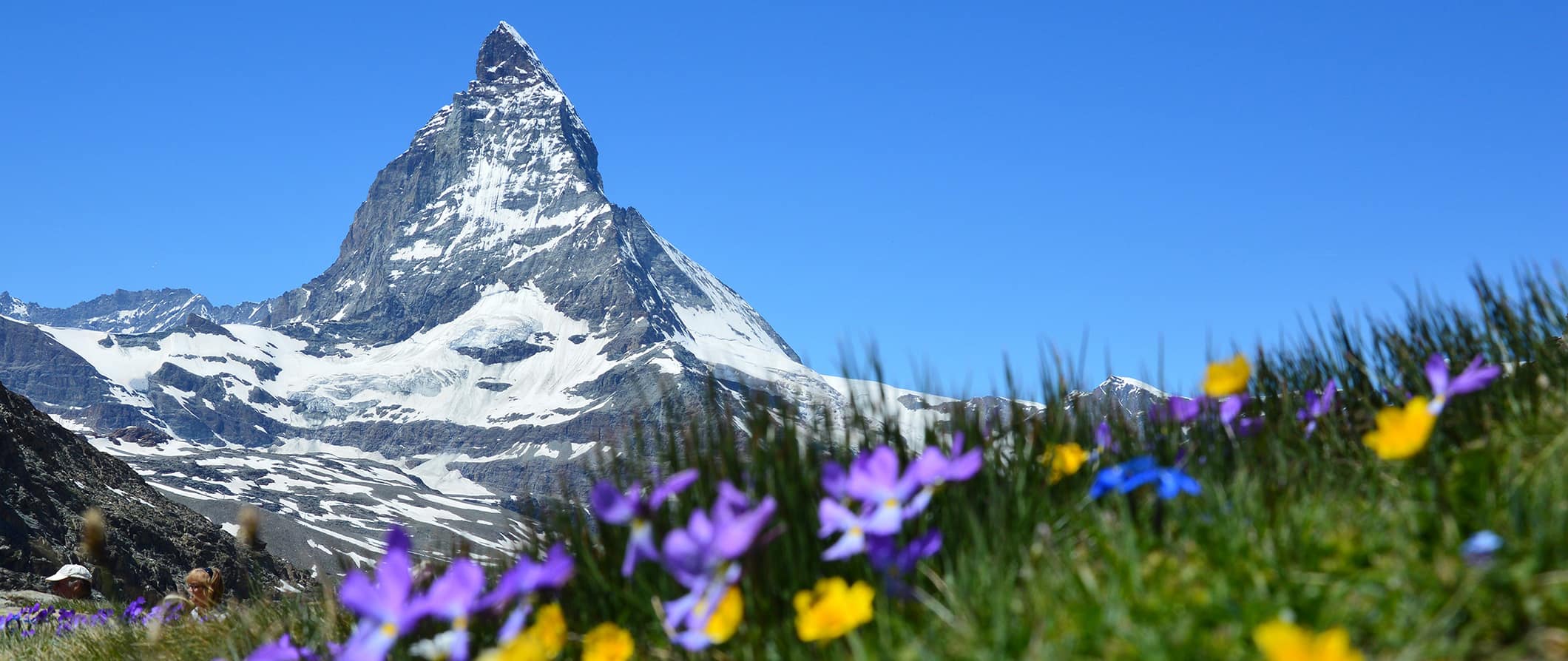
As one of the most expensive countries in Europe , Switzerland is often skipped over by budget travelers.
Yet, while it is not a cheap destination, Switzerland is one of the most beautiful places on earth.
This land-locked country is home to shimmering lakes (more than 7,000 of them!), picturesque mountains (hello Alps!), tiny walled medieval towns, historic cities, soaring peaks, endless green fields you want to run through, delicious chocolate and cheese, incredible beer, and friendly, welcoming people. It’s known for ski resorts, hiking trails, its neutral foreign policy stance, being a banking and finance center, and making Swiss watches.
Everything runs on time here, the country is safe, and everyone is super nice. I loved my time traveling around Switzerland and the country rocks no matter what time of the year you visit.
This travel guide to Switzerland to help you plan your trip, save money, and ensure you make the most out of your time here.
Table of Contents
- Things to See and Do
- Typical Costs
- Suggested Budget
- Money-Saving Tips
- Where to Stay
- How to Get Around
- How to Stay Safe
- Best Places to Book Your Trip
- Related Blogs on Switzerland
Click Here for City Guides
Top 5 things to see and do in switzerland.
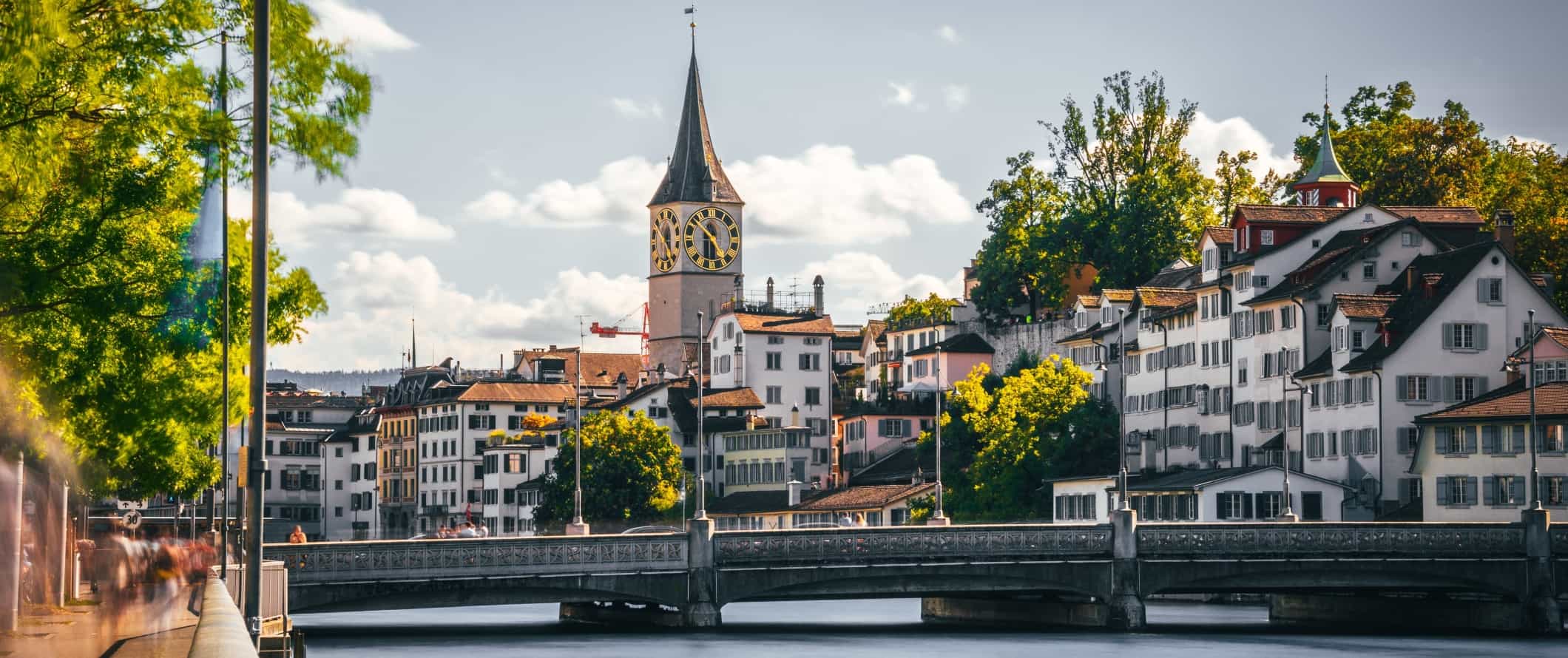
1. Tour the capital
Bern has an amazing historic center. This part of town is filled with medieval clocktowers, cobblestone streets, churches, and well-preserved sandstone homes. Be sure to walk the River Aare way, visit the History Museum and the Einstein Museum, and check out the bears at the Bear Park!
2. Ski the Matterhorn
The Matterhorn’s sharp angular peak is one of Switzerland’s most iconic attractions. You have to take a train or bus into the Zermatt area (the closest town to the mountain) as cars aren’t allowed. If you miss ski season, come hike the mountain in the summer. You can take the world’s highest cable car up to the viewing platform.
3. Visit Zurich
Zürich is also set on beautiful Zürich Lake, near the mountains, and is close to a lot of other cities (like Bern ). I love the historic center that opens up on the lake. A perfect day here involves sitting in the parks and drinking a beer on the lakefront. The city is also very arty and full of street art and museums.
4. Be adventurous in Interlaken
Interlaken is one of the outdoor capitals of the country (though it’s quite touristy during peak season). There is a lot to do here for the adrenaline-seeker: skydiving over a Swiss glacier, water-skiing, skiing, hiking, and more. This is also ground zero for backpackers since there are so many free outdoor activities.
5. Visit the Swiss Riviera
The “Swiss Riviera” is situated in Lavaux (Canton of Vaud) and goes along Lake Geneva. You can visit unique terraced vineyards that overlook the lake, the 12th-century castle Château de Chillon built on the water, and the town of Montreux, which is famous for its annual jazz festival.
Other Things to See and Do in Switzerland
1. join in the fasnacht spring carnival.
This festival in Basel is a three-day party that welcomes in the warm weather and takes place annually on the Monday following Ash Wednesday. It’s something that’s highly anticipated by both tourists and locals, and it’s definitely Switzerland’s most popular festival. Fasnächtlers dress in elaborate costumes to hide their identities and parade around town with “cliques” (bands playing drums and piccolos). All the bars and restaurants in town remain open throughout the entire three days and everyone is in a good mood!
2. Explore Geneva
As the third-largest city in Switzerland, Geneva offers spectacular views of the city’s lake (Lake Geneva), the world’s largest fountain, one of the main UN headquarters, a historic city center, and a collection of international restaurants to satisfy anyone’s palate. While you’re here, make sure you check out the Geneva’s Art and History Museum and the Red Cross and Red Crescent Museum. There are 40 museums here in total so there’s a lot to keep you entertained!
3. Hike Mt. Pilatus
Located right outside the city of Lucerne, this beautiful mountain has breathtaking views of the alps. From the city, you can take a gondola or hike the trails to the top to look out over the Swiss Alps (it’s about two hours to the top if you hike and 30 minutes by gondola). There are some easier trails around the northern side of Pilatus, as well as other attractions in the summer months such as a ropes course.
4. Picnic at the Rhine Falls
Pack a picnic and admire the view of Europe’s most powerful waterfall. If you hop on a boat tour you can get extra close to the giant rock in the middle of the falls and tour the Rhine Falls Basin. Nearby in the town of Schaffhausen, there’s a medieval castle that also houses a hostel for cheap (but interesting) accommodations.
5. Explore St. Gallen
The seventh-largest city in Switzerland, St. Gallen boasts beautiful museums, colorful murals, and one-of-a-kind architecture. It doesn’t receive as much tourist traffic as the other cities and regions around the country, but it’s a fun town full of students and you’re likely to befriend a few locals during your visit. Don’t miss the Baroque cathedral and the Abbey Library, which is home to nearly 170,000 documents. Some are hand-written and over a thousand years old!
6. Tour rural Switzerland
Rent a car and explore the Graubunden area of the country, where there are houses and structures dating back to the 13th century. You’ll also be able to hear the ancient language Romansh, which has died out everywhere else in the country and many locals take great pride in keeping the tradition alive. Of course, it’s a haven for nature lovers too — there are 615 lakes and 150 valleys in the region. Soglio, Brigels, Bergün, and Vals are just some of the quaint villages worth visiting in the region.
7. Have a romantic time in Montreux
With a picturesque castle (Chateau de Chillon) lying at the edge of a lake, this area makes for a romantic getaway. Tour the castle, which dates all the way back to the 12th century and inspired the likes of Lord Byron and Mary Shelley. The town was also the home of Freddie Mercury and there is a statue here in his honor. It costs 13.50 CHF to visit the castle.
8. Discover rural culture in Appenzell
This small village of 7,000 lies in the canton of Appenzell Innerrhoden. There are no cars and the village has upheld much of its local traditions and culture, including dance and folk music. It’s an incredibly picturesque little town, with frescoed buildings and narrow alleyways. Its location near the foot of the Alpstein mountains makes it a great gateway for participating in summer and winter outdoor activities like hiking and skiing. Take the Appenzell Railway to Wasserauen, and explore the fascinating prehistoric Wildkirchli caves (which were inhabited over 40,000 years ago).
9. Visit Lucerne
You can’t get much more of a typical Swiss destination than Lucerne. Located on the beautiful Lucerne Lake, the city offers a wonderful combination of urban life and nature. Spend some time in the old town, especially Weinmarkt, surrounded by medieval guildhalls and decorative buildings. Cross Chapel Bridge, the world’s oldest surviving truss bridge, and pay attention to the 17th-century ceiling paintings showing events from Lucerne’s history.
10. Ride the Jungfraujoch Railway
The Jungfraujoch is the highest train station on the continent. Started in 1896 and stretching 9 kilometers (5 miles), this mountain railway takes passengers up Kleine Scheidegg to the Jungfraujoch where they can admire stunning views and an incredible amount of snow. A round-trip journey costs 210.80 CHF.
For more information on specific cities in Switzerland, check out these city guides:
- Basel Travel Guide
- Bern Travel Guide
- Geneva Travel Guide
- Interlaken Travel Guide
- Zurich Travel Guide
Switzerland Travel Costs
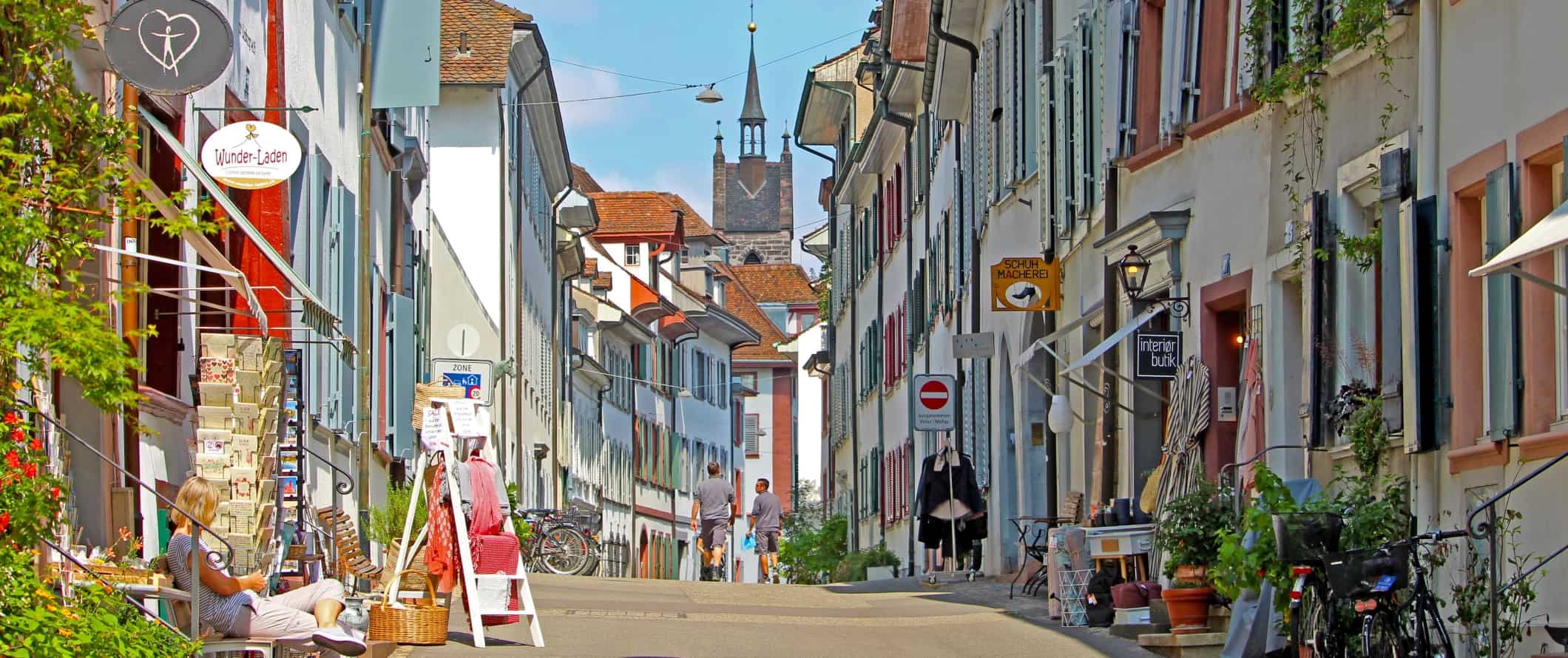
Accommodation – Hostel dorms average 30-40 CHF per night for a bed in a dorm with 6-8 beds. Private hostel rooms range from 70-120 CHF per night. Most hostels offer free linens, Wi-Fi, and some include breakfast.
For those traveling with a tent, there are a few campsites around Interlaken. Prices cost around 15-30 CHF per night for a basic plot for two people without electricity.
Hotels are super expensive, costing 70-120 CHF per night for a basic room. For something a little nice and more spacious, expect to spend closer to 150-200 CHF per night.
A much better alternative to hotels is Airbnb, where a private room typically costs 30-50 CHF per night and an entire apartment starts at about 70 CHF (though they usually cost double that so book early to find the best deals).
Food – With strong French, German, and Italian influences, Swiss cuisine is a mix of meat and potato-based dishes along with plenty of local cheeses. Popular dishes include veal and mushrooms, fondue (with bread or potatoes), rösti (fried grated potatoes), and quiche. Naturally, Swiss cheese and chocolate should not be missed either. When it comes to breakfast, muesli is a go-to healthy choice.
If you want to eat out, bars and cafés are the cheapest food option and cost about 9-15 CHF for a lunch special. An inexpensive restaurant costs about 25 CHF while a 3-course meal at a mid-range one costs about 60 CHF.
If you want to drink with your meal, a beer costs around 7 CHF and cocktails can cost 12-15 CHF.
Fast food (think McDonald’s) costs around 15 CHF for a combo meal. A large pizza is 15-21 CHF.
You can keep your food spending in check by going to the local supermarkets and buying your own groceries. Expect to spend around 100-125 CHF per week for basic staples like pasta, rice, eggs, seasonal produce, and some meat. The major supermarkets are Migros, COOP, and Spar. COOP is the most expensive.
Backpacking Switzerland Suggested Budgets
If you’re backpacking Switzerland, my suggested budget is 95 CHF per day. This covers staying in a hostel dorm, cooking al of your meals, taking public transit, limiting your drinking, and doing most free activities like enjoying nature and taking walking tours.
A mid-range budget of about 200 CHF per day covers a private Airbnb, eating out for a few meals, enjoying a few drinks, taking the occasional taxi to get around, and doing more paid tours and activities like visiting museums and going skiing.
For a “luxury” budget of 400 CHF or more per day, you can stay in a hotel, eat out for all your meals, drink more, rent a car or take more taxis, and do whatever tours and activities you want. This is just the ground floor for luxury though. The sky is the limit!
You can use the chart below to get an idea of how much you need to budget daily. Keep in mind these are daily averages — some days you spend more, some days you spend less (you might spend less every day). We just want to give you a general idea of how to make your budget. Prices are in CHF.
Switzerland Travel Guide: Money Saving Tips
Switzerland is a very expensive country to visit but there are plenty of ways to save money in the country, especially if you like the outdoors (nature is free!). Here are some ways I lowered my costs while visiting Switzerland:
- Get a student discounts – Many museums and other tourist attractions offer student discounts so always ask if there are discounts if you happen to be a student. You’ll save around 20% off.
- Get a city card – Most cities have a city tourist passes that get you discounts or free admission into museums and various local sights. Most of them also provide free public transportation too. If you’re planning on doing a lot of sightseeing, these cards are really cost-effective and can save you around 20-40%. Just make sure the cost of the pass is less than the cost of seeing the attractions you want.
- Stay with a local – Couchsurfing is a service that lets travelers stay with locals for free. It was a lifesaver that allowed me to keep my costs down the most. Since a lot of travelers use this service, make your requests for hosts early.
- Use BlaBlaCar – Transportation is very expensive, even more so than accommodation. Most intercity trains are around 50 CHF. That adds up quickly! Instead, use the ride-sharing website BlaBlaCar to avoid the trains and meet locals. It’s like Airbnb but for ridesharing. Just make sure you’re flexible as some rides will cancel last-minute.
- Use hotel points – Hotel reward points are a lifesaver in an expensive destination, so rack up hotel points before your trip. This tip really only works if you are from the U.S. (though there are options in Canada, the U.K., Australia, and New Zealand) but hotel points have save me thousands of dollars a year. You can click here to learn about how to get points and free hotel stays .
- Don’t drink – Alcohol is not cheap here. Skip the booze to save money and keep your budget intact. If you do drink, stick to happy hours and hostel bars for the cheapest drinks.
- Cook your meals – Eating out here is expensive so go grocery shopping and cook your own meals to save. It’s not glamours, but it makes visiting Switzerland much more affordable! My recommendation is to make your own lunch and then eat out for dinner if you don’t want to cook.
- Eat lunch specials – If you are going to eat out, do so during lunch when most lunch specials at cafes and restaurants cost around 10-19 CHF. It’s the cheapest time to eat out.
- Bring a water bottle – The tap water here is safe to drink so bring a reusable water bottle to save money and reduce your plastic use. LifeStraw is my go-to brand as their bottles have built-in filters to ensure your water is always clean and safe.
Where to Stay in Switzerland
Hostels are the way to go in Switzerland but unfortunately there aren’t many of them. If you are traveling during peak season, be sure to book well in advance as they fill up quickly. My favorite places to stay in the country are:
- Balmers (Interlaken)
- Backpackers Villa Sonnenhof (Interlaken)
- Zurich Youth Hostel (Zurich)
- Oldtown Hostel Otter (Zurich)
- City Hostel (Geneva)
- Nyon Hostel (Geneva)
- Bern Youth Hostel (Bern)
- Bern Backpackers Hotel & Hostel Glocke (Bern)
- Basel Backpacker (Basel)
- Hyve Hostel Basel (Basel)
How to Get Around Switzerland
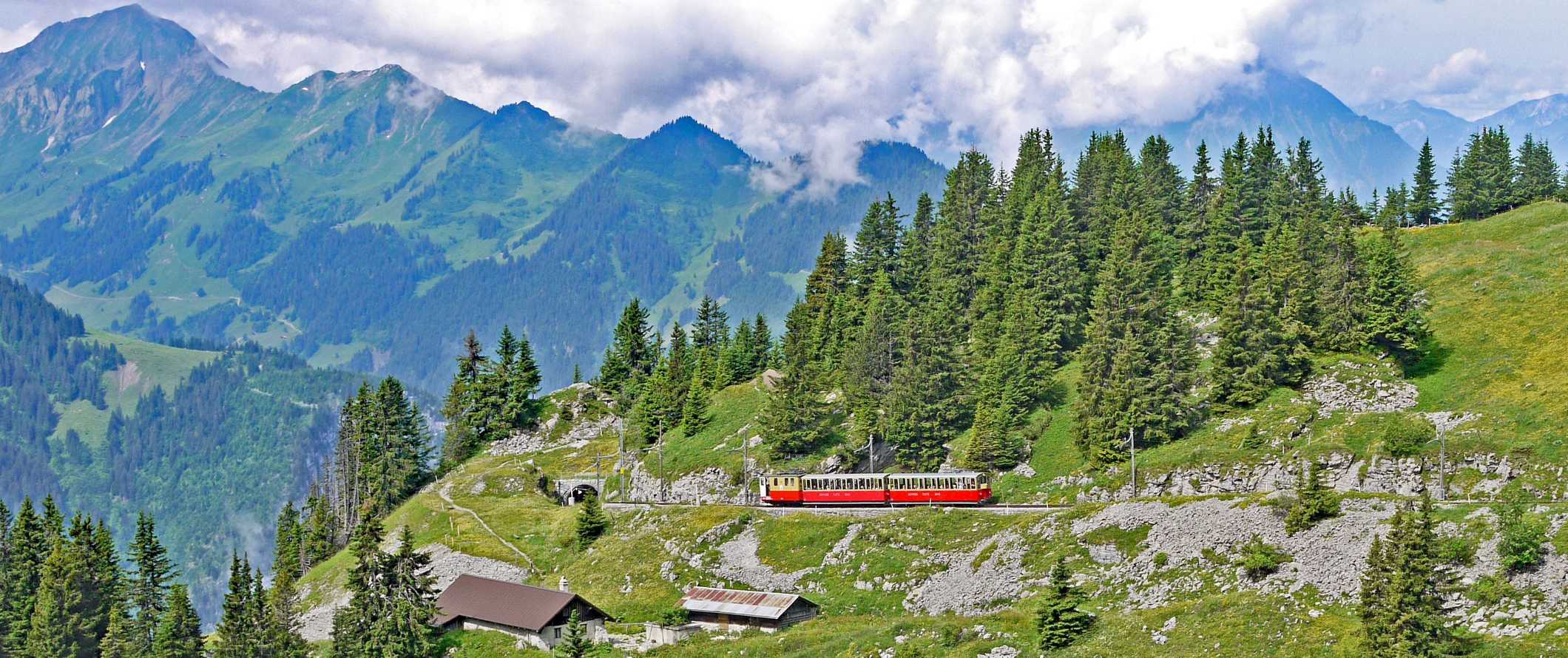
Public transportation – Cities and towns in Switzerland are incredibly well connected with trams, buses, funiculars, and trains. Each mode of transportation is safe, clean, and reliable. A single fare usually costs between 2.50-5 CHF depending on the length of time and number of zones you travel.
You should consider getting a Swiss Half Fare Card. It allows you to travel by train, bus, boat, and most mountain railways at half the price for one full year. It costs 185 CHF. This is only cost-effective if you intend to spend more than 370 CHF on public transportation.
If you’re staying a while and plan on cramming a LOT into your itinerary, you might want to look into getting a Swiss Travel Pass . It’s steep in price, ranging from 232 CHF for three consecutive days to 429 CHF for 15 consecutive days (there are non-consecutive passes as well), but it could be worth your time. It covers public transit, free travel on panorama trains, admission to 500 museums, mountain excursions, and more. The card also holds your Mobility and PubliBike memberships, and any MobilSki passes for the resorts.
If you’re considering the Swiss Half Fare Card or the Swiss Travel Pass, use the sbb.ch website to figure out the full fares for some of the trips you plan to make. This is the best way to figure out if either card is cost-effective for you.
Train – Train is the best way to travel in Switzerland and is the most preferred method for locals. It’s economical and efficient. Bern to Geneva (a two-hour ride) costs 50-95 CHF. The two-hour trip from Zurich to Interlaken is 54-96 CHF, while a one-hour trip from Zurich to Bern is 40-75 CHF. Expect to pay anywhere between 40-100 CHF for a second-class train ticket between cities.
As mentioned above, if you plan on doing a lot of train travel, consider the Swiss Travel Pass or the Half Fare Card.
To find routes and prices for trains around Europe, use Trainline .
Bus – FlixBus offers a few routes around the country. A 90-minute ride from Zurich to Bern starts at just 6 CHF, while a 5-hour journey from Zurich to Geneva starts at 17 CHF. It’s considerably cheaper than the train but options are much more limited than the train.
Flying – The country is so tiny, there’s no need to fly. It’s expensive and not worth the hassle. Take the train or bus instead.
Ridesharing – Using a ridesharing service like BlaBlaCar is one of the best ways to get around the country, although it does require some flexibility. You simply request a seat, pay a small fee, and off you go! It’s a faster and more interesting way to travel than by bus or train.
When to Go to Switzerland
Most visitors come to Switzerland in the summer, between May and September. July and August have the warmest temperatures, with snow-free hiking trails and longer days. If you’re around on August 1st, there are tons of celebrations for Swiss National Day (fireworks!). Peak summer temperatures are 18-28 °C (65°-82°F).
The shoulder seasons are from April-May and October-November, which is known in Switzerland as Zwischenzeit — the “between time” for the ski and summer seasons. It’s a good time for city hopping, but the ski resort towns are completely quiet and a lot of things are closed. The weather can also be unpredictable.
Ski season is from December to March, where resort towns get crowded and very expensive! If you’re a skier, that probably won’t matter much as Switzerland has some of the best skiing in the world. Conversely, cities like Zurich are quieter as everyone flocks to the mountains. The weather is cold and hovers below freezing so be sure to pack plenty of layers.
How to Stay Safe in Switzerland
Switzerland is one of the safest countries in the world. The most common type of crime is pickpocketing in tourist-heavy areas, but even that is rare. In some cities, like Geneva, petty crime is on the rise but it’s still nothing to be concerned about. Just keep your valuables secure and out of reach and you’ll be fine.
Solo female travelers should feel safe here, though the standard precautions apply (don’t leave your drink unattended at the bar, don’t walk home alone at night if intoxicated, etc.)
If you’re traveling in the mountains, keep an eye on weather reports and forecasts. The weather can be extreme and change rapidly so plan accordingly. If you go hiking alone, let your hostel/hotel staff know where you’re heading just in case.
While scams here are rare, if you’re worried about getting ripped off you can read about common travel scams to avoid here.
If you plan on hiking or spending some time skiing in the mountains, pay careful attention to weather reports. Heed avalanche warnings, and stay off the trails if you’re told to do so.
If you experience an emergency, dial 117 for assistance.
Always trust your gut instinct. Make copies of your personal documents, including your passport and ID. Forward your itinerary along to loved ones so they’ll know where you are.
The most important piece of advice I can offer is to purchase good travel insurance. Travel insurance protects you against illness, injury, theft, and cancellations. It’s comprehensive protection in case anything goes wrong. I never go on a trip without it as I’ve had to use it many times in the past. You can use the widget below to find the policy right for you:
Switzerland Travel Guide: The Best Booking Resources
These are my favorite companies to use when I travel. They consistently have the best deals, offer world-class customer service and great value, and overall, are better than their competitors. They are the companies I use the most and are always the starting point in my search for travel deals.
- Skyscanner – Skyscanner is my favorite flight search engine. They search small websites and budget airlines that larger search sites tend to miss. They are hands down the number one place to start.
- Hostelworld – This is the best hostel accommodation site out there with the largest inventory, best search interface, and widest availability.
- Booking.com – The best all around booking site that constantly provides the cheapest and lowest rates. They have the widest selection of budget accommodation. In all my tests, they’ve always had the cheapest rates out of all the booking websites.
- Get Your Guide – Get Your Guide is a huge online marketplace for tours and excursions. They have tons of tour options available in cities all around the world, including everything from cooking classes, walking tours, street art lessons, and more!
- SafetyWing – Safety Wing offers convenient and affordable plans tailored to digital nomads and long-term travelers. They have cheap monthly plans, great customer service, and an easy-to-use claims process that makes it perfect for those on the road.
- LifeStraw – My go-to company for reusable water bottles with built-in filters so you can ensure your drinking water is always clean and safe.
- Unbound Merino – They make lightweight, durable, easy-to-clean travel clothing.
- Top Travel Credit Cards – Points are the best way to cut down travel expenses. Here’s my favorite point earning credit cards so you can get free travel!
Switzerland Travel Guide: Related Articles
Want more info? Check out all the articles I’ve written on backpacking/traveling Europe and continue planning your trip:
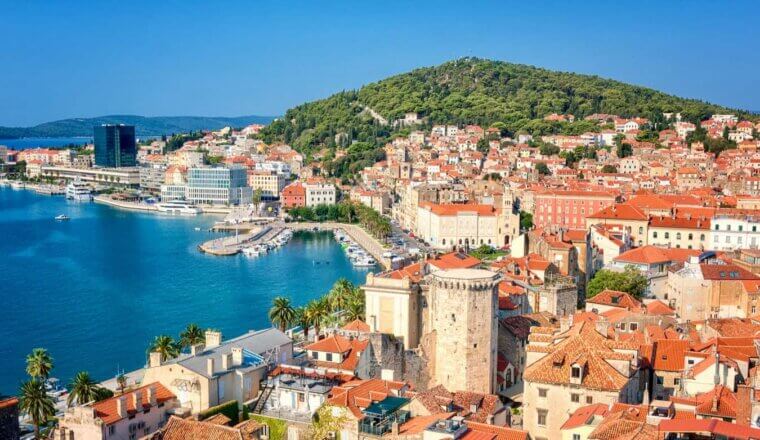
The Perfect 7-Day Croatia Itinerary
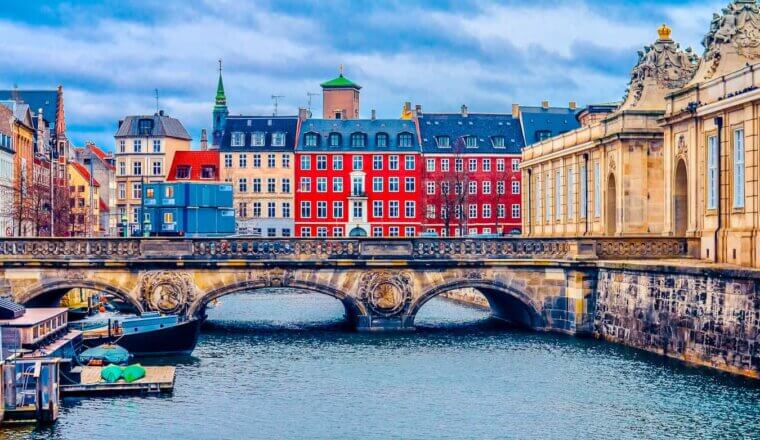
The 6 Best Hotels in Copenhagen

The 6 Best Hotels in Florence
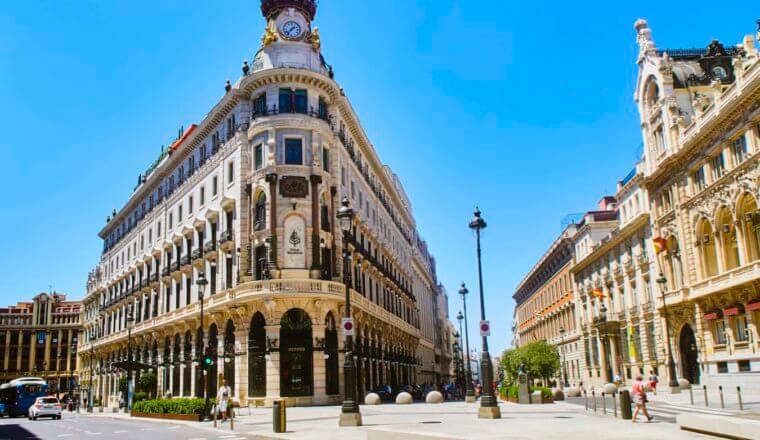
The 7 Best Hotels in Madrid
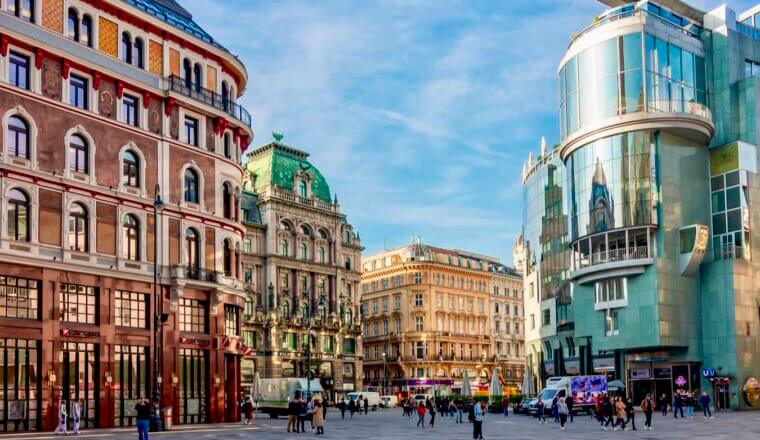
The 6 Best Hotels in Vienna

The Best Walking Tours in Barcelona
Get my best stuff sent straight to you, pin it on pinterest.
- Where To Stay
- Transportation
- Booking Resources
- Related Blogs
- Travel Planning Guide
How much does a trip to Switzerland Cost?

How much money should you budget for your trip to Switzerland?
- How much does a one-week trip to Switzerland cost?
- How much does a two-week trip to Switzerland cost?
- How much does a one-month trip to Switzerland cost?
- Hostel Prices
- Hotel Prices
The Cost of a Trip to Switzerland
For a trip to Switzerland, you should plan for daily costs anywhere between $117 to $669. If there's two of you traveling, your daily expenses could range from $235 to $1,337. These price ranges are based on the average daily spending of $284 (Sfr259) per person which comes from the travel expenses of other visitors. These costs include food, accommodation, sightseeing activities, and getting around locally. Keep in mind, though, these figures can vary somewhat based on your individual travel style, level of luxury, and chosen activities. Destinations across the country, such as Zurich, Geneva, and Basel, might might vary somewhat from the overall average price, but they usually stick close to this range. Read on for a breakdown of travel typical expenses as well as a comparison of tour prices versus Independent travel.
For budget travelers in Switzerland, planning for around $117 (Sfr107) per day should cover essentials such as accommodations in hostels and budget hotels, affordable meal options, local transportation, and engaging in various activities. If you're a mid-range traveler, setting aside around $284 (Sfr259) per day would allow for more comfortable stays in typical hotels, dining at regular restaurants, and exploring a diverse range of popular attractions. Luxury travelers, on the other hand, should consider a daily budget of approximately $669 (Sfr611) to accommodate higher-end hotel stays, dining at nicer restaurants, and indulging in more exclusive private tour options. It's important to note that these price ranges are derived from our extensive travel cost data for Switzerland, which is based on valuable insights from other travelers as well as hotel and tour data provided by travel companies. For a more detailed breakdown of travel costs, you can refer to our comprehensive travel cost data for Switzerland .
How much does a one week trip to Switzerland cost?
On average, visitors to Switzerland spend between $822 and $4,680 for their week-long adventure, with the average being $1,986. This covers sightseeing, local transportation, food, and accommodations. With a duration of one week, you'll have the opportunity to explore one, two, or even three locations within Switzerland, depending on the level of depth you desire for your visit. Some of the most popular places to consider exploring are Zurich , Geneva , and Basel . It's important to note that these figures are averages and can vary based on personal preferences and choices. Ultimately, the goal is to create a memorable and enjoyable experience tailored to your specific interests.

How much does a two week trip to Switzerland cost?
With two weeks, you should budget between $1,644 and $9,360 for your trip to Switzerland. The average price for a two week trip is $3,971. Two weeks will allow you enough time to visit between three and five places. If you're on a budget, you might want to consider some of the more affordable places such as Geneva, Lucerne, and Zermatt.
How much does a one month trip to Switzerland cost?
When embarking on a month-long trip to Switzerland, expenses can range from $3,524 to $20,058, with an average cost falling around $8,510. For those fortunate enough to have a full month, considering a vacation rental with a kitchen for at least a portion of your stay can help save money with meals. Backpackers often opt for hostels due to their affordability and the added benefit of a social vibe.
Hostel Prices in Switzerland
With more than 60 hostels in Switzerland, the average price is $53 per night for a dorm bed. Hostels are a terrific option for younger independent travelers looking to save money while staying social during their trip. With many types of hostels, it can be overwhelming to sort out the best places, though. Our analysis of the hostels in Switzerland not only found the average price, but also uncovered some surprises about the overall quality, amenities, and atmosphere of hostels in the region. You can see more details from our analysis about typical hostel prices in Switzerland here .
Here are a few sample prices from popular hostels in Switzerland.
- $54 for a dorm bed at Backpackers Lucerne in Lucerne more details
- $47 for a dorm bed at Balmers Hostel in Interlaken more details
- $60 for a dorm bed at Zurich Youth Hostel in Zurich more details
Hotel Prices in Switzerland
You'll find a wide range of hotel options across Switzerland. Below are prices for some of the destinations, and for more details see our analysis of hotel costs in Switzerland .
Chesa Valese
Ema house hotel suites.
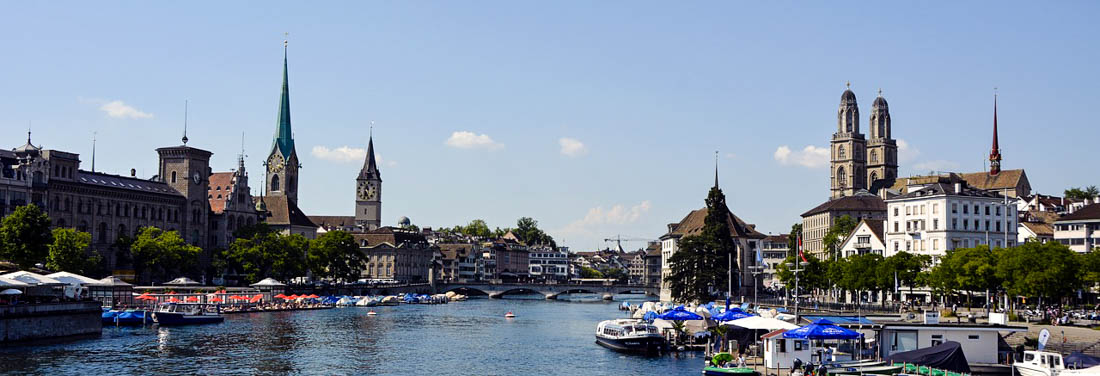
Should you do an organized tour or travel independently in Switzerland?
Organized tours and independent travel are essentially the two main ways to plan a trip to Switzerland. Organized tours offer a convenient and hassle-free experience, with travel experts handling all the logistical details and the added benefit of an expert guide imparting valuable insights. This option is favored by those who appreciate the convenience and ease provided by tours that often include transportation and expert guides.
On the other hand, independent travel provides a different set of advantages, allowing for greater freedom and flexibility in customizing itineraries and exploring at one's own pace. This option appeals to individuals who value spontaneity and control, enabling them to immerse themselves in local culture on a deeper level.
Ultimately, the choice between organized tours and independent travel depends on personal preferences and travel style, considering factors such as convenience, guidance, and flexibility.
Comparing Trip Costs in Switzerland
When we compare the prices of organized tours to the average costs of independent travelers, we can see that sometimes the prices are fairly even.
Tours vs. independent Travel: Pros & Cons
Organized tours.
- An expert guide familiar with the culture
- Convenient transportation
- Fellow travelers to socialize with
- Well researched activities
- Efficient and thought out itinerary
- The security of have a trip leader if something goes wrong
- Limited options
- Usually not customizable
- The fast pace often means you can’t visit one place in depth
- Usually more expensive than independent travel
- There may be limited time to interact with the local culture and community
Independent Travel
- Completely customizable
- Opportunity to visit off-the-beaten-path destinations
- Can fully immerse yourself in the local culture
- Freedom to move at your own pace
- Flexibility to change your itinerary at any time
- More affordable
- Challenging to plan an efficient itinerary
- Transportation may be challenging or inefficient
- Booking and trip planning can be a hassle
- Popular sights may sell out well in advance
- If something goes wrong, you're on your own
Are organized tours more expensive than independent travel in Switzerland?
Organized tours typically average around $414 per day and provide the convenience of an all-inclusive package with one comprehensive payment. On the other hand, independent trips usually average around $284 (Sfr259) per day and involve individual payments for accommodations, local transportation, meals, and sightseeing. Both organized tours and independent trips have their own unique challenges and benefits, so it's crucial to thoroughly understand the aspects of each to make a fair comparison. For a detailed analysis of tour prices in Switzerland, check out our comprehensive guide on tour prices in Switzerland here .
Here are a few sample tours in Switzerland:
- Lake Constance | Self-Guided | Germany, Austria, Switzerland ($1,127) 6 days, 5 destinations more details
- Spectacular Switzerland ($3,759) 9 days, 11 destinations more details
- First Discovery ($1,471) 5 days, 10 destinations more details
- Tailor-Made Private Swiss Tour to Golden Pass Line with Daily Departure ($4,809) 5 days, 7 destinations more details
- Country Roads of Switzerland (Small Groups, 14 Days) ($8,465) 14 days, 16 destinations more details
More for Switzerland
If you're planning a trip to Switzerland, check out these other informative travel guides.
We've been gathering travel costs from tens of thousands of actual travelers since 2010, and we use the data to calculate average daily travel costs for destinations around the world. We also systematically analyze the prices of hotels, hostels, and tours from travel providers such as Kayak, HostelWorld, TourRadar, Viator, and others. This combination of expenses from actual travelers, combined with pricing data from major travel companies, gives us a uniqe insight into the overall cost of travel for thousands of cities in countries around the world. You can see more here: How it Works .
Subscribe to our Newsletter
Coupons and discounts! Travel tips!
1 Categories averaged on a per-item basis. 2 Categories averaged on a per-day basis. For example, the Food 2 daily average is for all meals for an entire day, while Entertainment 1 is for each individual purchase. Thus, the overall daily average cost is not a summation of the individual categories.
- You are welcome to reference or display our travel costs on your website as long as you provide a link back to this page .
- For a basic link, you can copy and paste the HTML link code, or this page's address. Address Link HTML Switzerland Travel Costs " disabled />

Some of the links on this website are sponsored or affiliate links which help to financially support this site. By clicking the link and making a purchase, we may receive a small commission, but this does not affect the price of your purchase.
- Privacy / Terms of Use
- Activities, Day Trips, Things To Do, and Excursions
in Switzerland
What Does a Trip to Switzerland Cost? A Comprehensive 2024 Guide
Updated: Apr 21
Switzerland, nestled in the heart of Europe, offers travelers a mesmerizing blend of natural beauty, rich history, and vibrant culture. Understanding the potential costs is key to planning a memorable yet affordable Swiss adventure. Here, we provide detailed insights into various expenses and tips for saving money without compromising quality.
Flights to Switzerland
Flight costs to Switzerland vary by season and departure point. From the US, round-trip tickets range from $600 to $1,500. Other global cities like London, Sydney, or Tokyo also offer varying prices, with economy fares starting at around $500 for one-way and $800 for round-trip.
Accommodation
Accommodation in Switzerland spans from budget-friendly hostels at $50 per night to luxurious hotels at over $500. Mid-range hotels in major cities like Zurich and Geneva average $150 to $250 per night. Smaller towns offer more affordable options, with luxury rooms ranging from $250 to $400.

Transportation
Switzerland's efficient public transport includes subways and trains, costing $2 to $10 per ride. Taxis, though pricier, offer high-quality service. Car rentals range from $50 to $150 per day, providing flexibility for scenic drives across the well-maintained road network.
Enjoy budget meals at local eateries for $15 to $25, or dine at mid-range restaurants for $30 to $50 per person. Supermarkets and convenience stores are great for saving on food expenses. Remember, tipping is not customary as service charges are included in bills.
Sightseeing and Activities
Switzerland's natural attractions, like the Alps and picturesque villages, offer many free or low-cost sightseeing opportunities. Paid attractions like the Jungfraujoch cost around $100 per person. Museums and cultural events often have discounted or free entry days.
Swiss army knives range from $20 to $500, while Swiss chocolates and cheeses are affordable gifts. Luxury Swiss watches can start at $200, going up to $10,000 or more.
Wi-Fi and Communication
Rental Wi-Fi routers and SIM cards are available, with prices varying based on data plans. Many accommodations provide free Wi-Fi, and free hotspots can be accessed through apps like "Swisscom WiFi."
Visa fees vary by nationality. U.S. citizens pay around $60 for a short-stay Schengen visa. Check with local embassies for the most up-to-date information.
Travel insurance ranges from $50 to $200 for single trips, with annual policies available for frequent travelers. Comprehensive policies include coverage for medical emergencies, trip cancellations, and lost belongings.
Budget Considerations
Budget travelers can expect daily expenses of $100 to $150, while mid-range travelers may spend $200 to $300. Accommodation, dining, transportation, and activities are key factors influencing these costs.
Money-Saving Tips
Travel during shoulder seasons, use public transportation, and choose budget accommodations. Cooking meals and exploring free attractions also help cut costs. The Swiss Travel Pass offers unlimited travel and discounts on select attractions.
Traveling Smart
Pack for varying weather, explore beyond major cities, and immerse yourself in Swiss culture. Learn basic phrases to engage with locals and enhance your experience. Respect punctuality and opt for public transport for its reliability.
Cost for 7-Day Trip
A 7-day trip to Switzerland involves various costs, including accommodation, transportation, food, and activities. Here's a breakdown:
Flights : Round-trip tickets from major cities range from $600 to $1,500.
Accommodation : Budget hotels start at $50 per night. For 7 nights, expect to pay $350 for budget stays. Mid-range hotels can cost $150 to $250 per night, totaling $1,050 to $1,750.
Transportation : Public transport costs between $2 and $10 per ride. A Swiss Travel Pass, offering unlimited travel, is a cost-effective choice for extensive travel.
Food : Budget meals average $15 to $25 per person, per meal. For 7 days, expect to spend around $315 to $525 on food.
Sightseeing : Attractions range from free to around $100 for premium experiences like the Jungfraujoch. Budget approximately $200 to $400 for a week of activities.
Overall, a budget traveler can expect to spend approximately $1,565 to $2,765 for a 7-day trip, while a mid-range traveler may spend around $2,265 to $3,965.
Cost for 10-Day Trip
For a longer 10-day trip, costs increase proportionally:
Flights : Same as for a 7-day trip.
Accommodation : For budget hotels, expect around $500 for 10 nights. Mid-range options may total $1,500 to $2,500.
Transportation : Consider a longer-duration Swiss Travel Pass or individual tickets.
Food : Budget around $450 to $750 for meals over 10 days.
Sightseeing : Allocate $300 to $600 for entrance fees and activities.
A 10-day trip for a budget traveler may cost around $2,150 to $3,850, while mid-range travelers could spend approximately $2,850 to $5,150.
Additional reads
According to resources like Trip.com and Never Ending Footsteps , budget travelers can explore Switzerland without breaking the bank by making smart choices on accommodations, dining, and activities. Additionally, Lonely Planet emphasizes that some of the best experiences in Switzerland are free, from scenic hikes to charming villages.
In conclusion, the cost of traveling to Switzerland varies depending on the length of your stay, your travel style, and your chosen activities. By being mindful of your expenses and utilizing money-saving strategies, you can enjoy an unforgettable Swiss experience, whether it's a 7 or 10-day adventure.

What are we about?
Summertime in Switzerland: Discover tips, tricks, and lifestyle hacks from locals to fully enjoy the Swiss summer.
Stay updated with the latest news and exclusive insights. Subscribe now and don't miss out!
Thanks for submitting!
- Meet the Team
- Work with Us
- Czech Republic
- Netherlands
- Switzerland
- Scandinavia
- Philippines
- South Korea
- New Zealand
- South Africa
- Budget Travel
- Work & Travel
- The Broke Backpacker Manifesto
- Travel Resources
- How to Travel on $10/day
Home » Europe » Switzerland » Travel Expensive
Is Switzerland Expensive? Tips and Tricks for Visiting Switzerland on a Budget
Switzerland is a beautiful place to visit. The countryside is dotted with many small villages and towns, and the landscape is uniquely charming.
The country is renowned for its tasty cuisine and interesting dishes to dazzle your taste buds. From the hearty Raclette, which is hot cheese on a bed of potatoes, to the traditional dried Landjaeger sausages there’s always something new to try here.
Ancient castles and remnants from the medieval ages can be found peppered throughout the landscape as well. These fortresses are marvels of architecture and tease adventure seekers to explore their many corridors.
But is Switzerland expensive?
Switzerland can potentially be a very expensive destination to travel to. Transportation, lodging, and dining can all cost an arm and leg here. However, by doing research and making preparations beforehand, you can cut down on many unnecessary expenses.
Sticking to this guide on traveling Switzerland on a budget can keep your trip hassle-free so that you can focus on having a blast!

Do You Want to Travel FOREVER??
Pop your email in below to get a FREE copy of ‘How to Travel the World on $10 a Day!’.
So, How Much Does a Trip to Switzerland Cost on Average?
Cost of flights to switzerland, price of accommodation in switzerland, cost of transport in switzerland, cost of food in switzerland, price of alcohol in switzerland, cost of attractions in switzerland, additional costs of travel in switzerland, some final tips for saving money in switzerland, so is switzerland expensive, in fact.
It’s important to look at all the potential variables and costs you could face before making the trip. Here are some of the Switzerland travel costs that we’ll address:
- Flights to and from major city centers.
- Food and beverages.
- Transport around the country.
- Accommodation – we all need a place to rest our heads.
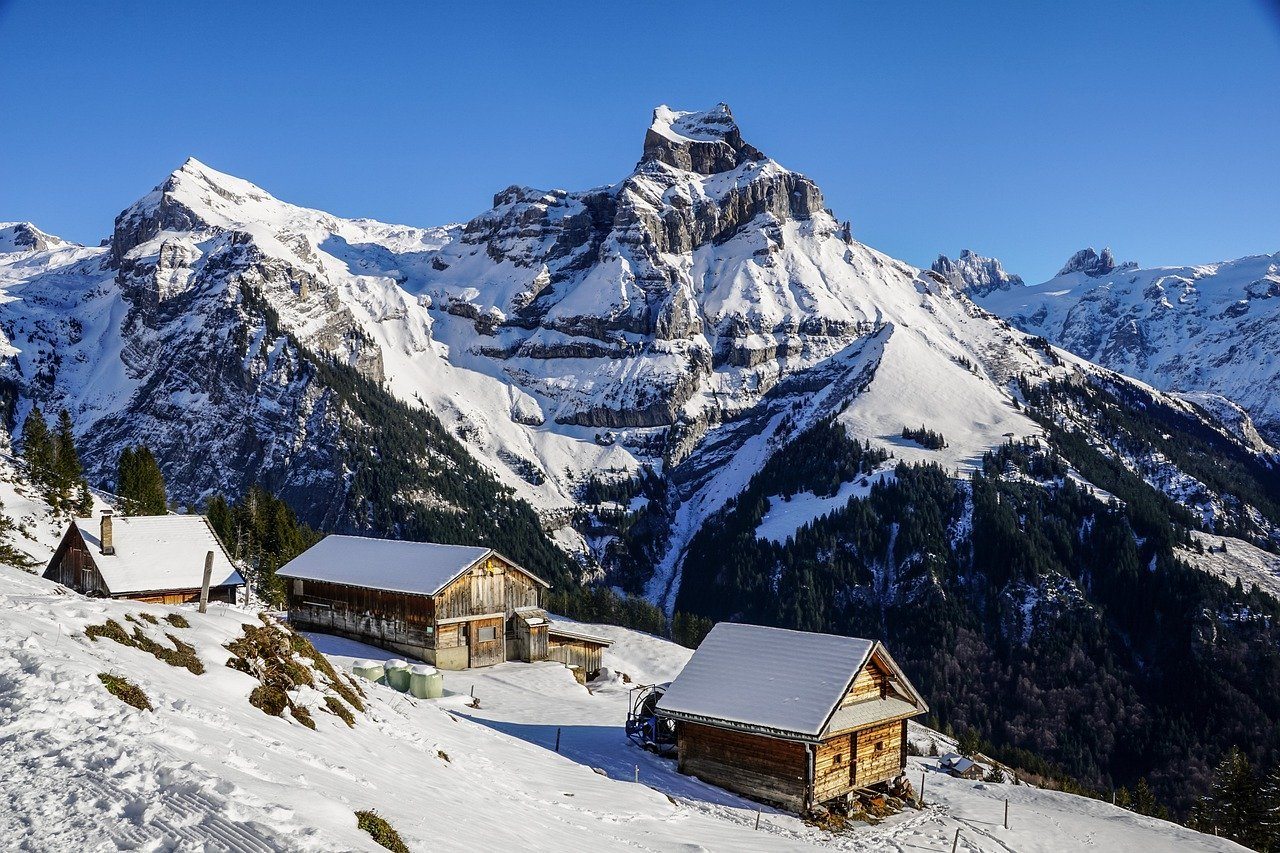
The Broke Backpacker is supported by you . Clicking through our links may earn us a small affiliate commission, and that's what allows us to keep producing free content 🙂 Learn more .
The costs outlined in this article are subject to change and may fluctuate. These are mostly a guideline for your convenience. To make it a bit easier, we will be using the US Dollar (USD) for all prices.
The national currency of Switzerland is the Swiss Franc (CHF). The current exchange rate at the time of writing is 1 USD – 0,97 SFR.
2 Weeks in Switzerland Travel Costs
The average daily costs of living you can expect in Switzerland:
ESTIMATED EXPENSE: $70 – $1200 USD for a round trip ticket
Paying for your flights to Switzerland is going to be the first major hit to your travel budget. However, prices may tilt in your favor, depending on the time of year, as well as where you’re coming from.
We’ve compiled a list of round-trip tickets to Switzerland from some major cities for your convenience:
- New York to Zurich: 520 – 700 USD
- London to Zurich: 66 – 150 GBP
- Sydney to Zurich: 1032 – 1300 AUD
- Vancouver to Zurich: 1022 – 1214 CAD
It’s important to note that these prices are subject to change with time.
By researching airfare deals and flying in the off-season, you can save a lot of money for your travel budget. You can definitely take advantage of special deals that come up and error fares if you take the time to observe the flight schedules and airfare.
ESTIMATED EXPENSE: $80-$200 USD per day
Switzerland is a relatively small country that sees many tourists annually. With these two ingredients, you have the perfect recipe for high accommodation prices. In the larger cities, hotels can range upwards from $200 per day.
However, by choosing the right type of accommodation to suit your needs and your budget, you can easily save money. Swiss guest houses, hostels or even certain AirBnB’s will cost significantly less during your stay.
If you’re traveling with a significant other, booking a small Airbnb apartment can provide more privacy and quiet.
Hostels in Switzerland
Hostels are popular with travelers looking to go backpacking in Switzerland . Most nomads traveling throughout the world know that staying in hostels will almost always be your cheapest option.
If you’re traveling alone through Switzerland and want to stick to your budget, then hostels are a great way to save a bit of money!
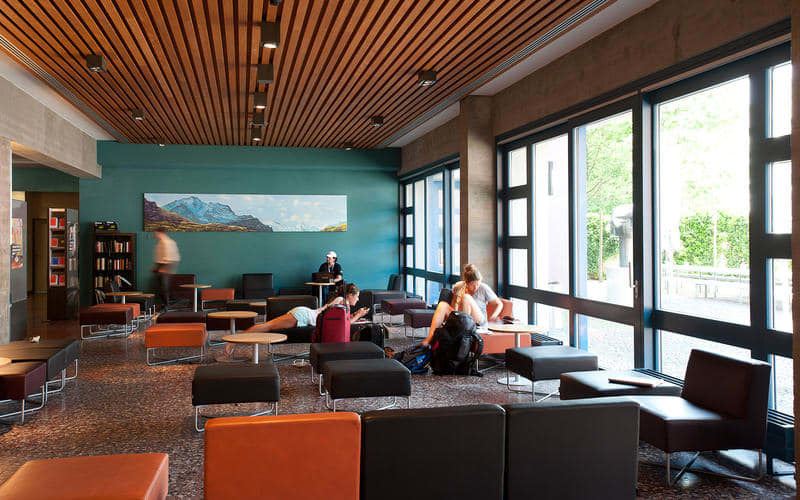
Choosing to stay in a hostel dorm in Switzerland usually starts around $40 USD per night. If you’d like more privacy, there are private rooms available as well. They tend to increase substantially to around $107-190 USD.
Living with people from other countries can be an amazing opportunity to learn about their traditions and culture too.
Hostels are incredibly social environments with like-minded nomads sharing stories and enjoying each other’s company.
Here are some of the best hostels available for travelers in Switzerland:
- City Backpacker – Hostel Biber: This hostel has both private and dorm rooms available at very affordable prices, both come with free wifi.
- Youthhostel Zurich : Free breakfast an awesome staff and super clean, what’s not to like
- Oldtown Hostel Otter : This quaint hostel has received superb reviews with compliments to their cleanliness, free breakfast and is close to some beautiful churches and museums.
Want to find the right hostel for you? Check out the 35 Best Hostels in Switzerland !
Airbnbs in Switzerland
The average price of booking an Airbnb in Switzerland can vary greatly, depending on the location and size of the building itself. This particular accommodation, however, is perfect if you’re traveling with your significant other and are searching for something more private.
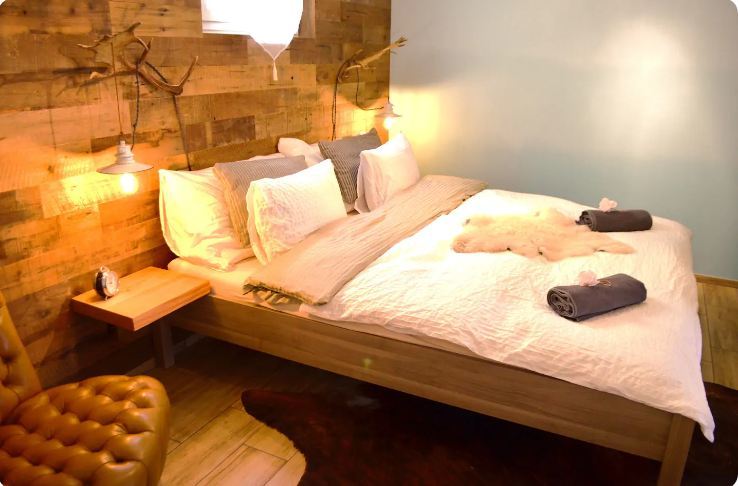
Airbnb is used by many travelers across the globe as a reliable accommodation option. Another benefit of staying in these apartments is that you usually get access to a full kitchen and will be able to cook without having to dine out.
Using Airbnb is the best way to find apartments efficiently and reliably.
We’ve compiled a list for you with some of the best Airbnb’s available in Switzerland:
- Studio für 1 -2 Personen : This lovely studio apartment has received magnificent reviews, and a full kitchen, TV and wifi are included throughout the stay.
- Ferienwohnung in Marye’s Farmhouse, Erholung pur: You’ll have the entire home to yourself during the course of your stay here, many previous travelers have praised this apartment for its beauty and cleanliness.
- Moderne Blockhauseinliegerwohnung Auf Biobauernhof: Highly praised for its spectacular location, this quaint apartment offers all the amenities of home with free wifi and a full kitchen. The wooden finish of the home makes it feel incredibly cozy!
Hotels in Switzerland
Regardless of where you decide to travel, hotels will be among the most expensive accommodations. Switzerland is no exception.
The average price for a decent hotel room in Switzerland can range between $100 – 300 USD. However, deciding to stay in a hotel will give you access to certain luxuries and amenities.
Access to swimming pools, gyms, and outstanding service are what you can usually expect from hotels in Switzerland.
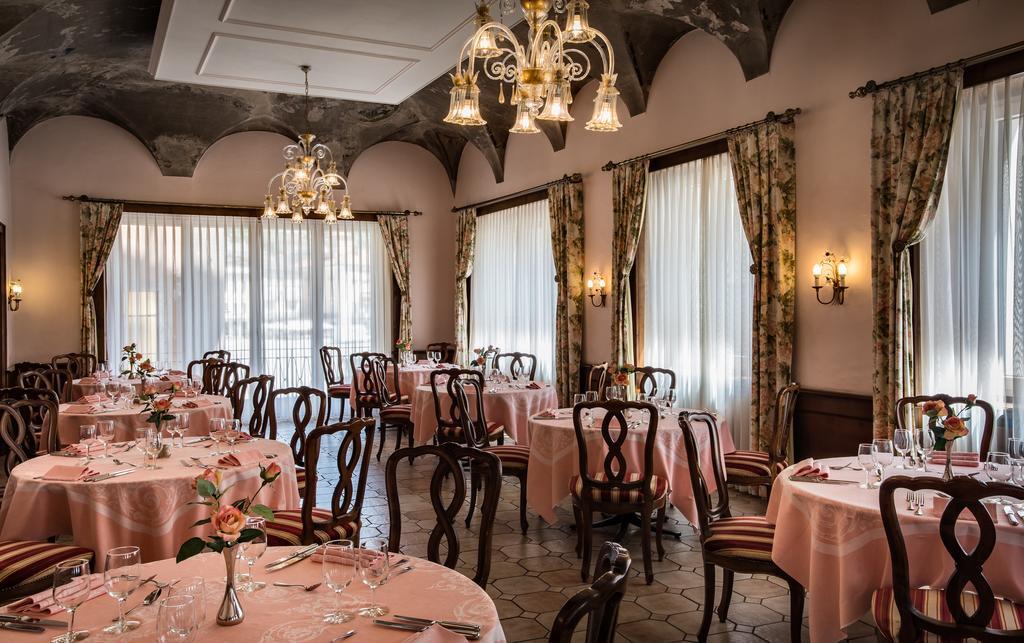
Staying in a hotel is only an option if you have a larger budget set aside for accommodation during your travel. Otherwise, the high price can be detrimental to your overall experience.
Here are some of the best hotels available in Switzerland:
- Hotel dell’Angelo : This hotel offers rooms at fantastic rates. It’s also a short walk away from the train station and other amazing restaurants!
- Hotel Kronenhof : Guests at this charming hotel can enjoy breakfast for free. There is also a nearby bus stop and train station for easy traveling.
- H+ Hotel Zurich : Free access to this hotel’s gym facilities are included in your fees. There are many attractions such as museums, clubs, and parks closeby.
When traveling through Switzerland, you’ll fall in love with the unique architecture and beauty of each city. Find out where to stay in Zurich , one of the most charming cities in Switzerland.
Mountain Huts In Switzerland
A unique type of accommodation found in Switzerland are mountain huts. This particular home is usually found higher in the mountain ranges and a fair distance outside of the major city centers.
The huts are mostly used by travelers looking to go on skiing tours and long hiking trips to explore Switzerland’s beautiful countryside. They are generally spread out along the well-known trails around the mountainous regions.
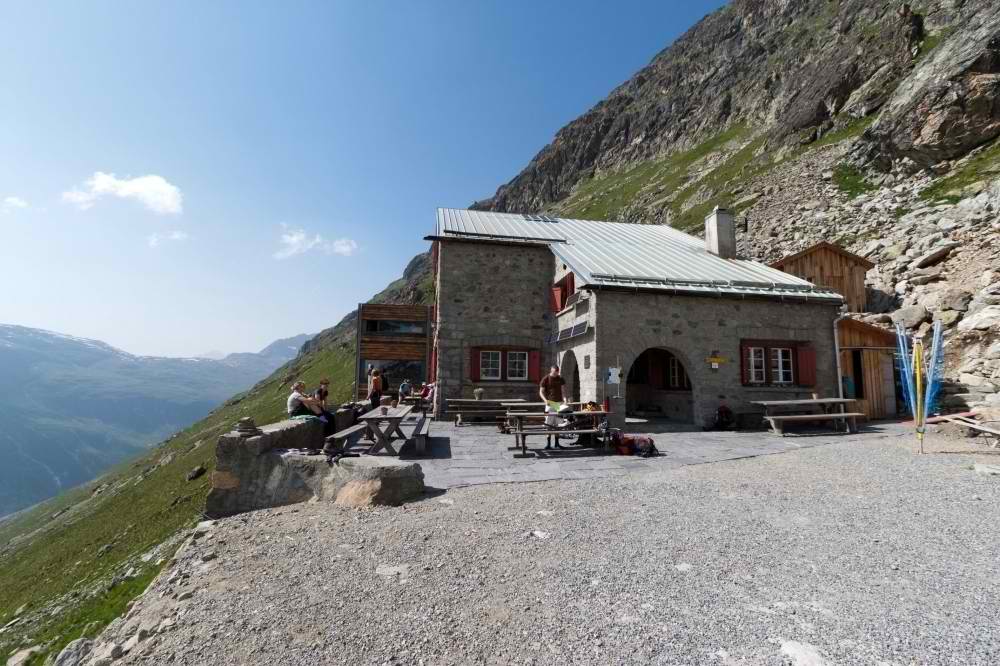
The mountain huts offer lodging, food and are staffed around the clock for anyone who would like to make use of their services. It’s regarded as proper etiquette to book reservations in these huts well ahead of time so that the proper preparations for your arrival can be made.
The cost of staying in these mountain huts can range from $100 USD for the shared rooms to $470 USD for private rooms.
We’ve found some of the best mountain huts to experience in Switzerland:
- Monte Rosa Hut : The Monte Rosa hut is located high up in the Swiss Alps, it has been highly praised for its peaceful location and the quality of service.
- Hornlihutte Zermatt Hut : This mountain hut is found on the base of the famous Matterhorn Mountain. The reservation fee includes dinner, breakfast, and supper.
- Tschierva Hut : Guided tours are offered from this mountain hut and Tschierva has received praise for being very affordable.
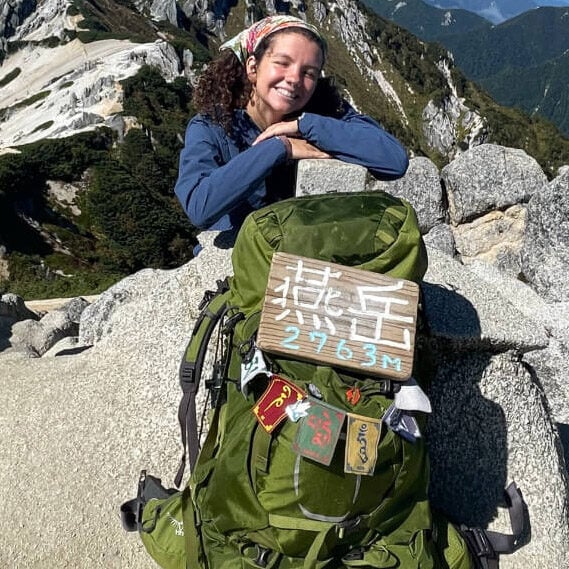
We’ve tested countless backpacks over the years, but there’s one that has always been the best and remains the best buy for adventurers: the broke backpacker-approved Osprey Aether and Ariel series.
Want more deetz on why these packs are so damn perfect? Then read our comprehensive review for the inside scoop!
ESTIMATED EXPENSE: $3 – $10 per day
Switzerland has many forms of reliable public transport in larger cities and towns, such as buses and trains. The single trip tickets for these are usually very affordable. Buses in some of the larger cities have “short hop” tickets that allow you to use the same ticket to travel 2-3 times before it expires.
It should be noted that there is also a Swiss Travel Pass that can be bought for durations of up to 15 days. These travel passes allow you unlimited access and use of the Swiss public transport system including trains, buses, and any waterway transport systems.
The pass also gives you free access to museums and exhibitions across the country, truly giving you the freedom to explore!
The 15-day Swiss travel pass costs $532 USD. This is rather pricey, but if you’re planning on doing a lot of traveling, this will ultimately work out as the cheaper option. The free entry into museums and art exhibitions also adds to the value considerably.
Of course, if you’d rather save money when traveling over short distances, renting a bicycle or walking may be the better (and more scenic) option for you to take.
Train Travel in Switzerland
It’s often said that the train system in Switzerland runs like clockwork. The trains in this country normally run efficiently. Arrival and departures are rarely late, but this mainly depends on wheater conditions.
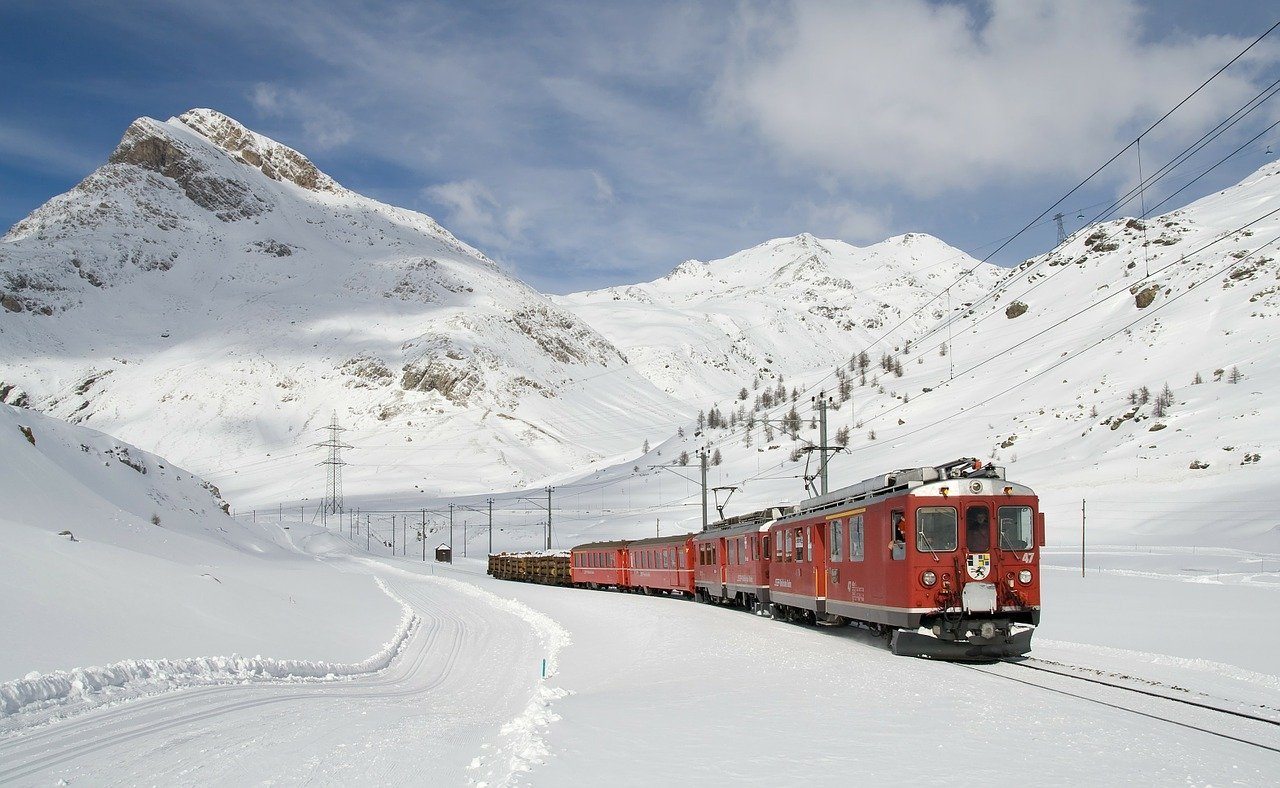
The trains in Switzerland are state of the art and kept in good condition. They’re incredibly clean and reliable as well. Trains are mostly used to travel from one city to the next or to reach Switzerland’s neighboring countries. When you’re traveling inside the city, trams and buses are the more popular and efficient transport.
Single trip or return train tickets are usually sold at relatively decent prices considering the distances between some of the Swiss cities.
Round trip tickets for the more popular routes such as Geneva to Zurich cost around $77 USD. However, if you decide to purchase a Swiss Travel Pass , you’ll have free access to the trains until it expires. This can save you a significant amount of money if you intend on traveling between the Swiss cities a lot.
Bus Travel in Switzerland
The bus system in the major metropolitan areas of Switzerland and their surrounding towns is incredibly reliable. No matter you stay in Switzerland, a bus will get you there. The buses themselves are well maintained and comfortable to travel with. Almost all the buses in Switzerland have air conditioning.
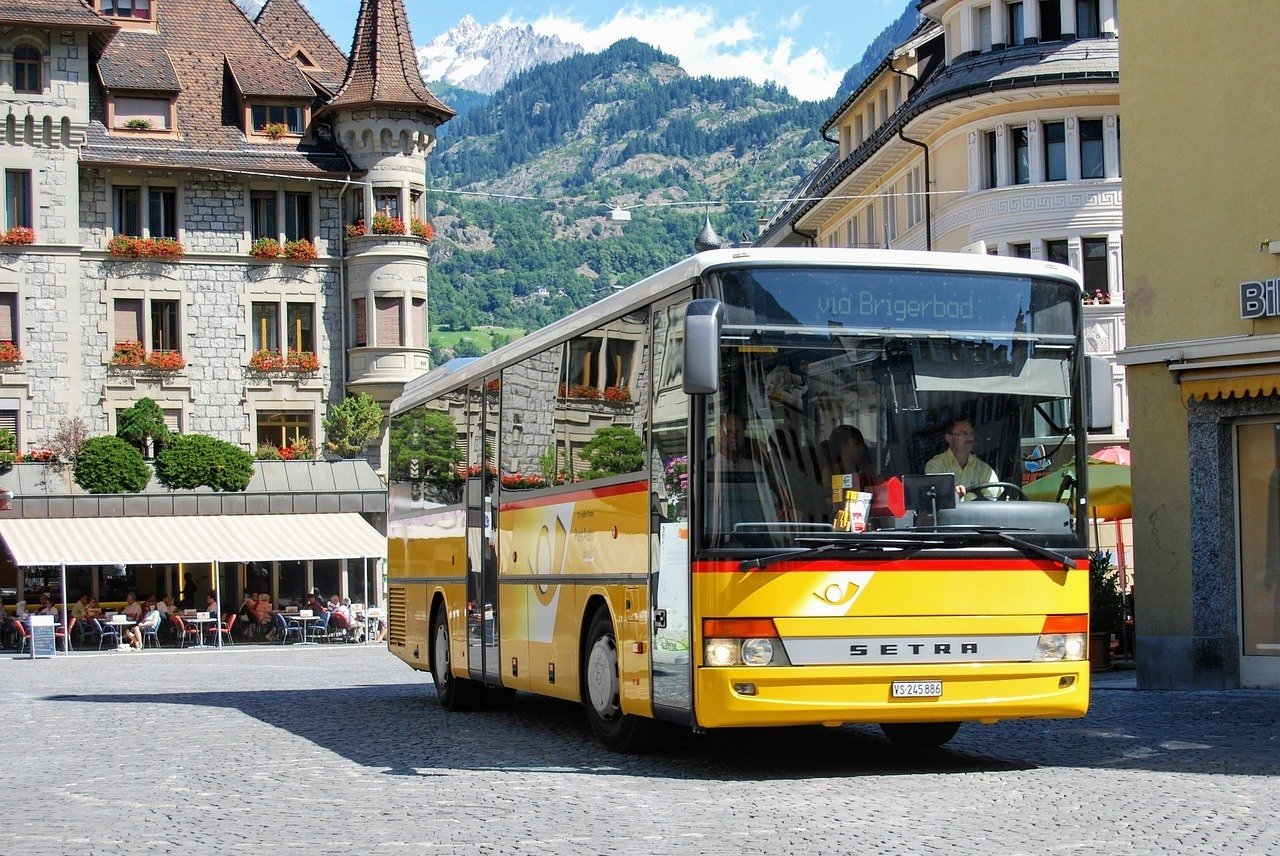
Swiss locals do not tend to use the bus system and rather choose to travel by train. The buses are there for other travel options if the need is required. They are also used to reach any particular places that cannot be reached by train.
Single-pass bus tickets in Zurich for example usually cost around $4 USD. The price depends on the distance you wish to travel. If you have any relevant passes or discounts these can be added to your trip. Round trip tickets in Zurich will cost you a total of $8 USD.
Of course, if you’ve decided to buy a Swiss Travel Pass you won’t have to pay any fees to use the bus system in any of the Swiss cities or towns. There is also a Travel Zurich pass which costs $35 USD for 3 days and grants the exact same luxuries a Swiss Travel Pass does, but is limited to use in Zurich alone.
Getting Around Inside the Cities in Switzerland
Getting from A to B in Swiss cities is a relatively easy and smooth process. The public transport system in the country is well developed and kept efficient.
There are many innercity transport options to choose from, each of them is relatively affordable and reliable.
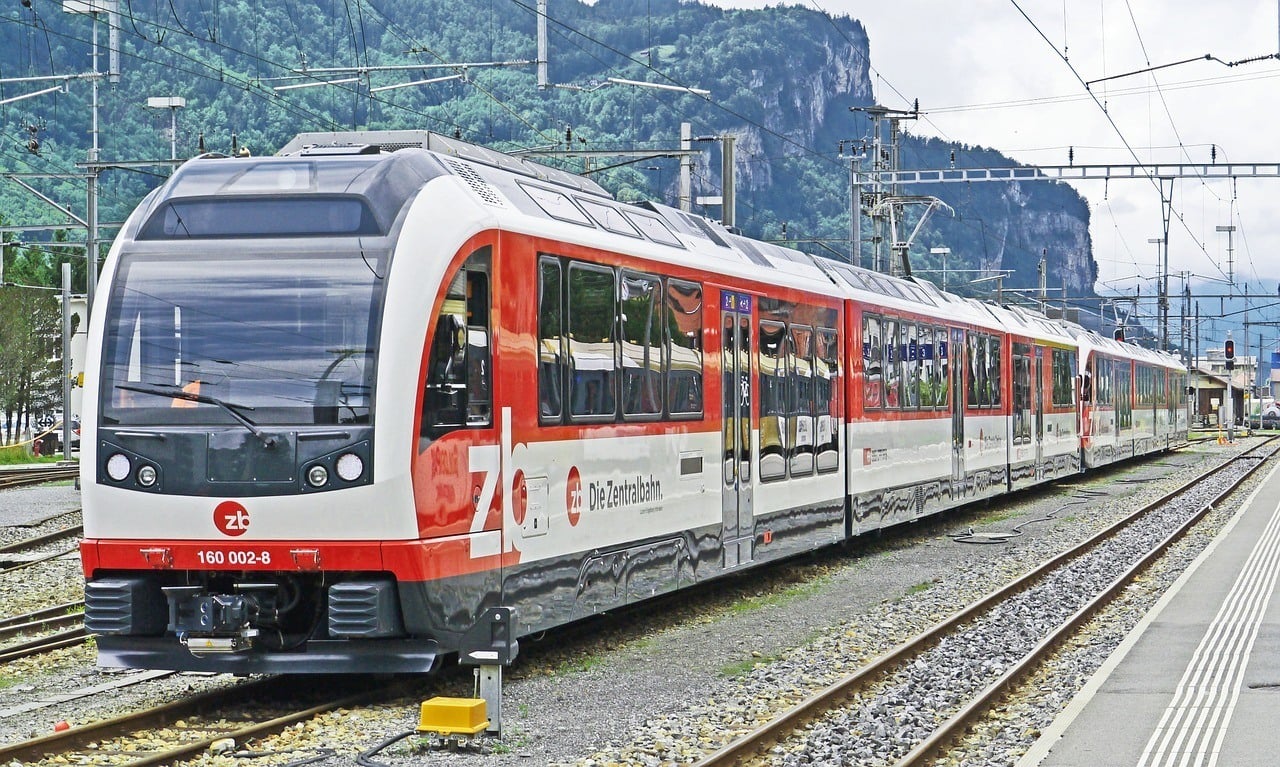
We’ve created a list to give you an idea of each of the modes of transport in Switzerland:
- Taxi: The average price per mile for taxis in Switzerland is $4. This can become quite costly if you decide to travel long distances. Taxis are usually quite professional in Switzerland, and drivers often speak English.
- Trains/Trams: Trains and Trams are incredibly reliable and comfortable in Switzerland. The average cost of a one-way ticket from the airport to Zurich city center would be $6.
- Bus: Buses are not commonly used by the Swiss locals, but they are still kept in fantastic condition and are usually on time. The average price for a round trip ticket from Zurich center to the airport, for example, would be $8.
- Bicycle : Lots of Swiss people choose to use their bike, rather than public transport. This option is cheap, fast and efficient. There are many bike rentals for tourists, which will cost you the same price as buying a bus or tram ticket.
Want to know more about public transport safety or Swiss safety in general? Check to see how safe Switzerland is at the moment.
Renting a Car in Switzerland
It’s possible to drive in Switzerland using your foreign driver’s license for up to 12 months. Due to the small size of the country, heavy traffic situations can occur during peak hours, especially during the more popular holiday months.
To rent a car in Switzerland, you must be at least 20 years old. Drivers that are under the age of 25 may also be subject to a young driver’s surcharge, depending on the car category.
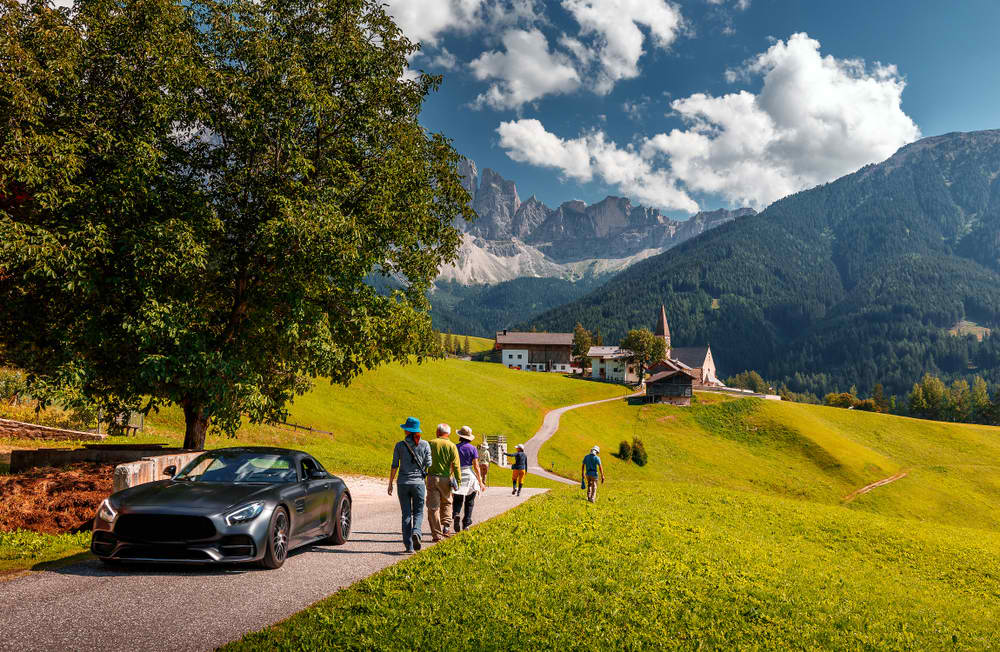
Renting a car can cost as little as $14 USD a day if you spend time looking for the right deal. It should be noted that fines incurred for exceeding the speed limit or not wearing a seatbelt are severe and can cost you $120 USD+ or get you a night in jail.
A gallon of gas costs around $6 USD. Keep in mind that these prices are current and are subject to change.
If you’d like to save money and explore Switzerland by car, look for deals on rentalcar.com . They usually have incredibly decent prices for travelers on a budget.
ESTIMATED EXPENSE: $30 – $60 per day
Switzerland places high tariffs on imported food and drink in order to protect the livelihoods of their local agriculture and farmers. This can cause most types of food and eating out to be a bit more expensive compared to other European countries. Restaurant prices can be quite inflated due to the high import tariffs.
If you choose to shop at the local markets and buy food to cook you can save a lot more money than dining out often.

Here are some of the Switzerland food prices that can be found in restaurants and supermarkets:
- A dozen eggs : $3.3USD
- Single loaf of bread : $2 USD
- Cup of coffee : $3.50 USD
- A restaurant meal for 1 person : $20 – 26 USD
- McDonald’s medium meal : $12 USD
- 1L Bottle of milk : $1.80 USD
By choosing to cook yourself rather than dining out, you can easily save a large portion of your budget. However, if you don’t have cooking facilities where you’re staying then looking for deals like a 2-for-1 special at restaurants can also work in your favor.
Where To Eat Cheaply In Switzerland
Dining out for a reasonable price is definitely possible in Switzerland if you have the know-how and search for a good deal. For example, COOP restaurants are significantly cheaper than privately owned ones.
COOP is one of Switzerland’s largest wholesale and retail companies. Their restaurants are found throughout the country and have received fantastic reviews.

Street vendors also offer some options like pizza, burgers and other lunch staples. These can work out cheaper and easier than dining in a restaurant.
Some ideas of where to eat in Switzerland include:
- COOP Restaurants : These can be found in most major cities and the average price of their filling main courses hovers around $15 – 17 USD, making this a great budget option for travelers looking to dine out.
- Street Vendors : These vendors can be found in most of the major cities. They can offer a quick bite to eat while exploring the cities of Switzerland. The average price of a meal at these vendors is usually anywhere between $10-14 USD.
- Supermarkets : If you have cooking facilities in your accommodation, then buying groceries to cook in your kitchen will save you loads of money. Purchasing groceries for a decent meal will cost you around $15. A great plus to this is that whatever is left, can be saved for the next day.
ESTIMATED EXPENSE: $6 – $40 per day
Both foreigners and locals love to experience the nightlife and vibe of the Swiss cities. Most bars, clubs, and restaurants will have a wide selection of alcohol.
Alcohol prices in Switzerland fluctuate depending on the quality of the alcohol and the establishment in which you decide to drink. Beer is generally the cheapest option with a regular bottle costing around $6 USD.

Buying a six-pack at the grocery store will cost you the same ($6). A bottle of whiskey, wine, and other strong spirits can cost anywhere from $12-$25 USD.
Beer is one of the most popular drinks to have in Switzerland. The Swiss are particularly fond of lagers and darker beers, such as dunkels. Wine is also incredibly popular as it is traditionally enjoyed with dessert.
Having pre-drinks or looking for happy hour specials will work in your favor if you’re looking to save cash on a night out in town.
ESTIMATED EXPENSE: $15 – $100
Switzerland is famous for the beauty of its countryside and towering mountain ranges. Tours to these mountainous regions can be a once-in-a-lifetime experience. Most of these guided tours to the mountain peaks will cost you around $80-$100 USD.
Note that you DON’T actually need a guide to visit the Alps – most of the trails are well marked and can be done by competent solo hikers. Skipping the guide will save you cash. However, having a guide is recommended for more dangerous activities like alpine climbing and via ferrata .
There are many beautiful sights to be seen in the cities, and it’s a lot cheaper too. The museums and art exhibitions found dotted around the cities are incredibly interesting, and often contain spectacular things to see. The entrance fee to these places usually costs around $15 USD.
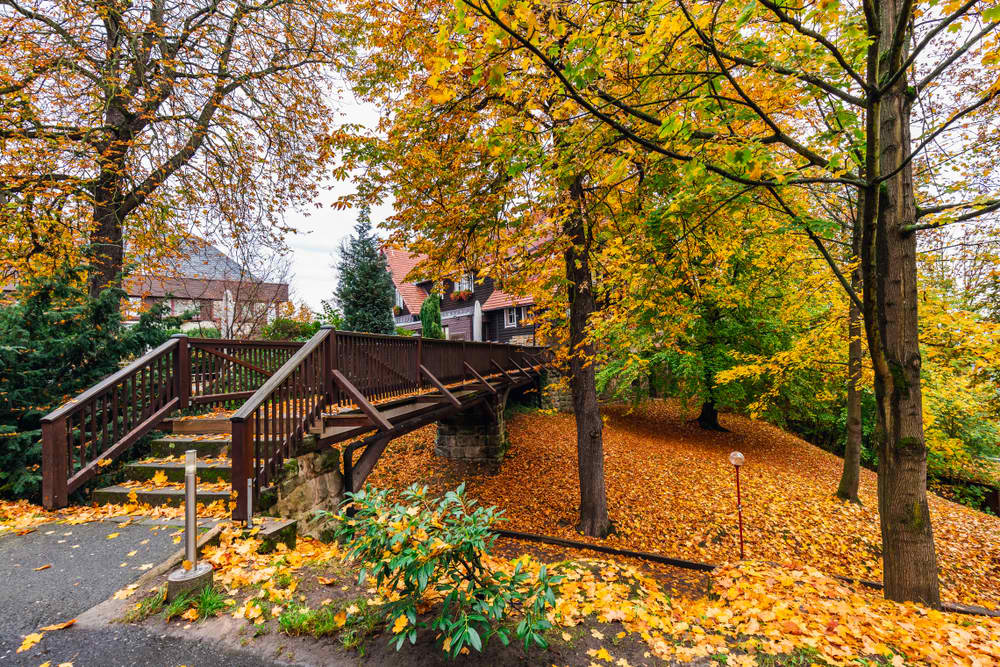
Walking to the many parks found in the Swiss cities is absolutely free and you can find beautiful locations to sit back and relax or take photographs. For example, the Arboretum is one of the best places to visit in Zurich and it’s totally free! It hosts many gorgeous and exotic plant species and is a pleasure to stroll through on a calm day.
Here are a few pointers on how to save money on attractions:
- If you have decided to purchase a Swiss Pass for your travels throughout Switzerland you’ll have immediate free access to every museum and art exhibition in the country.
- Walking through the city parks and arboretums are completely free. These lovely places allow you to clear your mind and enjoy the natural beauty around you.
- You may be able to save money by booking tickets to museums and exhibitions beforehand rather than paying entrance at the door.

A new country, a new contract, a new piece of plastic – booooring. Instead, buy an eSIM!
An eSIM works just like an app: you buy it, you download it, and BOOM! You’re connected the minute you land. It’s that easy.
Is your phone eSIM ready? Read about how e-Sims work or click below to see one of the top eSIM providers on the market and ditch the plastic .
Whenever you decide to travel to a foreign country, there’s the chance of unforeseen costs and expenses creeping up on you. Being aware of this and setting money aside in preparation for these potential expenses can save stress, and avoid potential disasters on your visit.
It’s common practice to set aside a small amount of your travel budget for additional expenses. Sometimes, while traveling through the cities, you may find a particular item that you’d love to purchase.
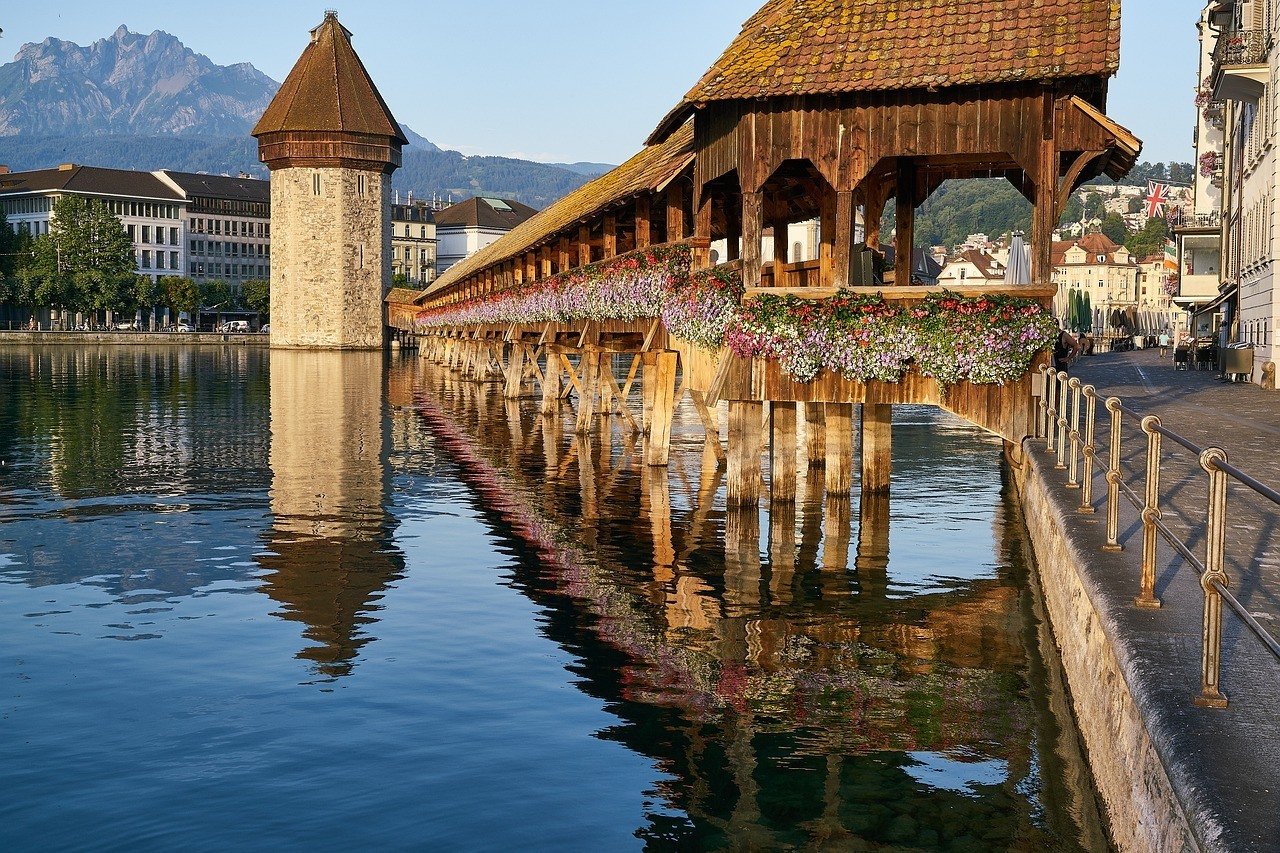
You might also need some cash in case of medical or other emergencies. These can often expensive in Switzerland too. By setting aside this extra bit of your budget you’ll always have funds to fall back on, just in case.
Tipping in Switzerland
Since the early 1970’s Swiss Federal Law has required all service charges to be added automatically to whatever the bill total is. But if you’re exceptionally happy with the service that you’ve received at any particular cafe, restaurant or bar, you’re more than welcome to add a tip for the service.
Adding a tip, even if it’s rounding off to the nearest Swiss Franc after receiving service is seen as the polite thing to do and shows your appreciation to the waiter, barista or bartender.
Get Travel Insurance for Switzerland
ALWAYS sort out your backpacker insurance before your trip. There’s plenty to choose from in that department, but a good place to start is Safety Wing .
They offer month-to-month payments, no lock-in contracts, and require absolutely no itineraries: that’s the exact kind of insurance long-term travellers and digital nomads need.

SafetyWing is cheap, easy, and admin-free: just sign up lickety-split so you can get back to it!
Click the button below to learn more about SafetyWing’s setup or read our insider review for the full tasty scoop.
There are always ways to save money while you’re traveling through foreign lands. We’ve created a list of some of the options you could look at in order to budget more effectively while visiting Switzerland:
- Traveling with a friend, family member or significant other: Deciding to travel with someone you trust can help immensely. You can pool your resources and money together to pay for meals, accommodation and entrance to attractions.
- Getting some cardio and saving money at the same time: By choosing not to use public transport to get around all the time you can save loads of cash. Walking to the shops, restaurants or parks around the major cities is usually quite scenic and doesn’t take very long at all!
- Refilling a water bottle: We all get thirsty throughout the day, especially when adventuring. If you keep a reusable water bottle with you and fill it up regularly, you can save some money on buying refreshments while out and about.
- Look for specials when deciding to dine out: Many restaurants offer specials throughout the week. This can allow you to eat a hearty meal in a pleasant atmosphere without burning a hole in your pocket.
- Make use of street vendors: If you’re busy exploring the city streets throughout the day and start getting hungry, why not try some of the vendor’s foods? They often have interesting things available at decent prices.
- Have a water bottle : Don’t waste money on plastic, bottled waters; carry your own and refill it in the fountains and the tap. If you’re worried about potable water, get a filtered bottle, like the GRAYL, which filters out 99% of viruses and bacteria.
- Earn money while you travel: Teaching English while traveling is a great way to make ends meet! If you find a sweet gig, you may even end up living in Switzerland.
- Become a volunteer with Worldpackers: Give back to the local community and, in exchange, you’re room and board will often be covered. It’s not always free, but it’s still a cheap way to travel in Switzerland.

Our GREATEST Travel Secrets…
Pop your email here & get the original Broke Backpacker Bible for FREE.
Well, yes. Without proper preparation, the cost of a trip to Switzerland can turn out to be rather expensive.
By making informed purchases and following a budget guideline you can enjoy everything this beautiful country has to offer while keeping expenditure down to a minimum.
A trip to Switzerland on a budget is completely possible. Making use of specials and deals that come up while traveling can save you large amounts of money during your stay here, so keep an eye out for them.
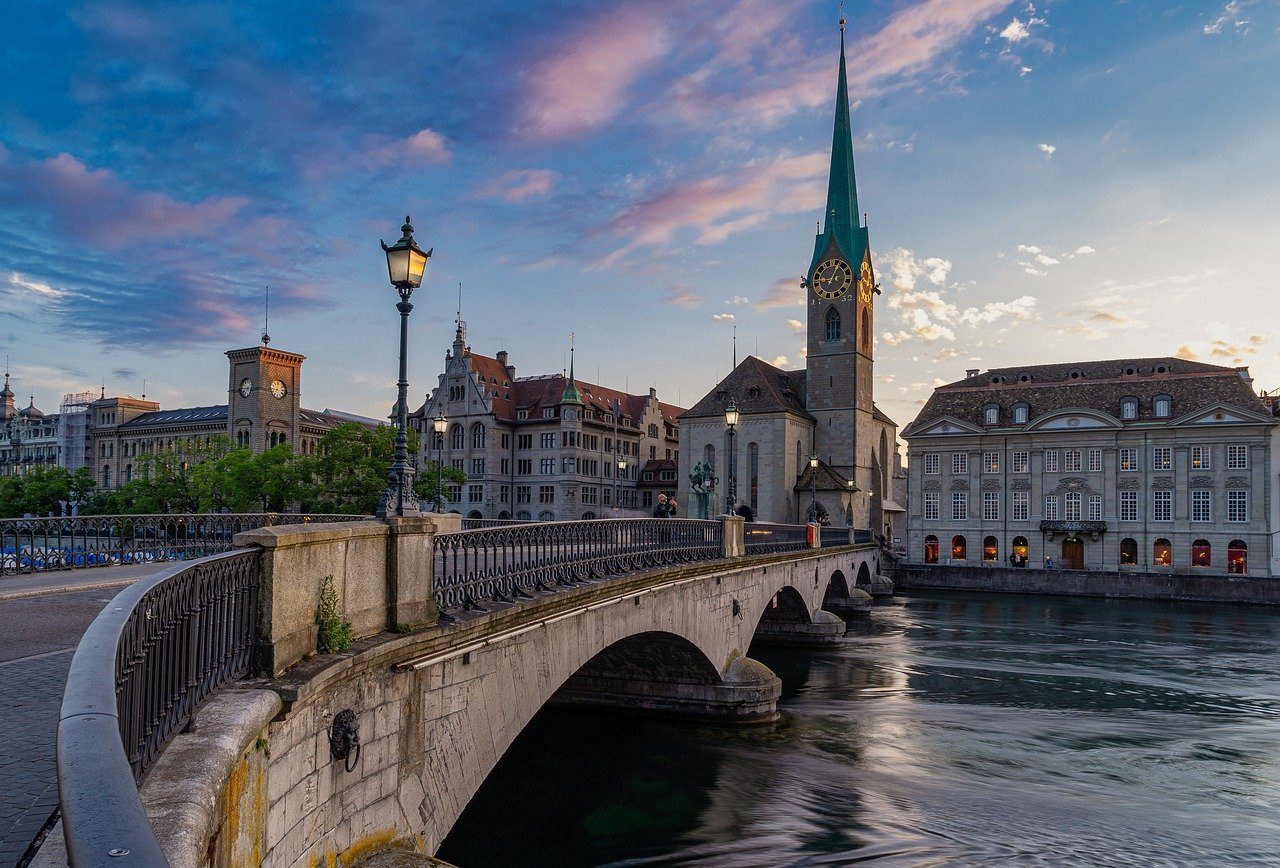
The country has been rated as one of the most expensive countries in the world, but this can be proven false if you stay smart and make use of the more affordable options that are available!
By having a plan and spending wisely, you’ll find that Switzerland is not very different from other popular destinations around the world. Budget products and services are usually decent quality and can keep you highly satisfied while exploring the country.
What we think an average daily budget for Switzerland should be: $100-$150 per day.

Share or save this post

Leave a Reply Cancel reply
Your email address will not be published. Required fields are marked *
Save my name, email, and website in this browser for the next time I comment.
Notify me of followup comments via e-mail.
Switzerland Trip Cost: Pricing for Flights, Food & Accommodation
Plan your Switzerland trip with our guide on costs for flights, food, and accommodation. Get budget tips for an affordable Swiss vacation experience.

Switzerland is more than chocolates, luxury watch brands, and the snow-covered mountain peaks of the Alps. Ski resorts and hiking trails are popular, but Switzerland also has beautiful palm trees in the tropical southern alpine region. But before you pack your bags for a Switzerland trip, you'll need to know everything the trip will cost you.
The average cost of a 1-week trip to Switzerland is $1900-$2530 to cover flights, hotel, food, transportation, and attractions. The estimate includes $700 flight fares, $833 for accommodation, $189 for transportation, $308 for food and drinks, and $400 for attractions. With this estimate, you can expect to spend an average of $205 daily throughout your trip.
No doubt, Switzerland is an expensive travel destination; but that doesn't stop tourists from flocking there. With the right spending attitude and a budget, you can experience an excellent Switzerland vacation without spending much.
Read on for a detailed breakdown of the cost of traveling to Switzerland to help you better plan your trip.
How Much Money Should You Take For A Trip To Switzerland?

Switzerland is expensive, and you will need a lot of money for your basic expenses. But what exactly would you need to spend throughout your trip? A solo traveler on a 1-week trip to Switzerland should go with $1900-$2530.
The data of flights emanating worldwide to Switzerland show an average price of $700-$1000. Accommodation takes a considerable chunk of your budget, going as high as $120 per night for a hostel. You can expect your daily spending to include $50 for meals, $27 for travel, and $100 per activity .
If your travel style leans more toward luxury, you can expect to spend slightly or significantly higher than the quoted figures. Remember, there's no limit to Switzerland's luxury.
The high-end hotels cost between $400-$1200. First-class flight tickets are priced between $1244 - 1800, depending on where you're flying from. Food, transportation, and activities can cost a daily average of $400.
The Swiss Travel Pass comes in either first or second class and costs $419 to $664, respectively. It is perfect for both local and intercity transportation.
Can You Travel To Switzerland On A Tight Budget

Switzerland may be expensive, but it is not unreasonable to want to visit the land of chocolate on a budget. After collating data from several travelers, we've decided what a budget trip will cost. You can have a fun 1-week vacation to Switzerland with an average budget of $1080-$1500.
There are flights for as low as $350 if you are willing to deal with inconveniences such as standby flights. Another factor to consider when searching for cheaper flights is the season. Flight tickets are typically cheaper during off-peak seasons, so it makes sense to travel during this period.
The average daily spend when traveling to Switzerland on a tight budget is $90. With this amount, you can stay in shared hostels or Airbnb at an average cost of $40 per night . Another advantage of this arrangement is that you can save by cooking meals or buying foodstuffs in bulk.
The average cost of lunch per day is $15, and you can prepare your dinner for as low as $10. You can take advantage of Switzerland's $455 tourist travel pass for access to transportation, free museum pass, and excursions. Or you can take free self-guided tours and enjoy mountain climbing and trail hiking.
Basic Expenses On A Vacation To Switzerland
Figures are important while preparing your Switzerland travel budget. A breakdown of each category will show you the exact amount of money you'll need for everything. The following estimate is calculated from the budget of past travelers and how much they spent.
1. Flight Tickets

Flight tickets are a top priority when preparing for your trip. Unfortunately, it takes a significant chunk off your travel budget .
Flight fares will always vary depending on where you are starting your journey. Flights from North America to Switzerland are common all year round, although some may require a stopover. Just like other destinations, flight fares depend on factors such as peak season and advanced booking.
The average airfare for a round trip to Switzerland from North America is $700. These flight fares increase to $1000 during the peak summer season or decrease to $600 in November. The above price can also reduce significantly if you book earlier or take advantage of discounts and other promotions.
2. Accommodation

Switzerland's accommodation caters to every style, from hostels, Airbnb, vacation rentals, and hotels. Each style costs differently, so you'll find something that suits your budget.
However, note that housing in Switzerland is more expensive than in the average city, and it gets higher during peak seasons (summer and winter). Therefore, it's usually the second biggest part of any budget.
Hostels are the cheapest accommodation you will find in Switzerland, but even they are a bit pricey. The average cost of a hostel is between $70-$120 per night .
Switzerland's hotels range from luxurious 5-star to mid-range hotels. The average hotel fee per night is between $250-$350 for mid-range hotels and $750-$1200 for the luxurious style.
There are different levels of Airbnb and vacation rentals to cater to the budget and the luxury traveler. Since it's Switzerland, the idea of a budget may differ slightly from the rest of the world. Average prices for Airbnb are $200, while vacation rentals cost $100-$1000.
3. Transportation

With a land mass of 41,290 KM² and lots of attraction sites, there's so much to do and see. No wonder travelers often say it costs an eye to move around the city.
Switzerland's train system is one of the best options for intercity travel. It's a perfect way to travel around big cities and small towns. However, the best thing about transportation in Switzerland is the Swiss Travel Pass made for tourists.
The average cost of a 4-day pass is $300, with unlimited travel on buses, trains, and lake cruises at a discounted fee. Additionally, it comes with free entry to over 500 museums in the country, plus free or discounted excursions and lake cruises .
The Swiss Travel Pass is often preferred by tourists when it comes to intercity travel. Chances are you will be visiting different Swiss cities, and the travel pass will save you several hundred dollars.
However, the pass may not be worth it if you travel shorter distances in just one city. In this case, you can opt for the relatively popular taxi.
There are taxis at almost every bus stop, and you can pick one at your destination. There the average cost of taking a taxi per day is $27.
4. Food & Drinks

Food prices vary in Switzerland, but the average cost of food in a day is $50. Like everywhere else, breakfast is cheaper than lunch and dinner, and fast food is more affordable than in a sit-down restaurant.
However, it still boils down to where you decide to eat and what part of the city you're in. Breakfast, lunch, and dinner cost an average of $10, $15, and $25, respectively . Most hotels provide complimentary breakfast, or you can buy sandwiches or hot meals from popular grocery stores to save money.
Swiss drink a lot of alcohol, and you can expect to spend an average of $19 per day on alcohol. The average cost of bottled water is $3, although public water is considered safe enough to drink.
5. Attractions & Activities

Switzerland is a popular tourist destination because of its natural beauty, and sightseeing activities such as hiking are free. Depending on how you choose to live, you can enjoy new activities every day until you leave the country.
Your budget can catch a break, and the Swiss Travel Pass will allow free entry into museums, excursions, and boat cruises.
However, you can partake in many other fun activities at an average cost of $100 per activity. Some of the activities below will give you a general idea of the cost.
A day trip to Grindelwald from Zurich costs $96. A day trip to Mount Titlis by cable car from Zurich costs $160. Jungfraujoch day tour from Zurich costs an average of $200.
6. Travel Insurance & Random Spending

Before packing your bags for Switzerland, it is essential to get travel insurance to protect you from unforeseen circumstances. Switzerland is an expensive country, and insurance will save you money in the event of, say, a medical emergency.
Fortunately, there are several insurance providers and that can pull down costs reasonably. Compare quotes from different agencies and go for one that covers everything without forcing you to break the bank.
Random spending usually comes up on vacations, such as souvenirs and tips. An average of $150 should be enough to cover any unexpected bill .
Tips To Save Money While Vacationing in Switzerland
Switzerland may be expensive, but it is a beautiful country with a lot to offer. However, that doesn't stop you from traveling on a budget.
With the right hacks, you can significantly pull down the cost of your Switzerland trip. Here are some tips and tricks to help you cut costs and make the most of your trip.
1. Travel Off-Peak Season

The best money-saving tip or advice you can get when traveling anywhere is to go during the low season. Switzerland is a year-round travel destination but peaks in summer and winter. Flight and hotel fees are steep because people come in for summer lakes, hiking, or winter ski mountains.
September, October, November, and January to March are the cheapest months to visit Switzerland . During this window, flight and hotel prices go down, and you can see picturesque and charming villages.
2. Book In Advance

Most travelers found that booking their flight, accommodation, and train tickets well in advance saves them several hundred dollars. Sometimes the difference between securing your flight 3-6 months in advance compared to 72 hours can get up to $300 .
Additionally, some days are cheaper than others when buying tickets. A survey of several flights to Switzerland found Tuesdays and Wednesdays to be more affordable.
3. Take Self-Guided Tours

Self-guided tours will save you money on activities and even accommodation. As a rule, the longer you stay in a hotel, the more likely you will get multiple deals on the room. You can pick a hotel as your base and take day trips around the country.
Cable cars offer a fun but expensive way to explore, although you can explore the country yourself. Partake in a few snowboarding and skiing activities and still save money enjoying the beautiful lakes, rolling hills, and flat plains.
Switzerland has well-established hiking trails and rock-climbing sites that you can enjoy without spending much.
4. Take Advantage Of The Swiss Travel Pass

The practical benefits of getting the Swiss Travel Pass includes free access to over 500 museums and discounted mountain excursions. An 8-day travel pass costs CHF418 and CHF663 for second-class and first-class tickets, respectively.
For example, you are traveling from Zurich and stopping at Luzern for the lake cruise and Mount Rigi excursion. With the Swiss Travel Pass, you get to do this for free instead of paying $118, saving you some money .
Alternatively, you can opt for the Swiss half-fare pass, which will save you 50% on trains and buses. It costs CHF99 a month, and remember to push the half-fare button when you get on the train or bus.
5. Cook Your Own Meals

Eating and dining out in Switzerland is pretty expensive and will eat into your budget. Preparing your meals will save money and allow you to partake in more activities.
Migros and Aldi are popular Swiss supermarkets where you can buy Swiss bread, coffee, and groceries to prepare your meals . These supermarkets also have hot meals such as chicken and sandwiches that will save you a few bucks.
73 Basic Dutch Phrases for Your Next Trip to Netherlands 🇳🇱
Learn essential Dutch phrases for a smooth trip to the Netherlands. Perfect for travelers looking to connect with locals and enrich their experience.
Win a $500 Flight!
Embark on the adventure of a lifetime! Enter our Dream Journey Sweepstakes for a chance to win a $500 travel voucher, redeemable with any major US airline. Whether it's sandy beaches, bustling cities, or tranquil mountains, your dream destination is just an email away!*

Is Swiss Safe? Discover the Surprising Truths for Anxious Travelers
When you're dreaming of your next travel destination, safety is often at the top of your list. And if Switzerland's caught your eye, you're probably wondering just how safe it really is. Nestled in the heart of Europe, this picturesque country is often associated with serene landscapes and high-quality living. But does that translate to a safe haven for travelers?

July Gems: Discover 5 Off-the-Beaten-Path Destinations
July's here, and it's the perfect time to pack your bags and set off on an adventure. With the sun shining bright and the days longer, there's no better time to explore some of the most amazing places our world has to offer.

January Gems: Uncover the Best Places to Visit for Magical Winter Wanderlust
January's a great time to shake off those holiday blues and start the year with an adventure. Whether you're into snowy landscapes or sunny beaches, there's a perfect spot out there for you.

December Delights: Europe's Coziest Villages for a Magical Winter Escape
December in Europe is like stepping into a holiday card. Picture this: snowflakes gently falling, bright lights, and the sweet smell of hot chocolate. It's a magical time to explore, with each city offering its own winter wonderland. Whether you're dreaming of cozy markets or breathtaking snowy landscapes, Europe's got you covered.

May Magic: Discover Europe's Hidden Gem, the Swiss Alps
May is the perfect time to explore Europe. The weather's getting warmer, but it's not too hot yet. Plus, the summer crowds haven't arrived, so you can enjoy famous spots without bumping into too many people.

May Magic: Top City Escapes from Rome to Kyoto
May's the perfect month to pack your bags and hit the road. Why? The weather's just right—not too hot, not too cold. It's like Goldilocks' porridge, but for travel. Plus, it's before the big summer rush, so you can enjoy places without bumping elbows with a crowd.

Top July Gems: Best European Spots for Culture & Nature Festivals
Thinking about a summer getaway? July's the perfect time to explore Europe. With the sun shining bright and the days lasting longer, there's so much you can see and do. From the cool beaches to the bustling cities, Europe's got it all.

Ultimate Guide: Top Places to Live in Switzerland for Every Lifestyle
Thinking about moving to Switzerland or just dreaming about it? You're not alone. This country, known for its chocolate, watches, and stunning landscapes, is also home to some of the best places to live in the world. Whether you're after the hustle and bustle of city life or the peace and quiet of the countryside, Switzerland has got you covered.

Best Time to Visit Zurich for Hidden Gems Only Locals Know About
Deciding when to visit Zurich can really make or break your trip. This city has its own charm in every season, but knowing the best time can help you enjoy it to the fullest. Whether you're into sunny walks by the lake or cozy cafes in the snow, there's a perfect time for you.

Best Time to Visit Switzerland for Autumn's Secret Colors & Festivals
Wondering when's the best time to visit Switzerland? You're not alone. This place is a bucket list spot for many, thanks to its stunning mountains, clear lakes, and charming cities. Whether you're dreaming of skiing down the Alps or enjoying a summer festival, picking the right time to go can make or break your trip.

Geneva Safety: Am I Safe to Travel to Geneva, Switzerland in 2024?
Planning a trip to Geneva? Its stunning landscapes and diplomacy hub status signal peace. Yet, knowing the city's safety landscape is wise.


Zurich Safety: Am I Safe to Travel to Zurich, Switzerland in 2024?
Planning a trip to Zurich? It's known for safety, letting you enjoy Swiss landscapes without worry. Let's explore what this means for travelers.

62 Basic French Phrases for Your Next Trip to Switzerland 🇨🇭
Learn 62 essential French phrases for your Switzerland trip! Perfect for travelers eager to blend in and enjoy Swiss culture, cities, and cuisine.

72 Basic German Phrases for Your Next Trip to Switzerland 🇨🇭
Learn essential German phrases for Switzerland with our guide! Perfect for travelers looking to connect with locals and enjoy Swiss culture fully.
You may also like...

Best Time to Visit Lithuania for Seasonal Adventures & Local Festivals
Planning a trip to Lithuania and wondering when's the best time to go? You're in the right place. Lithuania, with its stunning landscapes and rich history, offers a unique experience no matter the season. But, if you're looking to make the most of your visit, timing is key.

Best Time to Visit Hungary: Seasonal Secrets for an Authentic Experience
Deciding when to visit Hungary can be tricky, but don't worry, we've got you covered. This beautiful country shines in every season, but knowing the best time to go can make your trip even more special.

Best Time to Visit Estonia: Discover a Winter Wonderland Like a Local
Deciding when to visit Estonia? You're in for a treat, no matter the season. But if you're looking for the best experience, timing is key. This Baltic gem offers something unique with each season, from white winters to sunny summers.

Best Time to Visit Armenia: Winter Wonderland & Cultural Fests Unveiled
Deciding when to visit Armenia? You're in for a treat! This hidden gem has got it all - from cool, snowy winters to warm, sunny summers. But to get the best out of your trip, timing is key. Let's dive into when's the perfect moment to pack your bags for Armenia.

Best Time to Visit Havana: Seasonal Guide for Cultural Festivities
Planning your dream trip to Havana? You're probably wondering when's the best time to pack your bags and go. Well, you're in luck because we've got the inside scoop to help you make the perfect choice.

Best Time to Visit Oaxaca: Uncover Seasonal Secrets & Local Celebrations
Deciding when to visit Oaxaca? It's all about finding the perfect balance. You want great weather, fewer crowds, and lots to do, right? Well, you're in luck because Oaxaca has got it all, but timing is key.
The travel site inspired by travelers and locals alike. Find amazing destinations, unique trip ideas, the best hotels, and most comfortable resorts.
- All Destinations
- Bustling Cities
- Beautiful Towns
- Charming Villages
- Culinary Experiences
- Historical Monuments
- Zoos, Parks and Aquariums
- Image Gallery
- Comparative Analyses
- Hiking Time Calculator
- Travel Information
- Frequently Asked Questions
- Affiliate Disclaimer
- Favorite Resources
- Privacy Policy
Is Switzerland Expensive? A Comprehensive Price Guide for Travelers
- June 16, 2023 October 22, 2023
- General Information
Last Updated on October 22, 2023 by Darla Uhl
Switzerland is widely known for its natural beauty, vibrant cities, and high standard of living. However, when it comes to the cost of traveling and living, many people wonder if Switzerland is expensive. The answer is yes, Switzerland is one of the most expensive countries in the world . This article will cover how expensive Switzerland is and look at the prices of hotels, trains, food, restaurants, and more.

Overview: Is Switzerland Expensive?
According to the Economic Intelligence Unit, Zurich and Geneva in Switzerland are amongst the most expensive places to live in the world in 2022. Rounding up the top 10 were New York, Singapore, Tel Aviv, Hong Kong, Los Angeles, San Francisco, Paris, and Copenhagen. 1 To analyze data, they calculate using a basket of goods and prices in many cities all over the world.
The high cost of living in Switzerland can be attributed to several factors which include its strong economy and high wages. As such, there is a high standard of living.
The cost of goods and services, including food, housing, and transportation, is significantly higher in Switzerland than in many other countries in the world.
Despite the high cost of living, Switzerland remains a popular destination for many tourists. Its breathtaking mountains, crystal-clear lakes, and cultural heritage make it a memorable destination for many people from all over the world. Those considering travel to Switzerland should be prepared for the high costs and plan accordingly.
Prices of Train Tickets

Switzerland has one of the most extensive railway networks in Europe. It includes thousands of kilometers of train lines operated by the canton governments. The Swiss federal railways are referred to by their acronyms: SBB ( Schweizerische Bundesbahnen ) in German, CFF ( Chemins de Fer Fédéraux ) in French, and FFS ( Ferrovie Federali Svizzere ) in Italian.
Swiss trains remain inexpensive if you plan in advance and buy discounted tickets. Tickets can be bought at the train counter (if open or present), ticket machine, or online at sbb.ch .
Prices for Train Tickets are as follows (as of June 2023):
Note : Discounted tickets will have a lower price tag compared to the list above. These are available if booked in advance. These tickets are also subject to availability. So if lots of people have already bought a ticket on your chosen date or time, then you will likely no longer have access to the discounted fare.
Prices of Bus and Tram Tickets

There are two separate bus services that cover Switzerland. The first one is the Post Bus Service. These are typically the yellow buses with the “ Postbus ” written on them. The second one is the local city or town bus service. Together, these two bus services cover almost the entire country.
Since most bus routes are typically short, a one-way ticket will cost anywhere from CHF 2 to CHF 7 per trip.
In larger cities such as Zurich, Bern, and Basel, they also have trams. These are streetcars that move around the city and stop every several hundred meters.
Prices for Tram Tickets are as follows (as of June 2023):
Reduced fare is available for holders of the Half-price travel card subscription and children. The Half-Fare Travelcard allows its holders to travel at half the price on all SBB routes and most other railways. It also covers boats, post buses, and trams. It costs CHF 185 for one year and CHF 165 for succeeding years thereafter.
Prices of Cruising on Ships

Over 140 ships roam the various lakes in Switzerland. The lakes of Zurich, Lucerne, and Geneva have lots of ships moving about from spring until autumn (April until October). Most shipping companies also provide special rides with themes during Mother’s Day, National Day, Sundays, and many more. There are also paddle steamers available in the many lakes.
Prices for Ship Tickets are as follows (as of June 2023):
Want to check out our post about the different paddle steamers on Switzerland’s lakes? Click here for more on the paddle steamers in Switzerland – Ultimate List of Steamboats in Switzerland.
Prices of Taxis
Taxis in Switzerland are incredibly expensive – definitely one of the most expensive in the world. It might be worthwhile to check the rates beforehand to see how much it would cost. Taking public transport (trains and trams) will definitely cost you much less.
Nonetheless, if you want to take a taxi, you will expect to pay for each kilometer . Not only will you pay for each kilometer. If you order a taxi and let the taxi driver wait, also expect to pay for his or her waiting time .
The final bill typically has the following components as an example:
- Basic Fee per ride: CHF 6.00
- Mileage Fee per kilometer: CHF 3.80
- Waiting time per hour: CHF 69.00
- Additional cost per booster seat (optional): CHF 20.00
Some taxis provide a fixed price from one city to the airport. Here are some sample prices from a taxi company:
- Basel Airport to Zurich Airport: CHF 300.00
- Zurich City to Zurich Airport: CHF 45.00
- Zug to Zurich Airport: CHF 150.00
- Lucerne to Zurich Airport: CHF 200.00
Prices of Using Cable Cars and Mountain Railways

There are over 500 cable cars and mountain railways in Switzerland. Most of them operate in summer and winter except on days with terrible weather. Some of them have a short break after winter (typically a few weeks after Holy Week) and a few weeks after the summer season. Some of them run all year round. Holders of the Half-Fare Travelcard can get some discounts.
Cable cars are generally expensive, particularly the well-known ones such as Jungfraujoch, Zermatt, and those in Engadin.
Prices for Cable Car Tickets are as follows (as of June 2023):
Prices of Hotels and Apartments

Swiss hotels, whether 3-, 4- or 5-star, are generally of good quality. The cleanliness standards are excellent. It is hard to find a bad hotel in Switzerland. Apartments have a similar price range to hotels. Some go for as cheap as CHF 60 per night. And some are very luxurious and cost more than a thousand Francs per night. Apartments do not, however, always have an official classification.
Prices for Hotel Rooms are as follows (as of June 2023):
Prices of Restaurants

The Restaurant industry employs some 261,000 employees as of 2018 spread across more than 28,000 hotel and restaurant establishments (see Reference ). Restaurants in Switzerland generally provide good food and fast service.
You can expect to pay around CHF 25 for a dish and CHF 5 for one drink in most normal-priced restaurants. However, some will of course charge more and some less. The good thing about restaurants is that they are obliged by law to display their menu and prices outside.
You can decide before entering if you are comfortable with the prices. Excellent restaurants can cost easily CHF 200 per person if you include the full meal (appetizer, main course, dessert) and wine.
Those who want to save money can check out the restaurant’s daily menu ( Tagesmenu in German, menu de jour in French). This is served during lunchtime from noon until 2 PM. Together with the house wines ( Offener Wein in German, vin ouvert in French), you can get a reasonably-priced meal during lunch. Restaurants also typically half portions for children. Some will even have a separate children’s menu. Children’s portions also command a lower price.
Prices in Bars and Cafés

Bars are open from morning to midnight and offer some food and drinks (alcoholic and non-alcoholic). Cafés, on the other hand, do not sell alcoholic drinks.
In Swiss bars, normally you don’t pay as you are served drinks. The bill comes at the end of the evening including all the drinks ordered throughout the evening. The prices are normally CHF 5 per non-alcoholic drink and CHF 7 to CHF 10 per alcoholic drink (cocktail or 1 glass of wine).
Prices of Museum and Art Gallery Tickets

Switzerland has a rich cultural heritage, and visitors can explore this through its many museums and cultural events. Some of the most popular museums are the Kunsthaus Zurich , the Swiss National Museum , and the Swiss Museum of Transport in Lucerne. Visitors can also attend cultural events such as music festivals, theater performances, and art exhibitions.
Prices for museum admission and cultural events vary. Sometimes, you can even get discount cards from your hotel or B&B. but expect to pay around CHF 20-30 for museum admission and up to CHF 100 for some cultural events.
Museum prices vary and can range generally from CHF 10 to CHF 32 per Adult . Some travel cards like the Zurich City Pass offer free entrance to museums for the duration of the card’s validity. It is best to check the museum’s website for more detailed information regarding prices and reductions.
Prices of Cinema Tickets
Cinema prices vary and can range depending on the location and movie. It costs CHF 18 to CHF 30 per Adult.
Prices of Doing Various Sports
Hiking, skiing, and snowboarding will cost as much as you need cable car or mountain railway tickets. Hiking is totally free if you have no need for cable cars and/or mountain railways. Skiing, on the other hand, is normally dependent on using the cable car infrastructure. Please check the Cable cars and mountain railways price list for more information.
If you would like to learn more about how expensive skiing is, you can check out our article here: Think Skiing In Switzerland Is Too Expensive? Here’s How to Enjoy It for Less .
Swimming is generally not so expensive compared to other activities. It costs between CHF 3.50 and CHF 10.00 per Adult to go inside the indoor or outdoor swimming area.
Prices of Goods In Supermarkets

Grocery shopping is also expensive in Switzerland. The biggest supermarket chains in Switzerland are Coop and Migros which typically have high prices. In some smaller towns, they have Volg and Spar.
However, there are cheaper options available at discount supermarkets such as Denner, Aldi, and Lidl.
Switzerland is also well-known for its delicious chocolate and cheese. Swiss chocolate is made with high-quality ingredients and comes in a variety of types such as milk chocolate, white chocolate, dark chocolate, chocolate with caramel, and even vegan chocolates. You can find Swiss chocolate in most grocery stores like Coop and Migros as well as specialty chocolate shops like Läderach, with prices starting at a few francs for a small bar.
Prices for Food bought from Coop are as follows (as of June 2023):
- Train prices – https://sbb.ch/
- Zurich ship prices – https://www.zsg.ch/en/
- Lake Lucerne ship prices – https://www.lakelucerne.ch/
- Lake Geneva ship prices – https://www.cgn.ch/de/
- Lake Locarno ship prices – http://www.lakelocarno.com/
- Taxi sample prices – https://taxiwallisellen.ch/ , https://www.7×7.ch/
- Jungfrau and Interlaken prices – https://www.jungfrau.ch/
- Corvatsch prices – https://www.corvatsch.ch/
- Diavolezza prices – https://www.diavolezza.ch/
- Davos prices – https://www.davos.ch/
- Flims Laax Falera prices – https://www.flimslaax.com/
- Zermatt prices – https://www.matterhornparadise.ch/
- Saas-Fee prices – https://www.saas-fee.ch/
- Hotel prices – https://www.booking.com/
- Cinema prices – https://www.cineman.ch/
- Prices of goods – https://www.coop.ch/de/
- 1 Marcus, Lilit. These are the world’s most expensive cities to live in 2022 . CNN. Accessed on 16 June 2023. https://edition.cnn.com/travel/article/world-most-expensive-cities-economist-2022/index.html
Related Posts
- Think Skiing In Switzerland Is Too Expensive? Here’s How to Enjoy It for Less
- Switzerland’s Shoulder Season And How to Take Full Advantage of It
Darla Uhl is the owner of TouringSwitzerland.com. Her home is in the German-speaking part of Switzerland. Having lived almost 20 years in Switzerland, she's traveled extensively all over the country.
Darla's favorite regions to visit in Switzerland include Engadin, Lake Geneva, Bernese Oberland, Ticino, and Valais. She loves spending time with her family, hiking, visiting museums, and reading books.
- Darla Uhl https://www.touringswitzerland.com/author/tswriter/ Alpenwildpark Interlaken: A Free and Fun Wildlife Experience
- Darla Uhl https://www.touringswitzerland.com/author/tswriter/ The Historical Town of Werdenberg, Switzerland
- Darla Uhl https://www.touringswitzerland.com/author/tswriter/ Andermatt or Grindelwald: Which is Better?
- Darla Uhl https://www.touringswitzerland.com/author/tswriter/ Cherry Trail in Frick, Switzerland
- Car Rentals
- Airport Transfers
- Attractions & Tours
- Flight + Hotel
- Destinations
- Trip.com Rewards
The Ultimate Guide to the Trip to Switzerland Cost in 2024

by Trip.com
April 25, 2024

Switzerland, a breathtaking country nestled in the heart of Europe, offers travelers a mesmerizing blend of natural beauty, rich history, and vibrant culture. Planning a trip to Switzerland can be an exhilarating experience, but it's essential to be aware of the potential costs involved. In this article, we aim to provide you with the best tips for saving money without compromising on quality. From finding affordable accommodations to savoring delicious local cuisine on a budget, we've got you covered. So, if you're wondering about the trip to Switzerland cost, read on to discover how you can make the most of your travel budget.
When it comes to the cost of traveling to Switzerland, it's crucial to consider various aspects. A round-trip ticket from the United States can range from approximately $600 to $1,500, depending on the season and airline. Accommodation costs vary as well, with budget hotels or hostels starting at around $50 per night, while luxury hotels can go up to $500 or more. Fortunately, Switzerland boasts an extensive and efficient public transportation system, with a one-way subway or train ticket costing between $2 and $10.
As for dining, the cost can vary depending on your preferences. Budget travelers can enjoy a meal at a local eatery for around $15 to $25 per person, while mid-range restaurants may charge between $30 and $50 per person. It's important to plan ahead and research activities and costs to create a budget that works for you. On average, a budget traveler can expect to spend around $100 to $150 per day, while a mid-range traveler may spend between $200 and $300 per day. By being mindful of your expenses and making smart choices, you can have an unforgettable trip to Switzerland without breaking the bank.
- How much does it cost for 2 nights and 3 days when traveling to Switzerland?
Planning a trip to Switzerland but not sure how much it will cost you? Well, the cost of a 2-night, 3-day adventure in this picturesque country can vary depending on several factors. Your travel style, choice of accommodation, transportation, and activities all play a role in determining the overall expenses. However, fear not! We're here to give you a rough estimate of what you can expect as a budget traveler.

Let's break down the costs for you:
First things first, let's talk about flights. The cost of a round-trip ticket to Switzerland from major cities around the world can range anywhere from $500 to $1500, depending on your departure location and the time of year you plan to visit.
Accommodation:
Next up, accommodation. If you're on a budget, you can find budget hotels in Switzerland for as low as $50 per night. So for 2 nights, you can expect to spend around $100. Of course, if you prefer a more luxurious stay, the prices can go up significantly.
Transportation:
Getting around Switzerland is a breeze thanks to its efficient public transportation system. A one-way subway or train ticket can cost you anywhere between $2 and $10, depending on the distance. For 3 days of transportation, you can estimate a total cost ranging from $20 to $60.
Food and drinks:
Now let's talk about everyone's favorite topic - food! A meal at a budget restaurant in Switzerland can cost you around $15 to $25 per person. However, if you're looking to save some extra bucks, street food and convenience store meals can be even cheaper. As for drinks, a cup of coffee or a bottle of water can range from $2 to $5, while alcoholic beverages can cost you anywhere from $5 to $15. For 3 days of sustenance, you can expect to spend around $150 to $250.
Sightseeing and activities:
Switzerland is known for its breathtaking landscapes and numerous attractions. Luckily, many of these attractions are either free or have a small entrance fee. Some popular free attractions include exploring the charming streets of Zurich, visiting the beautiful Lake Geneva, and taking a stroll in Lucerne. However, if you're willing to splurge a bit, attractions like the Jungfraujoch, a UNESCO World Heritage site, can cost you around $100 per person. For 3 days of sightseeing and activities, you can estimate a cost ranging from $50 to $200.
So, what's the total cost?
For a budget traveler who wants to experience Switzerland for 2 nights and 3 days, the total cost can range from $820 to $2160. Keep in mind that these are rough estimates and actual costs may vary depending on your travel style, activities, and other expenses.
Now that you have an idea of the cost, it's time to start planning your Swiss adventure. Remember to budget wisely, prioritize your must-see attractions, and make the most of your time in this stunning country. Happy travels!
- How much does it cost for flights when traveling to Switzerland?
Planning a trip to Switzerland? One of the first things you'll need to consider is the cost of flights. But just like the country's stunning landscapes, the price of airfare can vary greatly depending on a number of factors. From your departure location and the time of year to the airline you choose and the availability of tickets, there are several variables that can impact the cost of your journey.
So, let's dive into the nitty-gritty details and give you a general idea of how much you can expect to pay for flights to Switzerland from major cities around the world. Keep in mind that these figures are in US dollars and can fluctuate based on the factors we mentioned earlier.
If you're departing from a bustling metropolis like New York City, Los Angeles, or London, you can anticipate a range of prices for both one-way and round-trip tickets. For economy class, you might find fares starting at around $500 for a one-way ticket and $800 for a round-trip. However, if you're looking for a more luxurious experience in business or first class, be prepared to shell out a bit more. Prices for these premium classes can start at around $2,000 for a one-way ticket and $3,500 for a round-trip.
Now, let's say you're departing from other major cities like Sydney, Tokyo, or Dubai. The cost of flights to Switzerland from these destinations can also vary. For economy class, you might find one-way tickets ranging from $700 to $1,200, with round-trip fares falling between $1,200 and $2,000. If you're willing to splurge on business or first class, prices can start at around $3,000 for a one-way ticket and $5,000 for a round-trip.
Remember, these figures are just estimates and can change depending on the time of year you plan to travel. Peak seasons, such as summer or the holiday season, tend to drive prices up, while off-peak times might offer more affordable options. Additionally, different airlines may have promotions or discounts that can affect the cost of your flight.
So, when planning your trip to Switzerland, make sure to consider all these factors and do your research. Keep an eye out for deals and compare prices from different airlines to find the best option that suits your budget and preferences. Bon voyage!
- How much does it cost for hotels when traveling to Switzerland?
Planning a trip to Switzerland? One of the key aspects to consider is the cost of hotels. The price you pay for accommodation can vary depending on several factors, such as the location, season, and the type of accommodation you are looking for. Let's dive into the details and get a better understanding of what to expect.
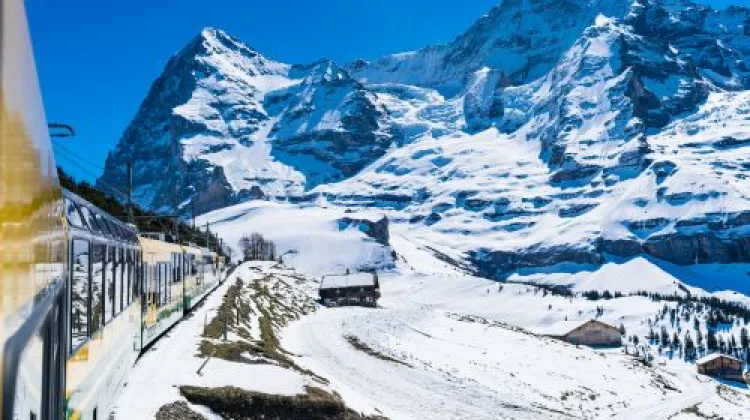
When it comes to hotels in Switzerland, the cost can be quite diverse. Major cities, like Zurich, Geneva, and Bern, tend to have higher hotel rates compared to smaller cities or rural areas. This is mainly due to the high demand and popularity of these urban destinations. So, if you're planning to stay in one of these bustling cities, be prepared to spend a bit more on your accommodation.
Now, let's talk numbers. In major cities, the average cost range for a mid-range hotel room per night is around $150 to $250. If you're looking for a more luxurious experience, the price range for a luxury hotel room can go up to $500 or even higher. Keep in mind that these prices are in US dollars and can vary depending on the specific hotel and season.
On the other hand, if you're open to exploring other cities and smaller towns in Switzerland, you'll find that the hotel prices are generally more affordable. In these areas, the average cost range for a mid-range hotel room per night can be around $100 to $150. For those seeking a touch of luxury, the price range for a luxury hotel room might range from $250 to $400.
Remember, these are just average price ranges and actual rates may vary. It's always a good idea to do some research and compare prices before making your final decision. Additionally, keep in mind that prices can fluctuate depending on the season and any special events happening in the area.
So, whether you're planning to explore the vibrant streets of Zurich or immerse yourself in the serene beauty of smaller Swiss towns, make sure to factor in the cost of hotels. By being aware of the price ranges, you can plan your trip accordingly and make the most of your Swiss adventure.
- How much does it cost for food when traveling to Switzerland?
When planning a trip to Switzerland, it's essential to consider the cost of food and dining. The expenses can vary widely depending on several factors, including the type of food, the restaurant's location, and the level of formality or luxury. Let's explore the different price ranges you can expect while indulging in the Swiss culinary scene.

Switzerland offers a diverse range of food options, catering to various budgets and preferences. Whether you're craving street food, fast food, or a fine dining experience, there's something for everyone.
For those looking for a quick bite on the go, street food or fast food options can be a wallet-friendly choice. Prices typically range from $10 to $20 per meal, allowing you to satisfy your hunger without breaking the bank.
If you prefer a more casual dining experience at a local restaurant, you can expect to spend around $20 to $40 per meal. These establishments offer a cozy atmosphere and a chance to savor traditional Swiss dishes.
For those seeking a slightly more upscale experience, mid-range restaurants in Switzerland offer a wider variety of cuisines and a higher level of service. Prices can range from $40 to $80 per meal, depending on your choices.
For a truly luxurious dining experience, high-end or luxury restaurants in Switzerland are renowned for their exquisite cuisine and impeccable service. Prices can exceed $80 per meal, making it an indulgence reserved for special occasions.
While dining out is a fantastic way to experience Swiss cuisine, there are also more affordable options available. Convenience stores and supermarkets offer a range of fresh and packaged food items at reasonable prices. This allows you to save money while still enjoying delicious meals during your trip.
When it comes to tipping in Switzerland, it's not customary to leave a tip as service charges are usually included in the bill. However, if you receive exceptional service, it's always appreciated to show your gratitude by rounding up the bill or leaving a small tip.
Now that you have an idea of the cost of food in Switzerland, you can plan your culinary adventures accordingly. From street food to high-end dining, Switzerland offers a gastronomic experience that suits every budget and palate. So, get ready to indulge in the flavors of this beautiful country!
How much does it cost for souvenirs when traveling to Switzerland? Well, let me tell you, it can vary like a Swiss watch! When it comes to souvenirs in Switzerland, the cost can be as high as the Matterhorn or as low as a Swiss chocolate bar. It all depends on what you're looking for, where you're shopping, and the quality of the item. From luxurious Swiss watches to charming cowbells, there's something for everyone. Let's take a closer look at some popular souvenirs and their price range in good ol' US dollars.
First up, we have the iconic Swiss army knife. This handy tool can range from $20 for a basic model to a whopping $500 for a limited edition masterpiece. Next, we have the ever-popular Swiss chocolate. A box of delectable Swiss chocolates can cost anywhere from $10 to $50, depending on the brand and size. If you're a fan of precision timekeeping, a Swiss watch might be on your shopping list. Prices for Swiss watches can start at $200 and go up to a jaw-dropping $10,000 or more for a luxury timepiece.
Lastly, let's not forget about the famous Swiss cheese. A wheel of authentic Swiss cheese can set you back around $50 to $100, depending on the size and type. Now, when it comes to buying souvenirs in Switzerland, it's important to know that many souvenir shops in tourist areas have fixed prices. However, if you're feeling adventurous and want to try your hand at bargaining, you might find some room for negotiation in flea markets or antique shops.
So, whether you're looking for a pocket-sized Swiss army knife or a luxurious Swiss watch, be prepared to shell out some Swiss francs. Remember, the cost of souvenirs in Switzerland can be as diverse as the country itself. Happy shopping!
- How much does it cost for transportation when traveling to Switzerland?
Planning a trip to Switzerland? Well, buckle up and get ready to explore the stunning landscapes and picturesque cities of this beautiful country. But before you embark on your Swiss adventure, it's important to know how much transportation will cost you. Let's dive into the details!

When it comes to transportation in Switzerland, the cost can vary depending on the mode of transportation and the distance you need to travel. But don't worry, I've got you covered with some estimated cost ranges in good old US dollars for different types of transportation options.
Let's start with the most popular mode of transportation in Switzerland - the train. Train fares in Switzerland are known for being quite reasonable. For shorter distances, you can expect to pay around $10 to $20, while longer journeys can cost you anywhere between $50 to $100. It's worth noting that Switzerland's train system is renowned for its efficiency and punctuality, making it a convenient and reliable option for travelers.
If you prefer to explore the cities using public transportation, such as subways and buses, you'll be pleased to know that the fares are also quite affordable. A single ride on a subway or bus can cost you around $2 to $5, depending on the city. If you plan on using public transportation frequently, it might be worth considering purchasing a daily or weekly pass, which can save you some money in the long run.
Now, let's talk about taxis. Taxis in Switzerland are known for their high-quality service but can be a bit pricey compared to other modes of transportation. A typical taxi ride within the city can cost you around $10 to $20, depending on the distance. However, keep in mind that taxi fares can vary depending on the time of day and any additional surcharges.
If you prefer the freedom of having your own wheels, renting a car is also an option. Rental car prices in Switzerland can range from $50 to $150 per day, depending on the type of car and the rental duration. It's important to note that Switzerland has a well-maintained road network, making it a great country for road trips and scenic drives.
Now, let's talk about the cherry on top - transportation passes and discount tickets. Switzerland offers various transportation passes, such as the Swiss Travel Pass, Half Fare Card, and Regional Passes. These passes can provide unlimited travel on trains, buses, boats, and even some mountain railways. Prices for these passes vary depending on the duration and coverage, but they can be a great value if you plan on doing a lot of traveling in a short period.
In conclusion, the cost of transportation in Switzerland can vary depending on your preferred mode of transportation and the distance you need to travel. Whether you choose to explore the country by train, subway, bus, taxi, or rental car, there are options available to suit every budget. Don't forget to consider transportation passes and discount tickets, as they can save you money if you plan on exploring Switzerland extensively. So, pack your bags and get ready for an unforgettable Swiss adventure!
- How much does it cost for sightseeing when traveling to Switzerland?
Planning a trip to Switzerland? Get ready to be mesmerized by the breathtaking landscapes, charming cities, and rich cultural heritage. But before you embark on your Swiss adventure, it's important to consider the cost of sightseeing. Switzerland is known for its high standard of living, and sightseeing expenses can vary widely depending on the location, attraction, and activity.

Let's dive into the cost ranges of some popular tourist attractions in Switzerland:
- The iconic Matterhorn in Zermatt: $70-$100 for a cable car ride to the summit.
- The stunning Rhine Falls in Schaffhausen: $5-$10 for a boat tour to experience the power of Europe's largest waterfall.
- The picturesque Lake Geneva in Geneva: $10-$15 for a scenic boat cruise.
- The charming Old Town in Lucerne: Free to explore the medieval architecture and iconic Chapel Bridge.
- The majestic Chillon Castle in Montreux: $10-$15 for a guided tour of this historic fortress.
- The enchanting Jungfraujoch in Interlaken: $100-$150 for a train ride to the "Top of Europe" and enjoy panoramic views.
- The vibrant city of Zurich: Free to stroll around the beautiful Lake Zurich and enjoy the city's vibrant atmosphere.
- The captivating Aletsch Glacier in Fiesch: $20-$30 for a guided hike to witness the largest glacier in the Alps.
While these attractions offer unforgettable experiences, it's important to note that Switzerland also offers numerous free or low-cost sightseeing options. You can explore the charming Swiss villages, take leisurely walks in the scenic countryside, or visit local markets to immerse yourself in the Swiss culture. Additionally, many museums and galleries offer discounted or free entry on specific days.
So, whether you're on a budget or willing to splurge, Switzerland has something for everyone. Plan your trip wisely, consider the cost ranges of various attractions, and make the most of your sightseeing adventures in this picturesque country.
- How much does it cost for Wi-Fi & communication when traveling to Switzerland?
When planning a trip to Switzerland, it's essential to consider the cost of Wi-Fi and communication to stay connected while exploring this picturesque country. The options for accessing Wi-Fi in Switzerland are diverse, catering to different needs and budgets. Rental Wi-Fi routers are a popular choice, with various rental companies offering plans that range in price depending on the duration of your stay and the data allowance required. eSIM is also a great option, which allows you to activate a cellular plan from your carrier without having to use a physical SIM card. This makes it easier to switch between carriers and plans, and also allows for dual SIM functionality on devices with a single SIM slot.
If you're looking for free Wi-Fi hotspots throughout Switzerland, certain smartphone apps like "Swisscom WiFi" and "Free WiFi Switzerland" can provide you with access to these hotspots. It's important to remember that the cost of Wi-Fi in Switzerland can vary depending on the method of access and the data plan you opt for. However, with the multitude of options available, travelers can easily find a suitable and affordable way to stay connected during their Swiss adventure.
Enjoy High-speed Network with Switzerland eSIM
- How much does it cost for visa when traveling to Switzerland?
Planning a trip to Switzerland? Well, before you embark on your alpine adventure, it's essential to understand the cost of obtaining a visa. The price range for visa applications varies depending on your country of citizenship and the type of passport application. Let's take a closer look at some specific figures. For example, citizens of the United States can expect to pay around $60 for a short-stay Schengen visa, while those from Canada may need to budget approximately $90. However, it's worth noting that certain countries enjoy visa-free access to Switzerland, such as members of the European Union. It's always wise to check with your local embassy or consulate for the most accurate and up-to-date information on passport and visa requirements and fees.

When it comes to visa applications, fees can vary significantly depending on your country of citizenship and the type of application. It's essential to be aware that additional fees for visa applications or other travel documents may apply in certain cases. To ensure a smooth journey, it's highly recommended to consult your local embassy or consulate for the latest information on passport and visa requirements and fees. Keeping yourself informed will help you avoid any unexpected surprises and ensure a hassle-free experience as you embark on your Swiss adventure.
- How much does it cost for insurance when traveling to Switzerland?
The cost range of travel insurance for a trip to Switzerland can vary depending on several factors. These factors include your age, the length of your trip, the type of coverage you need, and the insurance provider you choose. To give you a general idea of the costs involved, here are some guidelines:
For a single trip, the cost of travel insurance can range from around $50 to $200. This range is influenced by factors such as the duration of your trip and the level of coverage you require. It's important to note that these prices are approximate and may vary depending on the specific details of your trip.
If you are a frequent traveler and plan to visit Switzerland multiple times within a year, an annual travel insurance policy might be a more cost-effective option. The cost of an annual policy can range from $200 to $600, depending on the coverage and duration of your trips. This type of policy provides coverage for multiple trips throughout the year, offering convenience and potential savings.
For those seeking comprehensive coverage, a comprehensive travel insurance policy is available. This type of policy typically includes benefits such as trip cancellation/interruption coverage, emergency medical coverage, and baggage loss/delay coverage. The cost of a comprehensive policy can range from $100 to $500, depending on the coverage limits and duration of your trip.
When considering travel insurance for your trip to Switzerland, it's important to compare policies from different providers. This allows you to find the coverage that best meets your needs and budget. Make sure to carefully read the policy details and understand what is and isn't covered, as well as any deductibles or exclusions. Additionally, some credit cards and travel booking sites offer travel insurance as a benefit or add-on, so exploring those options is worth considering as well.
Comparing travel insurance policies and understanding their coverage is crucial to ensure you have the protection you need during your trip to Switzerland. By taking the time to research and select the right policy, you can have peace of mind knowing that you are financially protected in case of unexpected events.
- How much does it cost for family, couples or single when traveling to Switzerland?
When planning a trip to Switzerland, it's important to consider the various factors that can influence the overall cost. From the length of your stay to the type of accommodation and activities you have in mind, these elements can greatly impact your budget. So, let's dive into the estimated costs for a trip to this beautiful country.
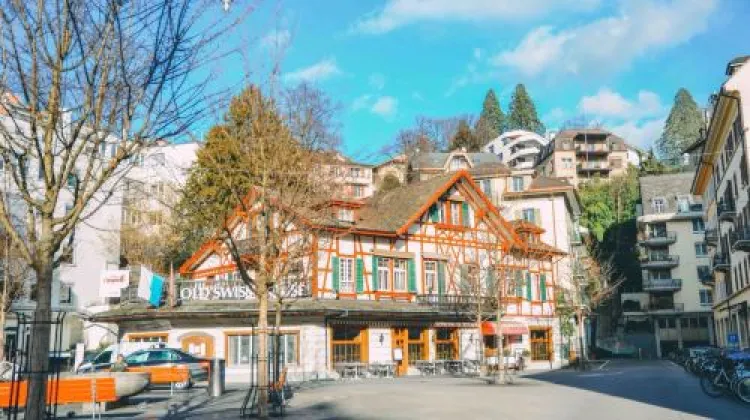
First and foremost, let's talk about airfare. The cost of your flight will depend on your departure city and the time of year you plan to travel. On average, a round-trip ticket from the United States to Switzerland can range from $800 to $1500 per person.
Next up, accommodation. The cost of lodging can vary depending on your preferences. For budget-conscious travelers, a night in a hostel or budget hotel can range from $50 to $100. If you're looking for a bit more comfort, mid-range hotels and luxury accommodations can cost anywhere from $150 to $500 per night.
Now, let's talk about food and drink. Switzerland offers a wide range of culinary experiences, and the cost can vary accordingly. For those on a budget, a meal at a local restaurant can range from $15 to $30 per person. If you're looking for a more indulgent dining experience, a mid-range meal can cost anywhere from $40 to $80.
Transportation is another factor to consider. The cost of getting around Switzerland can vary depending on your mode of travel. A single metro or train ticket can range from $2 to $10, while long-distance bullet train tickets can cost anywhere from $50 to $150. Taxis and car rentals are also available, but they can add to your transportation expenses.
Overall, the cost of a trip to Switzerland can range from a few hundred to several thousand dollars per person. This range takes into account the various factors mentioned above and caters to the needs of families, couples, and single travelers alike. So, whether you're embarking on a solo adventure or planning a romantic getaway, be prepared to budget accordingly and make the most of your Swiss experience!
- Methods to Save Money When Traveling to Switzerland
Planning a trip to Switzerland can be an exciting adventure, but it's no secret that it can also be quite expensive. However, with a little bit of research and some smart strategies, you can make your dream vacation to this picturesque country more affordable. Here are some tried and tested methods to save money when traveling to Switzerland.

First and foremost, consider traveling during the shoulder seasons. Switzerland is known for its stunning landscapes, regardless of the time of year. By avoiding the peak tourist season, you can not only enjoy fewer crowds but also benefit from lower prices on accommodation and attractions. Plus, you'll have the added advantage of experiencing the country's natural beauty in a more serene and intimate setting.
Another great way to save money is by opting for public transportation. Switzerland boasts an efficient and extensive network of trains, buses, and trams that can take you to almost every corner of the country. Investing in a Swiss Travel Pass can provide unlimited access to these modes of transportation, allowing you to explore the country at your own pace without breaking the bank.
When it comes to accommodation, consider staying in budget-friendly options such as hostels or guesthouses. These establishments not only offer affordable rates but also provide an opportunity to connect with fellow travelers from around the world. Additionally, booking your stay in advance and comparing prices across different platforms can help you find the best deals and save a significant amount of money.
Furthermore, dining out in Switzerland can be quite expensive, especially in popular tourist areas. To save money on food, consider exploring local markets and grocery stores where you can purchase fresh produce, snacks, and even ready-to-eat meals. Not only will this help you stick to your budget, but it will also give you a chance to taste authentic Swiss flavors.
Lastly, take advantage of the numerous free or discounted attractions and activities available in Switzerland. From hiking trails and scenic viewpoints to museums and cultural events, there are plenty of options to explore without spending a fortune. Researching and planning your itinerary in advance can help you make the most of these opportunities and ensure a memorable trip without breaking the bank.
By implementing these methods and being mindful of your expenses, you can enjoy a remarkable trip to Switzerland without worrying about the high costs typically associated with it. So, pack your bags, embrace the adventure, and get ready to create unforgettable memories in this enchanting Alpine paradise.
- Tips for traveling to Switzerland
Are you planning a trip to Switzerland? Well, you're in for a treat! Switzerland, with its breathtaking landscapes and rich cultural heritage, is a dream destination for many travelers. But before you embark on your Swiss adventure, here are eight essential tips to make your journey smooth and memorable.

1. Pack smart, pack light: Switzerland is known for its unpredictable weather, so make sure to pack layers and be prepared for sudden changes. Don't forget to bring a sturdy pair of walking shoes to explore the charming streets and picturesque hiking trails.
2. Get a Swiss Travel Pass: If you plan on exploring multiple cities in Switzerland, consider getting a Swiss Travel Pass. This pass offers unlimited travel on trains, buses, and boats, making it convenient and cost-effective.
3. Embrace the local cuisine: Switzerland is famous for its cheese, chocolate, and fondue. Don't miss the opportunity to indulge in these delicious treats. Also, try traditional Swiss dishes like raclette and rösti for an authentic culinary experience.
4. Explore beyond the cities: While Zurich and Geneva are popular tourist destinations, don't limit yourself to just the cities. Switzerland's countryside is dotted with charming villages and stunning alpine landscapes. Take a scenic train ride to experience the beauty of places like Lucerne, Interlaken, and Zermatt.
5. Respect the Swiss punctuality: Swiss people take punctuality seriously. Make sure to arrive on time for your train or bus, as they run like clockwork. Also, remember to greet people with a polite "Guten Tag" or "Bonjour" and say "Danke" or "Merci" when receiving assistance.
6. Stay connected: To stay connected during your trip, consider getting a local SIM card or using portable Wi-Fi devices available for rent. This will ensure you can navigate your way around, access important information, and share your travel experiences with loved ones.
7. Don't forget travel insurance: It's always better to be safe than sorry. Make sure to have travel insurance that covers medical emergencies, trip cancellations, and lost belongings. This will give you peace of mind throughout your journey.
8. Immerse yourself in Swiss culture: Switzerland is a melting pot of different cultures and languages. Take the time to learn a few basic phrases in German, French, or Italian, depending on the region you're visiting. Engage with the locals, visit museums, and attend cultural events to truly immerse yourself in the Swiss way of life.
So, whether you're a nature lover, a history buff, or a food enthusiast, Switzerland has something for everyone. Follow these tips, and you're sure to have an unforgettable experience in this picturesque country. Happy travels!
* All user reviews in this article have been translated by machine.
* The information above is subject to change at any time. For the latest information, please check the websites of hotels and attractions.
Table of Content
- Customer Support
- Service Guarantee
- More Service Info
- Website Feedback
- About Trip.com
- Terms & Conditions
- Privacy Statement
- About Trip.com Group
Other Services
- Investor Relations
- Affiliate Program
- List My Property
- Become a Supplier
Best Time to Visit
Weather & Climate
Switzerland Airports
Getting Around
Places to Visit in Switzerland
Top Things to Do in Switzerland
Top Things to Do in Geneva
One Week Itinerary
Most Scenic Train Routes
Switzerland's Nature Parks
How to Go Skiing
The Top Hikes
Matterhorn Complete Guide
The Most Beautiful Lakes
Foods to Try
Best Restaurants
Your Trip to Switzerland: The Complete Guide
:max_bytes(150000):strip_icc():format(webp)/ElizabethHeath-Headshot-horiz-e7525e97616245958bf3d94e8db7f119.png)
If you've ever ogled over photos of Switzerland's Alpine peaks, rolling meadows, and pristine lakes, you'll be happy to know that it's even more beautiful in person. The central European country is small compared to its neighbors, but it packs a lot into its 16,000 square miles, including 13 UNESCO World Heritage Sites , more than 1,500 glaciers, and at least that many lakes.
All these geologic wonders add up to some of the more stunning scenery in the world. And that's enough to bring travelers—about 12 million of them per year —to Switzerland. When you factor in the countless opportunities for hiking, skiing, and boating; hearty Swiss food; modern, interesting cities; and what is probably Europe's best public transportation system, you're met with an accessible, exciting, and altogether satisfying vacation destination.
Planning Your Trip
- Best Time to Visit : The best time to visit Switzerland depends on what you want to do while you're here. Ski slopes are open November through March (though there is year-round skiing in a few places), while hiking and swimming are glorious in the summer months. But to beat the crowds, consider a visit in spring or fall.
- Language: Switzerland's cantons, or states, are mostly either French- or German-speaking. In the southern Ticino canton, Italian is the first language and in the Graubünden/Grisons canton, Romansh, a form of ancient Latin, is still spoken by about 60,000 people. The good news for travelers is that English is widely spoken, especially in hotels, restaurants, stores, and tourist attractions.
- Currency: Despite being in the middle of western Europe, Switzerland is not part of the EU, though it participates in the European Common economic market. The official currency here is the Swiss franc (abbreviated CHF). That said, your euros will probably be accepted at most places, though they'll give you change in francs.
- Getting Around : The clean, convenient, and comprehensive Swiss Travel System is the pride of Switzerland, and rightly so. The system includes trains, buses, lake and river ferries, funiculars, cogwheel trains, ski lifts, and gondolas that permit access to virtually every corner of the country. Because the system is so complete, we recommend touring Switzerland by public transportation, instead of by rental car. From airports and larger train stations, taxis are always available for those who don't feel like schlepping their bags.
- Travel Tip: If you plan to do a lot of travel within Switzerland, consider purchasing the Swiss Travel Pass , which grants the holder unlimited first- or second-class travel across the country's network of trains, buses, and boats, and most scenic railways. Plus, you'll get admission to more than 500 museums, as well as discounts on mountain excursions. However, if you just plan to visit a couple of places in the country, you can get by with individual train/transit tickets.
TripSavvy / Michela Sieman
Things to Do
While every traveler has their own reasons for visiting Switzerland, the big draws here can more or less be broken down into three categories: scenery, outdoor activities, and Swiss history and culture. Your trip will likely start or end in one of Switzerland's big cities, where that history and culture are on full display. Be sure to plan at least one (or several) excursions into the Swiss countryside, either on an easy or challenging hike, a boat ride across an iconic lake, or a cable car ride up to some of the highest peaks in Europe.
Here are some ideas for planning your Swiss itinerary:
- Explore one of the country's culturally rich cities. If you're flying into Switzerland, you'll most likely arrive in Zürich or Geneva. Zürich , Switzerland's largest city, is a delightful place to spend a few days taking in art and history museums, dining in centuries-old restaurants, and strolling down the River Limmat. Geneva , in French-speaking Switzerland, is the diplomatic center of Europe, with plenty of history and classical appeal, and an idyllic setting on the shores of Lake Geneva.
- Hike, bike, swim, or ski. No matter what time of year you visit, you'll find a huge range of outdoor activities in Switzerland—though admittedly, swimming is a bit brisk from October to June! There are biking and hiking routes for every level of fitness, extensive networks of ski "arenas" across the Alps and the Jura mountains, and rivers and lakes waiting for you to jump in for a swim or a paddle.
- Choose a mountain excursion. In Switzerland, it doesn't matter if you're not a skier or hiker. You can answer the call of the mountains just the same, thanks to dozens of scenic mountain excursions that whisk you—by cogwheel rail, cable car, or ski gondola—for close-up looks at the Matterhorn , the Eiger, the Aletsch Glacier, and more. At most places, you can have lunch on the mountaintop while you enjoy the view. Don't leave Switzerland without partaking in at least one of these thrilling rides.
For more trip-planning ideas, check out our full-length articles on the top things to do in Switzerland , Switzerland's most scenic train rides , and Switzerland's top lakes .
What to Eat and Drink
Swiss cuisine is hearty, to say the least. Cheese, chocolate, potatoes, and meat feature heavily on Swiss menus everywhere, and risotto is popular in the cantons bordering Italy. Swiss wine, from vineyards mostly south of the Alps, is so popular among the Swiss that only 2 percent is exported!
Here are some of the foods and beverages you shouldn't miss in Switzerland:
- Fondue. This classic dish of melted cheese, served with bread and vegetables for dipping, is as iconic as the Matterhorn. Fondue originated in French-speaking Switzerland , but it's pretty much ubiquitous across the country.
- Raclette. Sort of a cousin of fondue, raclette is melted cheese served on a plate with bread, potatoes, and gherkins. Its roots are high in the Alps, where farmers would make meals from their abundant cheese reserves.
- Rösti. Pancakes made of grated, fried potatoes, rösti may be served as a side dish or, when paired with eggs, meat, or cheese, as the main course.
- Chocolate. Thanks to milk from grass-fed Alpine cows, plus a few "secret" recipes, Swiss milk chocolate is among the creamiest in the world. Brands to look for include Toberlone, Lindt, Sprüngli, and Läderach.
- Swiss wine. Largely produced in the more temperant cantons south of the Alps, Swiss wine is equally celebrated in its red and white varieties. Chasselas and pinot noir are among the most common grapes, but across the country's wine-growing region, micro-vineyards specialize in small-batch wines. Be sure to sample the wine while you're here— Swiss wine is hard to find outside Switzerland.
Read more in our guides to the top foods to try in Switzerland and where to eat in Zürich .
Where to Stay
Switzerland's accommodation options range from rustic mountain bunkhouses for hikers to luxurious 5-star hotels with spas, Michelin-star dining, and every imaginable amenity. In between those extremes, there are concept hotels, ski-in/ski-out lodges, and a host of B&Bs, small inns, and vacation rentals.
If you're staying in a city, we usually recommend basing yourself in the historic center so that you're within walking distance of popular tourist attractions, restaurants, and bars. But cities like Zürich also have creative, modern districts outside of the center, which make for interesting bases as well. In an Alpine destination such as Zermatt, Saas-Fee, or Gstaad, we like cozy, traditional hotels that really impart a sense of place.
For a taste of what Zürich has to offer, check out our articles on Zürich's top neighborhoods and best hotels.
Getting to Switzerland
International flights to Switzerland, especially those originating outside of Europe, will likely arrive in Zürich or Geneva. Some intra-Europe flights might land at Basel's airport, which is actually located just over the French border.
You can reach Switzerland by train from the neighboring countries of Austria, Germany, France, and Italy. Note that if you're traveling to Switzerland from an adjacent country, your ticket will likely only cover you until your first stop in Switzerland; for example, if you're traveling from Milan, Italy, your ticket will take you as far as Lugano. After that, you'll need a travel pass or ticket from the Swiss Travel System if you want to change trains.
If you're driving to Switzerland, you need to purchase or make sure your car already has a motorway vignette —a sticker that permits access to Swiss highways.
Learn more by checking out our guides to Zürich airport , traveling to Switzerland from Italy , and Zürich's public transportation .
Culture and Customs
While there are no special "rules" for visiting Switzerland, travelers here might find the Swiss somewhat reserved, especially when compared to Mediterranean cultures to the south. Here are a few basic customs and courtesies to keep in mind:
- Be on time. Trains aren't the only thing that runs on time in Switzerland. Plan to arrive on time, or even a few minutes early, for restaurant reservations or other reserved activities.
- Don't be noisy. In restaurants, on public transportation, and especially in the evenings in residential areas, keep your voices at a conversational level.
- Tip in moderation. While tipping waitstaff is appreciated in Switzerland, it's not expected. Tips for your hotel cleaning staff and bellhops are the norm, however.
Money Saving Tips
Here's something you should know about Switzerland before you start planning your trip: it's expensive. Hotels, dining, trains, and attractions are all costly compared to many other European countries, but there are a few ways you can save money:
- Travel in the shoulder seasons. Visit Switzerland in the spring or fall to save money on airfare and hotels.
- Drink tap water. Unless otherwise posted, tap water in Switzerland is clean and safe to drink. Bring a reusable water bottle and fill it up at any tap.
- Pack a picnic. Before you head out for a day of adventures, stop at a grocery store and pick up bread, cheese, cold cuts, or whatever else you want for a picnic. Just don't forget to grab a chocolate bar for the road!
https://whc.unesco.org/en/statesparties/ch
https://www.worlddata.info/europe/switzerland/tourism.php
Switzerland Tourism. "Language distribution." Retrieved on November 9, 2021.
Switzerland Tourism. "Currency." Retrieved on November 9, 2021.
BBC. "Tracing fondue’s mysterious origins." February 12, 2013.
Switzerland Travel Guide
The Best 17 Places to Visit in Switzerland
The Top 20 Things to Do in Switzerland
Lake Como Guide: Planning Your Trip
One Week in Switzerland: The Ultimate Itinerary
The 10 Best Restaurants in Switzerland
How to Travel From Florence to Paris by Train, Bus, Plane, and Car
France Guide: Planning Your Trip
Matterhorn: The Complete Guide
The Complete Guide to Switzerland's Nature Parks
How to Travel Between Italy and Switzerland by Train
The Best Time to Visit Switzerland
The Most Beautiful Lakes in Switzerland
Your Trip to Zurich: The Complete Guide
France Travel Planner for Every Vacation
How to Use Swiss Trains and the Swiss Travel Pass

Is Switzerland Expensive To Visit? Trip Costs in 2024
Written By: The Planet D
Switzerland
Updated On: March 14, 2024
Is Switzerland expensive? Visiting Switzerland is more expensive than visiting other countries; there’s no denying that. So when booking a trip to Switzerland, it’s important to take its travel costs into consideration. Statistically, we can say that Switzerland is the third most expensive country in the world. The average monthly living cost in Switzerland is $2,850 per person. Naturally, that high cost will affect you as a traveler with higher hotel prices, food, and activities. So, to answer your question, yes, Switzerland is expensive. When planning a trip to Switzerland, it is only fitting that you should be wary of budgeting.
However, with careful planning, travelers can visit Switzerland without breaking the bank. Switzerland will never be as affordable as other destinations, but the average person can travel comfortably when taking advantage of booking in advance, using public transportation, and finding accommodation to suit their budget.
Table of Contents
Is It Expensive To Visit Switzerland?
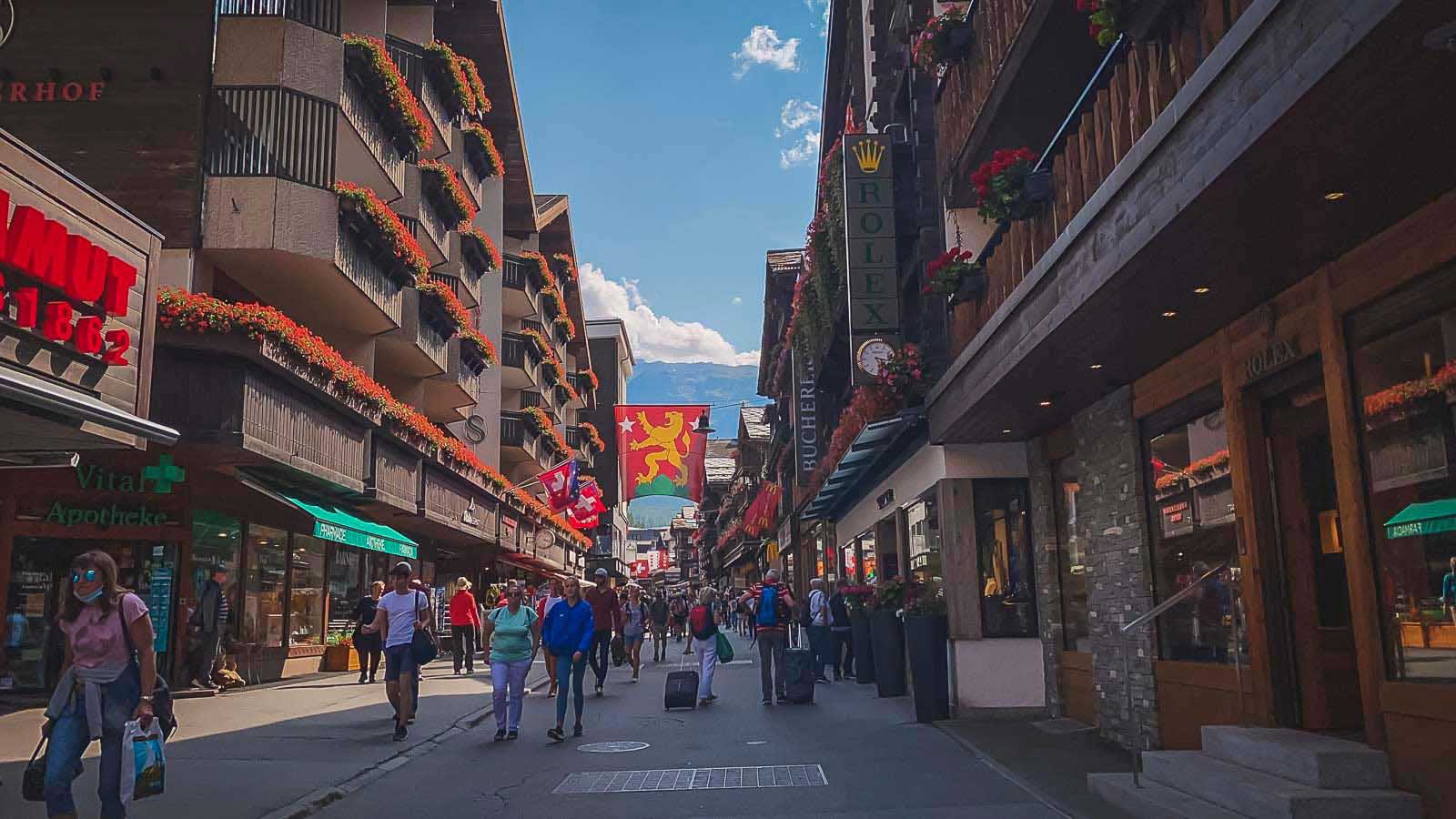
A trip to Switzerland can quickly add up when it comes to budgeting. Before traveling, it is important to have an idea of what things cost so you can make your visit to Switzerland more financially feasible – whatever your budget.
Speaking of budgeting, the Swiss Franc (CHF) is a strong currency. It is currently stronger than the USD and the Euro. At the time of writing, the conversion rate is around 1 Swiss Franc to 1.10 US Dollars and 1 Swiss Franc to €1,05 Euro.
In this guide, we’ll look at a cost breakdown of visiting Switzerland. We’ll cover everything – from accommodation costs to food and activities. You may also want to read 10 Simple Ways to Travel Switzerland on a Budget
Cost of Accommodation

Accommodation costs are always one of the significant travel costs, especially in Switzerland. Hotel prices tend to be at least $100 per night in most affluent countries and even more in Switzerland. Especially if you pick a highly sought-after area. If the area is in demand with tourists, hotels have the freedom to hike their average prices.
Luxury hotels in the city center will obviously bump up your Switzerland trip cost. If you want to save money, consider hostels and the possibility of sacrificing a private room experience for a dorm room.
It is a balancing act, and standard rules apply when looking at hotel prices in Switzerland. The cost of your hotel will vary greatly depending on your travel style, where you stay, and what season you visit.
The most expensive places to stay are in most cities in Switzerland like Zurich and Geneva . This is simply because these are the most sought-after areas. Remember, the higher the demand, the higher the average prices. When staying in big cities, you may want to stay a little outside of town. It’s easy to do with Switzerland’s impeccable transit system.
There are a few places in Switzerland that have a reputation for being slightly cheaper, including Appenzell, Jura, and Valais. You will likely escape the higher prices by visiting smaller towns, too, where you are also more likely to get the best deals in the off-season simply because of the fewer tourists.
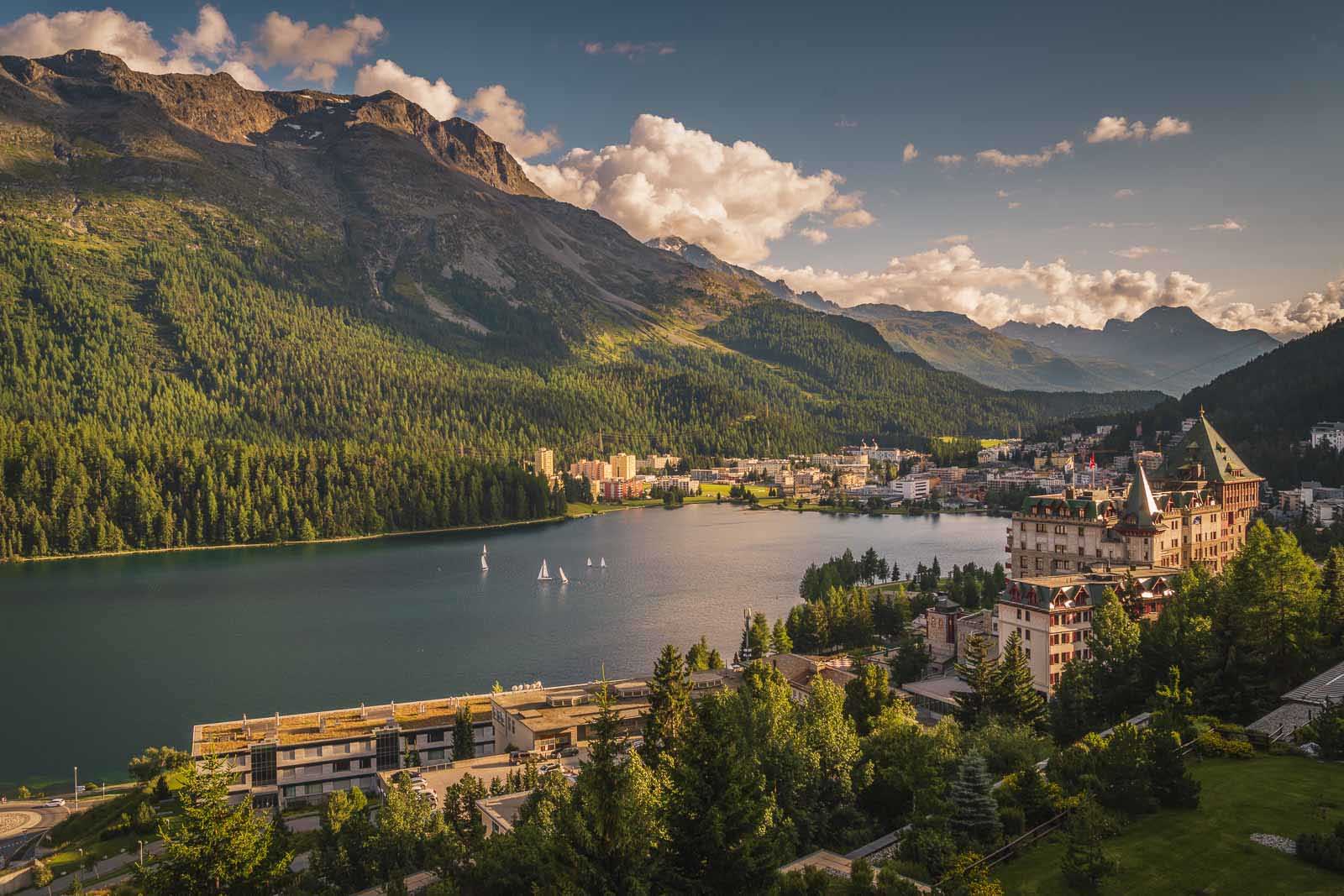
Location is definitely a key consideration when you research accommodation costs in Switzerland. You should also consider how long you are planning to stay and where you are going to visit. A stay in Grindelwald will be more expensive than Interlaken when visiting Jungfraujoch, but you will be closer to all the attractions.
If you are staying longer in one destination, consider combining a more expensive short stay in the city center and then moving to a less expensive destination outside of town.
Accommodation Types
Regarding accommodation types, you have the standard three: budget, mid-range, and luxury.
Budget accommodations come in the form of hostels and homestays. You can expect dormitory-style rooms or private rooms in a local home, usually with shared bathroom facilities.
Mid-range accommodation is basic hotel rooms, usually a little out of the city center, to save money. It is important to take transportation costs into consideration if you are staying outside the city.
Luxury accommodation in Switzerland can have seriously high prices – whatever you want to pay, you’ll find accommodation to match it. Luxury accommodation is typically in the city centers for maximum convenience. It has fantastic facilities like pools, spas, and fine dining restaurants on-site.
If you want to stay in Switzerland for a little longer, consider something like Work Away or housesitting. This usually requires a few hours of work daily, providing you with a few free nights’ accommodations as ‘payment’. You’ll have to check visa requirements to see if you are entitled to do so on a tourist visa. Still, as a whole, this is a trendy way for travelers to reduce their costs and lengthen their experience in Switzerland.
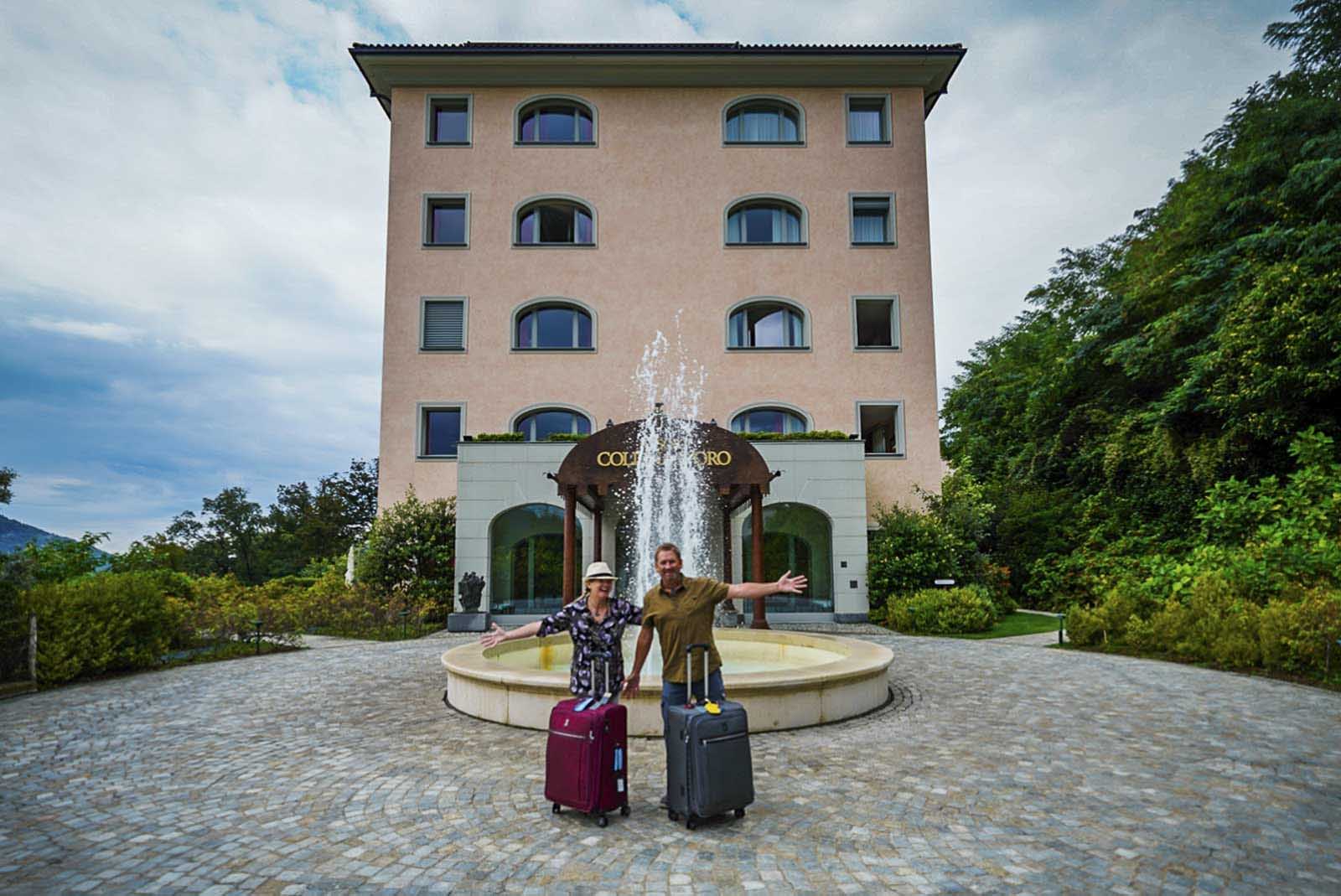
We have a few examples of the different accommodation types and what prices you can expect. For budget accommodation, there are hostels like Funny Farm Backpackers in Interlaken. Even as a hostel, it has impressive facilities, including an on-site ski school and an outdoor pool for summer use. You can book a mix of dorm or double rooms with ensuites, the latter of which cost around $120 per night.
Also, in Interlaken, Hotel Chalet Ski is the perfect mid-range option. It has some character, rocketing it into a more mid-range rather than budget category. The chalet dates back to 1862 and still retains its ultra-traditional architecture. Guests can enjoy a sauna and a free pass to use the local buses. This comes at a moderate price of around $150 per night.
As a luxury choice, the Savoy Tower Interlaken offers a more realistic picture of costs. This huge 5-star hotel looks like a fairytale palace with a beautiful backdrop of snow-capped mountains. At around $600 per night, luxury certainly doesn’t come cheap. Still, you get all the benefits of a scenic location and your own apartment-style accommodation with the hotel.
The average budget accommodation consists of a hostel or a homestay. For dorm accommodation, you should budget around $60 or 55 CHF per person. In comparison, private rooms in hostels cost around 108 CHF per night per person ($120). This quickly adds up to an average of 377 CHF – 750 CHF per week. ($420 to $840)
Mid-range accommodations cost more in the region of 135 CHF – 179 CHF per night ($150 to $200) and consist of slightly more characterful buildings or properties with more facilities. You’ll get private rooms, usually ensuite, and good locations. This adds up to around 898 CHF – 1250 CHF per week ($ 1,000 to $1,400).
Luxury accommodation costs more like 540 CHF – 898 CHF per night ($600 to $1,000) with excellently located properties featuring deluxe furnishings and facilities. This totals up to a jaw-dropping $4,200 to $7,000 per week. Luxury hotels certainly come at a cost in Switzerland.
Cost of Transportation

When planning a holiday to anywhere, your initial transport costs will likely take up a considerable chunk of your budget. Depending on where you go, this could be anything from a plane ticket to a train ticket.
You may want to purchase a Swiss Travel Pas. A Swiss Travel Pass includes unlimited travel on public transportation throughout the country and can be booked for 3-15 days. Costs range from 220-490 CHF. The pass also has plenty of perks including free entry or discounts to museums and attractions.
When you visit Switzerland, your main choices will be finding a cheap flight or purchasing train tickets. Both can be expensive, but you can definitely snag good deals by shopping out off-season and using discounts like student cards where possible. Let’s take a look at the initial cost of transport for your trip to Switzerland, aka the price you’ll incur getting there and back.
If you settle on flying into Switzerland, you’ll find cheap flights from all over Europe – usually under $80 for a one-way flight and sometimes under $40. If you are flying to Switzerland from the US, this is a bit pricier, averaging around $300 to $700 one way; exact prices vary based on when you decide to visit. If you choose to take the train, you can get one-way tickets from different destinations in Europe to Switzerland at prices starting at around $30.
The train might be slower, but you get stunning scenery. Plus, the Swiss rail system is very efficient and there is a train station central in every town and city.
And when purchasing tickets in advance, you can snag some really competitive deals. Of course, there’s also the environmental benefit, with public transportation being much better in the battle against global warming. If you are already staying in Europe, we’d suggest heading to your train station and buying a train ticket to get to Switzerland. Check out the Swiss Rail Pass if you are planning to travel a lot.
Needless to say, just getting to Switzerland and back won’t be the only time you need to worry about public transportation. The extent to which you’ll need to budget for local transportation will vary depending on your plans. After all, it depends on where you want to go on your trip to Switzerland – will you be traveling around different towns and cities when you travel to Switzerland? Or will you just be staying put in a single city and using public transport once or twice for airport transfers and a day trip? Your plans definitely dictate your budget, so it helps to compare budgets.
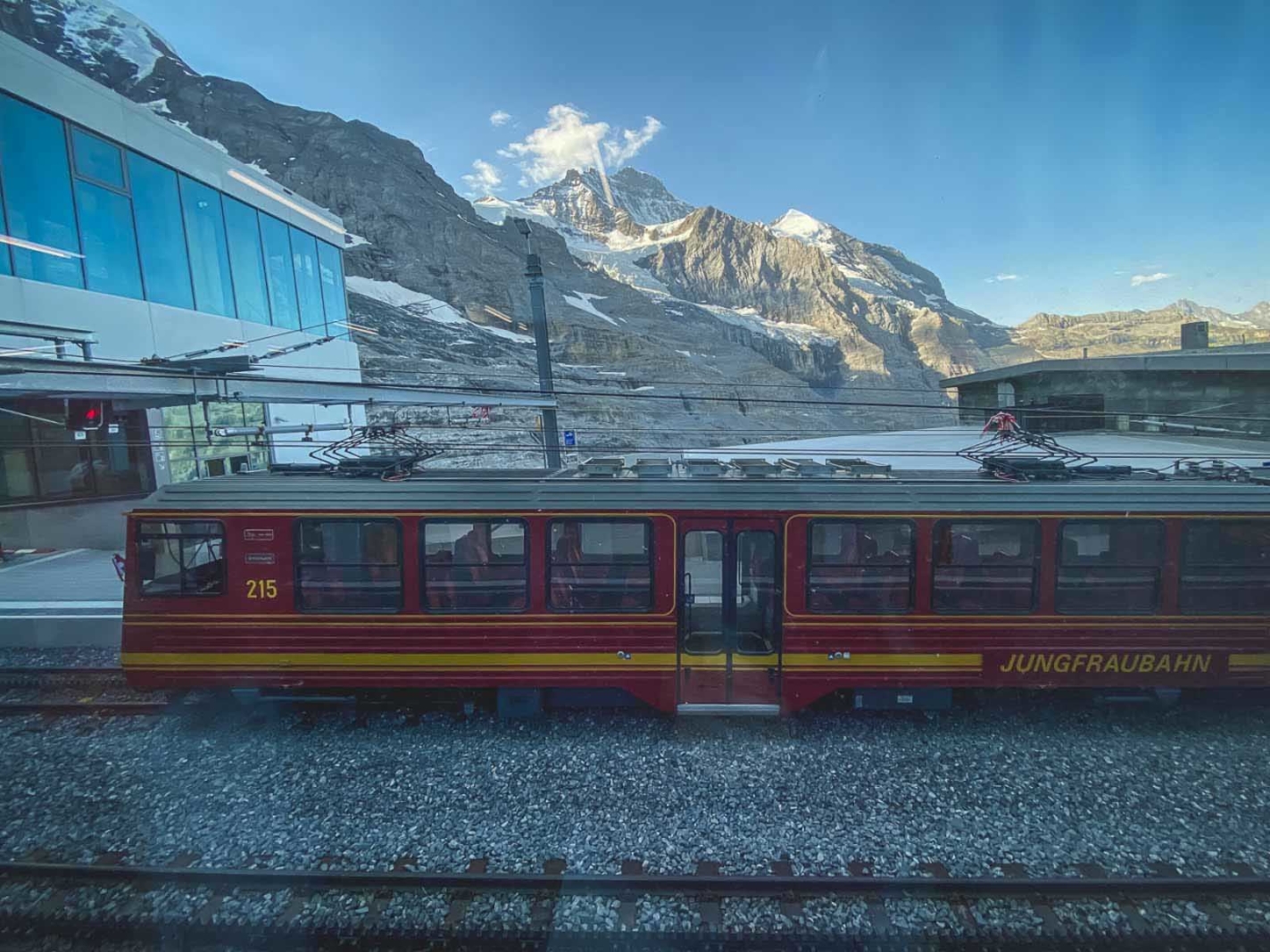
If you want to travel around Switzerland to different cities, we’d suggest budgeting around $150 for a week, including 2 to 3 trips between major cities and also standard bus and tram use. Transport can add up when traveling around Switzerland, which is notorious for sky-high prices on rail travel. As a guideline, it is around $40 per one-way journey between neighboring significant cities, so you can see how it quickly adds up.
If you are planning on traveling around a lot, consider the Swiss Travel Pass . The Swiss Travel Pass gives you unlimited travel on public transportation, be it bus, boat, or train tickets. You also get unlimited travel on panorama trains, free admission to over 500 museums, and discounts on hundreds of attractions. It is ideal for tourists who are intensely traveling across Switzerland. Its rate varies depending on which period you choose. Still, you can opt for anything from 3 to 15 days, choosing between 2nd and 1st class. 6 days in 2nd class is 359 CHR per person, while 6 days in 1st class is 570 CHF per person. (This is roughly $400 and $600 per person)
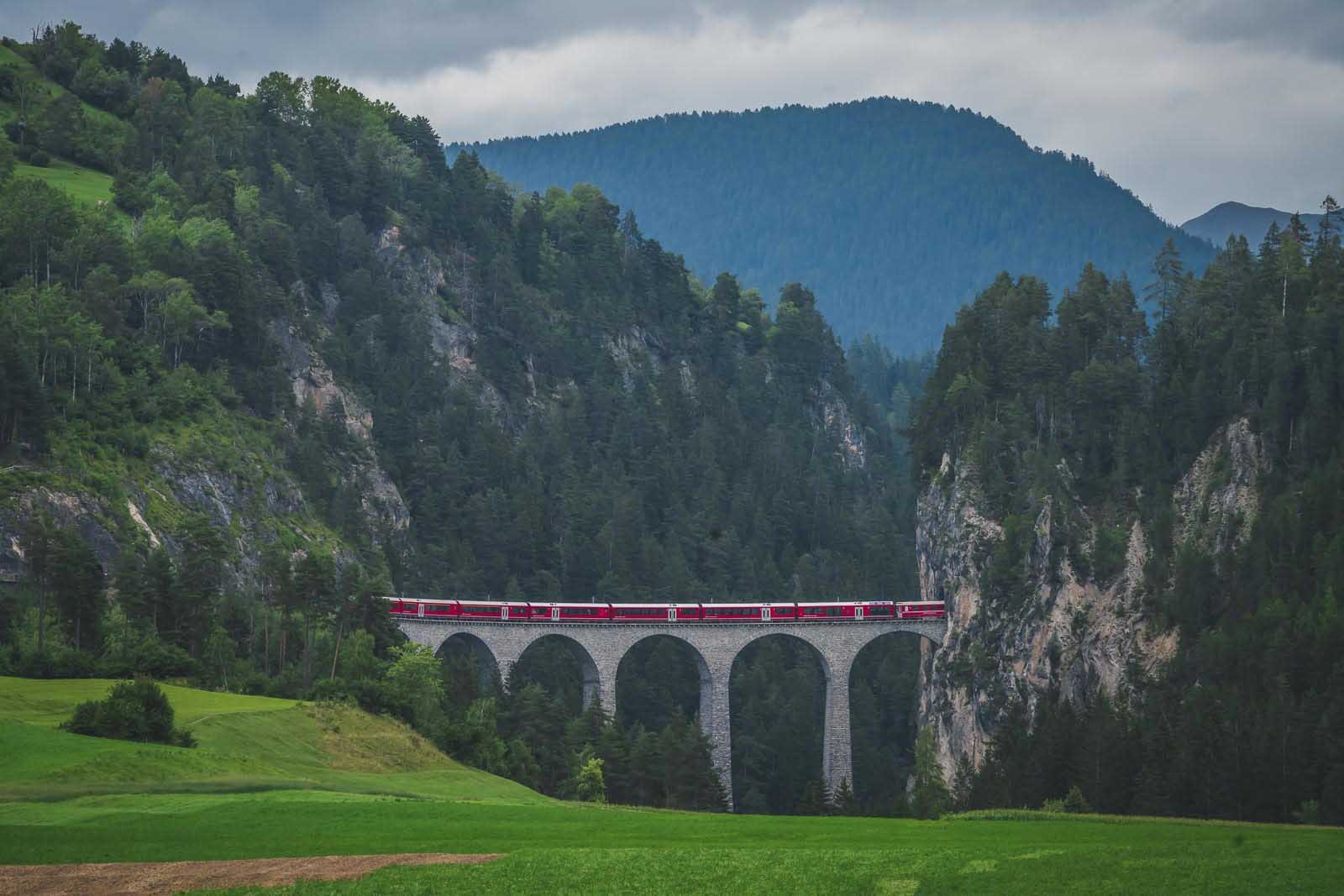
If you want to just stay in one city, we’d suggest budgeting around $40 for the bus and tram, as well as any day trips. Most cities also have a city card to bundle all your transportation. Lucky you! You’ve hit the low-budget option. Just keep aside a little extra for airport transfers if you need them.
Finally, another option for traveling around Switzerland is by rental car. Rental cars are easy to find and available at all major airports. If you decide against public transport and want a rental car, you should budget around $40 per day for a standard vehicle, not including any necessary insurance policies.
So, as a whole, for 7 days, we’d budget $400 per person using a Swiss Travel Pass, $150 per person using just a few long-distance public transport journeys, $40 per person for a minimal traveling city break, and $280 when renting a car. Switzerland is definitely expensive compared to other countries in Europe when it comes to travel. It is worth sitting down to compare prices of the different itinerary costs, especially for budget travelers.
Cost of Food
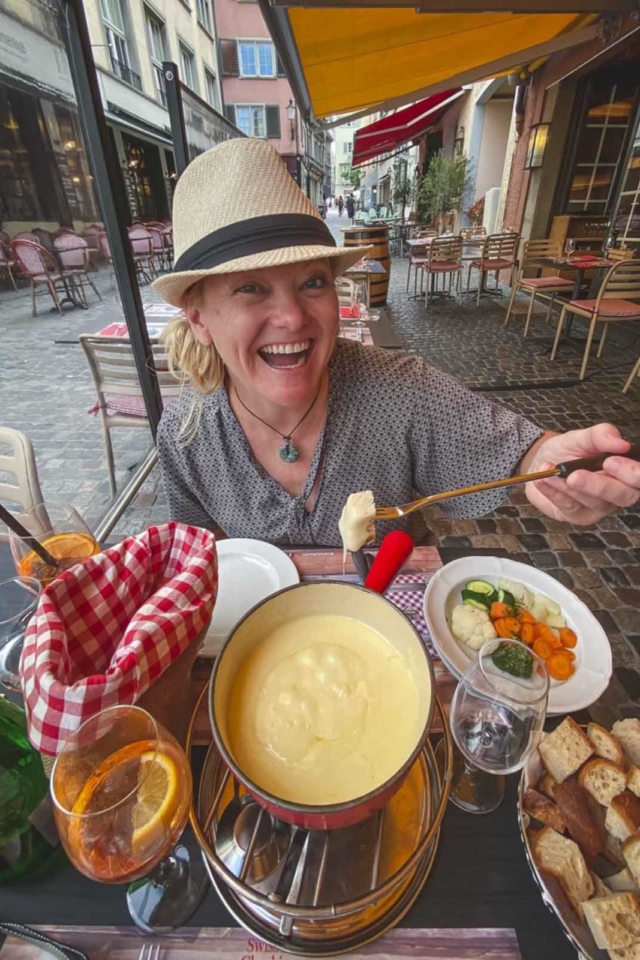
Food costs are one of those things that gradually chip away at our budget. Still, with delicious dishes like cheese fondue you must indulge in Swiss cuisine . The only issue is that Switzerland has sky-high food prices – up to 78% higher than other food costs in Europe. Even fast food is pricier in Switzerland. Whether you buy a soft drink or that delicious cheese fondue, you will pay premium prices. It does vary a bit depending on whether you stay in smaller towns or expensive cities.
Prices vary depending on where you are eating. Are you eating at restaurants? Are you getting fast food or takeout? Or are you going grocery shopping to cook at ‘home’? Whether you are a budget traveler or not, you should know roughly what percentage of restaurant meals you’ll be having if you want to get an accurate food budget. As we said, Switzerland is one of the most expensive country choices when traveling to European countries – it comes with the territory.
As a quick side note, let’s quickly look at the foods that are absolutely worth splurging on when you travel to Switzerland. These are the food and drinks that are traditional or part of the cultural scene in Switzerland, plus a few restaurants you should jot down and visit.
- Cheese fondue
Cheese fondue is the delicious food mentioned above – melted cheese with white wine and dipping bread. It is an absolute must-try when you travel to Switzerland, especially as a warming dish in winter.
Switzerland likes its cheese, that’s for sure. This dish involves melting half a cheese slice and then scraping the melted section onto a plate. Raclette is then adorned with extra ingredients like potatoes and gherkins.
This unusual dish is a dried sausage mixed with pork, lard, red wine, beef, and a bit of sugar for an extra touch. Landjagers were created to fuel those hiking or traveling on foot. Now, they are a tasty treat for anyone who loves trying meat dishes.
A rosti is a huge potato fritter-style dish that is also a bit like a pancake. The potato is mashed to create a pancake-shaped form and then cooked in a pan. It is tasty and warming, precisely what you need in the cold.
Vivi Kola is the Swiss alternative to Coca-Cola and was relaunched in 2010 after pausing its 50-year production in 1980. The draw of Vivi Kola is its 100% natural ingredients – a bit of a health kick for anyone avoiding sugary drinks. You should find it in most grocery stores and corner shops.
Roteli is a bright cherry liqueur with a distinctive taste. If you fancy an alcoholic beverage, this is the one to pick. You should find it in most bars and stores selling alcohol. Read more: 15 Swiss Foods to try in Switzerland or at Home
So now that you’ve got a rough idea of what to eat and drink in Switzerland, what should you budget for food? If you have a tight budget, stick to grocery stores and find self-catered accommodation. Accommodation options like hostels typically offer kitchen facilities, meaning you can cook low-cost meals and keep your food budget low when visiting. A weekly budget when using grocery shops should cost around $60 per week per person.
A more mid-range budget might include 2 to 3 restaurant meals out, while a luxury might be eating out every day. On a mid-range budget, you should budget $60 for a grocery shop and approximately $55 per meal, totaling around $225 for a week in Switzerland.
On a luxury budget, eating out three times a day, you would budget around $20 for breakfast, $30 for lunch, and $55+ for dinner. This would total approximately $735 a week just on food in Switzerland. You should add extra if you plan on drinking or splashing out on fine dining. Read: Stunning St. Moritz – Summer fun in Switzerland
It is easy to see how it all adds up, isn’t it? As we said, to reduce costs, you should try to find accommodation with kitchen facilities. Even having a hotel room with a kettle, fridge, or breakfast included can help, too. How much you budget for food is massively impacted by your chosen accommodation, so pay careful attention to that stage of planning your trip.
Cost of Activities
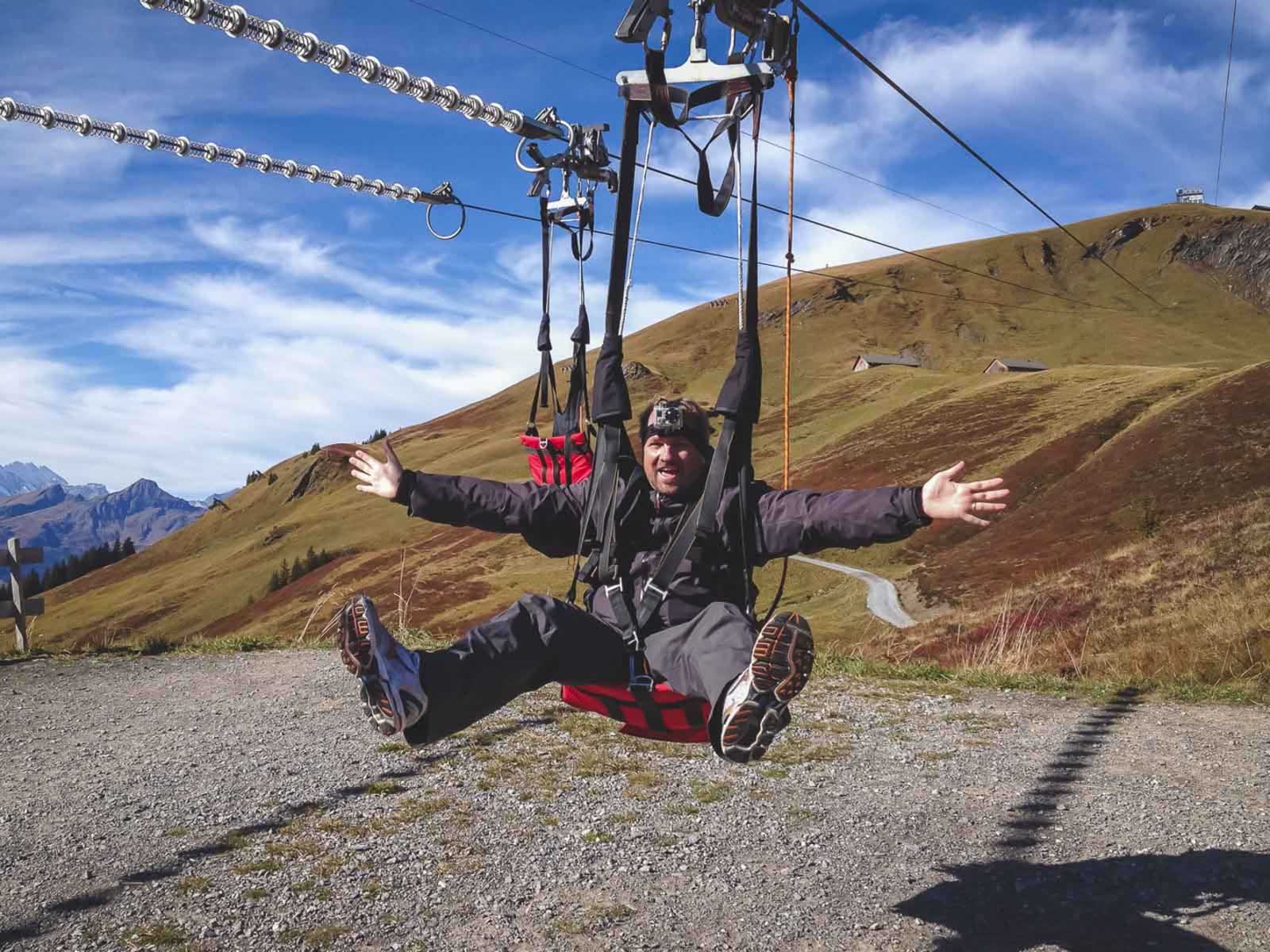
Finally, here is one of the most fun budget categories to consider – activities. Depending on you as a traveler and where you go, prices for activities vary widely depending on the type of adventure and where it is located. You could find yourself shopping for souvenirs like Swiss army knives at flea markets, picking up precision watches from Geneva, or even going paragliding in Interlaken. You could taste chocolate, go skiing, embark on a guided hike , or visit local museums.
There truly is so much to do and see in Switzerland. The country has beautiful scenery, many mountainous areas, and huge lakes. You certainly won’t be stuck for stunning natural views. Similarly, though, its cities are equally exciting, with many free activities to be enjoyed and free admission to set attractions. Switzerland has a reputation for having expensive cities, but you can find activities nationwide to fit your budget.
The standard cost of sightseeing and enjoying tourist activities in Europe is around $200 for a weekend city break or $500 for a week if you take guided tours and day trips. That is for neighboring countries rather than Switzerland specifically, though, so what should you budget when planning a Switzerland-specific activity budget?
The good news is that it doesn’t have to break your bank account, as there are plenty of free entry things to do in Switzerland. You could hike or even visit a museum with free admission – especially if you invested in that Swiss Travel Pass we mentioned earlier in the transport section.
However, if you want to tick off any bucket-list experiences, like paragliding , you’ll easily set aside $100 to $200 per experience. And even certain museums can quickly add up with entry prices of around $15 to $20 per person. If you are going for a week-long summer vacation, it is easy to see why Switzerland is deemed an expensive country. There are just so many activities to be tempted by – like paragliding and day-tripping to Mont Blanc on guided tours . Your budget will massively vary depending on which of these experiences and activities you choose to fill your itinerary with when visiting Switzerland.
The photo above is from our time in Grindelwald Switzerland. Read more here .

So, how do you overcome this? We’d suggest going through all the bucket lists but “boujee experiences”, like skiing, going to the top of Jungfraujoch or the Matterhorn and Mont Blanc. Really get to grips with which ones you’d love to do, and then strike off the ones you aren’t absolutely sold on. Then, you can look at the more affordable options, like the Lindt Home of Chocolate Museum at $15 per entry, and go through the same process.
By now, you’ll have a list of activities you’d like to do. Line it up next to your ideal budget and see if you need to cross any further activities off, and then just fill in your itinerary gaps with free things to do. It is worth adding that you can make some things cheaper by opting out of expensive tours and taking yourself there independently on local transportation.
So how much should you budget for a week? We’d suggest $500 to $600 per week if you want one guided day trip, one bucket-list experience, and a daily ‘affordable’ activity like a $15 museum. If you wish to explore independently and enjoy daily affordable activities, a budget of $200 to $300 should suffice for a week. And finally, if you are just sticking to free and a few affordable activities, you could get by on $100 to $200.
The photo above is from our time in Basel Switzerland. Read more here .
A Budget For 1 Week
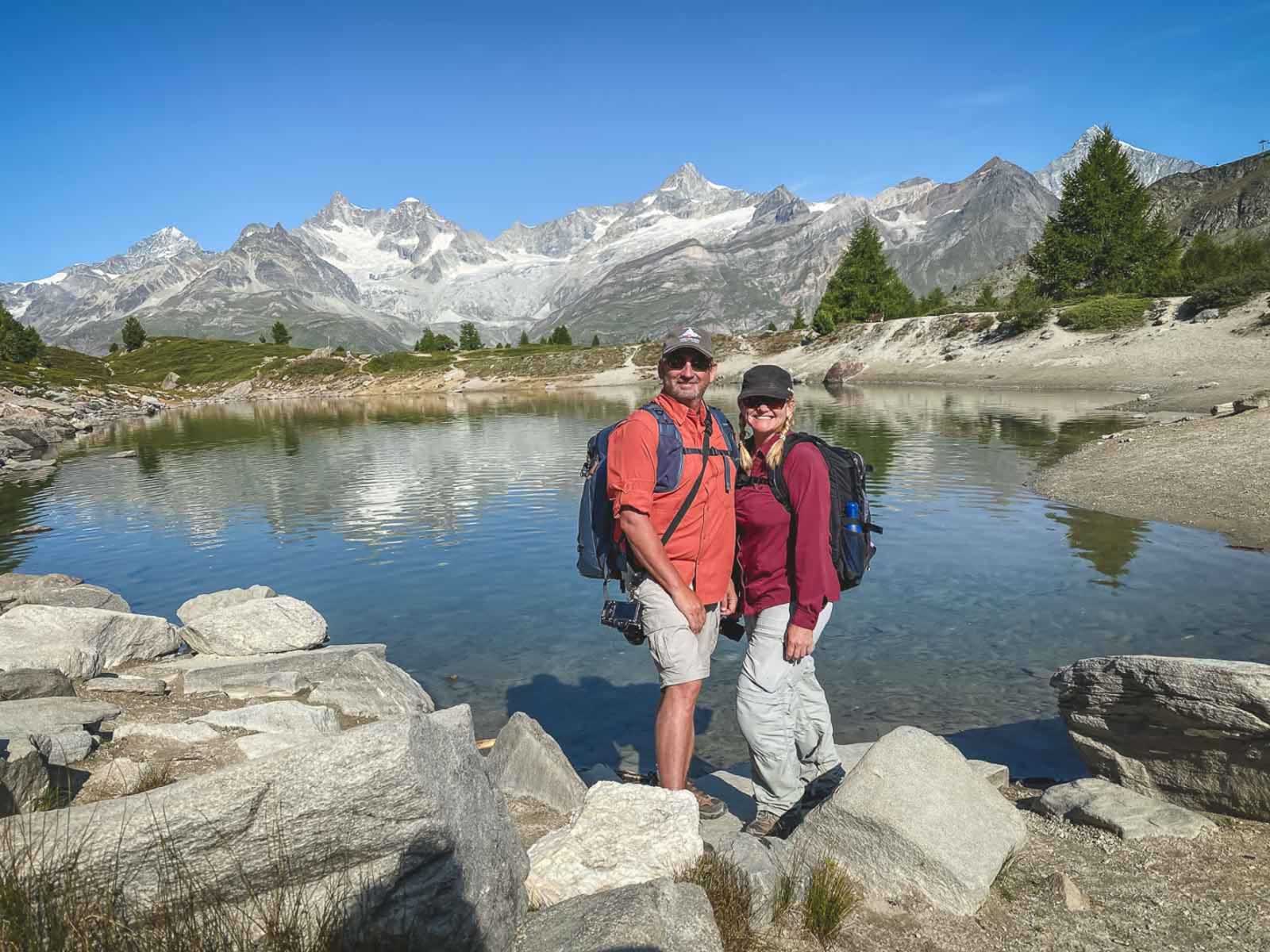
Is Switzerland expensive? We all know that it can be. If you are visiting for a week, there are a few factors that will impact your Switzerland trip cost. A 1-week itinerary is lots of fun, but equally, there are a few things to weigh up. Let’s take a quick look at these factors before diving into your overall budget for 1 week in Switzerland. See more about our time in Zermatt
Accommodation
First, where do you want to stay? Staying in the city center in major cities is bound to spike your accommodation prices. Similarly, will you be staying in luxury, mid-range, or budget hotels?
All of these accommodation categories will impact how much you need to budget for a week’s accommodation in Switzerland. Let’s say you are staying in the city center. These are the rough costs:
- Budget : $630
- Mid-range : $1,200
- Luxury : $5,600
Transport varies drastically depending on your itinerary. For instance, you could travel all over Switzerland, racking up an expensive train ticket bill. Or you could stay in the city center, only paying for airport transfers at around $40. A Swiss Travel Pass costs around $400 for 6 days, while a rental car costs $280 for a week, and the average budget for someone traveling to a couple of places in Switzerland is $150.
As an average, we’d say budget $200 for general transport within Switzerland. Your flights or train then cost as little as $200 if you are traveling within Europe or $500 if you are traveling from further afield, like the US.
- Transport with flights from Europe : $400
- Transport with flights from the US or other : $700
Food will depend on where you plan on staying on your trip to Switzerland. Will you stay in a hotel that has a fridge and complimentary breakfast? Will you find an apartment or hostel with kitchen facilities? It is your call, but your budget is up for debate, depending on your choice.
A budget traveler would likely cook mostly grocery-bought meals, a mid-range would eat out a handful of times a week, and a luxury traveler is likelier to dine out for every meal. Let’s take a look at the budgets:
- Budget : $60
- Mid-range : $225
- Luxury: $735
Finally, activities are a big deal. Again, this depends on what sort of traveler you are. Will you go on a budget and mostly enjoy free activities? Mid-range and enjoy a few low-cost and free activities? Or luxury and splurge on loads of bucket list experiences and guided tours? Let’s break it down:
- Budget : $150
- Mid-range: $250
- Luxury : $550
So, what should you budget for a week in Switzerland?
If you travel on a budget, expect to spend $1,500 per person with flights from the US or $1,000 with flights from Europe. If you travel on a mid-range budget, spend around $2,400 per person with flights from the US or $1,900 with flights from Europe. On a luxury budget, you should set aside $7,500 per person including flights from the US, or $7,000 with flights from Europe.
A Budget For 2 Weeks in Switzerland

As you can see, the weekly budget in Switzerland varies drastically depending on your choices, so it is a good idea to always factor in extra costs and budget some extra money. It is easy to see why so many people ask whether Switzerland is expensive – just look at how high that luxury budget can get. What about for a fortnight, though? How much does it cost to travel to Switzerland for two weeks?
Let’s break it down:
- Budget travel around Switzerland for 2 weeks costs $2,300 with flights from the US or $1,800 with flights from Europe.
- Mid-range travel around Switzerland for 2 weeks costs $3,700 with flights from the US or $3,600 with flights from Europe.
- Luxury travel around Switzerland for 2 weeks costs $14,300 with flights from the US or $13,800 with flights from Europe.
If you are traveling from the US, it is probably more cost-effective to stay longer in Switzerland or venture on to other neighboring European countries. This way, you get more bang for your buck regarding those steep US flight prices. Those traveling on a budget will notice little difference in their 2-week versus 1-week budget, as their main costs are transport, such as flights and accommodation. You can see how, while Switzerland does get expensive on a mid-range and luxury scale, it can easily be explored on a budget.
Is Switzerland Expensive: FAQs
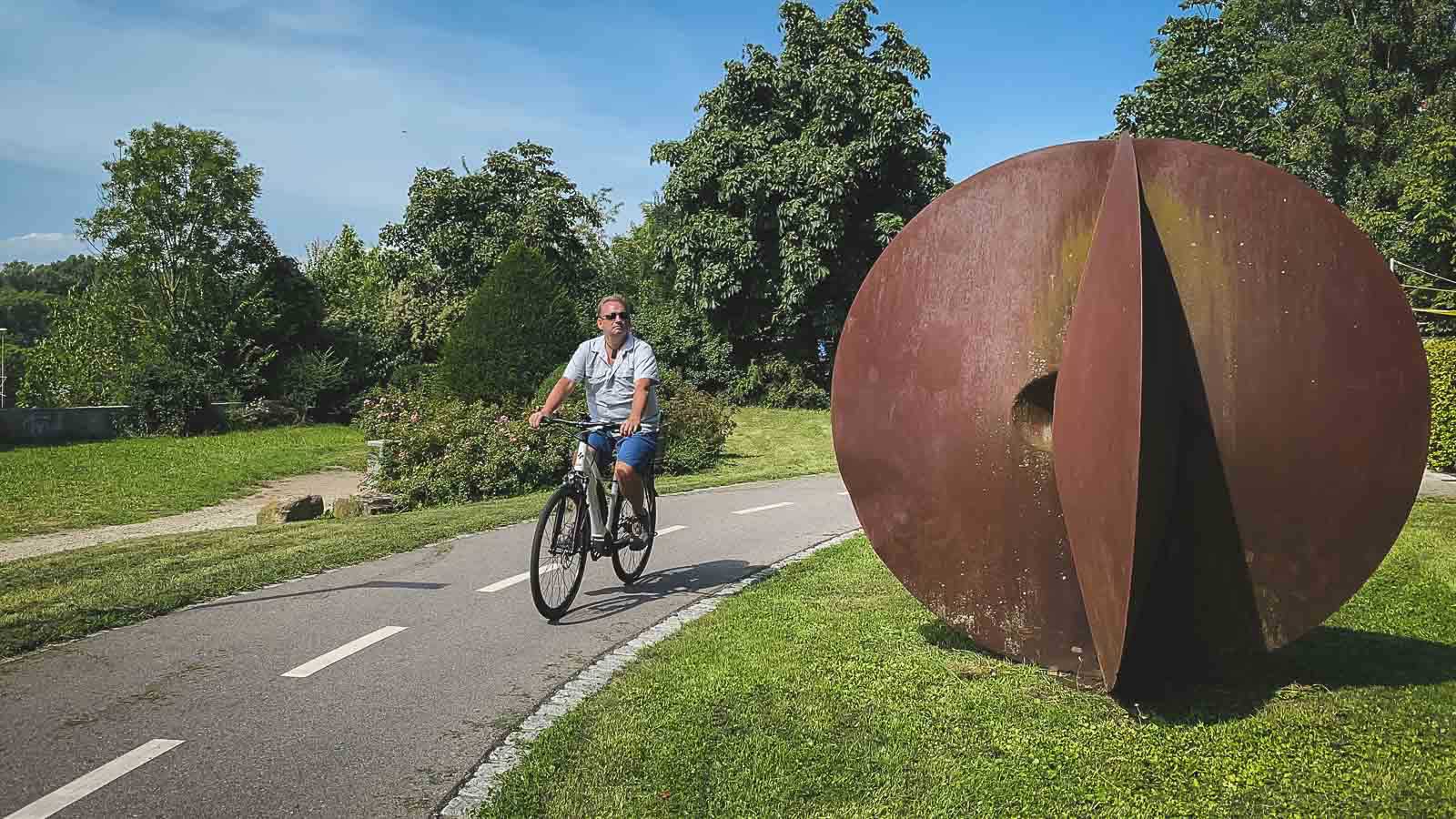
Is Switzerland expensive? We think we can probably agree that’s a yes. Your Switzerland trip cost will be much higher than if you visited other countries like Poland, Germany, Austria, Croatia, or Slovakia – all neighboring countries. But with the proper understanding of the cost breakdown of a trip to Switzerland, you can plan ahead and choose your trip type accordingly. As long as you are mindful of what causes price spikes, you’ll have an easy time budgeting.
Before you go, though, let’s take a quick look at the main FAQs.
How expensive is Switzerland for tourists?
Switzerland is expensive for tourists. You can expect average nightly rates of 200 to 300 Swiss Franc – approximately $220 – 330 USD on a mid-range budget. Eating out is also costly, and you should save money by shopping at grocery stores.
How much does a meal cost in Switzerland?
The average meal costs around 50 Swiss Francs – $55. That would be dinner at a mid-range restaurant, including a round of drinks. Lunch is slightly cheaper at around 30 Swiss Francs – $33.
Is food and drink expensive in Switzerland?
In short, food and drink are more expensive in Switzerland. In fact, a staggering statistic is that food costs 78% more in Switzerland than anywhere else in the EU. There’s no point denying it – you will spend much of your budget on food when you travel to Switzerland. However, it is worth noting that if you don’t eat meat, you could drastically reduce your food bill. Meat is the main food product that spikes food budgets in Switzerland. A win for vegetarians and vegans, right?
How expensive is Switzerland compared to the US?
Switzerland is much more expensive than the US. The stats don’t lie, and according to World Data.info , the average price of Switzerland’s goods is 31% more expensive than the US. While in Switzerland, the average income is higher, this plus doesn’t tend to trickle down or apply to tourists. So, if you are planning to travel to Switzerland, just know there will likely be a discrepancy and a need for budgeting.
What To Budget When Visiting Switzerland
A meal in Switzerland: The cost of a meal at a standard restaurant can range from 20 to 40 CHF for a main dish. A three-course meal for two at a mid-range restaurant can cost over 100 CHF.
Daily budget in Switzerland: Visitors should budget approximately 100 to 200 CHF per day, considering meals, transportation, and accommodations. This varies greatly depending on the type of travel and level of luxury.
Reasons for high costs: Switzerland’s high living standards, salaries, strong currency, and price levels contribute to its expensiveness. Additionally, import costs for goods and high-quality services drive prices up.
Food and drink prices: Grocery shopping can also be pricey, with basic items costing more than the EU average. Dining out, alcohol, and coffee tend to be expensive, reflecting the overall high cost of living.
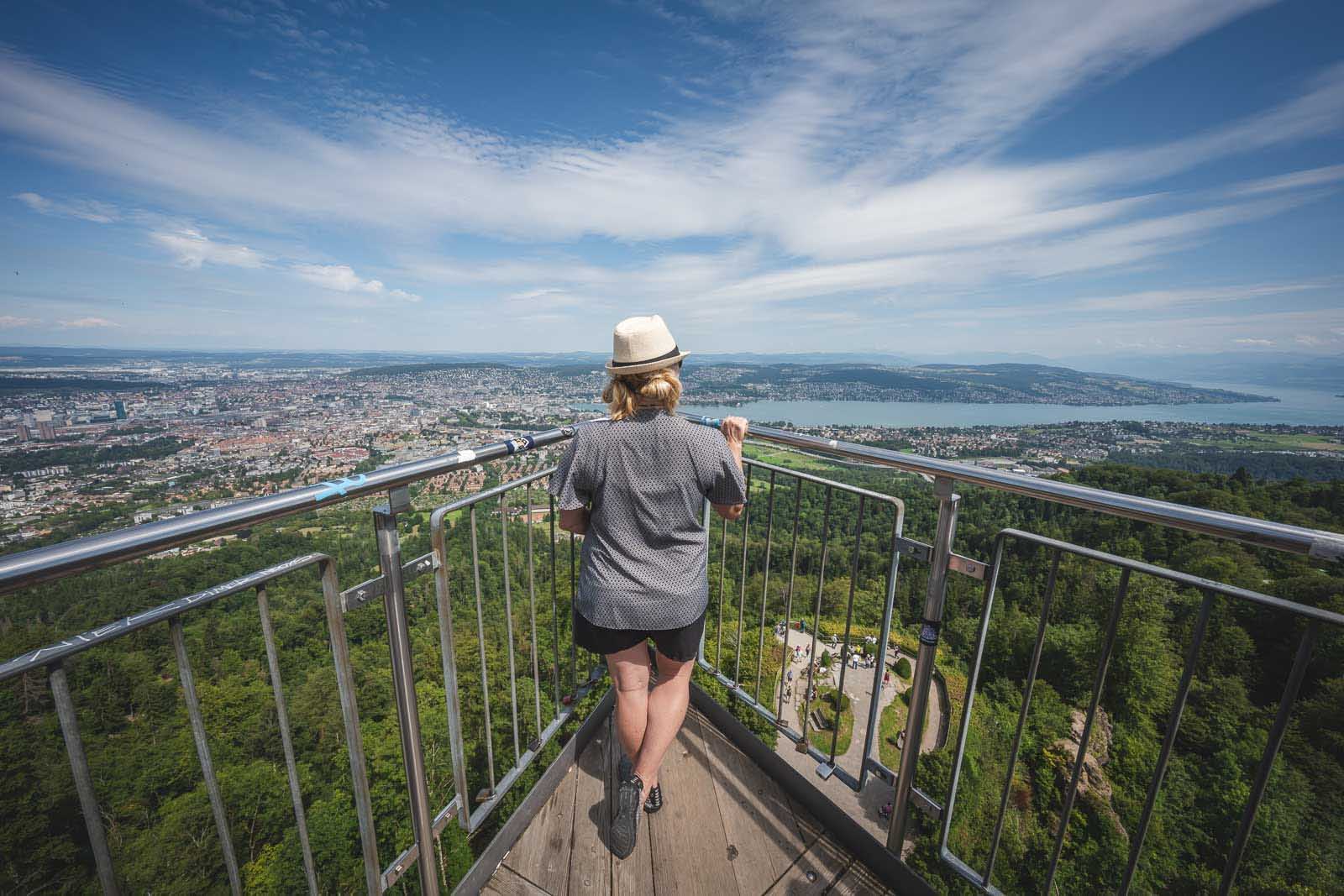
How much it costs to visit Switzerland massively depends on your travel style – will you use local transportation? Will you get self-catered accommodation so you can save money with grocery shopping? There are tons of small choices that you can make that directly impact your budget.
It is true that Switzerland costs more to visit than most other countries. However, you now know how to make your visit affordable, no matter your budget. It is helpful to break down the individual cost categories; this way, you can plan ahead and keep your spending exactly where you want it.
Are you getting excited about your trip? You absolutely should be. You can check out our guide on things to do in Grindelwald and t hings to do in Zermatt. You should also check out our guide to road-tripping in Switzerland. Have a wonderful visit, and don’t forget to not let budgeting detract from such a fantastic experience. Moderation is vital when budgeting and managing trip finances.
Plan your trip to Switzerland with these travel resources
- 10 Simple Ways to Travel Switzerland on a Budget
- Places to Visit in Switzerland
- 15 Beautiful Cities in Switzerland from our First-Hand Visits
- 24 Incredible and Fun Facts About Switzerland
- The Best Things to Do in Zurich, Switzerland
- 24 Fantastic Things to Do in Basel, Switzerland
- The Ultimate One-Week Switzerland Itinerary
- The Ultimate Switzerland Road Trip Itinerary
- Things to do in Grindelwald, Switzerland – Complete 4-Day Itinerary
- The 14 Best Hikes in Switzerland
Travel Planning Resources
Looking to book your next trip? Why not use these resources that are tried and tested by yours truly.
Flights: Start planning your trip by finding the best flight deals on Skyscanner
Book your Hotel: Find the best prices on hotels with these two providers. If you are located in Europe use Booking.com and if you are anywhere else use TripAdvisor
Find Apartment Rentals: You will find the cheapest prices on apartment rentals with VRBO .
Travel Insurance: Don't leave home without it. Here is what we recommend:
- Allianz - Occasional Travelers.
- Medjet - Global air medical transport and travel security.
Need more help planning your trip? Make sure to check out our Resources Page where we highlight all the great companies that we trust when we are traveling.
You May Also Like

28 Best Things to Do in Interlaken in 2024
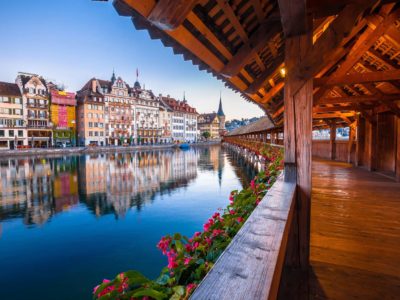
18 Best Things To Do In Lucerne In 2024
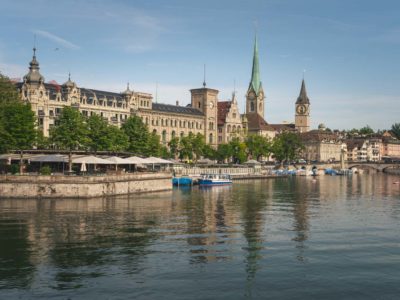
Where to Stay in Zurich: Ultimate Guide for First time Visitors
About The Planet D
Dave Bouskill and Debra Corbeil are the owners and founders of The Planet D. After traveling to 115 countries, on all 7 continents over the past 13 years they have become one of the foremost experts in travel. Being recognized as top travel bloggers and influencers by the likes of Forbes Magazine , the Society of American Travel Writers and USA Today has allowed them to become leaders in their field.
Join thousands of others who get our monthly updates!
Leave a comment cancel reply.
Save my name, email, and website in this browser for the next time I comment.
1 thought on “Is Switzerland Expensive To Visit? Trip Costs in 2024”
Wow! this amazing useful tips and really your photos are superb.
Expedia Rewards is now One Key™

Switzerland Vacations & Trips from $1,395
Book a hotel + flight or car together to unlock savings.
- Things to do
I only need accommodations for part of my trip
- payments icon Better together Save up to $580 when you book a flight and hotel together*
- lob hotels icon Find the right fit With over 300,000 hotels worldwide, it's easy to create a perfect package
- lob packages icon Rest easy Plan, book, and manage your trip all in one place
Your Switzerland Vacation
Bring your camera, hiking boots, and ski goggles on your Switzerland vacation package framed by incredible mountain scenery and some of the best ski slopes in the world. While you’re here, climb up the Matterhorn or ride the funicular train up Little Matterhorn on your Zermatt Switzerland vacation package . Ski and toboggan in the Alps and dive into a world of delicious cheeses during your Switzerland Christmas vacation package. In summer, beautiful Lake Geneva and charming Bern are idyllic places for a vacation. Find amazing package deals here including flights, accommodation, and car rental options—and don’t forget to bring back some chocolate!
Top destinations in Switzerland
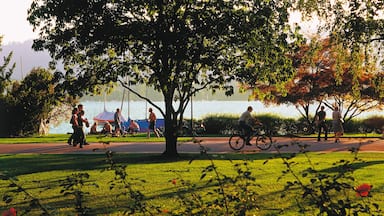
Grindelwald

Lauterbrunnen
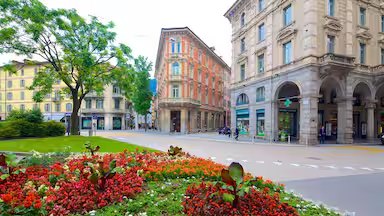
The Latest Switzerland Vacation Packages

Uptown Palace
Reviewed on May 3, 2024
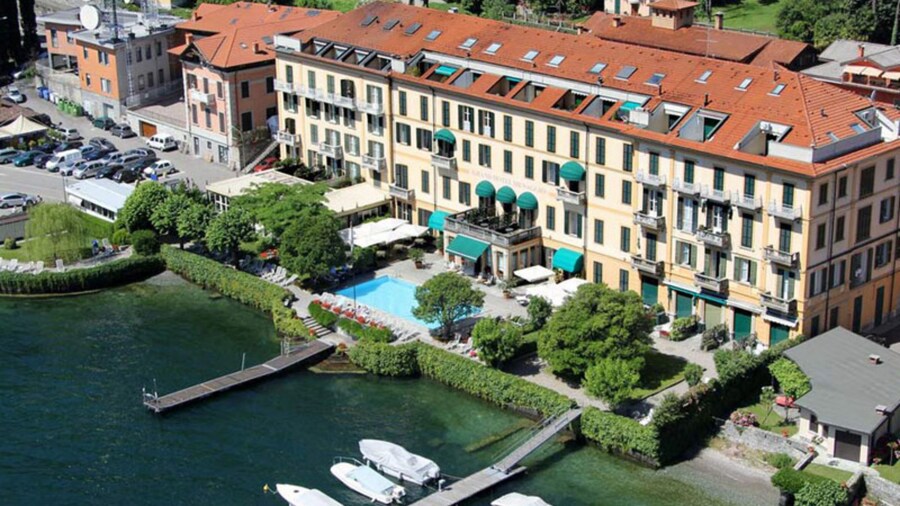
Grand Hotel Menaggio
Reviewed on Oct 22, 2023

Grand Visconti Palace
Reviewed on Apr 30, 2024

MONA Ex-Eurotel
Reviewed on May 13, 2024

Kurhaus Cademario Hotel & Spa
Reviewed on Oct 17, 2023
Switzerland Vacation
Bordered by five countries, Switzerland is a small, mountainous European land. Stunning alpine scenery, soaring snow-capped peaks and shimmering blue lakes give the nation an almost fairy-tale charm.
Switzerland Hotel + Flights
Organizing somewhere to stay in this enchanting country is easy with Expedia. There are 17,795 hotels on offer starting at $126 a night. Want to keep your expenses down? Simple. Just bundle your hotel and flight bookings. Your Switzerland Vacation Package can also include extras like car rental and experiences. If you love the idea of gaining a little local knowledge while you’re roaming around some of the country’s historical areas, consider adding a guided tour to your hotel and flight package.
Your Switzerland Vacation Itinerary
Day 1: Zurich Airport is Switzerland’s busiest international airport and is the perfect place to start your trip. Once you’ve settled into your hotel, stroll down the cobblestone streets of Zurich’s Old Town to see some of the city’s significant religious landmarks, like Fraumünster Church and the Grossmünster.
Day 2: Less than an hour’s drive from Zurich is the picturesque city of Lucerne. Rent a set of wheels and cruise south to explore notable sights like Chapel Bridge, the Lion of Lucerne and beautiful Lake Lucerne.
Day 3: Switzerland’s capital, Bern, is as pretty as a postcard and takes less than 90 minutes in the car from Lucerne. Visit the sprawling Bern Bear Park and catch a glimpse of real bears playing on the grassy hill slopes.
Switzerland Information
On the first of August each year at 8 p.m., church bells ring throughout Switzerland to celebrate Swiss National Day. Join families and communities in their festivities as they light bonfires and set off spectacular fireworks.
Quirky old fountains, long shopping arcades, a sparkling river — what’s not to love about Switzerland’s capital? If you plan to spend a bit of time here, check out our Bern Vacation Packages .
Top Vacation Destinations in Switzerland
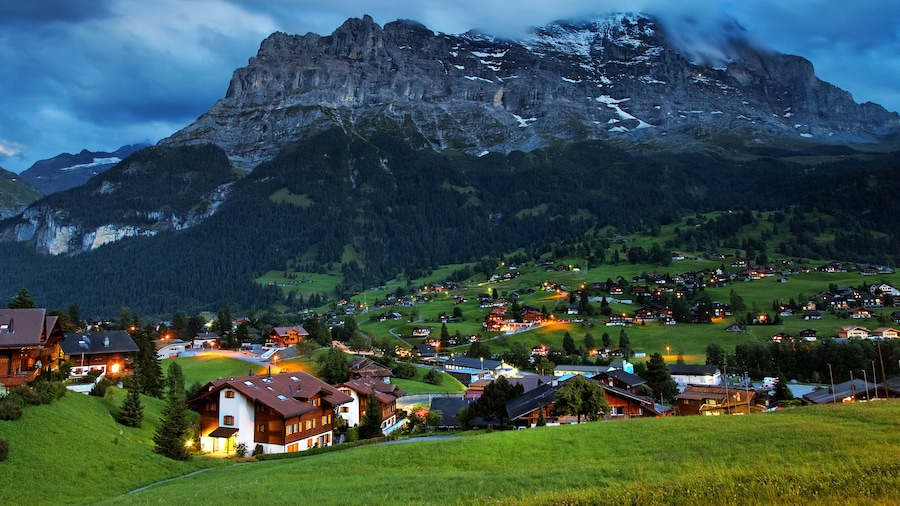
Take in the scenery on a Grindelwald vacation
When you visit Grindelwald, you'll find breathtaking scenery no matter where you look, with bright green hills, distant towering peaks, and serene lakes. The perimeter of some of the lakes is a well-maintained walking path, so it's easy to take in the sheer beauty of it all. In the village, you'll find some impressive eateries to enjoy, along with marketplaces and shops.
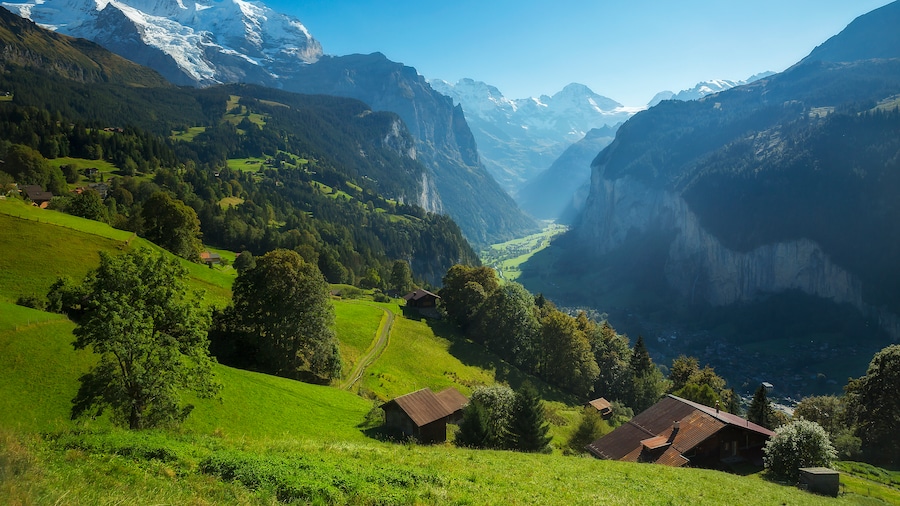
Find a charming village with Lauterbrunnen vacation packages
Lauterbrunnen is a modest village nestled within a valley in the Swiss Alps that offers breathtaking natural features, including 72 distinct waterfalls. When you visit this town, you'll find opportunities for trails and hikes to get to some of the most iconic waterfalls, like Trummelback Falls. Fortunately, all the gear you need for a safe and exciting trip is available in town.
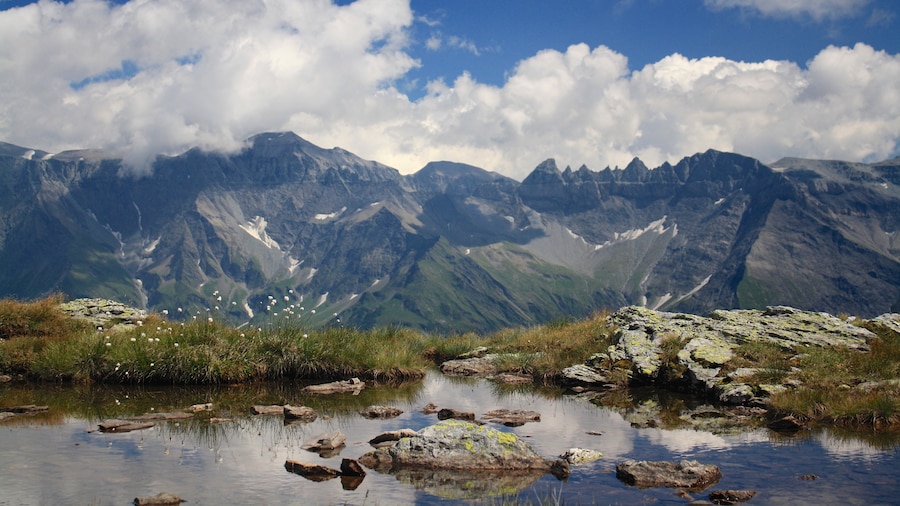
Embrace natural beauty with Swiss Alps vacation packages
The Swiss Alps are among the most iconic mountain ranges in the entire world. Not only will you find thrilling ski slopes, but several charming towns are also tucked among the valleys. No matter what time of year you visit, you can always find outdoor adventure. Some of the peaks are so high that skiing is available virtually all year long, thanks to the plentiful snow and reliable climate.
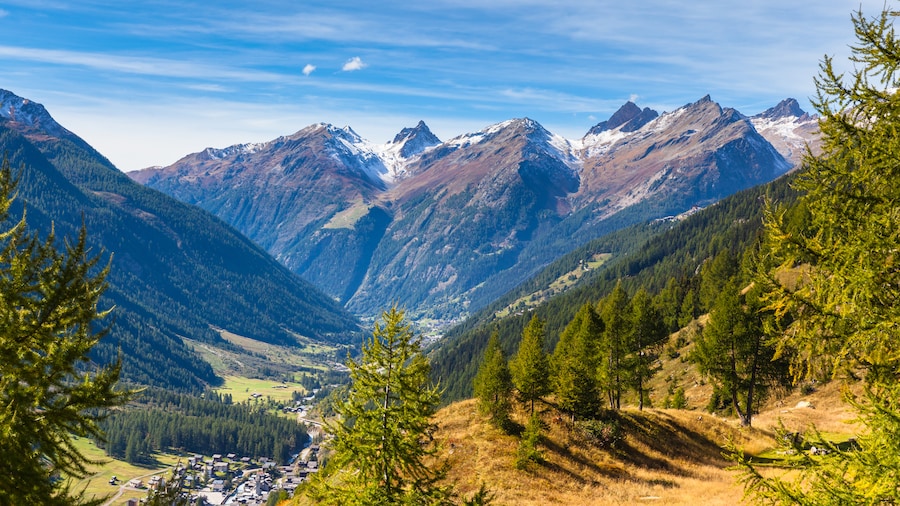
Enjoy outdoor fun with Zermatt vacation packages
Zermatt is an incredible town known best for its proximity to thrilling outdoor adventure. The ski runs are probably the most popular feature here, but they're just the beginning of what you can enjoy. The mountain trail is open for hiking and cycling during the warmer months, and you can also go climbing while you're here if you're looking for a real challenge.
Switzerland Essential Information
Switzerland hotel deals.

Reviewed on May 11, 2024

Reviewed on May 12, 2024

Explore other types of vacation packages

All Inclusive Vacations
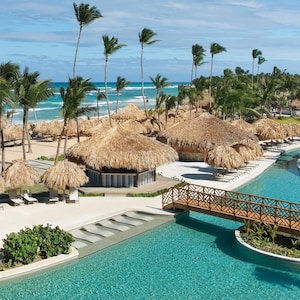
Beach Vacations

Kid Friendly Vacations
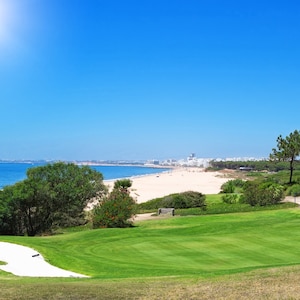
Golf Vacations
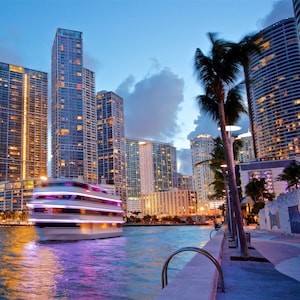
Luxury Vacations

Romantic Vacations
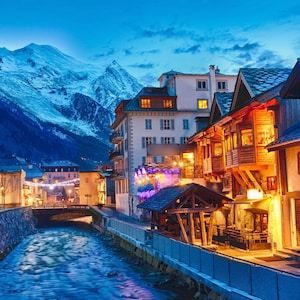
Ski Vacations

Where to go when
Frequently asked questions, discover the most popular places to visit in switzerland.
Trek through scenic Alpine meadows and climb up the Mountain of Mountains, which is among Europe’s tallest rock formations, looming over the resort of Zermatt.
Jungfraujoch
Go to the highest railway station in Europe, visit an ice palace and view a colossal glacier when you take a picturesque train ride to this mountain pass.
Rhine Falls
Commune with nature and explore the great outdoors at Rhine Falls during your travels in Laufen-Uhwiesen. Discover the waterfalls while you're in the area.
Other vacations you might like
- Top cities in Switzerland
- Vacations and getaways similar to Switzerland
- Popular destinations in Switzerland
- Best vacation destinations by month
- Expedia's Latest Trends
- Geneva Vacations
- Lucerne Vacations
- Interlaken Vacations
- Zermatt Vacations
- Grindelwald Vacations
- Basel Vacations
- Lauterbrunnen Vacations
- Bern Vacations
- Lugano Vacations
- Lausanne Vacations
- Montreux Vacations
- St. Moritz Vacations
- Spain Vacations
- Greece Vacations
- Italy Vacations
- Türkiye Vacations
- Cyprus Vacations
- Croatia Vacations
- Germany Vacations
- United Kingdom Vacations
- France Vacations
- Portugal Vacations
- Canton of Ticino
- Canton of Vaud
- Canton of Thurgau
- Canton of Geneva
- January Vacations and Deals
- February Vacations and Deals
- March Vacations and Deals
- April Vacations and Deals
- May Vacations and Deals
- June Vacations and Deals
- July Vacations and Deals
- August Vacations and Deals
- September Vacations and Deals
- October Vacations and Deals
- November Vacations and Deals
- December Vacations and Deals
Love and Road

Switzerland trip costs: how much you need to travel and how to save money
Some of our links are affiliated, we will earn a commission when you buy a service or product. This will have no extra cost for you. For further info please refer to our Privacy Policy
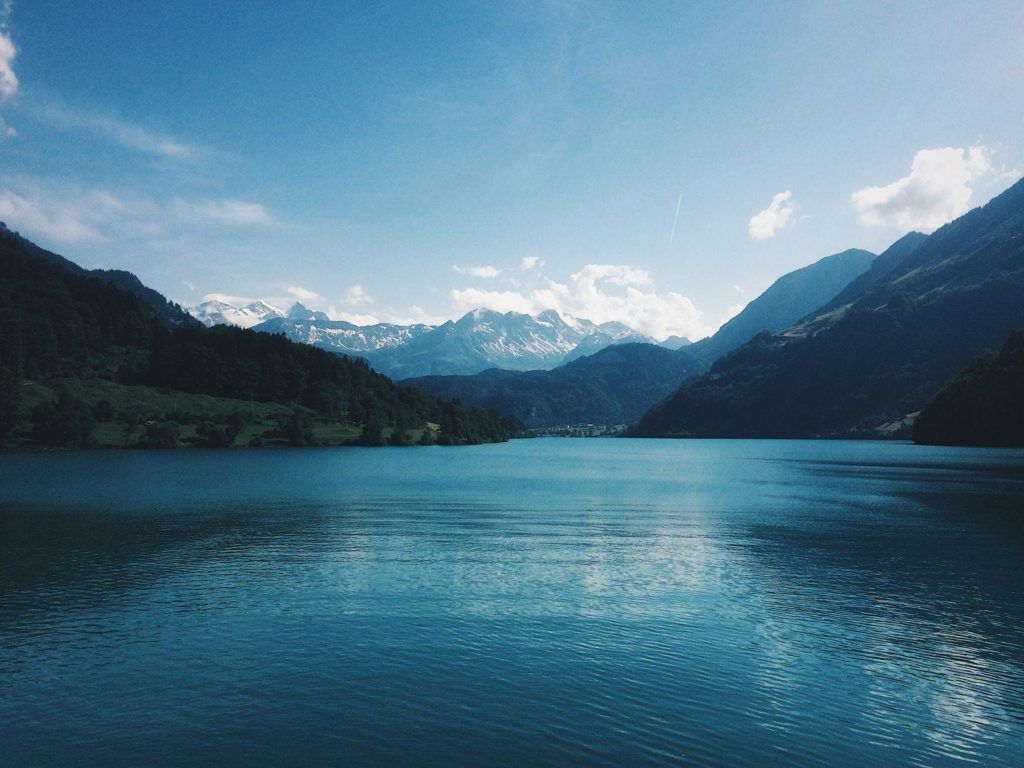
Switzerland is one of those travel destinations that people often dream about, but never visit because Switzerland trip costs are just too expensive. And having lived here for over 15 years, I must say I can’t blame people.
It has one of the highest costs of living in Europe and the world, and of course, the cost to travel to Switzerland is higher too.
However, there are still lots of ways to travel in Switzerland on a budget or without breaking the bank. In this post, I am not only going to tell you the prices of accommodation, attractions, and transportation but how to how to save money in Switzerland.
From saving on those ever-punctual Swiss trains to finding the best-located and cheapest places to stay in Switzerland. If you ever wanted to visit the Alpine Jewels but were not sure about how much does it cost to travel to Switzerland, or how to afford it, this is the guide for you.
Think about getting travel insurance before traveling to Switzerland. The healthcare there is top-notch but VERY expensive. We have been using HeyMondo and SafetyWing for years and when needed the claim process was easy and fast.

How much is the cost of transportation in Switzerland?
In this chapter, I will break down average transportation costs in Switzerland into sections, so you can see what options you have and some approximate prices.
– Price of flights to Switzerland:
Switzerland is not the cheapest destination in Europe, so it is perhaps no surprise that there are not as many options as say… Spain or Italy . Companies like RyanAir and EasyJet do fly here, but often they only land in the further-flung airports like Basel, instead of Zurich. Or at least, they have more flights there than to the main hubs.
There are also cheaper airlines that fly here, depending on where you are coming from. For example, in Germany, there is the local budget airline Eurowings that might help to keep your Switzerland trip costs down.
Find and book the cheapest flights to Switzerland here!
In terms of the exact cost to travel to Switzerland, I have found you can get around Europe anywhere from $50-300 one way. However, the further you go, and the less choice you have, the more expensive it often is.

– Public Transportation and the cost of trains in Switzerland:
This is where all the action is in Switzerland. Why? Because Switzerland has one of the best, most densely covered and efficient public transport systems in the world. And as a visitor to Switzerland, you should take advantage of this network. And when I say network, keep in mind that means train, bus, boat, and even some gondolas. The only challenge is, like with everything here, the prices.
The best way to save money in Switzerland while using trains is to have what is called a Swiss Travel Pass . It comes in two main flavors: the standard, which gives you so many consecutive days of travel (3, 4, 8 or 15) and the Swiss Travel Pass Flex. The second one I recommend to most people, especially if you stop off in a particular destination for a few days. The Swiss Travel Pass Flex gives you the same number of days, but you only use them when you need them, within one month. That way, you use the pass when you go long distances, and pay per ticket for local transport instead.
There are other benefits to these passes as well that might help you keep your Switzerland travel cost down, such as free admission to over 500 museums and discounts on a whole range of otherwise expensive special attractions in Switzerland like the Jungfraujoch . Current prices for the Swiss Travel Pass Flex second class are: 3 days – 232 Swiss Francs, 4 days – 281 Swiss Francs, 8 days – 389 Swiss Francs, and 15 days – 429 Swiss Francs.
Another option to save on your Switzerland holiday is to buy your tickets ahead, especially long-distance. The Swiss Rail website has discounted prices (called Super Saver), especially off-peak, which are way better the more in advance you go. However, you can benefit from them even on the day you travel. So, if you want to buy tickets as you go and still save – always check out the website.
– Cost of taxis and Uber in Switzerland:
Honestly, with such an awesome public transport system I rarely use either. Especially from the airport, where trains are a no-brainer. They go from right inside the airport and take you into town in minutes (in Zurich, and Geneva).
Unless you are out late at night, when even the trains run on weekends, there is little to no reason to use this very expensive form of transport. However, if you do have the need, go for Uber over Taxis because in my experience it is almost always cheaper. Examples of fairs in Zurich would be: $15 for a short ride within Zurich downtown. $35 to the airport from downtown.
– Costs to travel in Switzerland by road:
Personally, I would not recommend hiring a car in Switzerland for a number of reasons.
First, renting a car in Switzerland is expensive and will rarely compare to the cost of the Swiss Travel Pass. Exceptions might be where there are 4 adults, but for most of you, this is unlikely. If you want to investigate this as an option, I can recommend Auto Europe as a good site that compiles offers from most car rental companies. It seems that two weeks from Zurich will cost you at least 500 francs. And then there is insurance, fuel, etc.
Second, driving into cities in Switzerland, like most countries, is a right pain! Parking is difficult and expensive, with almost no street parking in most cities. Traffic can be crazy during peak times, and it’s super easy to get lost. When compared to the train, which arrives smack bang in the center of a town or city, it is a no-brainer to not drive.
Bus is an option for long distances if you want to save on train fares, but it is not super-common in Switzerland. However, recently, a company called Flix Bus from Germany I believe have been shaking up the market with cheaper prices. Give them a shot if you want to travel in Switzerland on a budget.
Another option to cut your travel cost in Switzerland is to use ride-sharing apps sites like Bla Bla Car , which can be a very cheap way to move from city to city. It can cost as little as $20 from Zurich to Geneva (4 hours). This normally costs $80 or more.
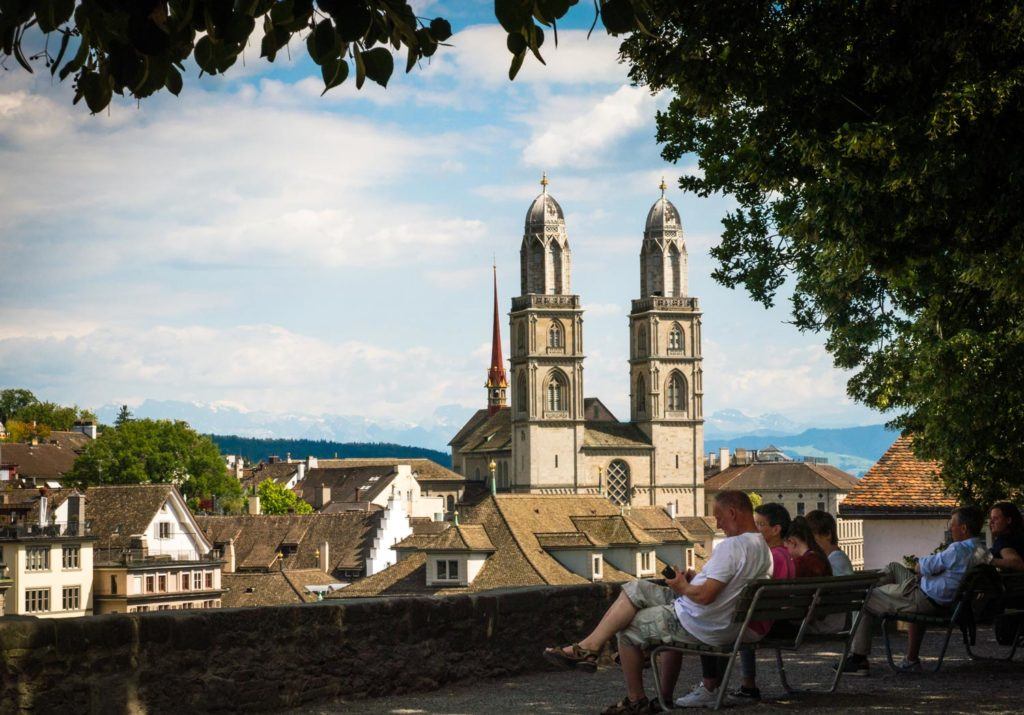
How much does accommodation cost in Switzerland?
Yes, the high prices continue, Switzerland is expensive, especially in accommodation. But there are some ways to save and make your money last longer.
– Costs of hotel and apartments in Switzerland:
Looking for cheap places to stay in Switzerland? Booking a hotel that is outside of town, or at least a distance outside of downtown, is the way to go. And with the amazing public transport on offer here, it is not really a problem to catch a train or tram for 15 minutes to get into town.
In some places, like Geneva, there is also the option of staying in another cheaper city not too far away too. Lausanne is a great option , as is Montreux or Vevey.
Here is a list of places to stay in Switzerland, from budget accommodations to luxury hotels. You pick the one that fits better on your travel plans and wallet. Click on the name of the destination below to search and book.
Hotels in Zurich Hotels in Geneva Hotels in Lausanne Hotels in Zermatt
Need more tips to keep your Switzerland trip costs down? So think about sharing apartments and cooking for yourself, this is another great way to save. In general, though, I would not expect to find something reasonable in a city under $150 a night. And from what I have seen in places like Geneva, accommodation cost can be even higher downtown. The average in places like Zurich tends to go even higher, like $200 or more, which is why you should take a peak on sites like Airbnb.
– Cost of Airbnb in Switzerland:
People in Switzerland were a little late to the game, but now you can find some really affordable places on Airbnb. Even places that are in decent locations, close to downtown. I have seen some really nice studio apartments, one train stop from downtown for about 70 Swiss Francs a night. Which is very reasonable, especially for two people.
Of course, if you are really traveling in Switzerland on a budget, you will have to head to a hostel and share a room with other people.
– Cost of hostels in Switzerland:
Even hostels in Switzerland are expensive, which is why Airbnb is such a great deal. Unless you are traveling solo. Then, you might want something even cheaper, or just meet other travelers who are in the area.
From what I have seen around Switzerland, shared rooms in a dorm tend to cost between 30-45 Swiss Francs a night. They also tend to have some decent private rooms for about double that, so it’s also a budget accommodation option for couples as well.
Of course, given you can find competitive rates on Airbnbs for under 100 Francs, I think you might often go for Airbnb instead. Here are some great Airbnb options I found in Zurich , which might come in handy.
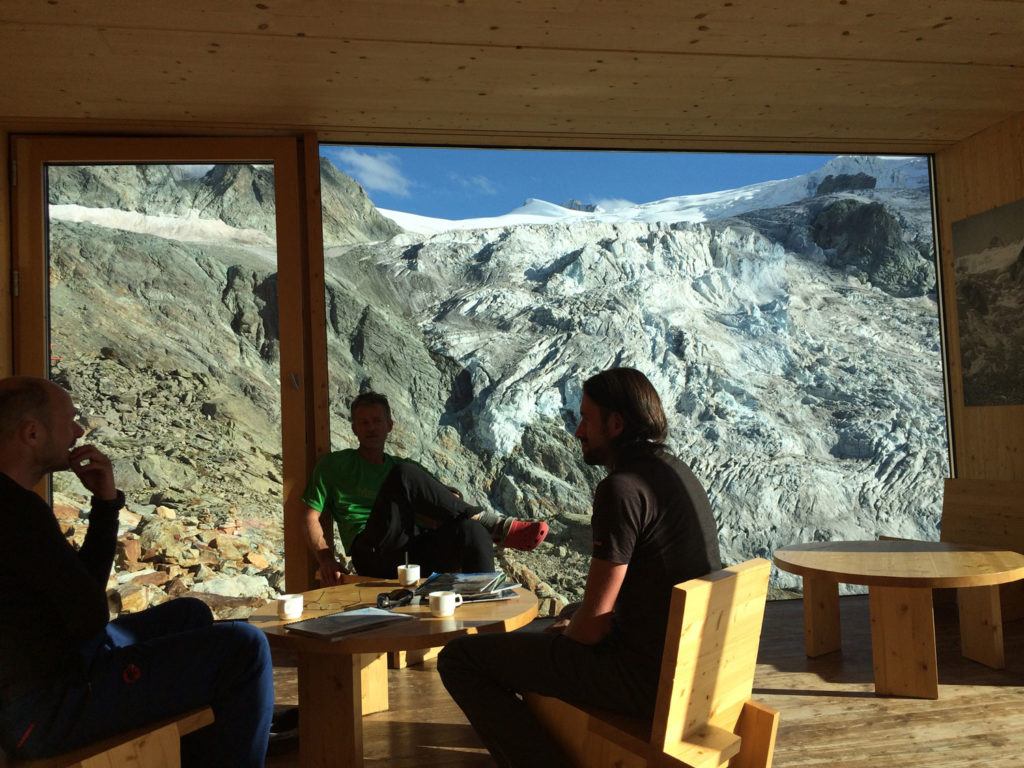
– Cost of mountain huts in Switzerland:
This is just a quick mention, but if you are a big hiker and like doing overnight hikes – Switzerland is paradise! There are huts everywhere, seriously. And they give you a bed and food. So take advantage of it. It costs about 80-90 Francs a night including dinner and breakfast, and the locations are stunning. Just look at that image above!
How much is the cost of tourist attractions in Switzerland?
The most expensive attractions in Switzerland usually involve mountains and adventure activities. Heading up the Jungfraujoch for instance, an absolute must-do in my opinion, it can cost around 190 Swiss Francs. Bear in mind the Swiss Travel Pass can get you a decent discount on this, bringing the price down to about 133 Francs.
Another trip I would recommend in Lucerne is the Pilatus Golden Round Trip . A stunning boat ride then a steep train to the top of Pilatus. A return via gondola is a great end to the trip. This costs approximately 103 Swiss Francs. Planning to visit Lake Lucerne? Read our guide to where to stay and what to do in Lucerne here .
Other simple gondola rides like First in Grindelwald (worth it for the view of the Eiger) can cost 60 Swiss Francs return. And something like a trip up to the Kleine Matterhorn in Zermatt, at a breathtaking 3883m, will also cost over 80 return. Whereas a quick jaunt up to the view from the Schwarzsee will only set you back 32 return. You can find some other great ideas here .
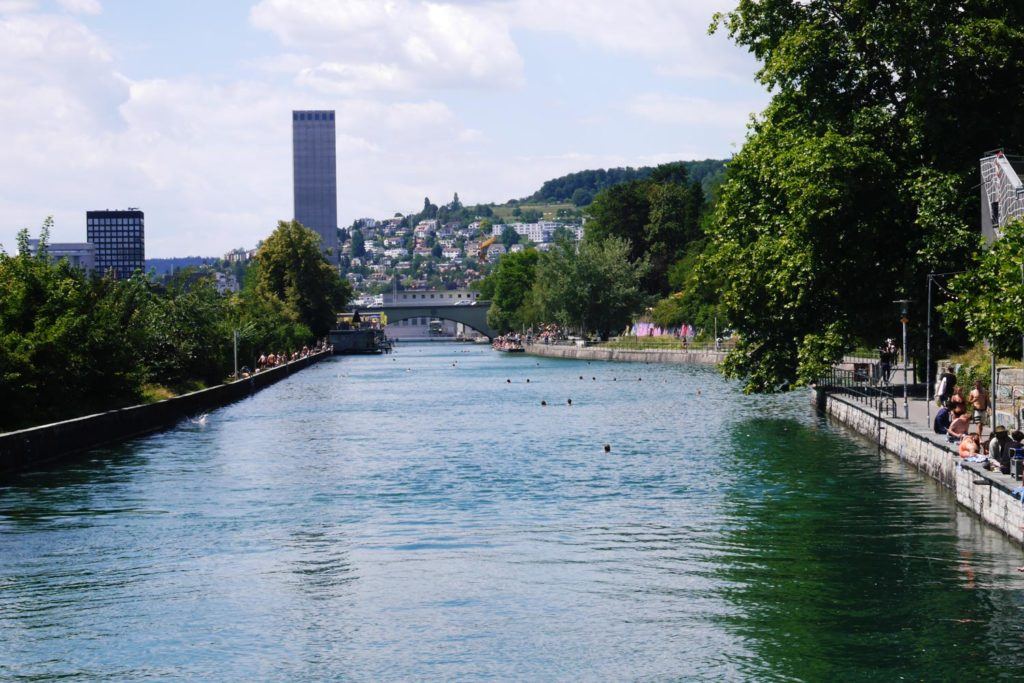
Keep in mind that there are many free things to do in Switzerland, many of which are as stunning as those above. You can hike almost anywhere in the country and the mountains, for free. There are hiking trails in Switzerland for everyone, from easy to challenging ones. If you think you are not that fit, you can always go up with a gondola and then hike down. This saves you half the cost, making the price of traveling in Switzerland less scary.
Swimming in the lakes around the country is also free unless you use one of the public baths, which is not mandatory. Interlaken is another must-visit city, and if you do proper research, you can enjoy it without spending all your budget. Look for things to do in Interlaken that match your budget or that is free. And then there are the historic city centers. You can spend days exploring these, without stepping into a museum, adding to your Switzerland travel cost only transportation, accommodation, and food bills.
If you are unsure how to calculate your expenses for attractions, read our 5-Day Switzerland Itinerary , which will give you a sense of what to do and visit in 5 days.
From there you can know the costs per day and multiply the length of your trip. Also, you will notice that many attractions are included in the Swiss Travel Pass, or you can get discounted prices, which helps a lot.
How much does nightlife cost in Switzerland?
If you want to enjoy a little nightlife while in Switzerland the best thing to do is just head to the local bars. Keep in mind that the Swiss are not the most open to foreigners when compared to many of their southern neighbors. Having said that, a little alcohol loosens up most people.
Beer can cost you almost the same as Coke or water, so this is usually the best way to save on a night out in Switzerland. Especially on tap local beers – in the German part called a “stanger”, are the cheapest way to go, usually between 5-8 Francs. Another option is to buy cold beers from the local shop and drink them by the lake or river. The Swiss are very loose and open about alcohol, so there are no laws against it.
If you prefer cocktails, like me, you will be in for a bit of a shock. They often cost anywhere between 10 and 20 Francs a pop, on the higher end in cities, and more classy bars. And wine is equally expensive, with the only cheap places I have found a glass being deep in some forgotten valleys of the South like Binntal. But I am sure you won’t be going there. In general though, it is around 7-12 francs a glass. If you want to keep your Switzerland trip costs under control, perhaps leave wine and cocktails to your next trip to Spain or Italy.
Nightclubs are a little like London in many ways. Entry costs around 20 Francs and the clubs only tend to get going, or even open from 10 or 12 pm.
Switzerland trip costs roundup
So, how much does it cost to travel to Switzerland? What is the average daily cost of visiting the country?
Well, if money is not an issue, then you can easily cash out Sfr 500 per day while enjoying the best in Switzerland. If you want to keep your expenses under control, be prepared to spend something between Sfr 200 to Sfr 250 per person per day. For budget travelers, the average daily cost to travel in Switzerland is 80-100 Swiss Francs. Bear in mind that those travel costs include accommodation, food, local transportation, and attractions.
Average daily cost to visit Switzerland: Luxury traveler: Sfr 500 + per person. Mid-range traveler: Sfr 200 to Sfr 250 per person. Budget Traveler: Sfr 80 to Sfr 100 per person.
Is Switzerland expensive? Yes, it bound to be one of the more expensive destinations on your bucket list, but there are lots of ways to save costs. From using Bla Bla Car to get a ride between cities to staying in mountain huts instead of in the main tourist locations, you just have to be a little creative and flexible.
Planning is also the key, remember to book your accommodation and buy your Swiss Pass in advance. Research about the places you want to visit and find free things to do in Switzerland. The costs to travel in Switzerland can vary a lot if you manage to save on attractions and entrance, find a good deal on Airbnb and cook for yourself.
Another way to lower the cost of travel to Switzerland is to plan your holiday during the shoulder season. The cost of a trip to Switzerland during Summer or Autumn is way different from the Winter when it’s high season. A good example is the trip Love and Road did to Arosa in Summer (read all the tips here) , such a great destination that becomes less crowded and cheaper when the temperatures are higher.
But in the end, don’t forget it’s a vacation and you also have to enjoy yourself, so spend money on the things that are most important to you!
Love these Switzerland travel cost tips? So Pin it for later!!
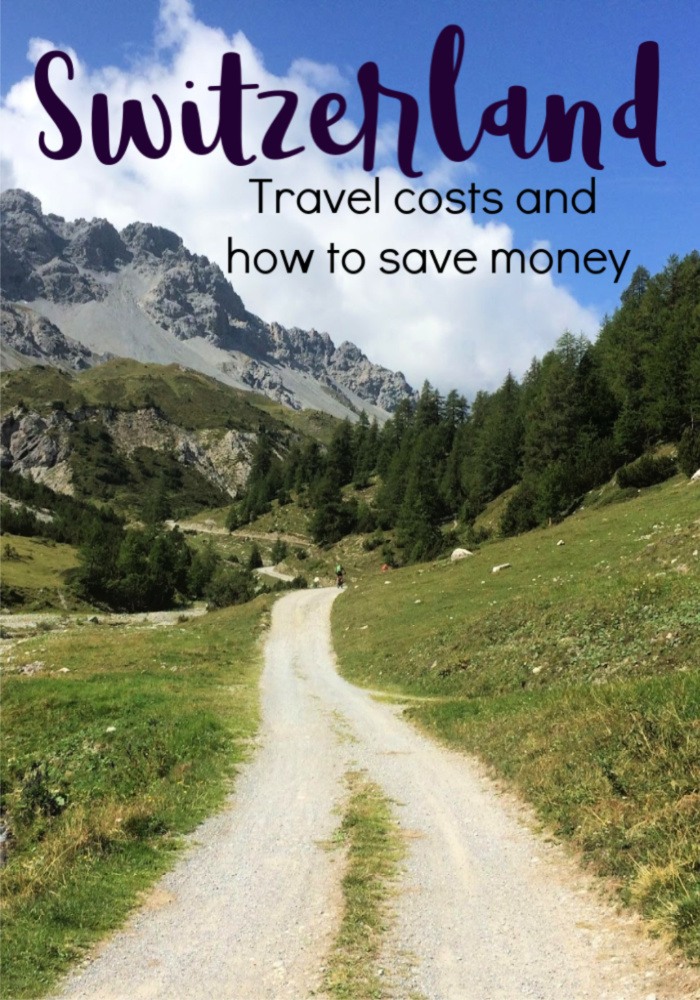
Author: Anna Timbrook
Anna was born to travel the world having studied languages all her life. Although she has traveled the world, she now calls Switzerland home and spends her time writing about her experiences on her travel blog with her husband. Follow her adventure on Twitter and Pinterest .

11 thoughts on “Switzerland trip costs: how much you need to travel and how to save money”
I once got a flight to Geneva from Newcastle for 30 GBP each way. What I wished I knew was how expensive the country would be once I got over there. I spent so much on so little. This post is really informative and giving me more confidence to return knowing I can travel cheaper.
Hi Alexandra! Let’s think on the positive side, at least you saved some money on the flights 😉 And now you know better, so next Swiss trip won’t cost that much. All the best, Nat
Handy information and timely too. Interestingly, the most affordable flight from Bangkok to the vicinity of Grenoble was to Geneva. Why not? So we decided to spend a day or two sightseeing there before heading to our final destination. It looks like the bus from Grenoble to Geneva is not overly expensive so we might come for an additional visit or two. Thank you very much for the tips and costs of Swiss travel. Cheers!
Hi Elena, So good to hear that you found the blog post useful! Enjoy Geneva & Grenoble, and hope you don’t spend too much 😉 We have been in Grenoble almost 10 years ago, I believe it’s time for us to go back. Cheers, Nat
Hello Natalie,
Great post! I was planning to visit Switzerland in Feb-Mar 2020. Your blog provided me a lot of insight as to what to expect over there. One question though- the Swiss Travel pass- Does it cover all public transportation between cities (eg: Zurich to Lucerne, Lucerne to Interlaken, Interlaken to Grindelwald or Lauterbrunnen), all transport (metros, buses, trams, etc) within cities Like Zurinh? Does the pass provide discounts if I wish to go to Mount Titlis or Pilatus? Also, I will go to Jungfrau. I see that it is very close to Grindelwald. is Jungfrau the mountain people go to Grindelwald to see? Lastly, which one should I do- Mount Pilatus or Titlis (I know this is something totally personal, but which would you recommend to first time travelers) ?
Sorry for the long post! And thanks again for writing this article! Cheers 🙂
The Swiss Pass can be used for almost any form of travel on the day(s) of your choice. You just have to decide how many days you want to travel longer distances and if you will do those trips consecutively (not usually) or within a month (called the Swiss Flex Pass). So, yes all train journeys between destinations are covered. Public transport as far as I remember within a city is covered also – on the day you use the pass for long distance travel. Otherwise you need to buy a local ticket, which is actually not expensive.
There are also significant discounts (see the official page from sbb.ch for more info) for most mountains including Pilatus, Jungfrau etc. and you can just show your pass to get that discount.
Personally, I recommend the golden round trip to Pilatus over Titlis. And yes, Jungfrau is above Grindelwald (also near Interlaken) and is an absolute must see (but only on a clear day as it is very high and easily gets clouded in).
Hope that all helps, and have a great trip Anna
My wife and I are traveling to Switzerland in 3 weeks and we don’t really plan to use the public transit so much to warrant my want to purchase a Swiss Travel Pass.
Basically we’ll be traveling from the Zurich airport to our hotel in Lucerne (Burgenstock). A couple days in Lucerne and then hop on the rail to Lake Como, Italy for a couple days. From there, back on the rail to Zurich for one night there before we head home.
Would it make more sense to purchase a one way rail ticket each time we use it (Zurich -> Lucerne/Lucerne -> Lake Como (Torno)/ Torno -> Zurich) than to get the travel pass? Also, do we have to purchase rail tickets in advance or is that something we can get at the ticket window at the station?
It’s my first time traveling to Europe and I’m a bit nervous about getting around efficiently.
Thank you for the informative article!
Hi John, Don’t fret about travel in Switzerland, it is nothing if not efficient and easy. The people at the rail offices are super knowledgeable and friendly. It is nothing like some other more southern countries in Europe :> Although I must say the prevalence of English speaking staff is improving in the last decade or so in many countries.
As for what is cheaper, I did a quick check online (you can go to sbb.ch/en and play around with the dates/trains, but there is rarely any discounts if you don’t book just a few days ahead. So, you can either buy them ahead (even on that site and have them sent to you – my Dad did that) or you can buy them on the day or day before at the ticket office in each place (can’t comment on Italy though, so try to get an open date return from Switzerland if possible when you buy it).
Is it cheaper to do individual tickets or Swiss Pass, well it’s a close call from what I can see, but unless you plan on using the discounts for mountain travel (which you might very well be – Rigi is free with that pass, the others have big discounts) then just buying the tickets seems to me to be marginally cheaper. But again, use sbb to see the difference (you can get exact price if you just pick a random date/time then choose a connection (shortest) and there is a buy button), and compare with the various swiss passes (not sure if you want flex, or standard, which is consecutive, so probably not :>). Flex is more expensive obviously.
Sorry I can’t help you exactly, but that is the joys of traveling. You will have to do a bit more research I am afraid :> But don’t worry about trains in Switzerland, only Japan is more organised! Anna
Great post. I’m heading out to Switzerland for 2 days.
I am looking at the transport ticket options and I can see there is a 24 hour and 72 hour travel pass. Is there no option for 48 hours? I won’t be using public transport much as I imagine I’ll just be walking on foot most of the time. However my main concern is the cost to and from the airport and then returning – so keen to see if that is more cost effective or not?
Thanks, Jonathan
Great page! I am planning my trip based on the content on your page. Just a simple question : would the travel period of 4/15 to 4/22 be good in terms of visibility and weather conditions at all the sites and especially the mountain trains ?
Thanks, Shankar
Hi, Anna. I am planning to parasail in Lauterbrunnen. IS this recommended or no?
Leave a Comment Cancel reply
Save my name, email, and website in this browser for the next time I comment.

Accommodations
Switzerland does have a range of accommodation options in most bigger cities (e.g. hostels to luxury hotels). However, as it is an expensive country, their definition of ‘budget’ will likely be different than yours.
The average cost of a mid-range hotel in one of Switzerland’s main cities is about $225 for private rooms. I personally prefer to book my accommodations via booking.com since I can quickly compare all the various room types.
Check out the following cities to quickly browse accommodations:
- Hotels in Geneva
- Hotels in Bern
- Hotels in Zurich
- Hotels in Lucerne
- Hotels in Lugano
- Hotels in Basel
Insider tip: The longer you stay in a hotel, the more likely you are to get multi-night deals which can save you money. Consider picking one place to use as your base for your stay then doing day trips to explore the surrounding area. Remember, Switzerland is a small country.
If you have the right credit card, you can save a fair amount of money on hotels. Americans should strongly consider the Marriott Bonvoy Brilliant American Express Card since you can earn up to 95,000 Marriott Bonvoy points and $300 back at U.S. restaurants as a welcome bonus . Canadians should consider the Marriott Bonvoy American Express , which gives you up to 75,000 Marriott Bonvoy points. That’s enough points for a few free nights at some hotels, which could easily have a value of over $500.
Local transportation
When it comes to getting around Switzerland, using their train system is best. It’s quick and easy to get around to the big cities and many of the smaller towns. Public transit in Switzerland is pretty decent and takes away the stress of driving somewhere foreign.
There is a Swiss Travel Pass available to tourists. These come in 3,4, 8, and 15-day timeframes. The pass allows unlimited travel on train, bus, and boat and public transportation within the towns. Additionally, it includes free admission to 500 museums across the country. The only catch is that the pass needs to be used consecutively. So if you got the 4-day pass you need to use it four days in a row. You can’t spread it throughout the week. That said, if you plan on a few busy day trips, it might be worth it.
The 4-day pass is $306 and you will probably want to add another $100 or so for the remaining days (including fare to/from the airport). If you plan on shorter, closer day trips to where you are staying. Then the pass may not be worth the money. It’s worth doing some planning on your own ahead of time to compare pricing.

Attractions
Thankfully, this is part of your budget where you can potentially catch a bit of a break since so much of Switzerland’s charm is found in its natural beauty and picturesque towns in the Swiss Alps. Many people choose to just walk the hiking trails, which are free, to enjoy the scenery. Of course, there are lots of paid activities here as well.
As mentioned above, getting the Swiss Travel Pass includes free entry to hundreds of museums. Day trips are more budget-friendly if you do them on your own (especially if you are getting the Swiss Travel Pass). However, there may still be some attractions or activities you would like to try. For example:
- Day Trip to Grindelwald and Interlaken from Zürich
- Day Trip to Mount Titlis with Cable Car (Zurich Departure)
- Jungfraujoch Day Tour from Zurich
Unsurprisingly, these types of activities are pricey. Many start at about $100, so I suggest putting aside an extra $500 for attractions if these are the types of things you want to do in Switzerland.
Food and drink
Like everything else in Switzerland, M=meal costs have a higher price tag. On average, you can expect to pay about $50 a day if you want to keep your food expenses down.
- Breakfast – $10
- Lunch – $15
- Dinner – $25
To be clear, even fast food such as pizza and burgers can be expensive. $50 is a good estimate to budget, but you could easily spend more if you eat at a few restaurants. You could reduce your costs by stopping at grocery stores (Migros and Aldi are the most popular supermarkets) to prepare some meals. I highly recommend this, especially for breakfast.

Random spending
As with every destination how much guide, I suggest having a bit of extra money set aside for random spending. This could be for souvenirs, an unexpected trip to Zermatt, a night out etc. I recommend having an extra $200 on hand for Switzerland just in case. Unless you plan on doing watch shopping, you’ll need to add a couple of zeroes to that estimate!
Switzerland trip cost
So, how much does it cost to go to Switzerland? Based on my estimates, you can expect to spend about $3,725 for one week in Switzerland. Clearly, this is a pricey destination, however, using the tips and advice I shared throughout this article, you can find some ways to cut down some of these costs.
Or, just accept that it is what it is. Switzerland is a beautiful place with a lot to offer so you do want to make sure that, if you are going, you make the most of it. For more inspiration, check out my guides to Barcelona , London , Portugal , Croatia , Ireland , and Italy .
Is Switzerland expensive to visit?
Yes. Switzerland is expensive. While there are more budget-friendly options for things like accommodation and meals, you will still pay more for these things in Switzerland than in other destinations. The good news is that a lot of what makes Switzerland such a popular attraction is its natural beauty, so sightseeing in terms of hiking and exploring cities and nature by foot is all free.
It’ll also depend on how you travel. When taking the train, 1st class and 2nd class tickets are available which will affect your budget. The summer months of July and August tend to be the most expensive time to visit. December can also be expensive due to the ski season. September, October, and November are ideal times to visit.
What is the cheapest month to visit Switzerland?
Switzerland is a year-round destination. Summer months are popular for summer vacation, hiking, and lakes, while the winter months are popular for skiing in the country’s mountains. However, typically only the ski areas are busy at this point, people don’t tend to visit for sightseeing because of the snowstorms meaning that flight and hotel prices typically drop a little bit from January to March. If you are focused on the cost of Switzerland, this time will be the most affordable, but it might not be the most enjoyable.
Are trains expensive in Switzerland?
Yes, they are so if you are on a budget, don’t expect to be hopping around by train every day. Do some planning and pick out your priorities. It might be better to get a multi-day train pass for tourists. Also, if you choose to buy tickets as you go be careful when purchasing tickets from the machines. Some only give vouchers for future train tickets which you may not be able to use.
What is Switzerland famous for?
Switzerland is known for several things. Chocolate always comes up (Lindt chocolate comes from Switzerland). Also cheese and cheese fondue. Rolex watches and Swiss army knives are also commonly associated with this country. In terms of tourism, Switzerland is known for its opportunities for skiing in the Alps as well as natural beauty which makes it ideal for outdoor adventure enthusiasts.
What is the most beautiful part of Switzerland?
Switzerland has a lot of beautiful spots throughout the countryside. As a whole, it’s considered to be a naturally beautiful country. Interlaken and Lake Lucerne are two very scenic spots. Chateau Chillon (which is said to be the inspiration for the castle in the Little Mermaid) and the city of Bern are also regularly listed as some of the most beautiful places in Switzerland.

About Hannah Logan
Hannah Logan is a freelance writer based in Ottawa, Canada. She specializes in finance and travel writing and has bylines at Fodor's Travel, O Magazine, and more. She also runs two travel blogs, Eat Sleep Breathe Travel and Ireland Stole My Heart . You can find her on Instagram and Twitter @hannahlogan21.
Very informative. Thanks
If the flight is deferred or dropped by the carriers or neglects to arrive at your last objective then you are eligible to assert Swiss Air Cancellation compensation. Here are a few variables where you are absolutely ready to make a demand for the pay. On the off chance that you reach the objective by the postponement of three hours. You can guarantee for remuneration of 300USD if your flight is postponed by at least 2 hours or the course distance is under 1500km then you are completely qualified to guarantee payment from the aircraft. The next circumstance is the point at which you can guarantee to pay 475USD if the course distance is between1500 to 3500km and the length of postponement is 3 hours.
Enjoyed the read , nice overview since a friend & I want to avoid the high price of tour groups .
Leave a Comment Cancel Reply
Get a FREE copy of Travel Hacking for Lazy People
Subscribe now to get your FREE eBook and learn how to travel in luxury for less
The Ultimate Guide To Saving Money While Traveling In Switzerland
- Last updated May 13, 2024
- Difficulty Advanced
- Category Travel

Switzerland, known for its breathtaking landscapes, picturesque towns, and world-class skiing, is often perceived as an expensive travel destination. However, with careful planning and these insider tips, you can navigate this enchanting country without breaking the bank. In The Ultimate Guide to Saving Money While Traveling in Switzerland, we reveal the secret to enjoying Switzerland's riches without emptying your wallet. From budget-friendly accommodations to thrifty transportation options and savvy dining choices, this guide will empower you to create unforgettable memories in Switzerland while keeping your budget in check. Get ready to experience the best of Switzerland without compromising on your financial goals.
What You'll Learn
Finding affordable accommodation in switzerland, tips for cheap transportation options in switzerland, eating on a budget while traveling in switzerland, money-saving activities and attractions in switzerland.

Switzerland is known for its stunning natural beauty, charming cities, and vibrant culture. However, it's also notorious for being one of the most expensive countries in the world. If you're planning a trip to Switzerland, one of the biggest challenges you may face is finding affordable accommodation. But don't worry, with some careful planning and a few clever tips, you can save money on your lodging and still have a fantastic Swiss experience. Here are some strategies to help you find affordable accommodation in Switzerland.
Stay in a budget hotel or hostel:
One of the easiest ways to save money on accommodation is by staying in budget hotels or hostels. Switzerland has a wide range of budget-friendly options that offer comfortable rooms at a fraction of the price of luxury hotels. Many hostels in Switzerland provide clean and safe accommodation with shared facilities, making them an ideal choice for budget-conscious travelers. Some popular hostel chains in Switzerland include HI Hostels and Youth Hostels.
Consider alternative accommodation options:
In addition to traditional hotels and hostels, there are several alternative accommodation options that can help save you money. Consider staying in a guesthouse or bed and breakfast, where prices are often lower than hotels. You can also explore vacation rentals or apartments through platforms like Airbnb, which can offer more space and facilities at a lower cost, especially for longer stays. Another option is to take advantage of house swapping, where you exchange your home with a local resident in Switzerland.
Stay in less touristy areas:
Switzerland has many beautiful regions to explore, but some areas are much more touristy than others. By staying in less touristy areas, you can often find more affordable accommodation options. Consider looking for accommodation in smaller towns or villages, away from major tourist hotspots like Zurich or Lucerne. Not only will you save money, but you'll also get a chance to experience Swiss culture in a more authentic way.
Book in advance:
Booking your accommodation well in advance can often lead to significant savings. Many hotels and hostels offer early bird discounts or special promotions for early bookings. By planning your trip ahead of time and securing your accommodation early, you'll have more options to choose from and potentially save money.
Travel during the off-peak season:
Switzerland is a popular destination all year round, but traveling during the off-peak season can result in lower accommodation prices. The off-peak season typically falls outside the summer months and major holidays. By visiting Switzerland during this time, not only will you experience fewer crowds, but you'll also find better deals on accommodation.
Consider self-catering options:
Another way to save money on accommodation in Switzerland is by opting for self-catering options. Look for accommodation that has a kitchenette or access to shared kitchen facilities. This way, you can prepare your meals instead of eating out for every meal, which can quickly add up, especially in Switzerland where dining out can be expensive.
Explore camping options:
If you enjoy outdoor adventures and don't mind roughing it a bit, camping can be a fantastic option for affordable accommodation in Switzerland. The country has well-maintained campsites with modern facilities that cater to campers of all levels. Camping allows you to enjoy Switzerland's beautiful landscapes while keeping your accommodation costs to a minimum.
Understanding the Cancelation Policy for Costco Travel: Everything You Need to Know
You may want to see also
Switzerland is a beautiful country known for its stunning landscapes, charming cities, and outdoor activities. However, it is also well-known for being one of the most expensive countries in the world. But don't let that discourage you from exploring this wonderful destination. With a little bit of planning and some smart choices, you can save money on transportation and make your trip to Switzerland more affordable. Here are some tips for cheap transportation options in Switzerland:
- Use public transportation: Switzerland has an excellent public transportation system that includes trains, buses, and boats. The Swiss Travel Pass is a convenient option for travelers as it allows unlimited travel on trains, buses, and boats for a fixed period. This pass can be a great investment if you plan to do a lot of sightseeing and traveling around the country.
- Travel off-peak: If your schedule allows, try to avoid traveling during peak hours. Tickets are generally cheaper during off-peak times, and you'll also have a better chance of finding a seat on crowded trains and buses.
- Take advantage of regional passes: Switzerland offers a variety of regional passes that allow unlimited travel within a specific region for a set number of days. These passes can be a great option if you plan to explore a particular area extensively.
- Book tickets in advance: If you know your travel dates in advance, it's a good idea to book your tickets as early as possible. Advanced booking often comes with discounted fares and can save you a significant amount of money.
- Consider second-class tickets: While first-class tickets offer more comfort and amenities, second-class tickets are significantly cheaper. The difference in comfort between the two classes is usually minimal, so opt for second class to save money.
- Take advantage of free transportation options: Some cities in Switzerland offer free transportation to visitors staying in hotels. Zurich, for example, provides free transportation to hotel guests under their "ZurichCARD" program. This can be a great way to save money on getting around the city.
- Walk or cycle: Switzerland is a great country for walking and cycling, with well-maintained paths and stunning scenery. Take advantage of this by exploring cities and towns on foot or renting a bike. Not only will you save money on transportation, but you'll also get to see more of the country up close.
- Consider carpooling or ridesharing: If you're traveling with a group or prefer the convenience of a private vehicle, consider carpooling or ridesharing services like BlaBlaCar. This can be a cost-effective way to travel between cities and split the expenses.
- Buy a half-fare card: If you'll be in Switzerland for an extended period or plan on taking multiple trips within the country, consider purchasing a half-fare card. This card offers a 50% discount on train, bus, and boat tickets and can save you a significant amount of money in the long run.
- Take advantage of discounts: Check for any discounts available to you, such as student or senior discounts. Many attractions and transportation providers offer reduced fares for certain groups, so don't forget to inquire and take advantage of these discounts.
By following these tips, you can save money on transportation and make your trip to Switzerland more affordable. With its breathtaking landscapes and captivating cities, Switzerland is definitely worth exploring, even on a budget. So go ahead, plan your trip, and get ready to create memories that will last a lifetime.
Traveling with a Netherlands Student Visa: Everything You Need to Know
When you think of Switzerland, you might envision snowy mountains, luxury watches, and expensive chocolate. While Switzerland is known for its high cost of living, it is still possible to enjoy a trip to this stunning country on a budget. One area where you can save money is on dining. Here are some tips for eating on a budget while traveling in Switzerland:
- Cook your own meals: One of the most effective ways to save money while eating in Switzerland is to cook your own meals. Look for accommodations with kitchen facilities, such as hostels or vacation rentals, where you can prepare your own food. Visit local grocery stores or markets to buy fresh ingredients and cook your own delicious meals. This can significantly cut down your food expenses.
- Picnic in scenic spots: Switzerland is known for its beautiful landscapes, and there are plenty of scenic spots where you can have a picnic. Pack a homemade sandwich or salad, along with some fruits and snacks, and head to a park, lake, or mountain viewpoint. Not only will you save money, but you'll also get to enjoy the breathtaking views while having your meals.
- Look for affordable local eateries: While dining in high-end restaurants can be costly, Switzerland also has plenty of affordable local eateries called "Stube" or "Beiz". These places offer traditional Swiss dishes at a reasonable price. Look out for signs indicating "Tagesmenü" or "Menu du jour" which usually consists of a set meal at a fixed price. You can also try Swiss fast-food options like "Wurst-Kiosk" (sausage stands) or "Bäckerei" (bakeries) where you can find reasonably priced snacks or sandwiches.
- Take advantage of lunch specials: Many restaurants in Switzerland offer lunch specials or "Mittagsmenü" which are more affordable than their dinner menus. Look for places that advertise daily lunch specials or set menus during lunchtime. This way, you can enjoy a hearty meal at a lower cost and still experience Swiss cuisine.
- Drink tap water: Instead of ordering expensive bottled water at restaurants, ask for tap water. Swiss tap water is of high quality and perfectly safe to drink. This simple switch can help you save a significant amount of money over the course of your trip.
- Try street food: Street food is a great way to taste local flavors while traveling on a budget. Look for food trucks or street vendors selling traditional Swiss snacks like "Rösti" (fried grated potatoes), "Flammkuchen" (thin-crust pizza), or "Gipfeli" (croissants). These snacks are often cheaper than meals in restaurants and can be enjoyed on the go.
- Share meals: If you're traveling with a friend or partner, consider sharing meals. Many restaurants in Switzerland serve generous portions, which can be too much for one person. Splitting a meal not only saves money but also reduces food waste.
By following these tips, you can enjoy delicious meals while traveling in Switzerland without breaking the bank. Remember to plan ahead, explore local options, and make the most of your culinary experience in this beautiful country. Bon appétit!
The Ultimate Guide to Traveling from London to Dublin
Are you planning a trip to Switzerland and want to make the most of your budget? Switzerland is known for being an expensive travel destination, but with a little bit of planning and savvy, you can still enjoy the country's stunning landscapes, vibrant cities, and rich culture without breaking the bank. By focusing on money-saving activities and attractions, you can have an unforgettable experience in Switzerland while keeping your wallet happy. Here are some tips to help you save money while exploring this beautiful country:
- Explore Switzerland's natural beauty: Switzerland is famous for its breathtaking landscapes, which you can enjoy for free or at a minimal cost. Take advantage of the extensive network of hiking trails and explore the country on foot. The Swiss Alps offer numerous stunning viewpoints and hiking routes that will leave you in awe. Visit national parks, such as the Swiss National Park, where you can experience the beauty and diversity of Switzerland's flora and fauna without spending a dime.
- Take advantage of free city tours: Many cities in Switzerland offer free walking tours that provide interesting insights into the city's history, culture, and architecture. These tours are usually led by local guides who are passionate about their city and eager to share their knowledge. Not only will you get to see the main sights, but you'll also learn fascinating stories and get off the beaten path. Don't forget to tip your guide at the end if you enjoyed the tour.
- Visit museums on free or discounted days: Switzerland is home to a variety of world-class museums that showcase art, history, science, and more. Many of these museums have designated days or times when admission is free or significantly discounted. Do some research and plan your visits accordingly. For example, you can visit the Kunsthaus Zurich for free on Wednesdays, or the Museum of Art and History in Geneva for free on the first Sunday of every month.
- Make use of public transportation: Switzerland's public transportation system is known for being efficient and reliable. Instead of renting a car or taking taxis, use trains, buses, and trams to get around. Consider purchasing a Swiss Travel Pass or a Half Fare Card, which offer unlimited travel at a reasonable price. These passes also cover scenic routes like the Glacier Express and the Bernina Express, allowing you to enjoy Switzerland's stunning landscapes without any additional cost.
- Enjoy the great outdoors for free: Switzerland offers numerous outdoor activities that won't cost you a fortune. Take a dip in one of the many picturesque lakes, such as Lake Geneva or Lake Lucerne, or enjoy a picnic in one of the many public parks. In winter, go ice-skating on frozen lakes or try out snowshoeing or cross-country skiing. Switzerland's natural beauty is readily available to everyone, so take advantage of it!
- Opt for budget-friendly accommodations: Accommodation costs can quickly add up in Switzerland, but there are options to suit various budgets. Consider staying in budget hotels, hostels, or guesthouses instead of luxury resorts. You can also explore alternative accommodation options like vacation rentals or camping if you're looking for a more affordable experience. Additionally, consider staying in smaller towns or cities outside of major tourist hotspots, where accommodation prices tend to be lower.
- Enjoy affordable local cuisine: Switzerland may be famous for its premium chocolate and cheese, but you don't have to splurge on expensive restaurants to enjoy authentic Swiss cuisine. Seek out local eateries, food stalls, and bakeries where you can try affordable and delicious Swiss dishes, such as fondue, raclette, or rösti. Don't forget to check out the fresh produce markets, where you can stock up on local fruits, vegetables, and other ingredients for a budget-friendly picnic or meal.
- Take advantage of the Swiss Pass benefits: If you decide to purchase a Swiss Travel Pass, make sure to take full advantage of its perks and benefits. The pass offers free admission to numerous attractions, including popular museums, castles, and even boat rides on lakes. It also provides discounts on various activities and excursions. Check the official Swiss Travel Pass website or ask at local tourist offices for a list of included attractions and discounts.
By following these money-saving tips, you can enjoy all that Switzerland has to offer without straining your budget. Remember to plan ahead, be flexible, and embrace the country's natural beauty and local culture. With a little bit of effort, you can create unforgettable memories in Switzerland that won't break the bank.
The Ultimate Guide to Keep Your Clothes Clean While Traveling
Frequently asked questions.
One way to save money on accommodation in Switzerland is to stay in budget-friendly options such as hostels or guesthouses instead of luxury hotels. Another option is to book accommodation in smaller towns or cities outside of the main tourist areas, as prices tend to be cheaper there. Additionally, consider booking your accommodation in advance or during off-peak seasons for better deals.
To save money on transportation in Switzerland, consider purchasing a Swiss Travel Pass, which offers unlimited travel on trains, buses, and boats throughout the country. Another tip is to use regional trains and local buses instead of high-speed trains, as they tend to be more affordable. Additionally, consider renting a bike or walking when exploring cities and towns to avoid transportation costs altogether.
While Switzerland is known to be an expensive destination for dining, there are still some budget-friendly options available. Look for local street vendors or food stalls that offer affordable and delicious meals. Another option is to shop at local grocery stores and have picnics in scenic areas. Additionally, consider eating your main meal at lunchtime when many restaurants offer lunch specials at lower prices compared to dinner.

- Sofia Jennings Author Editor Traveller

- Melissa Carey Author Reviewer Traveller
It is awesome. Thank you for your feedback!
We are sorry. Plesae let us know what went wrong?
We will update our content. Thank you for your feedback!
Leave a comment
Travel photos, related posts.

The Ultimate Guide to Traveling from Pakistan to China by Road
- May 09, 2024
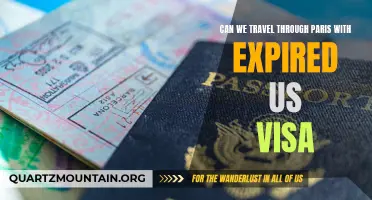
Exploring Paris with an Expired US Visa: Is It Possible?
- Mar 25, 2024
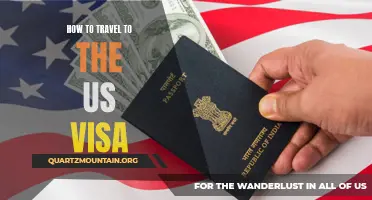
Tips for Obtaining a US Visa and Traveling to the United States
- May 05, 2024

Understanding Whether a Travel Visa is Required for the Bahamas

A Comprehensive Guide on Checking Points on TD Travel Visa
- May 02, 2024

Can I Travel with an Expiring F1 Visa? Here's What You Need to Know
- Mar 23, 2024
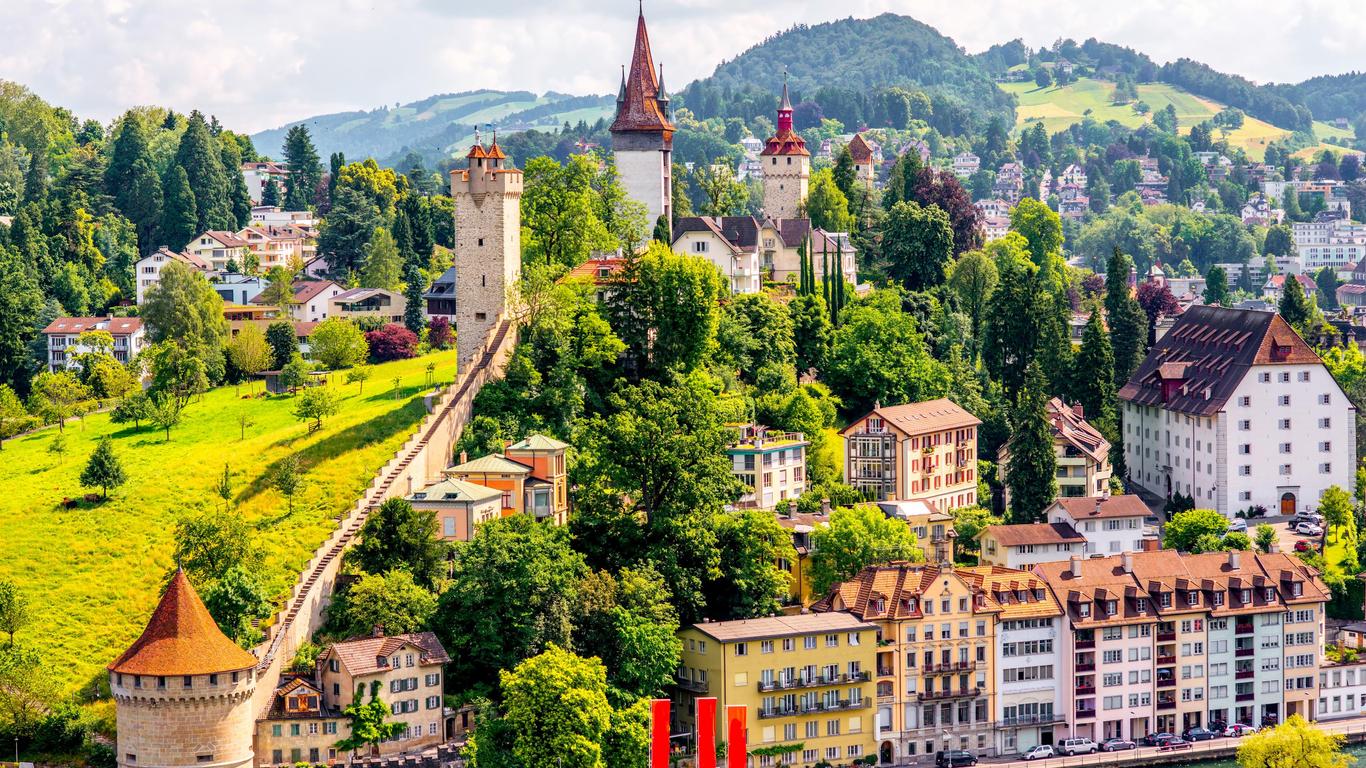
Find cheap flights from New York to Switzerland from $175
This is the cheapest one-way flight price found by a kayak user in the last 72 hours by searching for a flight from new york to switzerland departing on 9/17. fares are subject to change and may not be available on all flights or dates of travel. click the price to replicate the search for this deal., search hundreds of travel sites at once for deals on flights to switzerland.
Save 21% or more Compare multiple travel sites with one search.
Track prices Not ready to book? Create a price alert for when prices drop.
Filter your deals Choose cabin class, free Wi-Fi and more.
Bundle and save Save money when you bundle your flight + hotel.
Best Switzerland Flight Deals
Cheapest round-trip prices found by our users on KAYAK in the last 72 hours
Good to know
Faqs - booking switzerland flights, is a visa required to travel to switzerland from new york.
No, U.S. citizens are not required to obtain a tourist visa to travel from New York to Switzerland. However, this is under certain conditions. U.S. citizens do not need a Swiss visa as long as they have a flight leaving the Schengen area within less than 90 days from their entry date, and they are only visiting the country for tourism purposes.
Are there direct flights from New York to Switzerland?
Yes, there are direct flights to both Zurich and Geneva in Switzerland. These non-stop routes operate out of either the John F. Kennedy International Airport (JFK) or Newark Liberty International Airport (EWR), serving the New York area. The airlines that offer these direct flights are Swiss Air, from both airports, and United Airlines from Newark Liberty International Airport.
Which airport is best to fly into to visit the Matterhorn?
If you are traveling to Switzerland to see the iconic Matterhorn mountain, the closest arrival airport to this Swiss attraction is Geneva International Airport (GVA). However, if you wish to explore more of the Swiss Alps and not only the Matterhorn, the drive from Zurich Airport to the Matterhorn mountain is a spectacular scenic route through the Alps range.
Is there public transportation from Zurich Airport to the city center?
Yes, there are bus, tram and train services operating out of Zurich Airport. If your final destination is the city center of Zurich, there are multiple trains of the Swiss SBB railway that go to the Old Town in under 30min. You can purchase your train tickets directly at the airport at the SBB ticket machines or counters.
How does KAYAK find such low prices on flights from New York to Switzerland?
KAYAK is a travel search engine. That means we look across the web to find the best prices we can find for our users. With over 2 billion flight queries processed yearly, we are able to display a variety of prices and options on flights from New York to Switzerland.
How does KAYAK's flight Price Forecast tool help me choose the right time to buy my flight ticket from New York to Switzerland?
KAYAK’s flight Price Forecast tool uses historical data to determine whether the price for a flight to Switzerland from New York is likely to change within 7 days, so travelers know whether to wait or book now.
What is the Hacker Fare option on flights from New York to Switzerland?
Hacker Fares allow you to combine one-way tickets in order to save you money over a traditional round-trip ticket. You could then fly to Switzerland with an airline and back to New York with another airline.
What is KAYAK's "flexible dates" feature and why should I care when looking for a flight from New York to Switzerland?
Sometimes travel dates aren't set in stone. If your preferred travel dates have some wiggle room, flexible dates will show you all the options when flying to Switzerland from New York up to 3 days before/after your preferred dates. You can then pick the flights that suit you best.
Top tips for finding cheap flights to Switzerland
- Morning departure is around 10% cheaper than an evening flight, on average*.
- Flying to Zurich Airport (ZRH) from New York is the best way to reach Switzerland and most of its northern area. Top Swiss sites like the capital city of Bern, the Rhine falls and the picturesque medieval city of Lucerne are all less than a couple of hours away from Zurich Airport by car or train.
- Even though there are direct flights between New York and Switzerland, generally there are more options and more affordable tickets for those that have connecting flights. The location of these connecting airports depends on the airline you fly with. However, a lot of them stop in Madrid.
- Both Zurich Airport and Geneva Airport have convention centers onsite as well as hotels, either within the airport’s premises or its vicinity. This is a convenient service for passengers traveling from New York to Switzerland on business, following tight schedules.
- For those passengers traveling to the southeast of Switzerland, the closest and most convenient airport to fly into may be in Italy. In this case, you may want to search for flights from New York to Milan Malpensa Airport (MXP) instead.
- When traveling from New York to Switzerland, you will need to exchange some of your USD into the Swiss currency, the Swiss franc (CHF). You can change some pocket money at any arrival airport in Switzerland. However, there are generally better deals at currency exchange spots in the city.
Top 5 airlines serving from New York to Switzerland
The plane was FREEZING SEATS UNCOMFORTABLE Otherwise smooth Thank you
I'm a larger, athletic guy (6'2", 260lbs powerlifter) and I found the seats incredibly uncomfortable with minimal leg room, especially in a window seat. Now, I full understand that being smaller may change my view but even if I was 80lbs less, my legs would be the same size and I was sandwiched between my seat and the seat in front of me.
Seat back monitors and outlets were dead and not working.
The crew, food, and entertainment were all good. But my screen had some sort of bug where if I turned it off, it would turn back on after 2-5 minutes. At full brightness. It made it very hard to get any shut-eye on the overnight flight. Also, the older Boeing plane, while nicely cared for (and no doors fell off 😅👏) doesn't have the nice air quality of newer planes. So I felt a bit greasy by the time we landed in Sweden.
Service was good for such a short flight. Small plane but smooth flight.
The flight was delayed but we got to our final destination.
Uncomfortable seats on 14 hour flight. Mediocre food. On time and great crew.
The helpful attitude of the staff, and being a wheelchair passenger everyone was helpful and understanding. The trip was made comfortable by the upgraded seat which was given without my request, that was a great surprise. Thank you Delta.
Everything went well with the flight. But one of the flight attendants had on inappropriate pants. She had on an old worn out pair of sweat pants. The back seam was unrivaled and should not have been worn for work. If I had not seen her in the airport with the standard type of luggage, I certainly would not have thought she was working for Delta. Not a good look at all for representation.
Great!! I haven’t had a bad experience with them.
Far above average. The level of quality and service has really improved and passed most US carriers on this route. Go Edelweiss!
We had issues with upgrading our seats. The flight itself was fine.
Flight was late and crew were unwilling to help with information on connections. Call light had been on for 61 minutes without tesponse.
Kudos to Swiss!! My wife and I thought Swiss was like flying years back: good food service, refreshments, friendly and courteous crew! We look forward to another trip to Europe next year, and it will be a priority to hopefully fly Swiss, thank you! We strongly can say from experience - the treatment (food, drink, entertainment) in service for Economy Class is unmatched!!!
So terrible. They would not rebook me for a flight until 2 days. I had to spend so much money to get my own flight. They were rude and not helpful.
Overall a good experience, the flight was on time, the crew very attentive and friendly. However the seats are too cramped, there is no space, and as soon as the person in front reclines the seat, it's literally in your face.
Bag lost. Lost bag recovery process is an unsatisfying customer experience. Because 1) bag is still lost but also 2) the process is outdated and form-heavy and 3) in our case also involved a long line.
We were very impressed with Swiss Air. The service was exceptional. Unfortunately, we had a baby behind us that screamed for hours. , It was a nightmare, though I completely understand that it was not Swiss Airs fault.
Bathrooms weren’t too clean. Onboard entertainment was light. Other than that everything was great. Food, service, comfort and crew. Although it was hard to understand the crew announcements.
TERRIBLE! Staff was unfriendly, rude, and demeaning. One flight attendant touched me to grab the complimentary blanket off my neck because I couldn't take it home, while a bunch of other people took theirs home. I have never been so ill treated. I am not happy at all. And flight was delayed, no information until short notice for everything. Lost an entire day at my destination. I expect a full refund for that experience. Never will fly with them EVER again
My return flight has been changed to JFK from EWR without any notice or reason
This was my first time flying SAS and used them for 4 flights. The crews, flight and communication was outstanding. I flew premium economy and was extremely impressed by their SAS lounges. I will 100% ise SAS again. Everyone was so pleasant!
They lost my luggage. Tromso in winter without warm clothes is not fun.
Flight was delayed 3 hours. Pilot cancelled flight under 4 people volunteered to change their seats to economy from business class.
Overall, this flight team did a fantastic job. They came often with the water, coffee and tea. There was no meal choice in coach, but the lasagna lunch was decent. The sandwich snack just before landing was tasty. The baggage bins were large, so no trouble holding carry on luggage.
Good friendly service and food - The seats in business class are old, too hard and not very comfortable.
Last minute cancelation, though a substitute flight was found I could not pick my meal or seat. The hotel offered didn't have working air control or shower.
My seat was not the one I paid for, the crew was very curt, and the cabin was extremely warm.
Flight was delayed 2.5 hours - a big deal on an overnight when you plan to sleep.
I feel like they have upgraded the app since I last flew United and I found it to be super helpful. I had stopped flying United unless absolutely necessary and my experience on this trip indicates they have been working hard to improve their services.
flight delays, staff only communicating when pushed, food service lasting a grand total of 7 minutes, stuck in seat from 45mins into flight until landing
Nice flight, nice crew but no cookie or napkin with my seltzer.
The flight was canceled. Got rebooked to Chicago and when we arrived our luggage where to there. They were going to our original destination the day after. They would not deliver them to our house. We had to go pick them up.
EWR terminal C United Club is great. Flight and everything else mediocre
737 Max was leaking water into the cabin through the windows. Overhead bins opened on landing. Bad bad plane.
Very bad , airplain had problem with engines , had to evacuate, had a delay on my trip for almost 4 hours , lost my rental car in london..
Other than the two hour delay, it was fine. Of course they were very professional and kept us informed throughout the whole delay..
Easy boarding in group 2. Landed 1/2 hr early. Delicious cookie snack.
Delayed takeoff was inconvenient. We should have boardrd later. Coffee/ beverage service on a 7:30 flight would have been good.
I thought Miami's airport was very disorganized during the Boarding.
Very efficient boarding - other airlines could learn from them. Friendly, efficient crew. Red eye flight, so dinner meal was irrelevant. Breakfast could have been more substantial. Seats reasonably comfy.
The airline made last minute changes to our business class seats splitting our family of 4 with young children who had pre-booked a row of 4 seats. The seat was also dirty and sticky. Our pre-ordered child meals were also not available. :(
Awful experience all around, misleading booking led to disgraceful baggage charge at gate. Tiny uncomfortable seats with little drinks served in small paper cups filled halfway. Difficult to use bathrooms the whole flight and now on the way back we’re stuck in Lisbon a day later because of a diversion on our connecting flight, I will never fly this airline again.
Perfect although it took an hour to board the plane but other than that it was great
Everything was nearly perfect, and TAP staff were especially helpful when we missed our connecting flights and had to get on the next flight to Rome. The only aspect that could have been better was boarding: it was somewhat disorganized, which created a bit of stress. But in the end, everyone got on the plane, so the less-then-perfect boarding process did not take away from the overall excellent experience.
The quality of the aircraft and the professionalism of TAP's staff were perfect. The quality of vegan meals can be hit or miss depending on the airline and the city of departure; on this flight, our vegan meals were quite good. The boarding process for the connecting flight in Lisbon could have been organized a bit better, but it did not spoil our overall experience with TAP, which was excellent. I'd definitely recommend TAP to others.
We liked the crew. They were competent, professional and friendly. The only big negative was our departure was delayed several times and the airport staff did not communicate what the problems were and what we should expect.
O comissário não nos serviu bebida no jantar. Quando voltou somente serviu água.
Book cheap flights from New York to Switzerland
Recent round-trip flight deals, search by stops, search by airline, search by price, recent one-way flight deals, last minute flights from new york to switzerland, last minute flight, train and bus deals, flights to switzerland, return flight deals:.
Switzerland - New York
Cabin classes:
Browse origins:.
- Flights »
- United States »
- New York State »
Browse destinations:
- Worldwide »
- Switzerland

GOBankingRates
The Safest Places To Retire Outside the U.S. — And What It Will Cost You
Posted: April 5, 2024 | Last updated: April 5, 2024
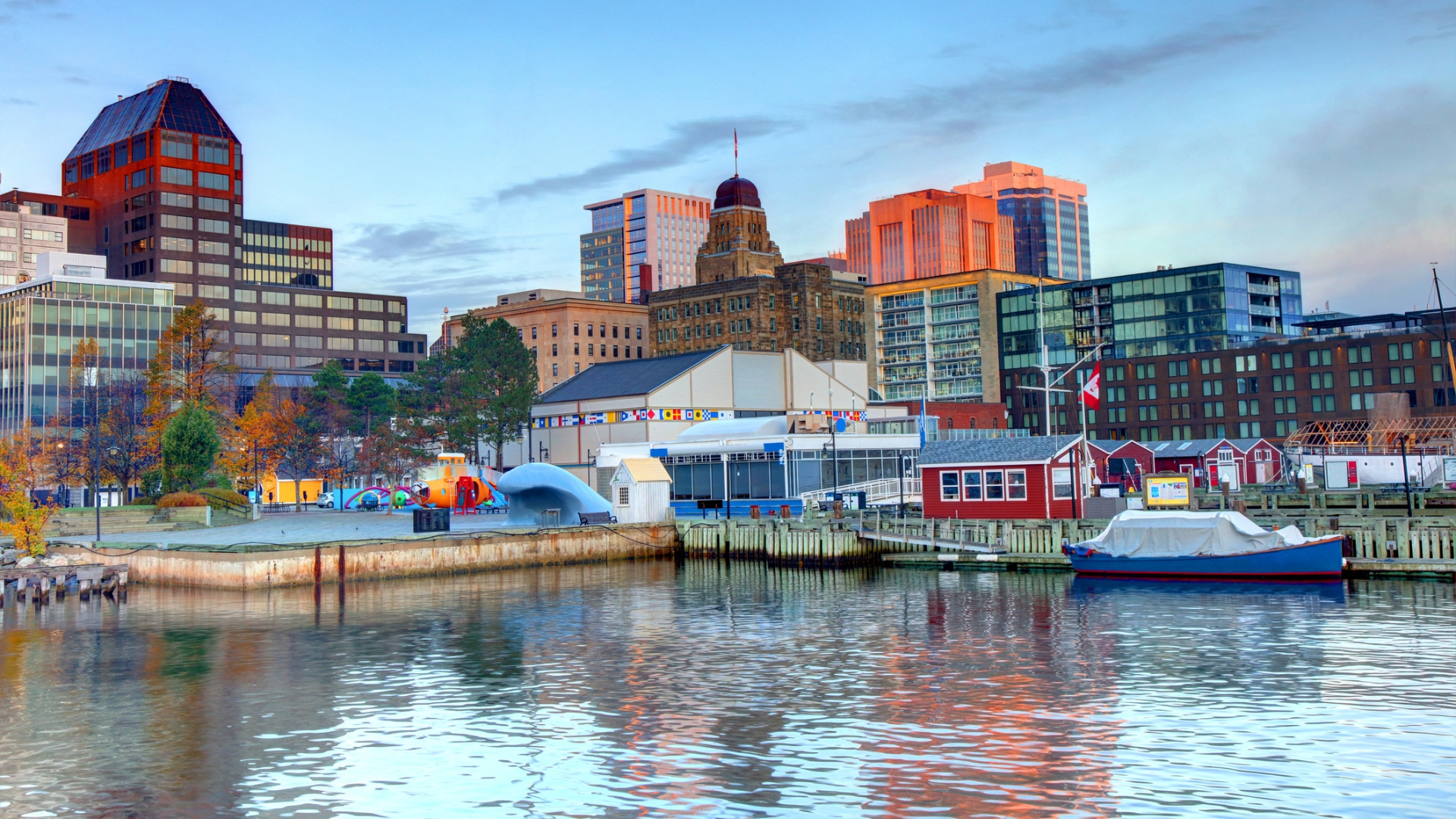
Among the reasons people choose a retirement destination , safety usually ranks near the top, along with affordability, access to healthcare, housing options and climate. For those who want to retire abroad , safety is often a primary consideration -- and one that has taken on added importance in an increasingly unstable world.
Trending Now: Kevin O'Leary: 5 Retirement Planning Tips He Swears By For You: One Smart Way To Grow Your Retirement Savings in 2024
According to the World Economic Forum's " Global Risks Report 2024 ," there is a "deteriorating global outlook" in terms of threats to safety. The Israel-Hamas war that erupted beginning in October 2023 has contributed to a sense of unease not only in the Middle East but many other regions of the world. That's also the case with the ongoing Russia-Ukraine war.
Beyond armed conflicts, much of the globe has suffered from record-breaking heat conditions, drought, wildfires and flooding, as well as social polarization, violent protests, riots and strikes. A majority of respondents polled by the WEF anticipate "some instability and a moderate risk of global catastrophes."
For seniors who want to retire abroad, a good resource is the Institute for Economics and Peace's Global Peace Index . It ranks nations based on criteria such as violent crime, internal conflict, homicides, access to weapons, political instability, violent demonstrations, terrorist activity, the population of imprisoned people, safety and security and militarization.
The United States doesn't fare well in the latest index, with a ranking of No. 157. Only one top pick is in North America -- and it isn't Mexico, which ranks behind the U.S. at No. 162.
Here's a look at the safest places to retire and how much they might cost based on various media and data sources. All costs are in U.S. dollars. Keep in mind that the estimated costs are countrywide averages, and costs will be much higher or lower depending on where you live.
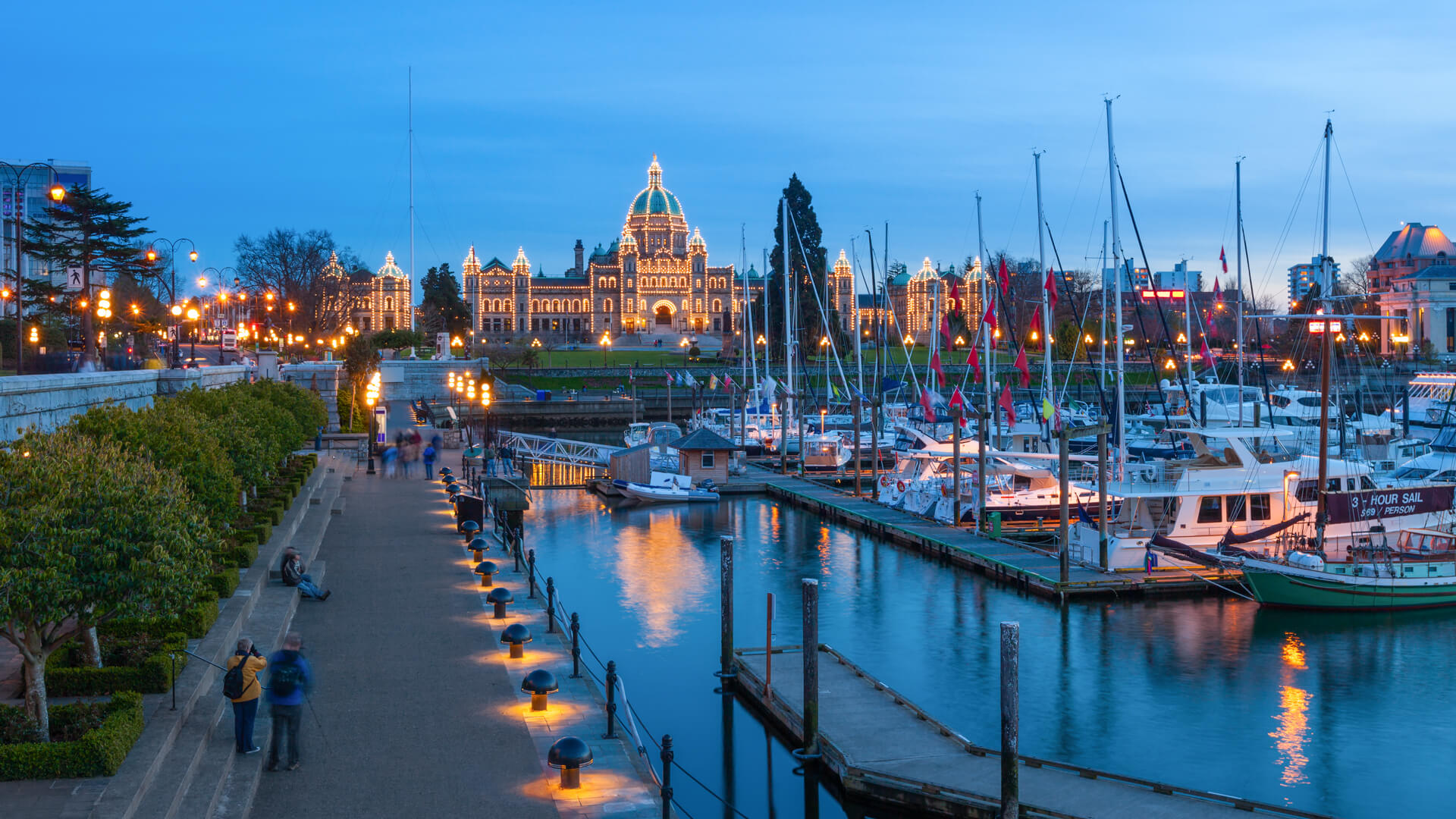
If you're looking to retire abroad but not overseas, good news. You can drive to one of the safest countries in the world -- just make sure you head north and not south.
Canada ranks No. 11 on the Global Peace Index. It's a politically stable country with very low violent crime, internal conflict or conflict-related deaths. It ranks very high in safety and security and very low in militarization and displaced people.
The average cost of living in Canada is about $2,330 per month.
Be Aware: 6 Changes Coming to Social Security in 2024 and Who Could Be Affected Most Explore More: Cutting Expenses in Retirement: 6 Home Items to Stop Buying
Sponsored: Credit card debt keeping you up at night? Find out if you can reduce your debt with these 3 steps
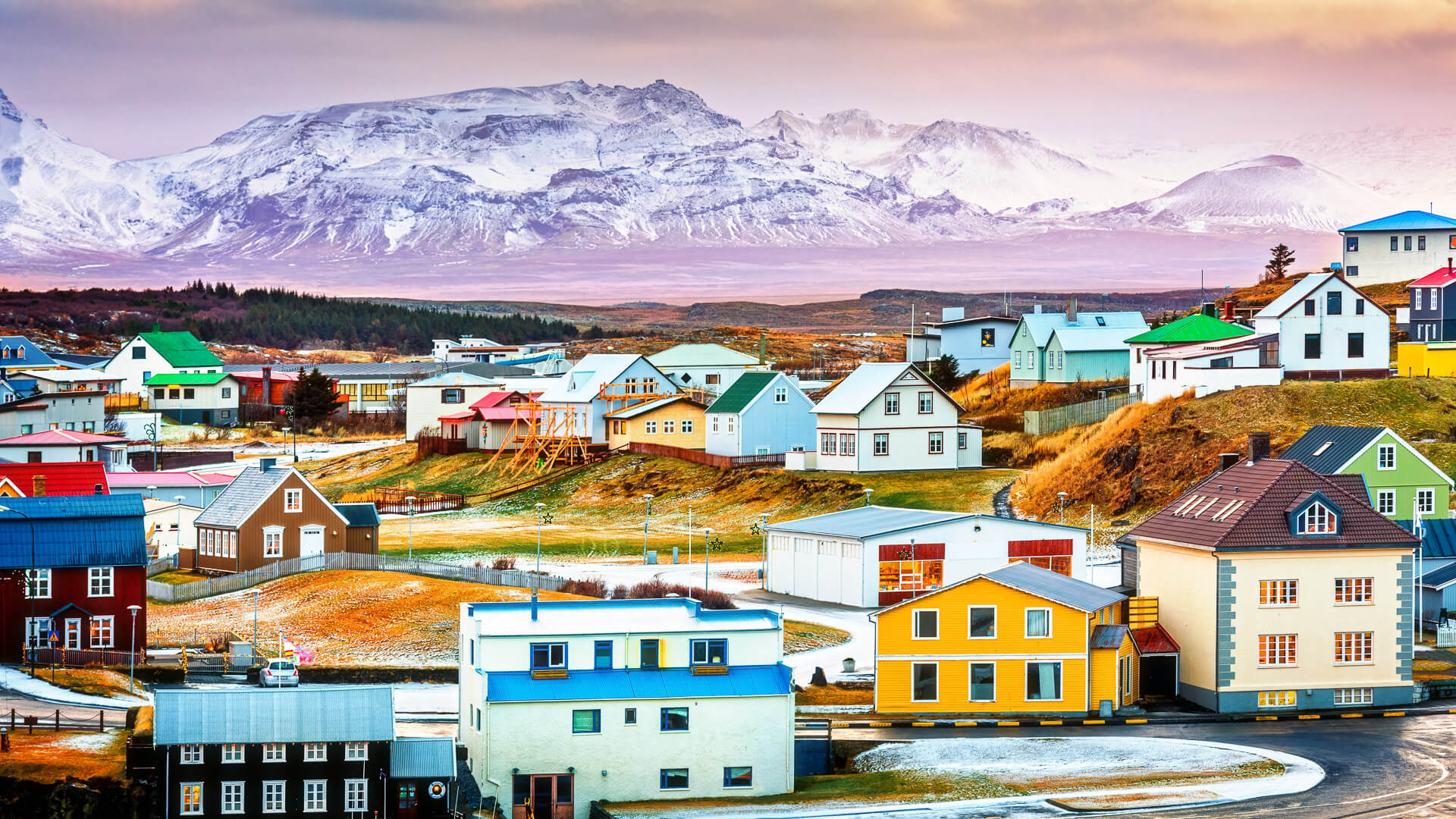
Canada might be closest; but, if you sail east a little more than halfway between North America and Northern Europe, you'll hit Iceland, which has claimed the title of the safest country in the world every year since the mid-2000s.
Yes, it brushes up against the Arctic Circle, and yes, the alphabet gets a little weird if you've lived stateside your whole life. But there's a whole lot to like about the island nation, which, like Canada, is one of the colder countries on the list. Aside from its famous geothermal pools and astonishing natural beauty, Iceland also lands at or near the top of the rankings for the world's happiest countries year after year as well.
The average cost of living in Iceland for a single person is about $1,290 a month, not including rent.
Find Out: 6 Things Retirees Shouldn't Spend Big Money on While Traveling Abroad
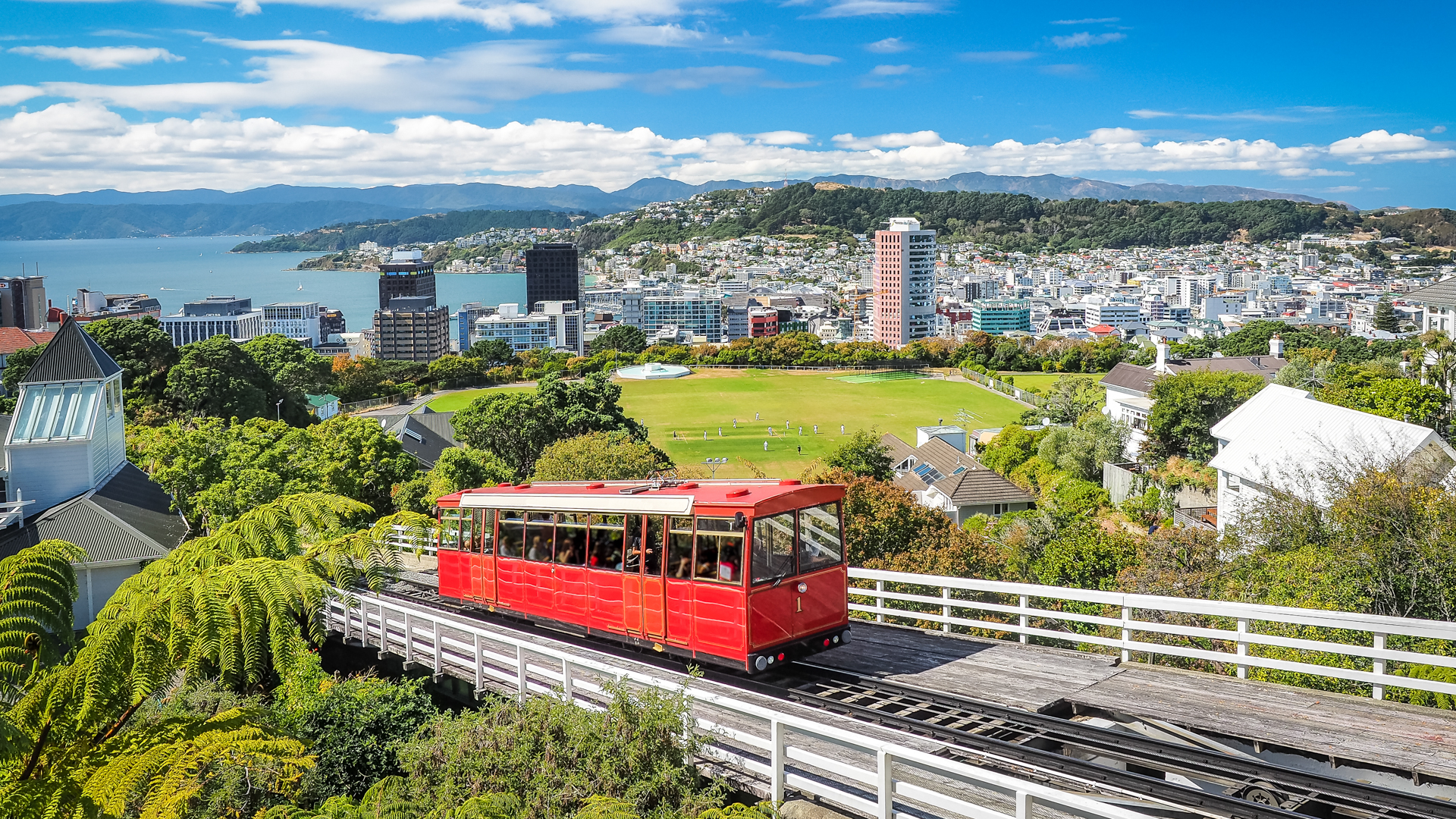
New Zealand
The No. 4 safest country in the world is truly lovely. According to French travel company Evaneos, "New Zealand is a country known for its safety, and the relaxed attitude of the Kiwis will prove it to you."
The site adds that many locals don't lock their doors and often keep their engines running when they make a quick stop at the store. Generally, you won't see people on high alert at night, clutching their handbags or avoiding conversations with strangers.
The average cost of living for a single person in New Zealand is about $2,100 a month when you factor in rent.
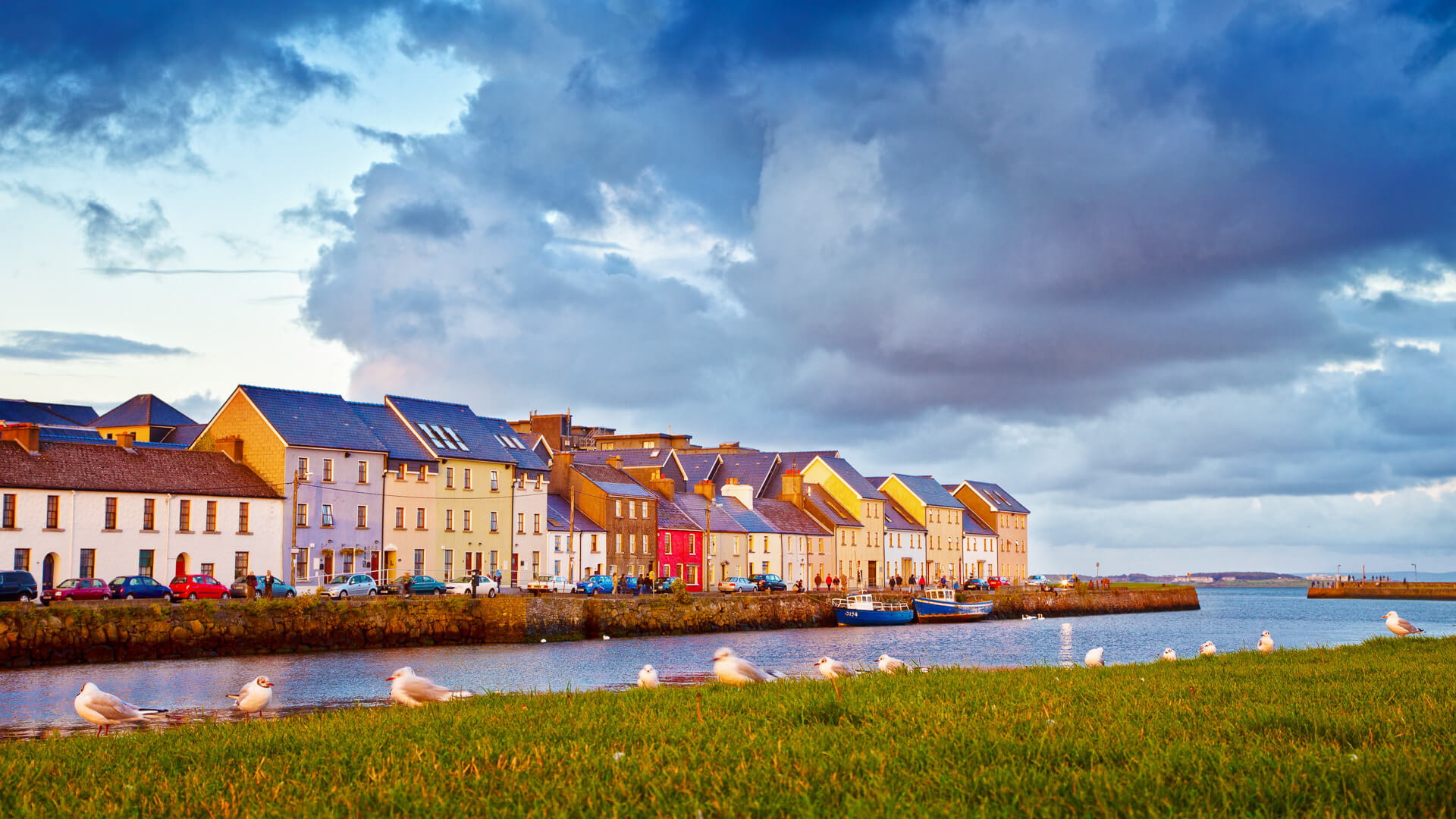
Though the country was long known for militarization, ethnic and religious conflict, terrorism and violent demonstrations, those problems are nearly non-issues in modern Ireland. The island can now boast the title of the No. 3 safest and most secure country in the world. On top of that, American retirees who move there would only have to adapt to a slightly different brand of English.
According to Travel Safe Abroad, Ireland was a poor country for much of its history, but after joining the European Union in 1973, it enjoyed a massive influx of foreign investment and became the European base of many multinational companies, making it one of the wealthiest and most stable countries on the continent today.
The average cost of living for a single person in Ireland is about $1,065 a month, not including rent.
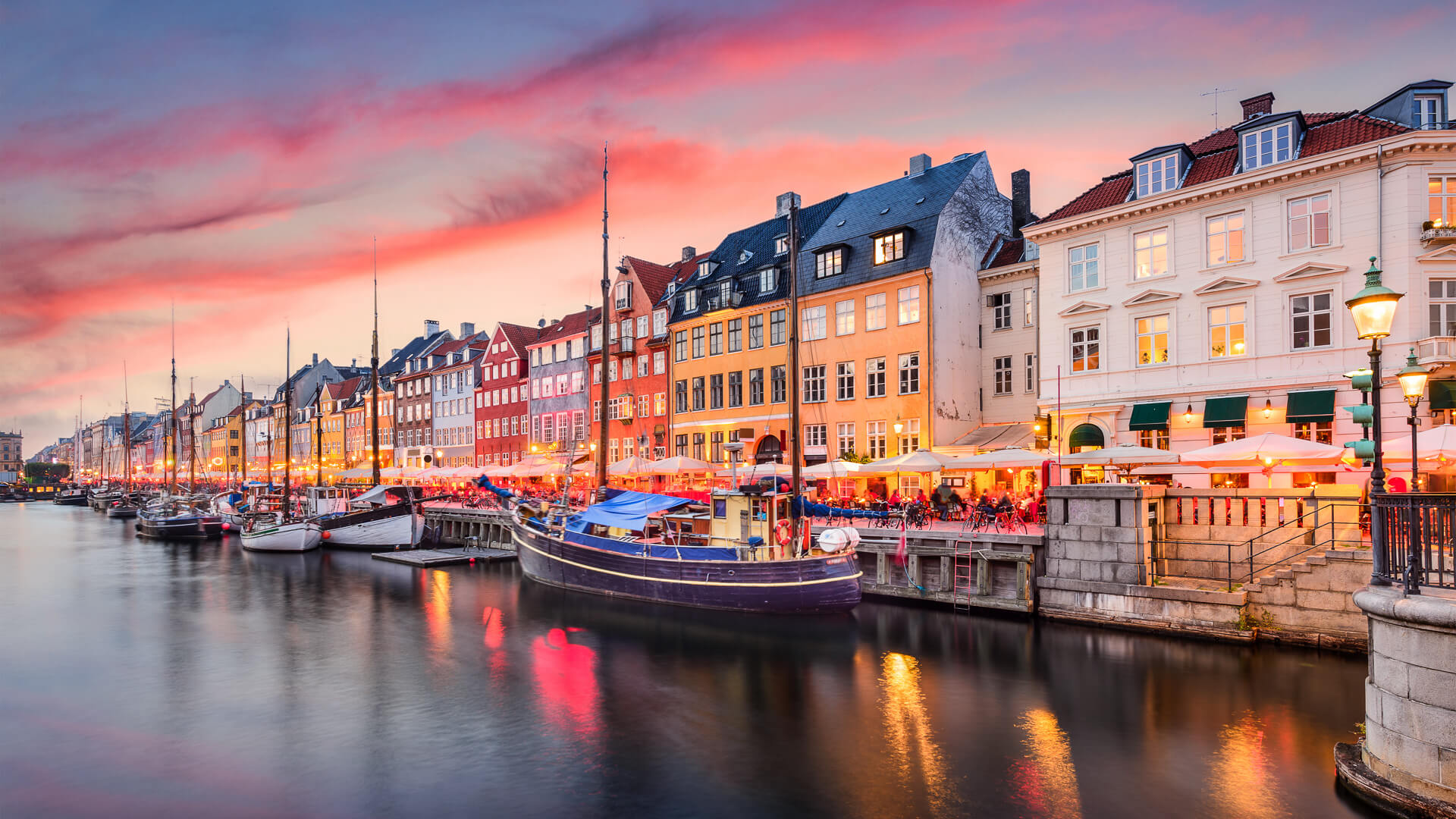
Denmark joined the EU the same year as Ireland, and nearly a half-century later, it is one of the statistically safest countries in the world. However, the U.S. government recently warned of a heightened risk of terrorism in the tiny Nordic kingdom.
Beyond that, though, homicides and other violent crimes, militarization, political instability, violent demonstrations and other red flags exist only as the rarest of outliers. Like Iceland and the other Nordic countries, Denmark is a perennial presence near the top of the list of the world's happiest countries -- as well as the safest.
The average cost of living for a single person in Denmark is about $1,175 a month, not including rent.
Check Out: $2 Million in Retirement Savings -- Here's How Much You Could Withdraw Per Year
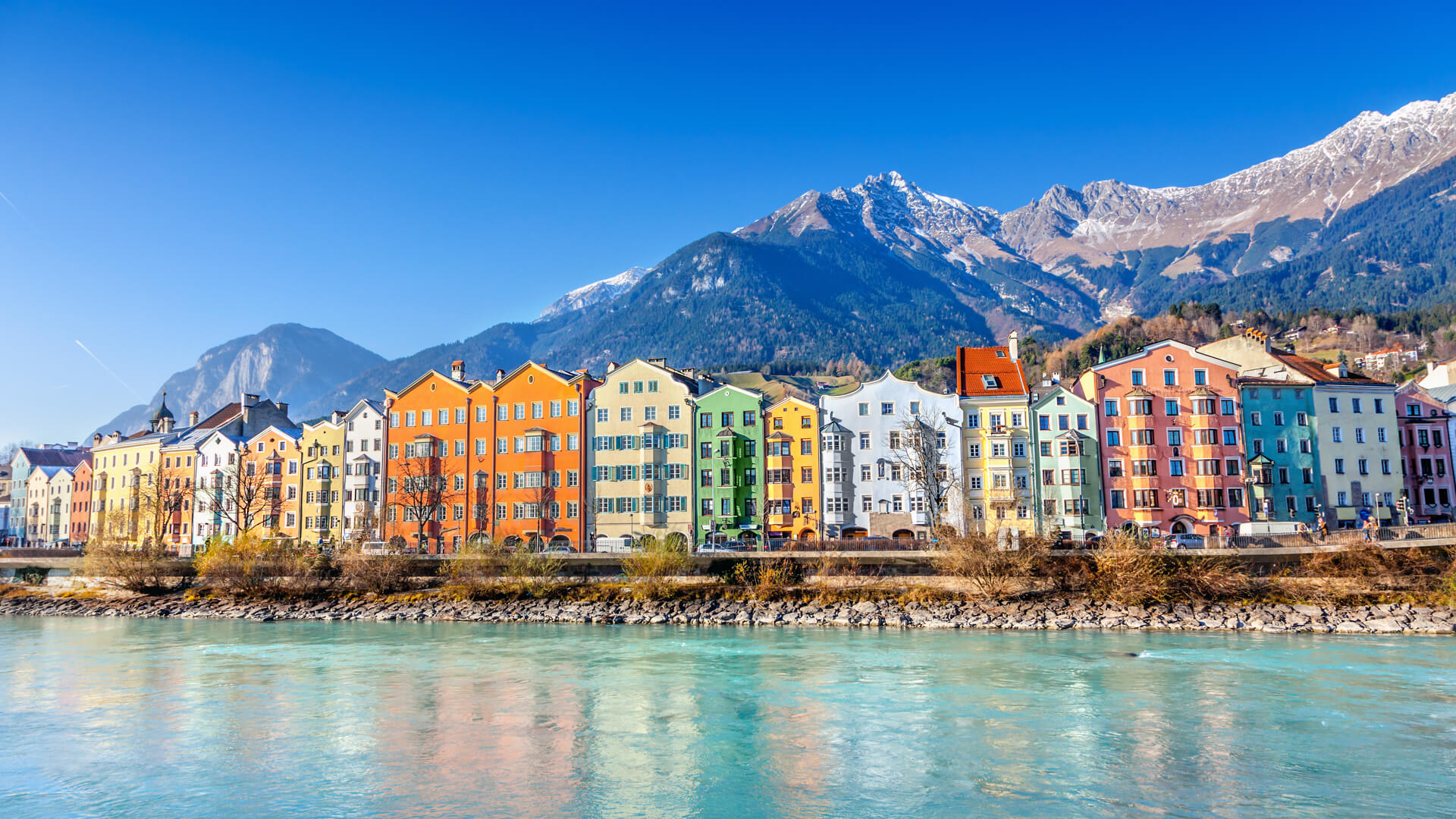
Rounding out the five safest countries in the world, Austria is both beautiful and peaceful.
According to the U.S. Department of State, "Austria is a free and stable democracy with a social market economy," and "Austria and the United States are partners in promoting global security, strengthening economic cooperation, and collaborating to promote and defend our shared values around the world."
The average cost of living for a single person in Austria is about $1,715 a month.
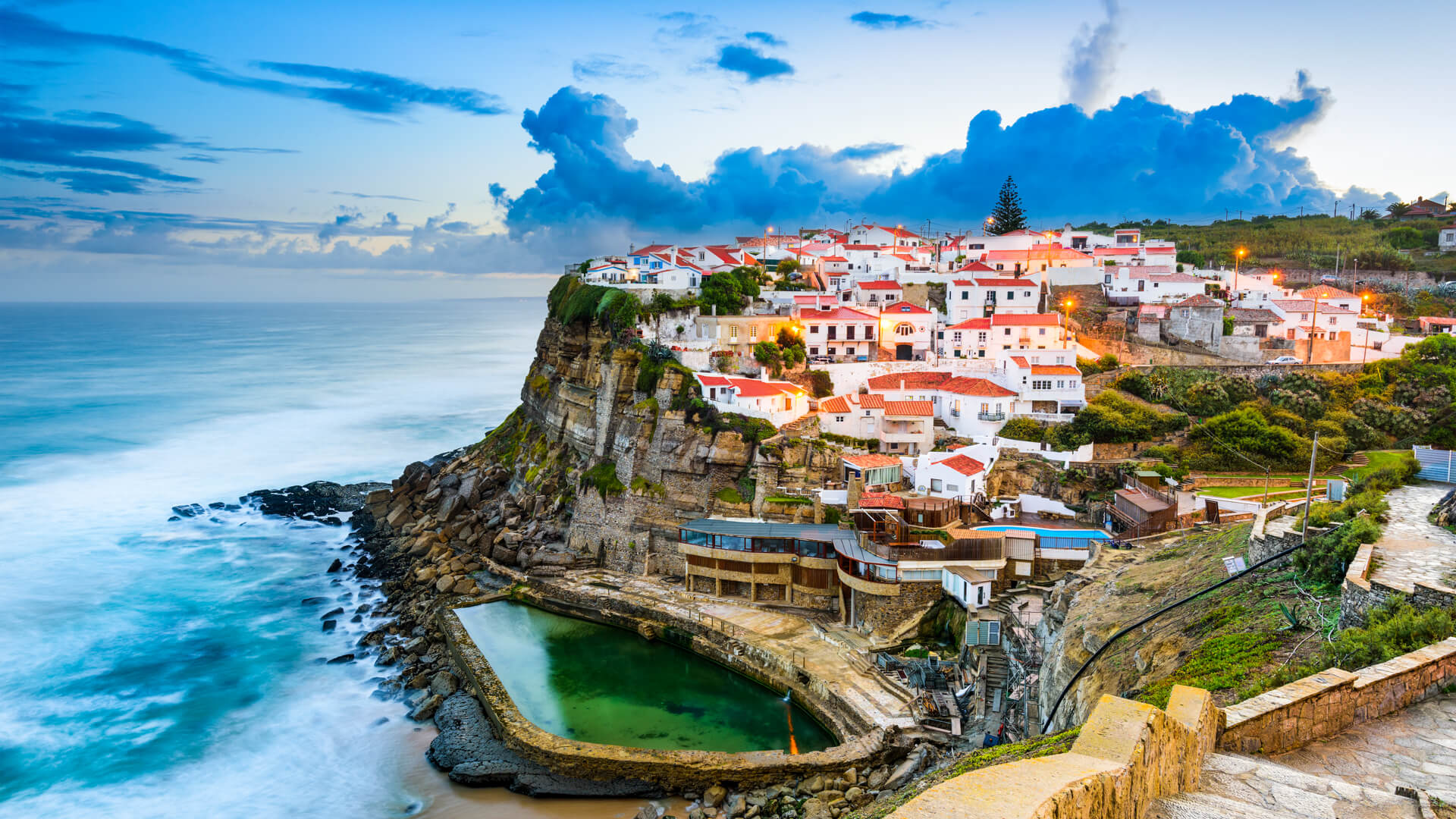
Back over to Western Europe, Portugal is the No. 7 safest country in the world.
Despite its impressive ranking, Portugal has actually slipped a little. It was ranked No. 3 behind only New Zealand and Iceland in 2020, and in 2021 Portugal took the No. 4 spot.
The average cost of living for a single person in Portugal is about $718 a month, not including rent.
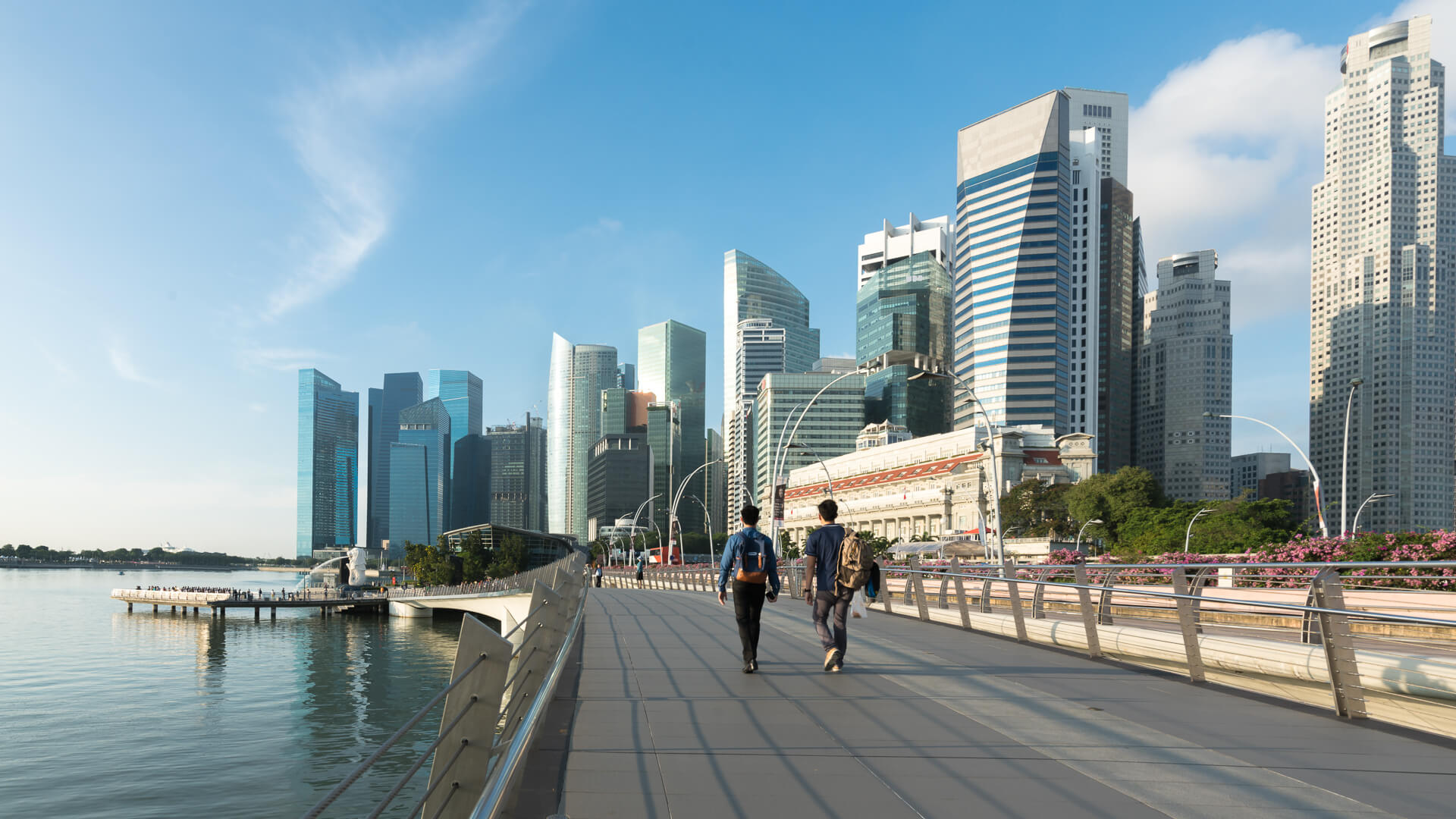
If you're looking to retire somewhere safe in the East, Singapore is one of your best options. It ranks as the No. 6 safest country on Earth.
According to relatively recent Singapore Economic Development Board data, the country ranks No. 1 in all of Asia for quality of living. It's also the second safest city in the world and the best place in Asia for expats to live. It cites Gallup data showing that 94% of Singapore residents feel safe walking alone at night compared to 69% worldwide. It credits this to "consistently low crime rates, a transparent legal system, and a reliable police force supported by proactive citizens."
The average cost of living for a single person in Singapore is about $1,131 a month, not including rent.
Read Next: Are You a 'Wealthy' Retiree? How To Tell if You're in the 1% Without a Salary

Japan holds the No. 9 spot in the ranking of the world's safest countries. Japan routinely ranks near the top of the list thanks to low crime rates, including both violent crimes and property crimes.
According to Intrepid, the biggest danger there comes not from criminals, but from Mother Nature. Not only is Japan prone to typhoons, but its location in the Ring of Fire makes it susceptible to devastating earthquakes and tsunamis.
The average cost of living for a single person in Japan is $841 a month, not including rent.
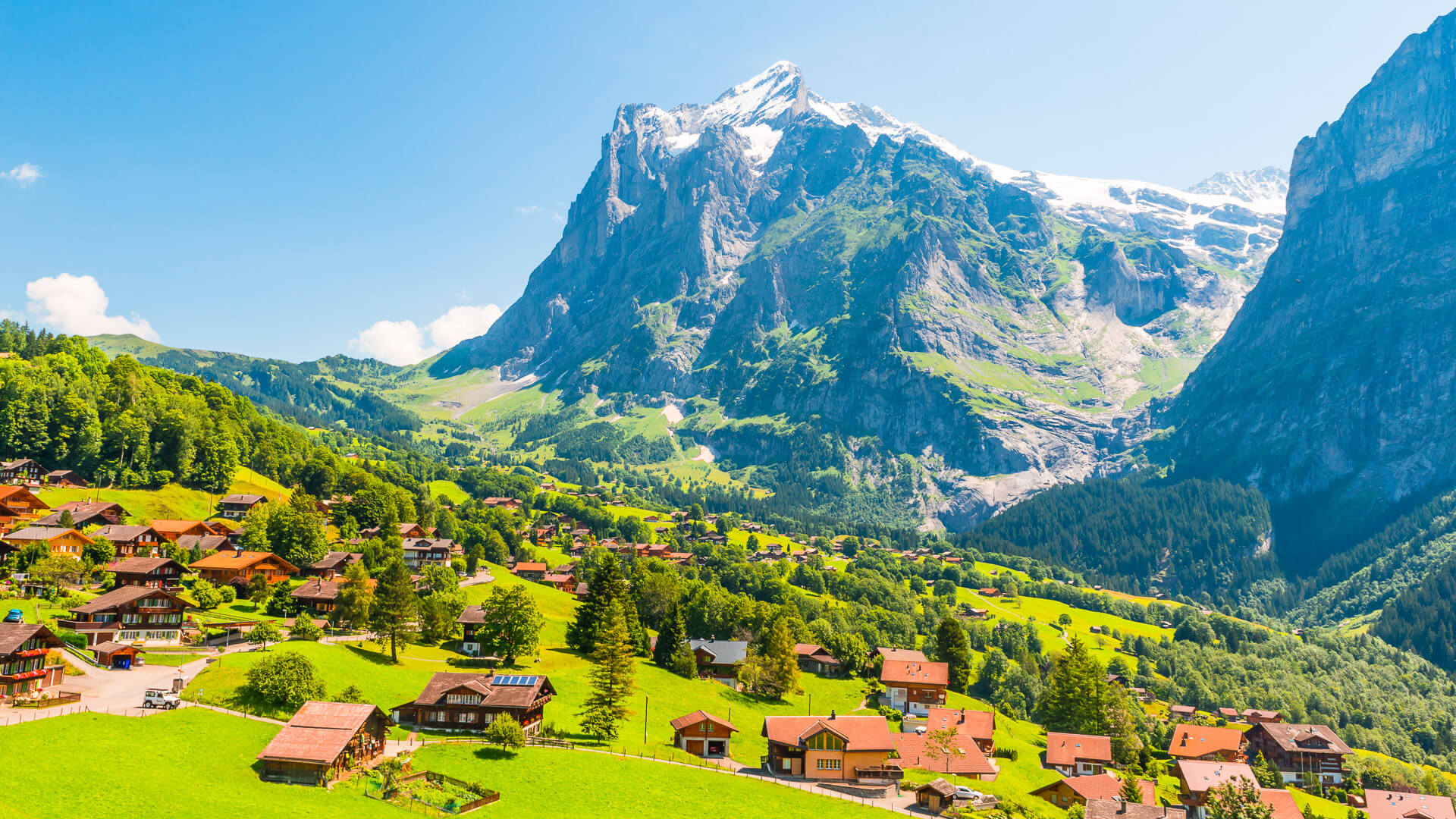
Switzerland
Rounding out the list is Switzerland, which takes the No. 10 spot on the Global Peace Index. It's long been known for stunning mountain scenery and other natural beauty, a generally pleasant and welcoming local population, rich cultural history and very low crime.
In fact, many villages are virtually crime-free.
The average cost of living for a single person in Switzerland is about $1,670 a month, not including rent.
More From GOBankingRates
- The Single Best Thing To Buy at Aldi in March 2024
- 10 Cars That Outlast the Average Vehicle
- This is One of the Best Ways to Boost Your Retirement Savings in 2024
- 6 Things You Should Never Do With Your Tax Refund (Do This Instead)
Vance Cariaga contributed to the reporting for this article.
More for You
Will we see the northern lights again Sunday? Here's the latest forecast
People With Low Emotional Intelligence Are Known to Use These 4 Phrases
13 Frugal Habits You Have Never Heard of but You Should Know
Homes are overvalued in much of the U.S. — with these 5 states leading the list
I make 4 times more money than my husband earns. He later admitted he was jealous of me being the breadwinner.
Why You Should Be Putting Paper Towels in the Fridge
7 Safest Places To Retire in the US for Under $2,000 a Month
Here Are 5 Telltale Signs That You’re In A Relationship With A Covert Narcissist
Bankruptcy Looms For Major Cable Network
What will happen to home prices if inflation stays high? Here's what some experts think
‘I’ve sacrificed my career’: My husband and I may divorce soon, but he will inherit $1 million. How do I make sure I get half?
The No. 1 question to never ask in a job interview, says CEO who's interviewed hundreds: 'You risk sending the wrong message'
I visited Walmart and found over 25 products that show how the retail giant is trying to win over wealthier customers
You Are Too Old To Do These 12 Things After 55
Footage shows world's largest water drain reawaken after lake refills following years-long drought: 'We're all very happy'
The Greatest Creature Feature Movies of All Time
5 Facts About The 1967 Pontiac GTO Only Hardcore Car Fans Know
63% of divorcees say this is the No. 1 thing that would have saved their marriage—and it's not more money
Here’s the retirement savings that put you with the richest 10% of Americans — it’s a much smaller number than you may think
Fans Are In Agreement About The Seattle Storm's Roster Decision On Nika Muhl

- Destination
- Discover Shirdi With These Cost Effective Tips
Discover Shirdi With These 5 Cost Effective Tips

Web Desk Updated: May 13, 2024 11:04 AM IST
5 Budget Friendly Tips To explore In Shirdi
Shirdi is a small town that lies in Ahmednagar district of Maharashtra and it is famous for being home to the revered saint Sai Baba. Every year, millions of devotees and tourists flock to Shirdi in order to pay homage to Sai Baba and experience the spiritual atmosphere in this holiest place. While Shirdi is mainly known for its religious value, there are also numerous budget-friendly attractions and experiences available for travelers. From visiting holy temples and attending devout ceremonies to tasting local foodstuffs and picking up some keepsakes, Shirdi can be explored on a shoestring. Here are five insiders' tips on how you can maximize your budget-friendly expedition:
1.Visit Sacred Temples
One of the main attractions in Shirdi is the sacred shrine dedicated to Sai Baba; known as Shri Sai Baba Temple, which is dedicated to the revered saint Sai Baba. The temple complex includes many important sites such as Samadhi Mandir, Dwarkamai Mosque, besides the main shrine of Sai Baba himself. These sites are visited by millions who come to pay homage to this deity.
Besides being one of the most important religious places in India, there are other significant shrines in shirdi where visitors may want know about like Khandoba temple or Maruti mandir located at shirdi.
2.Attend Aarti at Shri Sai Baba Temple
The daily aarti (ritual prayer) at the Shri Sai Baba Temple offers an enchanting experience when you visit Shirdi. The Kakad Aarti (morning aarti) and Shej Aarti (night aarti) are two most popular among pilgrims as they come out early morning before sunrise or late evening after sunset respectively.
3.Explore Nearby Attractions
Apart from being a place of worship, there are also some natural and cultural places located around Shirdi. The famous Shirdi Water Park is one such place where visitors can indulge in fun filled activities and water rides suitable for all age groups. Being pocket friendly destination for those on budget like family and friends who are travelling together, the park charges reasonable entry fees with discounts available for group bookings.
Another nearby attraction is the Wet N Joy Water Park situated in Shirdi town. This water park has different pools, slides and many other features that will keep visitors entertained throughout their stay here. It is fairly priced making it ideal for travelers working with strict budgets.
4.Indulge in Local Cuisine
When visiting shirdi, you should not miss out the local foods which are a combination of Maharashtrian as well as South Indian tastes. In eateries found near temple complex, tourists can take pleasure in trying out traditional dishes such as Poha's , Misal Pav . Vada pav etc.,
The comfort food that one requires while on a budgeted trip can easily be found at various restaurants and cafes across Shirdi. There's also prasad offered inside the temple which is distributed among devotees free of cost.
5.Shop for Souvenirs
There are lots of shops and markets in the town that sell a range of things relating to Sai Baba, like photographs, idols and books. So before you leave Shirdi, you can buy something to remember your visit there.
Moreover, tourists can purchase native crafts as well as holy images such as incense sticks, prayer beads, puja thalis from the gift shops near the temple complex. These mementos act like memorabilia for one's spiritual journey through Shirdi and wonderful presents for friends or relatives.
To sum up, it is not only feasible but also rewarding to explore Shirdi at cheap prices. Travelers can therefore get a taste of the religious and cultural attractions which make this place so special by following these money-saving tips. There are many low cost activities that one could engage in while visiting Shirdi including taking part in various religious ceremonies held in sacred temples which are scattered around Shirdi eating its local foods as well buying souvenirs. For this reason, gather your belongings together; travel to Shirdi on a pilgrimage and be absorbed into its divinity.
- Topics News">Attractions
- Topics News">budget friendly
- Topics News">cuisine
- Topics News">Discover Shirdi With These 5 Cost-Effective Tips
- Topics News">Shirdi
- Topics News">Temples

IMAGES
VIDEO
COMMENTS
The Cost of Accommodation in Switzerland. You can visit Switzerland on a whole range of budgets, from a CHF 23 (€24) a night dorm bed in the Alps to an absolutely incredible CHF 900 (€950) a night hotel, the latter of which is the best hotel in Zurich and a haven for world-famous celebrities.. In this blog post, I'm going to be focusing on value. ...
How much does it cost to travel to Switzerland? You should plan to spend around $287 (Sfr259) per day on your vacation in Switzerland. This is the average daily price based on the expenses of other visitors. Past travelers have spent, on average for one day: $63 (Sfr57) on meals; $38 (Sfr35) on local transportation ...
The cost to travel to Switzerland is a personal number that's entirely dependent on your budget and where you prioritise spending it. Accommodation: $50 - 250 USD / night. Transportation: $15 - 50 USD / day. Food: $50 - 150 USD / day . Activities: $15 - 75 USD / day.
The high-end price for one person to visit Switzerland for a week is $2,769-$9,991 ($396-$1,427 per day) Food, Travel, and Sightseeing: $115 to $238 per day for one person's daily expenses. Flights: $884 to $2,157 for first class. Lodging: $180 to $374 per night for one 4 or 5-star hotel room. or $513 to $1,028 per night for a preferred ...
Average Trip to Switzerland Cost in 2024. A week in Switzerland costs between $2,500 and $6,250 for two people, broken down as follows: 🛎️ Average Accommodation Cost. $170 per night. ️ Average Flight Cost. $900 per person.
A single fare usually costs between 2.50-5 CHF depending on the length of time and number of zones you travel. You should consider getting a Swiss Half Fare Card. It allows you to travel by train, bus, boat, and most mountain railways at half the price for one full year. It costs 185 CHF.
Europe / Switzerland /. For a trip to Switzerland, you should plan for daily costs anywhere between $117 to $669. If there's two of you traveling, your daily expenses could range from $235 to $1,337. These price ranges are based on the average daily spending of $284 (Sfr259) per person which comes from the travel expenses of other visitors.
Flights: Round-trip tickets from major cities range from $600 to $1,500. Accommodation: Budget hotels start at $50 per night. For 7 nights, expect to pay $350 for budget stays. Mid-range hotels can cost $150 to $250 per night, totaling $1,050 to $1,750. Transportation: Public transport costs between $2 and $10 per ride.
Cost of Flights to Switzerland. ESTIMATED EXPENSE: $70 - $1200 USD for a round trip ticket. Paying for your flights to Switzerland is going to be the first major hit to your travel budget. However, prices may tilt in your favor, depending on the time of year, as well as where you're coming from.
The average cost of a 1-week trip to Switzerland is $1900-$2530 to cover flights, hotel, food, transportation, and attractions. The estimate includes $700 flight fares, $833 for accommodation, $189 for transportation, $308 for food and drinks, and $400 for attractions. With this estimate, you can expect to spend an average of $205 daily ...
Last Updated on October 22, 2023 by Darla Uhl. Switzerland is widely known for its natural beauty, vibrant cities, and high standard of living. However, when it comes to the cost of traveling and living, many people wonder if Switzerland is expensive. The answer is yes, Switzerland is one of the most expensive countries in the world.
I budget CHF 190 per person per day for a 2-week holiday in Switzerland. Depending on the specifics of your stay, your costs may be much lower or higher. The total budget of (rounded) CHF 5600 for both Arno and me includes the following: CHF 918 for 15-day 2nd class Swiss Travel Passes;
The cost of getting around Switzerland can vary depending on your mode of travel. A single metro or train ticket can range from $2 to $10, while long-distance bullet train tickets can cost anywhere from $50 to $150.
It will take approximately 20 minutes and cost around 67 CHR ($70 USD) to take a taxi. Public transportation is preferable; in the arrivals hall, you may obtain a free pass for buses and trains. ... For travelers looking to explore several different parts of Switzerland, purchasing a Swiss Travel Pass is a great way to save money. Switzerland ...
Travel Tip: If you plan to do a lot of travel within Switzerland, consider purchasing the Swiss Travel Pass, which grants the holder unlimited first- or second-class travel across the country's network of trains, buses, and boats, and most scenic railways. Plus, you'll get admission to more than 500 museums, as well as discounts on mountain ...
Luxury travel around Switzerland for 2 weeks costs $14,300 with flights from the US or $13,800 with flights from Europe. If you are traveling from the US, it is probably more cost-effective to stay longer in Switzerland or venture on to other neighboring European countries. This way, you get more bang for your buck regarding those steep US ...
How to Get to Switzerland. The best way to travel to Switzerland from the United States is to fly into one of the major cities such as Geneva or Zurich. From there, you can take connecting flights to Bern, Davos, Zermatt, and Basel. Zurich is the largest city and you'll likely find the most flight options into Zurich airport.
Bundle your Switzerland flight + hotel & save up to 100% off your flight with Expedia. FREE cancellation on select hotels ... Switzerland Travel Guide Switzerland Hotels Vacation Rentals in Switzerland Switzerland Flights Car Rentals in Switzerland. Switzerland Vacations & Trips from $1,129 Book a Hotel + Flight or Car together to unlock savings.
For budget travelers, the average daily cost to travel in Switzerland is 80-100 Swiss Francs. Bear in mind that those travel costs include accommodation, food, local transportation, and attractions. Average daily cost to visit Switzerland: Luxury traveler: Sfr 500 + per person. Mid-range traveler: Sfr 200 to Sfr 250 per person.
7 Day Switzerland itinerary starting from Geneva includes where to stay, things to do, where to eat, getting around and costs broken down into a day-by-day guide for: DAY 1: Geneva. DAY 2: Bern. DAY 3: Zermatt. DAY 4: Jungfraujoch & Interlaken.
Public transit in Switzerland is pretty decent and takes away the stress of driving somewhere foreign. There is a Swiss Travel Pass available to tourists. These come in 3,4, 8, and 15-day timeframes. The pass allows unlimited travel on train, bus, and boat and public transportation within the towns.
Purchase a Swiss Travel Pass. The Swiss Travel Pass offers unlimited travel on the Swiss Travel System network, including trains, buses, boats, and some mountain railways. With the pass, you can save money on individual tickets and have the flexibility to explore different regions of Switzerland. Stay in budget accommodations.
Looking for a cheap flight deal to Switzerland? Find last-minute deals and the cheapest prices on one-way and round-trip tickets right here. Geneva.$372 per passenger.Departing Mon, Oct 7, returning Mon, Oct 28.Round-trip flight with LEVEL.Outbound indirect flight with LEVEL, departing from New York John F. Kennedy on Mon, Oct 7, arriving in ...
Cheapest flight. $192. Best time to beat the crowds with an average 3% drop in price. Most popular time to fly and prices are also 18% lower on average. Flight from New York John F Kennedy Airport to Geneva.
The average cost of living for a single person in Switzerland is about $1,670 a month, not including rent. More From GOBankingRates The Single Best Thing To Buy at Aldi in March 2024
5.Shop for Souvenirs. There are lots of shops and markets in the town that sell a range of things relating to Sai Baba, like photographs, idols and books. So before you leave Shirdi, you can buy something to remember your visit there. Moreover, tourists can purchase native crafts as well as holy images such as incense sticks, prayer beads, puja ...